

Gulf Petrochemical Industries Company Kingdom of Bahrain www.gpic.com Sustainability Report 2020 - 2021
Celebrating 10 years of Sustainability Reporting at GPIC
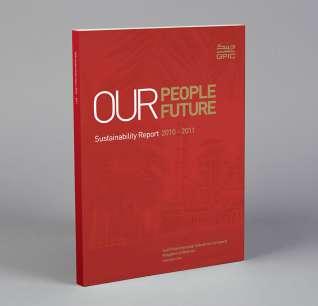
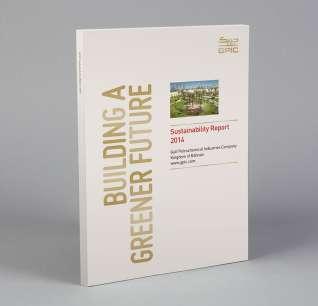
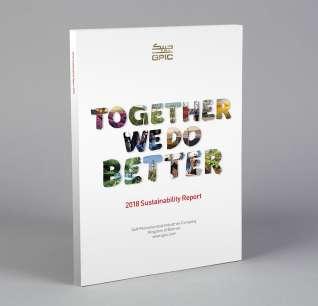
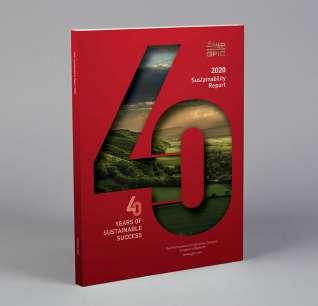
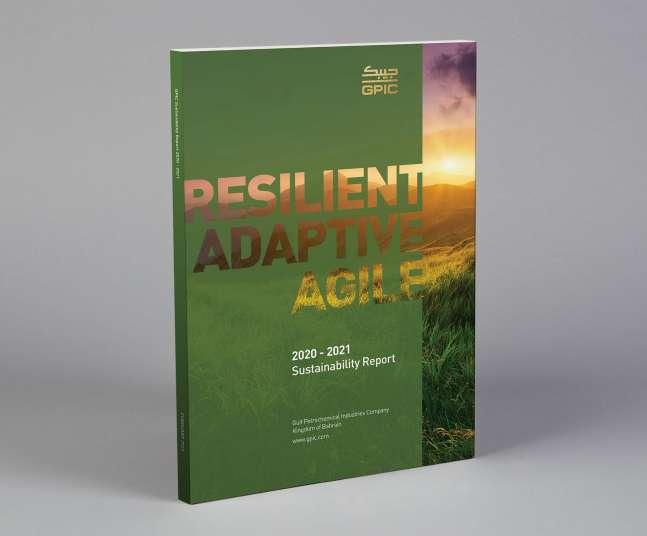
“At GPIC, we embrace sustainability through greater transparency and accountability. To build trust in our commitment for a better world, we have been publishing our Sustainability Reports since 2012 based on the GRI Sustainability Reporting Standards. This has served as a basis for demonstrating our progress of our environmental and social efforts, in addition to providing an outlook for the company’s future sustainability objectives.”

 Yasser Abdulrahim Alabbasi GPIC President
Yasser Abdulrahim Alabbasi GPIC President
About Gulf Petrochemical Industries Company (GPIC)
Gulf Petrochemical Industries Company (GPIC) is a leading joint venture setup and owned by the Oil and Gas Holding Company (nogaholding), Kingdom of Bahrain, SABIC Agri-Nutrients Investment Company, Kingdom of Saudi Arabia and Petrochemical Industries Company (PIC), Kuwait. GPIC was set up for the purposes of manufacturing fertilizers and petrochemicals namely Ammonia, Methanol and Urea. Being a major manufacturer within the Kingdom of Bahrain, GPIC is also a proactive stakeholder within the Kingdom and the region, with our activities being represented by natural gas purchases, empowering Bahraini nationals through training & employment, utilisation of local contractors and suppliers, energy consumption and other financial, commercial, environmental and social activities that arise as a part of our core operations within the Kingdom. For the purpose of clarity throughout this report,
1. ‘GPIC’, ’we’ ‘us’, and ‘our’ refer to the Gulf Petrochemical Industries Company;
2. ‘SABIC’ refers to the Saudi Basic Industries Corporation;
3. ‘PIC’ refers to the Petrochemical Industries Company, Kuwait;
4. ‘nogaholding’ refers to the Oil and Gas Holding Company, Kingdom of Bahrain;
5. ‘Board’ refers to our Board of Directors represented by a group formed by nogaholding, SABIC and PIC.
nogaholding is the hydrocarbon and energy investment and development arm of the Kingdom of Bahrain. Therefore, playing a key role in the implementation of the Kingdom’s strategies.
For GPIC, sustainability has evolved to a strategic imperative that focuses on economic, environmental and social risks and opportunities. By sharing our sustainability performance through our sixth GRI Sustainability Report and encouraging others to do the same, we are infact addressing SDG 12 target 12.6.
nogaholding is a business focused company that aims to create shareholder value by the successful management of portfolio of the Government of the Kingdom of Bahrain’s shareholdings in oil, gas and petrochemical assets. The nogaholding portfolio companies include Bahrain Petroleum Company (BAPCO), Gulf Petrochemical Industries Company (GPIC), Tatweer Petroleum, Bahrain National Gas Company (BANAGAS), Bahrain Aviation Fuelling Company (BAFCO), Arab Ship building and Repair Yard (Asry).
In 2012, Gulf Petrochemical Industries Company became part of the global transformation for a sustainable future by committing to the United Nations Global Compact’s ten principles in the realms of Human Rights, Labour, Environment and Anti-Corruption.
We are a member of the GRI Community since 2014 and support the mission of GRI to empower decision makers everywhere, through GRI Sustainability Reporting Standards and its multi-stakeholder network, to take action towards a more sustainable economy and world.


The GRI community is a catalyst for positive change; it’s a learning-exchange space where experience and expertise come together helping participants make competitive choices; it’s the launch pad for local and global leaders to share their success stories; it’s the powerhouse where collective impact in sustainable development starts to become real and grow.
GPIC is a Responsible Care Company certified for RC 14001 since July 2010. We are committed to the safe, ethical and environmentally sound management of the petrochemicals and fertilizers we make and export. Stakeholders’ well-being is always a key priority at GPIC.

01 GPIC Sustainability Report 20202021

Contents INTRODUCTION 04 - 05 1. SUSTAINABILITY REPORTING 06 - 07 2. SUSTAINABILITY OVERVIEW 2020 - 2021 08 - 27 3. COVID-19 — OUR RESPONSE 28 - 33 4. A GREAT PLACE TO WORK 114 - 149 8. PROTECTING OUR PLANET 90 - 113 7. THE ECONOMIC IMPACT OF SUSTAINABILITY 66 - 89 6. STRATEGY AND PROFILE OF GPIC 34 - 65
GPIC Sustainability Report 20202021 02
5.

ACRONYMS 211 15. GRI CONTENT INDEX 198 - 208 14. WHAT OTHERS SAY 186 - 195 13. LEADING EXCELLENCE AWARDS 182 - 185 12. UNGC WOMEN’S EMPOWERMENT PRINCIPLES 172 - 181 11. UNGC FOOD AND AGRICULTURE BUSINESS (FAB) 6 PRINCIPLES 162 - 171 10. UN GLOBAL COMPACT 150 - 161 9. GPIC Sustainability Report 20202021 03

Introduction GPIC Sustainability Report 20202021 04
ABOUT THIS REPORT
Sustainability is a journey within GPIC that positively influences and enhances our strategies as we evolve. We are focused not only on minimizing our footprint, and improving efficiency, but also on leveraging sustainability as an opportunity for growth and innovation.
Welcome to our sixth GRI Sustainability Report 2020-2021, entitled “Resilient Adaptive Agile”. The theme of the report highlights the way in which we as GPIC operate, and emphasizes the ways in which sustainability can help realise our visions for the company’s future. Our fundamental approach is guided towards achieving operational excellence in a safe and sustainable way. Our talented workforce at GPIC represented by over 400 talented women and men in Bahrain work towards the success of our company, and in turn, we are committed towards providing them with the top in class training and development opportunities they require to develop themselves both at a professional and personal level.
This report is prepared in accordance with the GRI Standards (2016 Edition) – ‘Comprehensive’, to promote transparency, accountability and to share our sustainability linked performance globally. The report highlights our progress and performance on social and environmental metrics which contribute towards economic growth and prosperity for the period of 2020-2021. It also navigates through the challenges and the best practices we have activated amidst the ongoing COVID-19 pandemic.

The period of 2020-2021 was extremely challenging for GPIC due to a number of challenges faced by the organization due to the onset of the COVID-19 pandemic. Our primary focus remained the health, safety and well-being of our work force. We are proud of how the teamwork and relentless
efforts of our people have supported us in managing the complexities we have tackled in light of the challenges posed due to the COVID-19 pandemic, including the robust risk management mindset, resilience and discipline they exhibited during the period. We are fortunate that most of our workforce were able to remain safe and productive throughout the pandemic and this has reflected in the way our business has remained productive and profitable.
This report also serves as GPIC’s UN Global Compact ‘Communication on Progress’ (COP) and our strategies and initiatives in alignment with the signature platforms including the ‘Food and Agriculture Business Principles’ and the UN ‘Women’s Empowerment Principles’.
This report also highlights, in detail, our commitment, support and contribution towards the United Nations 17 Sustainable Development Goals (SDGs).
By issuing sustainability reports and encouraging our peers and business partners to take on board sustainability reporting, we are also contributing towards the SDG #12 target ‘12.6’ - “Encourage companies, especially large and transnational companies, to adopt sustainable practices and to integrate sustainability information into their reporting cycle.”
Other Company reports that may be of interest to readers are available on our homepage - www.gpic.com:
• GPIC Annual Reports
• GPIC Company Magazine – Khaleejieh
• GPIC GRI Sustainability Reports
• GPIC UN Global Compact Communication on Progress (COP) Reports
GPIC Sustainability Report 20202021 05

SustainabilityReporting GPIC Sustainability Report 20202021 06
SUSTAINABILITY REPORTINGA COMPREHENSIVE UNDERSTANDING
What is the Global Reporting Initiative (GRI)?
GRI is an organization that has pioneered the standardization of sustainability reporting through the creation of the GRI framework. Key principles in its approach include: balance, comparability, materiality, accuracy, timeliness, clarity and reliability. For more information, visit GRI’s website www.globalreporting.org.
What is an ‘In Accordance’ Sustainability Report?
An ’In Accordance’ sustainability report is a report that fulfills the GRI Standards ’in accordance’ criteria; and states that it is ’in accordance’ with either the ‘Core’ or ‘Comprehensive’ options. GPIC 2020-2021 Sustainability Report is ‘in accordance’ - ‘Comprehensive’.
What is Materiality assessment?
Materiality assessment is the process of identifying, refining, and assessing numerous potential environmental, social and governance issues that could affect our business, and/ or our stakeholders, and condensing them into a short-list of topics that inform readers of the company’s strategy, targets, and reporting mechanisms.
How does GPIC approach sustainability reporting?
The transparent and comprehensive use of the GRI framework creates accountability for GPIC to report and improve reporting on the topics stakeholders may find important. GPIC has used GRI Standards-2016 for this report and aims to transition to the GRI Standards -2021 in our next cycle of reporting.
What are GPIC ‘s long term Sustainability Goals?
In 2014, to make a greater impact, to scale up the contribution of our business to UN priorities and to align our strategy to Bahrain’s Economic Vision 2030, we established our long term sustainability goals.
The Sustainability Goals cover the following areas:
• Climate Change
• Resource Efficiency
• Safety, Health and Environment
• Learning and Development
• CSR and Community Engagement
• Economic Sustainability

What is the United Nations Global Compact (UNGC) Communication on Progress (COP)?
We use the biennial Sustainability Report and the yearly COP report to convey our Communication on Progress (COP) for the UN Global Compact’s 10 principles. Submitting an annual
COP is at the heart of company’s commitment to the UN Global Compact and it provides valuable information to our stakeholders both internal and external.
COPs are categorized at three differentiation levels (GC Advanced, GC Active, GC Learner).
UN Global Compact is the world’s largest voluntary corporate citizenship initiative. For more information on the UN Global Compact and its principles, visit www. unglobalcompact.org.
What is the United Nations Global Compact (UNGC) Food and Agriculture Business Principles?
To advance the positive impact that business can have in the food and agriculture field, the United Nations Global Compact has facilitated the development of the voluntary Food and Agriculture Business Principles (FAB Principles) to serve as a framework for ‘principle-based’ collaboration of companies with the UN, governments, civil society and other stakeholders. For more information on the UN Global Compact FAB 6 principles, visit www.unglobalcompact.org.
What is the United Nations Global Compact (UNGC) Women’s Empowerment Principles?
The Women’s Empowerment Principles are a set of 7 Principles for business offering guidance on how to empower women in the workplace, marketplace and community. They are the result of a collaboration between the United Nations’ entity for Gender Equality and the Empowerment of Women (UN Women) and the United Nations Global Compact, and are adapted from the Calvert Women’s Principles®. The Women’s Empowerment Principles seek to point the way to best practice by elaborating the gender dimension of corporate responsibility, the UN Global Compact, and business’ role in sustainable development. For more information on the Women’s Empowerment principles, visit www.weprinciples.org
What are the United Nations Global Sustainable Development Goals (SDGs)?
The Sustainable Development Goals (SDGs), officially known as ‘Transforming our world: the 2030 Agenda for Sustainable Development’, are an intergovernmental set of aspirational Goals with 169 targets. The Goals are contained in paragraph 54 United Nations Resolution A/RES/70/1 of 25 September 2015. The Resolution is a broader intergovernmental agreement that, while acting as the Post 2015 Development Agenda (successor to the ‘Millennium Development Goals (MDGs)’), builds on the Principles agreed upon under Resolution A/ RES/66/288, popularly known as ‘The Future We Want’. visit www.un.org/ sustainabledevelopment/ sustainabledevelopment- goals/
GPIC Sustainability Report 20202021 07
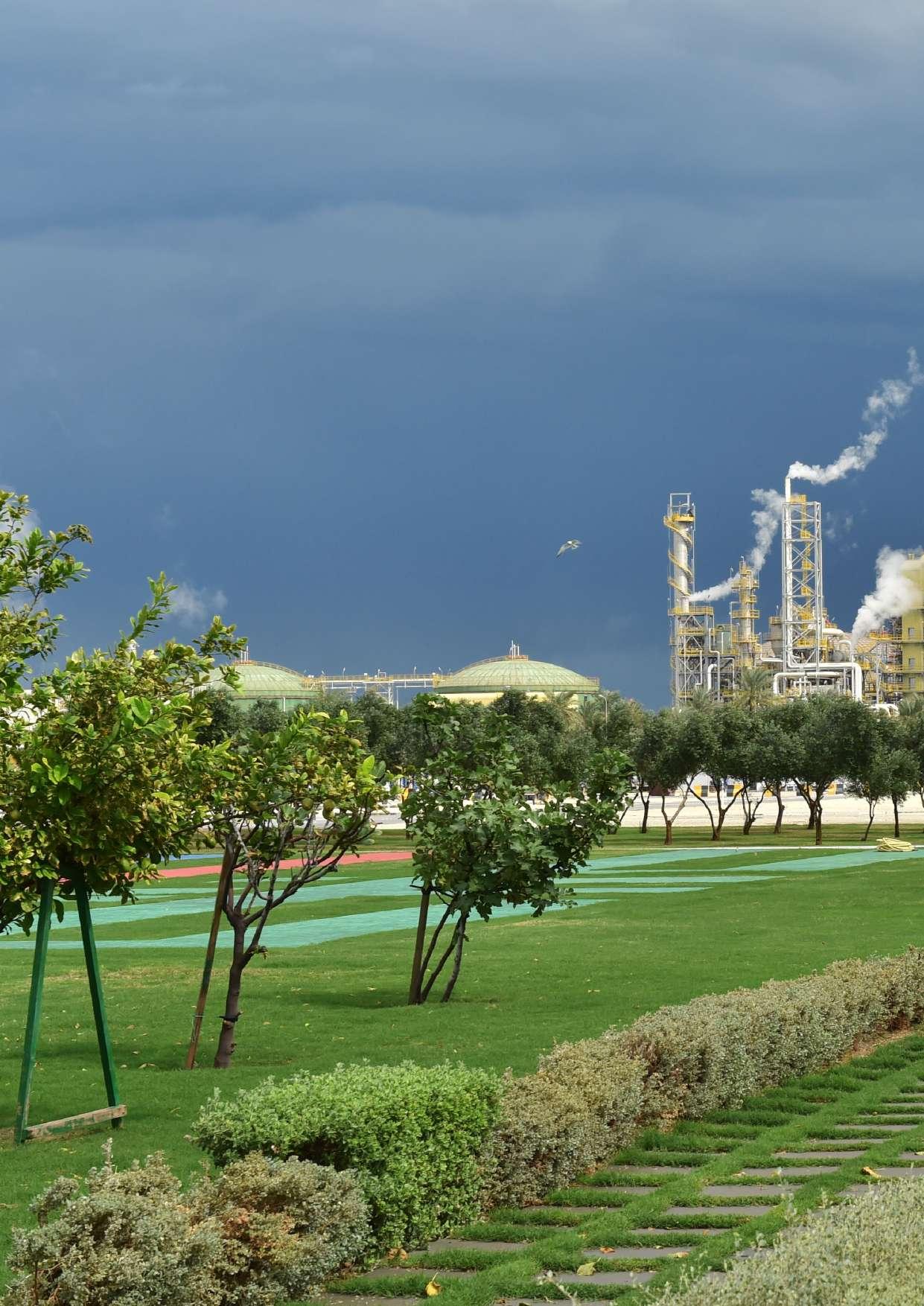
SustainabilityOverview
GPIC Sustainability Report 20202021 08
2020-2021
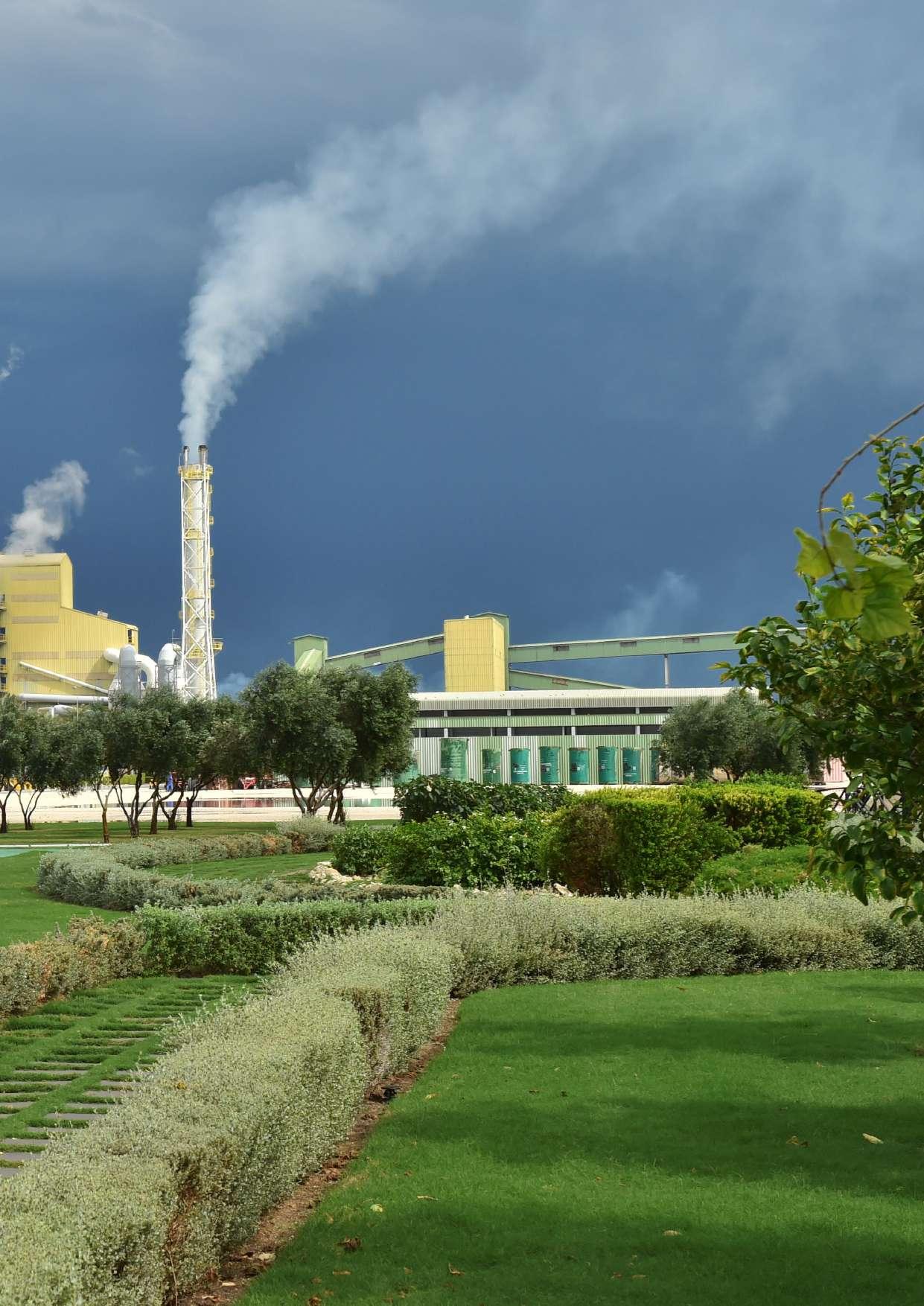
GPIC Sustainability Report 20202021 09
GPIC’s Achievements, Challenges and Goals

Our Performance Highlights
45 MILLION metric tonnes of combined production of ammonia, methanol and urea since 1985
43,700 students from 574 schools have attended environmental awareness lectures given by GPIC employees since 2001
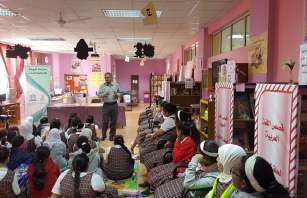
US$5.58 BILLION
Invested into Bahrain economy since inception
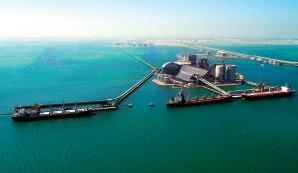
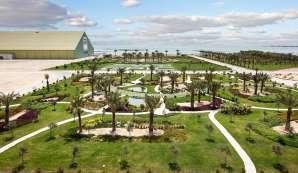

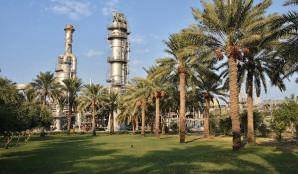
US$9.89 MILLION saved through in-house spare part manufacturing since 2001

+1 MILLION FISH
released to Bahrain’s territorial waters from GPIC’s managed fish farm since 1996

7% women employees at GPIC
35.3 MILLION man-hours without LTA as of 31 December 2021

US$3.5 BILLION paid to shareholders as dividend
2,543 cargo ships loaded and exported to the world since 1985

GPIC Sustainability Report 20202021 10
We aim to be the growth partner for all our stakeholders by utilizing local suppliers within our supply chain where possible, employing Bahraini nationals and contributing to the local community

GPIC Sustainability Report 20202021 11
GPIC’s Achievements, Challenges and Goals
GULF PETROCHEMICAL INDUSTRIES COMPANY OVERVIEW
Shareholders
• Equal Partnership between the Government of the Kingdom of Bahrain, represented by the Oil and Gas Holding Company (nogaholding), SABIC Agri-Nutrients Investment Company, Kingdom of Saudi Arabia and Petrochemical Industries Co.(PIC) of the State of Kuwait
Date Incorporated
Number of Employees
Principal Place of Business
Core Products
Key Markets
Scale of the Organisation
Total Capitalisation
Sales 2021
Sales 2020
Total Assets 2021
Total Assets 2020
Net Profit 2021
Net Profit 2020
Total Products
Certifications
• December 1979
• 444
• Sitra, Kingdom of Bahrain
• 1200MT/D Ammonia, 1200MT/D Methanol, 1700 MT/D Granular Urea.

• China, Taiwan, South Korea, India, South Africa, USA, Thailand, Australia
• Medium
• US $159 million (100% equity)
• US$ 513 million
• US$ 270 million
• US$ 679 million
• US$ 553 million
• US$ 216 million
• US$ 4.5 million
• 2021 - 1,612,089 metric tonnes
• 2020 - 1,632,765 metric tonnes
• ISO 9001; ISO 14001; ISO 45001; PAS 99; RC 14001; ISO 27001; ISO 31000; ISO 22301; ISO 17025; ISO 17020; ISO 50001;
• UN Global Compact; National Safety Council (NSC - USA), Royal Society for the International Organisations Prevention of Accidents (RoSPA - UK), International Fertilizer Association (IFA), Arab Fertilizer Association (AFA), Gulf Petrochemicals and Chemicals Association (GPCA), Global Reporting Initiative (GRI)

Memberships in Key
Key Awards 2020 - 2021
• Royal Society for the Prevention of Accidents (RoSPA) Chemical Industry safety sector Award
• British Safety Council International Safety Award
• Arabia CSR Award - Large Category
• Arabia CSR Award - Partnerships and Collaboration category
• Mohammed bin Rashid Al Maktoum Business Excellence and Business Innovation Awards 2021
(For more awards please refer to section ‘Awards’)
GPIC Sustainability Report 20202021 12
Achievements 2020-2021
• A remarkable safety record with over 35 million manhours without a Lost Time Accident.
• Our resilience, adaptability and quick response to change and robust risk management measures enabled us to keep the COVID-19 related infection rate to as little as possible for our employees and contractors.
• Maintaining business continuity, uninterrupted operation and exports amidst the COVID-19 pandemic in 2020-2021.
• Profitability more than anticipated due to continued operation and favourable product prices.
• Our proactive digitalization strategy and implementation enabled virtual business including work from home, external audits, meetings, training and factory acceptance tests.
• Gearing up for growth, exploring and tapping in potential areas for joint ventures and investments outside Bahrain.
• Continued to build on our success and received recognition for the relentless and driven attitude to sustainability, corporate social responsibility and beyond excellence results.
• We continued to excel in many areas and received several global awards including the prestigious Mohammed bin Rashid Al Maktoum Business Excellence and Business Innovation Awards 2021, the Arabia CSR Awards and the Contract Management Team of the Year Award, just to name a few.
Challenges 2020-2021
• The COVID-19 challenge: preserving our present and future

• Deferring the turnaround 2020 to 2022 due to challenges in securing resources amidst the COVID-19 pandemic and operating the plants safely and reliably for 4 years since the last turnaround in 2018.
• Continuity of market uncertainty, instability and unpredictability, financial crunch and escalating energy costs.
• One of the highest ever seawater intake temperatures reaching 39.2°C affecting plant performance.
Challenges and goals 2022 and beyond
• Primary focus amidst the Covid-19 pandemic will continue to be the health, safety, well being and employability of our employees and the business continuity.
• To have a safe and successful turnaround 2022.
• Maintain the financial health of the Company through operational excellence and “Optimise Cost to Survive” mind-set.
• Deliver financial success and sustainable returns for our shareholders.

• Continue to innovate beyond the boundaries of standard practice.
• Build our people capability and improve employee productivity.
• Deliver on the goals and targets we have set for our future.
• Maintaining safety performance & adherence to environmental legislation.
• Improving on cost of production.
• Increase in price of raw materials such as gas and electricity.
• Embrace new technologies for improving energy efficiency and performance enhancement of plants.
• Continue to Increase and improve automation for improved reliability.
• Improve cyber security measures.
• Secure growth and expansion projects through implementing GPIC’s 2030 Corporate Strategy.
GPIC Sustainability Report 20202021 13
Our Sustainability Strategy
GPIC’s sustainability strategy is built on the foundation of the United Nations’ pillars of sustainable development: People, Planet ,Prosperity, Partnerships and Peace. We measure, monitor and manage our impact in relation to social responsibility, climate action and inclusive prosperity on an ongoing basis. We also understand that this can only be achieved through sustainable partnerships in a peaceful environment.
In developing our sustainability strategy, our approach ensures a close-knit integration between our stakeholders’ interest, key environmental concerns and our core business.
Our business model is based on the principles of sustainable development as we appreciate that all our operations and activities impact, either directly or indirectly, the welfare of all our stakeholders as well as the environment and community we live and operate within.
Economic Vitality:
First and foremost, we consider ourselves a responsible corporate citizen of the Kingdom of Bahrain. As such, we ensure that our business model is geared towards the Kingdom’s economic needs. We create opportunities for a much wider community than our direct suppliers and customers, helping us to fulfill the economic promise to the nation as a whole.
Business Continuity:
We believe that the real key to profitability is being reliable and sustaining our business operations within the prevalent market conditions. To achieve this, we have crafted our strategies, prioritised our investments, maintained our assets and developed our human talent to ensure trustworthy operations and business continuity.
Business Growth:
We believe that in order to add value for our shareholders, it is critical for us to grow while remaining competitive and sustainable in this ever evolving and challenging global market. In line with this outlook, our strategic plan encompasses our future focused ambitions and goals till the year 2020. Our business plan has been revised and updated as the GPIC Corporate Strategy Plan 2030. A high-level council, ‘GPIC 2030 Strategy Implementation Council (SIC)’ has been formed to focus on the the implementation of the GPIC Corporate Strategy Plan 2030.
Human Talent Development:
At GPIC, we are mindful that our success is critically aligned to our ability to attract, recruit and retain the highest quality of human talent. Without our people, our reputation would not be what it is today, so we focus on nurturing, developing and retaining them throughout our career lifecycle.
Women’s Empowerment:
GPIC has a core responsibility to be a role model for empowering women in Bahrain’s industrial sector, and being an equal opportunity employer. We pursue this as a strategic priority to and endeavor to employ more women in various roles across the organization, as allowed by the laws
of Bahrain. We have also established an ‘Equal Opportunity Council’ to oversee the practice of gender equity within the organization, and to ensure adherence to women’s rights.
Engagement with Regional and International Organizations: With the aim to be proactively involved and to contribute towards knowledge sharing and professional networking, GPIC participates in several organizations at a national, regional and international level. GPIC’s leadership is involved in promoting sustainable development and agriculture on both a local and global level and is actively engaged with policy makers across multiple professional networks.
Social Progress:
Another set of key stakeholders within our network are the communities that host our business and our people. We are aware of the fact that any and all negligence in our business processes or practices could cause a direct/ indirect negative impact to our communities. As such, we believe that it is our responsibility to cater to their needs and be aware of their concerns. This means that the safety of all our employees, contractors and host communities plays a paramount role in our strategy and business plans.
At GPIC, corporate social responsibility is all about how we manage our core business processes to produce an overall positive impact on society.
Our social investment strategy is crafted with a commitment to the idea that our stakeholders include a much broader category than only our people, shareholders or financial investors. We have an unwavering commitment to invest in helping address the social needs firstly of our neighbouring communities, but also of the Kingdom as a whole.
At GPIC, we believe in giving back to communities, addressing not just their immediate needs but also their long-term ability to lead healthy and productive lives. This is why we have invested in providing and supporting education, technical/ vocational training and inclusive healthcare. Furthermore, we ensure that our social investments reach every segment of the society in need in Bahrain.
Environmental Sustainability and Climate Change:
As the world’s climatic environment continuously evolve, no company can afford to ignore the impact their business processes and practices has on the environment. We have committed ourselves to some of the most stringent standards when it comes to environmental management because we believe that the way any organisation manages environmental issues is a crucial measure of their standards of corporate social responsibility, competitiveness and vision. As part of our ongoing enhancements and continuous improvement in addition to taking responsibility of our own environmental footprint, we have been accredited in line with Environmental Management System ISO 14001, Responsible Care management system RC 14001 and ISO 50001 Energy Management System.
Life Cycle Perspective:
Some of GPIC’s significant environmental impacts can occur during the sourcing of raw material, manufacturing process, transport, delivery, use and final disposal of our product(s) or service(s). By being transparent and providing clear and honest information, GPIC can potentially prevent or mitigate adverse environmental impacts during these life cycle stages. GPIC considers the extent of control or influence that it can exert over activities, products and services considering a life cycle perspective.
GPIC and the Sustainable Development Goals:
In September 2015, 193 Member States of the United Nations adopted 17 new Sustainable Development Goals (SDGs) to make our world more prosperous, inclusive, sustainable and
GPIC Sustainability Report 20202021 14
resilient. These SDGs represent an unprecedented opportunity for companies such as ours, to align their own sustainability goals with the broader societal aspirations at hand. Hence, we have diligently integrated the SDGs with our own Corporate Sustainability objectives and purpose. Through our ambitious short, mid and long-term initiatives, we are not only spreading awareness and action on the SDGs amongst our employees, but passing this realization and understanding across the wider community and region.
Digitization strategy and digital transformation
The pandemic has been a “digital accelerant” within the marketplace – many of us have had to re-imagine and reengineer experiences, roles and business processes that used to be delivered face to face in the past. GPIC has been proactive in digitizing its business processes, and we have been investing in our IT infrastructure and in developing innovative solutions
to automate processes, work and applications. Furthermore, we have implemented virtual training, Work-from-Home through online platforms, virtual meetings replacing inperson meetings, approaches towards External and Internal Audits virtually and even factory acceptance tests are being conducted virtually now. The Company is working in line with its digitalization strategy, being mindful of the fact that innovative digital transformation is the way forward and will define the future business norms.
In essence, our sustainability strategy highlights our commitment to manage the entire business cycle in a manner that focuses beyond profits, and encompasses key factors of social responsibility. We believe that being successful is about creating and sharing opportunities; it is about making the world a little bit better, by creating ‘win-win-win‘ situation for us - our stakeholders - our planet.
DIRECTOR PRESIDENT EXECUTIVE MANAGEMENT Committees of the Board GPIC 2030 Strategy Implementation Committee Audit, Finance & Risk Committee Remuneration, Nomination and Governance Committee Strategy and direction Chief Internal Auditor Secretary to the Board Corporate sustainability goals & targets Departmental sustainability goals & targets
of DIRECTORS Multi Auditing to ensure Sustainable Governance External audits: 1) Statutory 2) Quality 3) Environment 4) Responsible care 5) Occupational health & safety 6) IT security 7) Joint shareholders 8) Business Continuity 9) Energy 10) Occupational health and safety Internal audits: 1) IMS 2) Quality 3) IT Security 4) Safety & security 5) Business Continuity 6) Environmental 7) Energy 8) Responsible Care Others: 1) Independent Benchmarking 2) Insurance Survey Finance & Marketing Human Resources & Corporate Communications Information Technology Technical Services Business at functional level Corporate Policies • Corporate Governance Policy • Approval Authority Schedule Policy. • Integrated Quality, health & safety, and environment Policy • Responsible Care Policy • Energy Management Policy • Enterprise Risk Management and Business Continuity Management Policy -(Business Resilience Policy) • Finance and Investment Policy • Legal and Ethics Policy • Procurement Policy • Inventory Management Policy • Information security Policy • HR Policy • Vehicle Policy • Credit card Policy • Accounting Policy • Local Sales Policy • Code of Ethics Policy • Executive Management Council • Safety, Health and Environment Council • GPIC 2030 Strategy Implementation Council • Management & Union High Council Key Committees / Councils at Management Level Key Committees at functional level • Sustainability Reporting Committee • Energy Management Committee • Training & Development Committee • Safety Committee • Health Committee • Environment Committee • Resilience Committee • Responsible Care Committee • Process Safety Management Committee • Social Activities Committee & others
SUSTAINABILITY GOVERNANCE FRAMEWORK Plants Operation Maintenance Safety, Security, Health & Environment Purchasing and Warehousing GPIC SHAREHOLDERS nogaholding- Bahrain, SABIC Agri- Nutrients Investment Company-KSA, PIC-Kuwait GPIC Sustainability Report 20202021 15
MANAGING
BOARD
GPIC’S
4 Decades of Excellence in Corporate Sustainability - Our Journey
GPIC established as a joint venture between NOGA Holding - Kingdom of Bahrain, SABIC - Kingdom of Saudi Arabia, PIC - State of Kuwait.
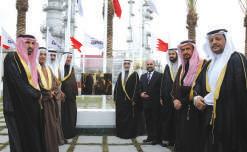

Ammonia and Methanol plants commissioned with a capacity of 1000 MT/D each.
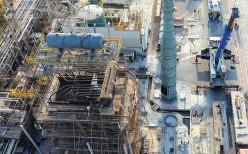
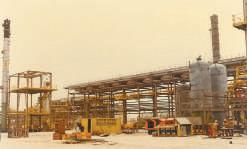
Ammonia and Methanol plants debottlenecked to a capacity of 1200 MT/D each.
GPIC certified for Quality Management System ISO 9000
GPIC commissions its Bird Sanctuary at the entrance of its complex.


GPIC certified for Environmental Management System ISO 14001
GPIC commissioned its 1700MT/D Granular Urea plant which also reduces about 0.5 million tonnes of CO2 emissions per annum.
GPIC established its first Fish Farm close to the seawater outfall.
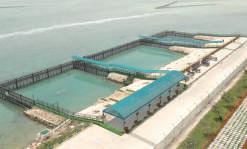

GPIC certified for Occupational Health and Safety Assessment Specification (OHSAS) BS 18001 standard.
In partnership with Ministry of Education GPIC launches its Environmental Research programme for school students.
GPIC wins the Sir George Earle Trophy from RoSPA, UK for SHE excellence.
GPIC certified for Information Security Management System (ISMS) ISO 27001
GPIC launched its “International Dilmun Environmental” Award in partnership with RoSPA-UK.
GPIC wins HRH Princess Sabeeka Award for Empowerment of Bahraini Women.
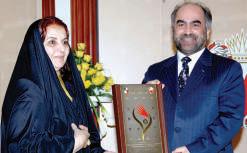
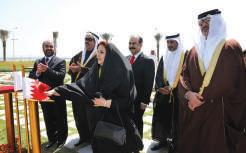
GPIC wins the R.W Campbell Award from NSC, USA for SHE excellence.
GPIC issues its first GRI 3.1 Sustainability Report

GPIC becomes a permanent member of UN Global Compact
GPIC replaces its ammonia converter basket resulting in an energy saving of around 0.17 Gcal/ MT of ammonia
GPIC wins the Arabia CSR Award
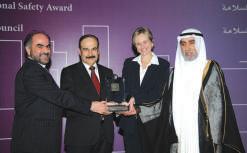
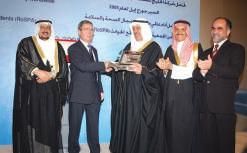
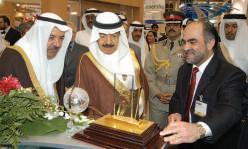
GPIC installs its first solar heating unit

GPIC wins the Arabia CSR Award HM Queen Margrethe II of Denmark olive oasis inaugurated

GPIC becomes Responsible Care® RC-14001 certified.
GPIC commissions its first 450 MT/D Carbon Dioxide Recovery plant that reduces 0.12 million CO2 emissions annually.
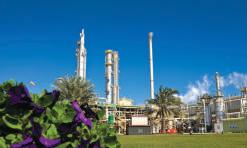
1980 1985
1996 1998 1999 2001 2004 2005 2006 2008 2009 2010 2011 2012 GPIC Sustainability Report 20202021 16
1989 1995
GPIC wins the Royal Society for the Prevention of Accidents (RoSPA) Patron’s Award. (28 consecutive Golds)
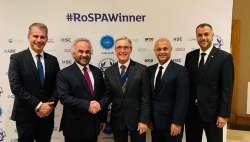
The Company won the IFA Industry Stewardship Champion Gold Medal.
GPIC President at the UNGC Private Sector Forum demonstrated support for the United Nations and inclusive multilateralism by signing onto the powerful Statement from Business Leaders for Renewed Global Cooperation.
The Company won the Arabia CSR Award in Large Category and Partnerships & collaboration category
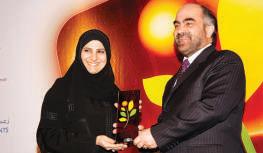
A remarkable safety record with over 32 million man hours (+ 16 years) without a Lost Time Accident.
GPIC has so far tackled the COVID-19 challenge, maintaining health, safety, well being and employability of its work force enabling business continuity and profitability.
GPIC won the “Contract Management Team of the Year - 2021” during the awards ceremony held at the Middle East Procurement Conference, in the Kingdom of Bahrain.
GPIC won the Mohammed bin Rashid Al Maktoum Business Excellence and Business Innovation Awards for the year 2021.
Mr Yasser Abdulrahim Alabbasi becomes the new President of GPIC
The Company won the Arabia CSR Award in Large Category and Partnerships & collaboration category for the 7th consecutive year
GPIC wins the Arabia CSR Award in Large Category for the fifth consecutive year
GPIC wins the Dubai Chamber of Commerce and Industry’s Corporate Social Responsibility Award
In 2019, GPIC achieved the highest ever cumulative production of 1,644,590 tons since inception
GPIC transited successfully from OHSAS 18001 to ISO 45001
GPIC wins MRM Business Excellence & Innovation Awards
GPIC issues its fourth GRI Sustainability Report

GPIC President awarded with NSC “ CEO who gets it” Award
GPIC wins GPCA Responsible care Award in the Health and Safety
GPIC completes its transition to ISO 14001:2015 and ISO 9001:2015
GPIC wins the King Hamad award of youth empowerment for achieving the SDGs.
A new Urea Formaldehyde (UF 85) plant was commissioned to make supply chain of our raw materials and chemicals more robust and sustainable.
GPIC wins the Arabia CSR Award in Large and Partnership & Collaboration Category
GPIC issues its first Greenhouse Gas Inventories report based on IPCC Guidelines for the year 2014 - 2015
Start export of methanol to downstream industry in Bahrain
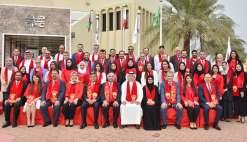
Revamped our corporate strategy to GPIC corporate strategy 2030, an innovative business strategy knowing that business as usual will not be sustainable
wins
Bin Rashid Al Maktoum Business Excellence Innovation Awards
GPIC issued its third GRI Sustainability and UNGC COP report in June 2016
GPIC SR 2016 - GPIC underwent the GRI Benchmarking Service
Embarking on a new Urea Formaldehyde (UF 85) plant to make supply chain of our raw materials and chemicals more robust and sustainable.
GPIC chairman and GPIC President were awarded Bahrain Competency Medal of the First Class by HRM The King



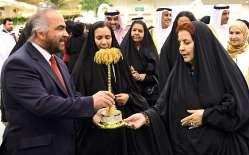

GPIC President becomes IFA and AFA president
GPIC achieves ISO 50001 Energy Management System Certification
GPIC wins Shaikh Mohammed bin Rashid Al Maktoum (MRM) Business Excellence Award for Most Outstanding Performance in the manufacturing category
GPIC receives IFA Protect and Sustain Product Stewardship programme “Excellence Award”
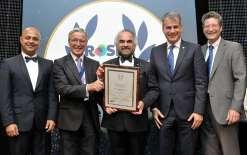
GPIC issues its Second GRI 3.1 Sustainability Report
GPIC becomes ISO 31000 and ISO 22301 certified
GPIC commissions its new HP Steam boiler with ultra low NOx burners and Sodium Hypochlorite unit, phasing out chlorine from its facility
GPIC
Mohammed
2013 2014 2015
2018 2019 2020 2021 GPIC Sustainability Report 20202021 17
2016 2017
Making the SDGs a Reality at GPIC
GPIC firmly believes that the Sustainable Development Goals can only be realized with strong partnerships and effective cooperation. Global, regional and national collaborations are an integral part of this - built on shared principles and values that will drive the success of an interconnected development agenda for the prosperity of the planet and its people.
Yasser Abdulrahim Alabbasi, GPIC President
Partnerships: WHY IT MATTERS
What’s the goal here?
To revitilize the global partnership for sustainable development

Why?
In light of the consequences of the global COVID-19 pandemic, we have seen that strengthening multilateralism and global partnerships are more important than ever if we are to solve the world’s problems. The Sustainable Development Goals remain the framework for building back better. We need everyone to come together governments, civil society, scientists, academia and the private sector.
GPIC ‘s contribution towards SDG# 17
The Company engages with several international and regional organizations such as; UN Global Compact; National Safety Council (NSC - USA), Royal Society for the Prevention of Accidents (RoSPA - UK), International Fertilizer Association (IFA), Arab Fertilizer Association (AFA), Gulf Petrochemicals and Chemicals Association (GPCA), Global Reporting Initiative (GRI)
Why partnerships are important for GPIC
• Add value to the organization by obtaining best practices and know-how in house
• Establish international network of associate that can be tapped into when required
• Provide GPIC workforce opportunities to work with and interact with international expertise
• Further solidify the goodwill and reputation of GPIC
GPIC Sustainability Report 20202021 18
GPIC and the UN Sustainable Development Goals

Amidst the COVID-19 pandemic, 2020-2021 have been challenging years for sustainability in many respects, but there have also been exciting developments in the sustainability landscape. We look back at GPIC’s efforts in main streaming the UN’s 17 SDGs in the Company’s business functions.
In September 2015, the UN General Assembly agreed to 17 global Sustainable Development Goals (SDGs) to reach by 2030. The goals and specific targets under the goals seek to end poverty, protect the planet, and ensure prosperity for all.
GPIC’s smart and forward looking business approach has embraced the shift from the classical three pillars of Sustainable Development to the 5 P’s- People, Planet, Prosperity, Partnerships and Peace. By doing this GPIC has become part of the global transformation for a sustainable future.
GPIC is a proud supporter of the global goals and has contributed in all the phases, right from the participatory process of My World to setting up meaningful indicators, sharing best practices on SDG aligned projects and programs through the UN Global Compact and KPMG’s Industry Matrix. Aligning corporate goals both short term and long term with the relevant SDGs. Mainstreaming SDGs in business functions. Linking SDGs with our Capex projects and modifications through our MOC system is one of our latest initiatives. Sharing our sustainability performance publicly through GRI sustainability reports and encouraging others to do the same.
As we continue to advance our thinking and work to address the SDGs, we’ll update our initiatives in our sustainability reports and the UN Global Compact’s Communication on Progress Reports.
We proudly present our eleven steps that are instrumental in making the SDGs a reality at GPIC.
11 STEPS GPIC HAS TAKEN TO CONTRIBUTE TO THE SDGs
STEP 1 - Leadership Commitment towards Sustainability and SDGs
The SDGs are a beacon of hope. Properly addressed, they will be the transformation required for development to take hold and benefit all. Ensuring progress that positively impacts people, planet, and prosperity across the world while fostering peace and partnerships that ensure that no one is left behind. Delivering on the SDGs requires transformational and inclusive leadership, greater engagement, and accelerated action towards concrete results. We trust that through our passionate commitment, sincere actions and greater collaboration we can contribute towards ensuring that the promises of the 2030 Sustainable Development Agenda translates into a reality in people’s lives
 Yasser Abdulrahim Alabbasi President, GPIC
Yasser Abdulrahim Alabbasi President, GPIC
STEP 2 - GPIC employees took part in the Participatory process through the MY WORLD survey in 2013
GPIC’s employees were involved in the participatory process for the SDGs through the UN’s global ‘My World’ survey that received more than 7 million votes from around the world, with approximately 75% of participants under 30 years of age.
STEP 3 - GPIC promotes awareness of SDGs within the Organization and beyond
GPIC’s Sustainability Reporting committee are committed to delivering presentations to all our employees periodically to ensure we are enhancing their awareness and knowledge on the SDG’s while also educating them on their responsibilities beyond the workplace within their communities.
STEP 4 - GPIC compares its business practices with the SDGs and the associated targets to understand their organizational alignment to the SDGs in the first quarter of 2016
GPIC’s Sustainability Reporting committee compared the organization’s prevalent business practices to understand how they are aligned with the 17 SDGs.
It was encouraging to see the results indicate that the organization’s practices were in fact aligned, and were contributing towards the SDGs in one aspect or more.
GPIC Sustainability Report 20202021 19
Making the SDGs a Reality at GPIC
STEPS
STEP 5 - GPIC aligned its Corporate sustainability goals with the SDGs and its associated targets in 2017.
GPIC has embedded the SDGs in its business and has demonstrated alignment with its Corporate Goals since 2017.
STEP 6 - GPIC aligned its Departmental sustainability goals with the SDGs and its associated targets in 2017.
GPIC has embedded the SDGs within its core business processes and has demonstrated alignment within its Departmental Goals since 2017.
STEP 7 - GPIC aligned GRI disclosures with the SDGs in its GRI Sustainability Report 2016 - 2018
GPIC has aligned the SDGs to the relevant GRI standards and disclosures, the UNGC principles and to the organization’s s contribution. These links are based on a more detailed analysis available on the SDG Compass website (www.sdgcompass.org).
STEP 8 - GPIC provided its SDG related Industry Matrix best practice to the UNGC based on the UNGC Survey
To contribute towards the solicitation of best practices of how companies are positively contributing towards the SDGs through their core business operations and to capture ideas on future opportunities for shared value, GPIC has provided a number of examples including their carbon dioxide recovery project that addresses SDG 12# and 13

STEP 9 - GPIC promotes awareness of SDGs within the Community
GPIC Sustainability committee and the Youth committee are conducting periodic presentations to enhance the awareness and knowledge of school children across the Kingdom of Bahrain.
STEP 10 - GPIC has started to link its initiatives and technical reports with the SDG’s
GPIC has initiated a process of alignment to highlight the linkage between their initiatives to the SDGs in their technical reports. For example, the Company’s waste recycling report was linked to target 12.5 of SDG 12 “Responsible Consumption and Production”.
STEP 11 - GPIC has linked its technical and non-technical projects with the SDG’s
At GPIC, the SDGs are now a part of the workflow for all the Capex and modifications as part of the MOC system.
GPIC Sustainability Report 20202021 20
11
GPIC HAS TAKEN TO CONTRIBUTE TO THE SDGs
HRH The Crown Prince witnesses the signing of an agreement between GPIC and Italian Technology giants Saipem to study the feasibility of various projects in Bahrain.

Linking the SDGs, UNGC ,GRI and GPIC’s contribution
The following table links the Sustainable Development Goals (SDGs) to GRI standards relevant disclosures, UNGC principles and GPIC ‘s contribution. These linkages are
based on a more detailed analysis available on the SDG Compass website (www.sdgcompass.org) and also the document from UNGC.
NO POVERTY: Contributing to economic growth, job creation and trade; Producing fertilizer that increases income of farmers worldwide. GPIC has invested over USD 5.58 billion into the Bahrain economy since its inception.
ZERO HUNGER: GPIC has produced and exported over 15 million tonnes of granular urea since 1998 and a total exceeding 45 million tons of ammonia, methanol and granular urea since 1985. This is our humble contribution to support the farmers in addressing food security.
GPIC works closely with the International Fertilizer Association (IFA) and the Arab Fertilizer Association on training and capacity building in areas linked to sustainable agriculture, and the effective use of fertilizer to increase food production.
GOOD HEALTH AND WELL BEING: Health and Safety of employees, their families and contractors; Full health insurance and health campaigns; Health training and lectures.
GPIC’s First-Aid training and Community outreach programme with the National Safety Council(NSC)USA which started in 2012 is ongoing and we have trained over 400 employees, contractors, industrial and university students, summer camp children, employees’ wives and other stakeholders till date.
Defensive driving training, campaigns on ”Mobile free driving” to save lives.
COVID -19 Pandemic related proactive & preventative measures targeting employees, contractors and the community at large. Encouraging employees and their families to take the COVID-19 Vaccination. So far 98% of GPIC Employees have received the vaccination.
GPIC contributed US$ 1 million in support of the Feena Khair campaign. A national level initiative to tackle the Coronavirus (Covid-19) pandemic.
SDGs UNGC PRINCIPLES GRI DISCLOSURES /TOPICS GPIC’s CONTRIBUTION UNGC Principle #1,2,3,4,5,6 GRI 103-2, 202-1, 203-2, 413-2
UNGC Principle #1,2,7,8,9 GRI 201-1, 203-1, 203-2, 411-1, 413-2
UNGC Principle #1,2,3,4,5,6,10 GRI 203-2, 305-1, 305-2, 3053, 305-6, 305-7, 306-1, 306-2, 306-3, 306-4, 403-2, 403-3
GPIC Sustainability Report 20202021 21
Linking the SDGs, UNGC, GRI and GPIC’s Contribution
UNGC
QUALITY EDUCATION: Training opportunities for employees and industrial trainees; Supporting InJaz and Ministry of Education programs; Providing scholarships and honoring high achieving students; Giving international lectures and presentations to other industries and institutions. Due to the COVID-19 pandemic in-person training was transformed to virtual training including webinars.
GENDER EQUALITY: GPIC is committed to the UN Global Compact Women’s Empowerment Principles (WEPs) since 2014 and is a passionate advocate and supporter of women empowerment both at a national and a global level; Women at GPIC work in all departments both technical and non- technical; they are part of various cross functional committees and participate actively in all business activities. GPIC appointed its First female manager level resource within its HR and Corporate Communications department. In 2019, a female worker became a member of the GPIC Labour Union Board Members, making her the first woman to win this chair role since the founding of the Labour Union committee.
CLEAN WATER AND SANITATION: GPIC’s Long Term Sustainability Goals include water conservation; Energy efficiency (water+energy nexus); Campaigns to reduce water use. By design most of the process water and steam condensate streams are recycled after treatment.
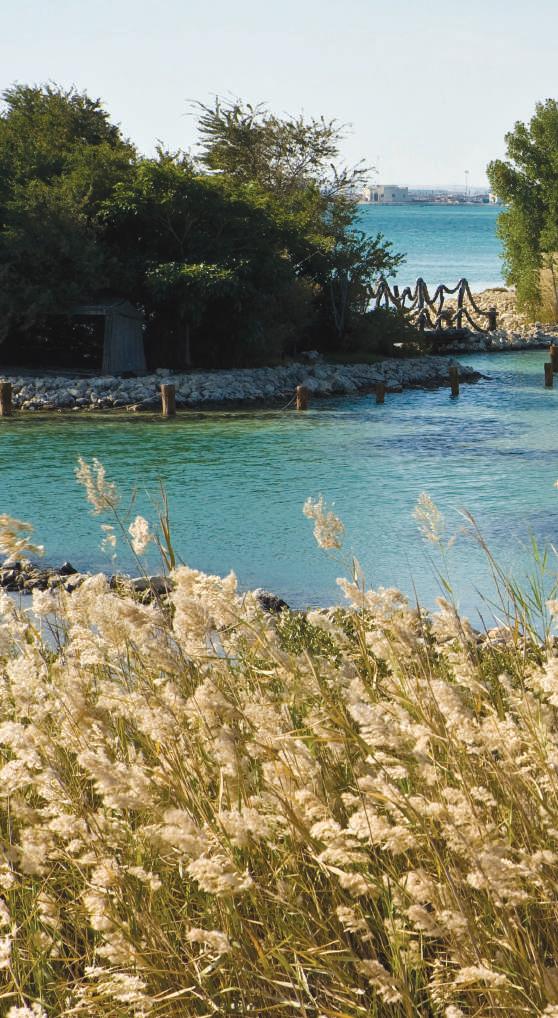
AFFORDABLE CLEAN ENERGY: GPIC’s Long Term Sustainability Goals include increasing renewable energy and energy efficiency; ISO 50001 certification; Ongoing projects and campaigns to save energy;
Installation of Energy efficient lighting LEDs continues. Since 2013, we have installed 7666 LEDs both in process and non-process areas resulting in an energy savings of 1696 MWH/Y and a GHG emission reduction by 846 tons CO2e/Y. A project for commissioning a 3 MW Solar plant is currently under study.
DECENT WORK AND ECONOMIC GROWTH: Providing jobs, contribution to Bahrain’s economy and supporting local contractors; Sponsoring events in the community to boost economic growth. GPIC has invested over US$ 5.582 billion into the national economy since its inception.
SDGs UNGC PRINCIPLES GRI DISCLOSURES/TOPICS GPIC’s CONTRIBUTION
GRI
Principle #1,2
102-27, 404-1
UNGC Principle #1,2,3,4,5,6 GRI 103-2, 201-1, 203-1, 4011, 401-3, 404-1, 404-3, 405-1, 405-2, 406-1, 414-1, 414-2
UNGC Principle #1,2,7,8,9 GRI 303-1, 303-2, 303-3, 3041, 304-2, 304-3, 304-4, 306-1, 306-2, 306-3, 306-5
UNGC Principle #1,2,7,8,9 GRI 201-1, 203-1, 302-1, 3022, 302-3, 302-4, 302-5
UNGC Principle #1,2,3,4,5,6 GRI 102-8, 102-41, 103-2, 201-1, 202-1, 202-2, 203-2, 301-1, 301-2, 301-3, 302-1, 302-2, 302-3, 302-4, 302-5, 303-3, 401-1, 401-2, 401-3, 402-1, 403-1, 403-2, 403-3, 403-4, 404-1, 404-2, 404-3, 405-1, 405-2, 406-1, 407-1, 408-1, 409-1, 414-1, 414-2
GPIC Sustainability Report 20202021 22
UNGC Principle #3,4,5,6,7,8,9
GRI201-1,203-1
INDUSTRY, INNOVATION & INFRASTRUCTURE: Innovation Committee and associated campaigns including linking them with SDGs; supporting innovation within the community and academia( For example InJaz innovation camp, university research, schools environmental research etc.)
In acknowledgement of its commitment and progress towards innovation, GPIC has won several times the Mohammed bin Rashid Al Maktoum Business Excellence and Business Innovation Awards.
UNGC Principle #1,2,3,4,5,6,10
GRI 203-2,405-2
REDUCE INEQUALITIES: Responsible Care protects wellbeing of all people involved with the company’s business; Sharing expertise with all industry regardless of size or position; equal employment opportunities; Injaz – working with all schools to develop skills and knowledge. Since most of the world’s poor are subsistence farmers, fertilizers help farmers to increase their incomes.
UNGC
SUSTAINABLE CITIES AND COMMUNITIES: GPIC’s long-term Sustainability Goals are in line with Bahrain’s Vision 2030; Contributing to Bahrain’s community and events.
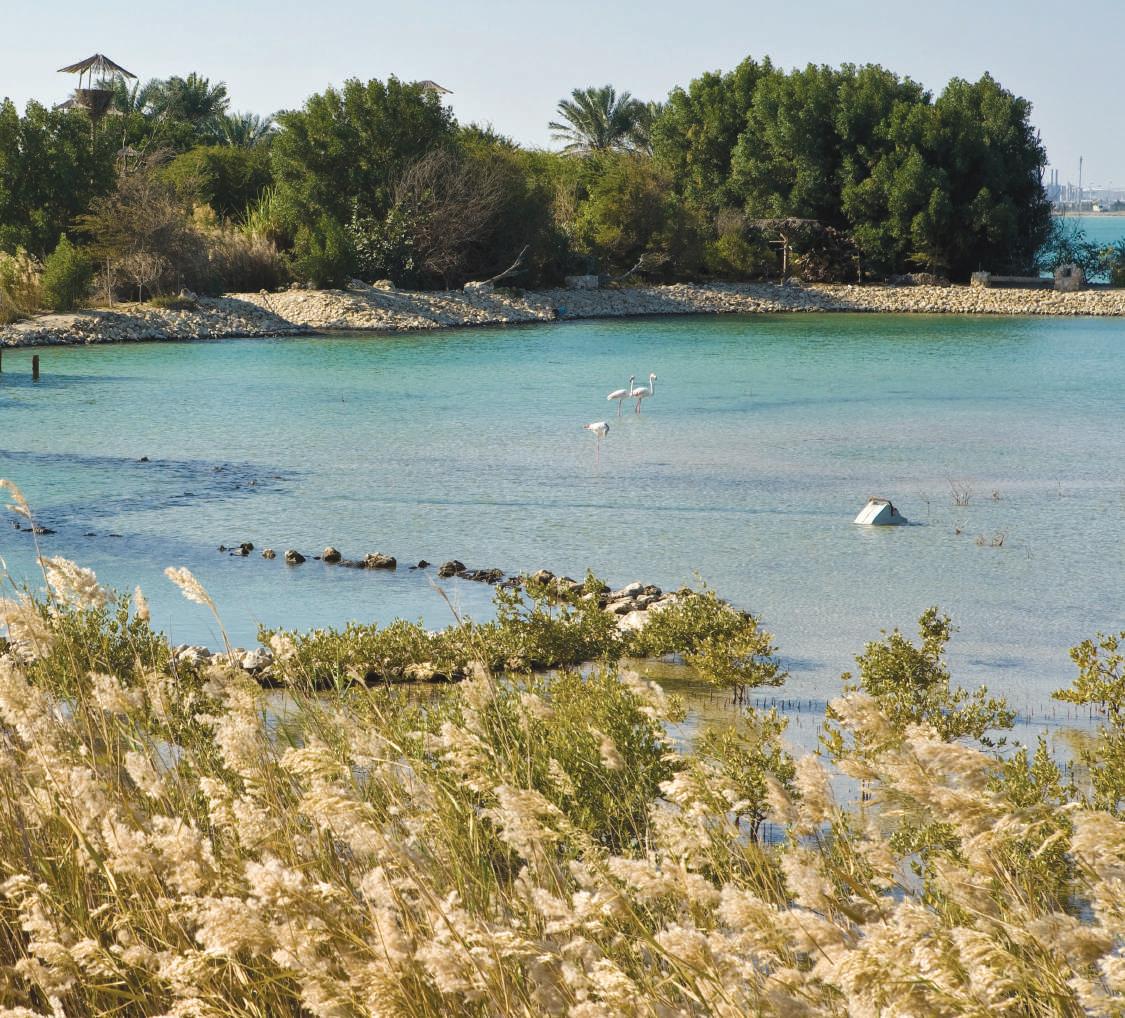
RESPONSIBLE CONSUMPTION & PRODUCTION: Resource efficiency; Energy conservation and efficiency, high on-stream factor resulting in less venting and flaring. Maintaining air and water quality. Continuously increasing recycling and reuse (e.g. cardboard recycling began in 2015); Ongoing campaigns to reduce waste and encourage recycling; currently underway with several optimization projects around sustainable resource efficiency. Sustainability Reporting and advocacy is part of its target 12.6.
CLIMATE ACTION: Bahrain committed to reducing its CO2 emissions at the UN COP 21 conference in Paris (2015); GPIC shared its CO2 emission reduction initiatives at the National level and the same were included in Bahrain’s INDC submitted to UNFCCC prior to COP21 agreement. Post COP 21, GPIC is working at national level on measuring and managing its CO2 emissions; GPIC is issuing its annual GHG inventory based on IPCC guidelines since 2016. Carbon Dioxide Recovery (CDR) and Urea plants are main contributors to CO2 emission reduction at GPIC. More than 1.4 million tons of CO2 have been captured by CDR since 2009
SDGs UNGC PRINCIPLES GRI DISCLOSURES/TOPICS GPIC’s CONTRIBUTION
Principle #1,2,7,8,9 GRI 203-1
UNGC Principle #7,8,9 GRI 204-1, 301-1, 301-2, 3013, 302-1, 302-2, 302-3, 302-4, 302-5, 303-3, 305-1, 305-2, 305-3, 305-6, 305-7, 306-1, 306-2, 306-3, 306-4, 417-1
Principle #7,8,9 GRI 201-2, 302-1, 302-2, 302-3, 302-4, 302-5, 305-1, 305-2, 305-3, 305-4, 305-5, 305-6, 305-7
UNGC
GPIC Sustainability Report 20202021 23
Linking the SDGs, UNGC, GRI and GPIC’s Contribution

LIFE BELOW WATER: Seawater outfall monitoring to protect sea life; Maintaining the GPIC Fish Farm where since inception more than 1 million fish have been harvested and released to the deep sea, GPIC follows strict marine standards for shipping products internationally; Regular monitoring of ground water through borewells ensures no pollution is taking place.
LIFE ON LAND: Engaging with the Supreme Council for Environment on developing Bahrain’s Biodiversity Strategy and online biodiversity database; Increasing employee awareness on biodiversity.

Biodiversity related projects at GPIC (Bird sanctuary, fish farm, mangroves plantation, date palm trees, Olive trees, Neem trees and green areas).
Participating in UN‘s Green Wave Campaign since 2015, distributing 3,600 saplings in 90 schools since inception.
PEACE, JUSTICE AND STRONG INSTITUTIONS: Aligned with human rights and labour laws; Working with the National Institute of Human Rights( NIHR) and Judicial Council to train and develop their staff.
PARTNERSHIPS FOR THE GOALS: Ongoing partnerships (e.g. UN Environment, Ministry of Education, InJaz, universities); founding of GPCA; working with the National Institute of Human Rights NIHR), Judicial High Council, IFA, AFA, UN Global Compact, GRI, RoSPA, National Safety Council, Nebosh, etc. and encouraging other companies to do the same.(For detailed list refer to the section on partnerships within this report).
The GPIC President demonstrated support for the UN and multilateralism at the UNGC Private Sector Forum in 2020 by signing the powerful statement from Business Leaders for Renewed Global Cooperation.
HH Shaikh Nasser bin Hamad Al Khalifa, Chairman of the Board of Directors of nogaholding (Oil and Gas Holding Company B.S.C) presents the Youth Creativity Award to a GPIC employee.
SDGs UNGC PRINCIPLES GRI DISCLOSURES/TOPICS GPIC’s CONTRIBUTION UNGC Principle #7,8,9 GRI 304-1, 304-2, 304-3, 3044, 305-1, 305-2, 305-3, 305-4, 305-5, 305-7, 306-1, 306-3
UNGC Principle #7,8,9 GRI 304-1, 304-2, 304-3, 304-4, 305-1, 305-2, 305-3, 305-4, 305-5, 305-7, 306-3, 306-5
UNGC Principle #1,2,3,4,5,6,10 GRI 102-16, 102-17, 102-21, 102-22, 102-23, 102-24, 10225, 102-29, 102-37, 103-2, 205-1, 205-2, 205-3, 206-1, 307-1, 406-1, 408-1, 410-1, 414-1, 414-2, 415-1, 416-2, 417-1, 417-2, 418-1, 419-1
UNGC Principle #1,2,3,4,5,6,7,8,9,10 GRI 203-2
GPIC Sustainability Report 20202021 24
GPIC’s Long-Term Sustainability Goals - A Vision for the Long-Term
Over the past, we have set and implemented goals that were critical to improve our environmental, health, safety, economic and social performance and governance. However, now we aim to look beyond the horizons and incorporate significant long-term goals that will help us meet our ambitions around sustainability and provide our organization and our stakeholders with the recognition for their efforts.
Our long-term goals aim to make a greater impact via scaling up our contribution and efforts towards the UNGC principles, and in helping us align our organization’s impact as a positive contributor towards the strategic ‘Bahrain’s Economic Vision 2030’. We have also shown alignment to the UN’s Sustainable Development Goals.
GPIC achieved more than 35 million man hours without a lost time accident. Fire plans of 15 high risk scenarios were prepared and mock drills carried out regularly.
COVID-19 related precautionary and mitigating measures were implemented to limit the spread of infections. Administering of COVID-19 vaccine has started and 98 % of our employees and contractors have been vaccinated and is continuing.
Corporate Social Responsibility
To ensure availability and readiness of security systems at 100% all the times
Supporting community and community initiatives
100% Security readiness 100% security readiness with zero security breaches
100% security readiness with zero security breaches
Regular security exercises and mock drills were carried out to ensure preparedness. Security enhancement capital project has been completed
Strategic Philanthropy: Sustained financial contributions to NGOs, Educational institutions, charity organizations etc.
OutReach: Achieve yearly target of schools environmental awareness lectures
Innovation: Sustained support to GPIC/ Ministry of Education Environmental Research Programme for schools
100% financial contributions as planned
100% financial contributions as planned
Strategic Philanthropy continued as part of being a good corporate citizen. GPIC contributed U$ I million dollars to the National drive to combat COVID-19
17 Environmental School awareness lectures completed out of scheduled 32.
2019-2020 Cycle could not be completed due to COVID 19 restrictions from March 2020 onwards
Environmental lectures in schools remain suspended in 2021 due to COVID-19
2020-2021 cycle was completed virtually using digital platforms
Below target due to COVID 19 preventive measures and restrictions on in-person lectures.
2019-2020 cycle was suspended due to COVID-19 restrictions however 2020-2021 cycle was completed virtually
Commitment to 1)UN Global Compact(UNGC) Principles 2) Food and Agriculture Business Principles

(FAB)3)Women's Empowerment Principles(WEPs) 4) UN's 17 SDGs
Ensure implementation of the universally accepted 10 principles of the UNGC & the 6 FAB Principles, WEPs and the SDGs
GRI report 2019/ UNGC COP 2019 issued March 2020 and UNGC COP 2020 issued February 2021
GRI report 20202021 and UNGC COP was issued in February 2022
Yearly reporting to UNGC -Communication on Progress(COP) and the Biennial GRI Sustainability reporting. Alignment of GPIC business functions with the SDGs.
Learning and Growth Development of Human Capital Achieve yearly target of qualifying local talent to take responsible positions within the Company
6,895 training hours for local employees were achieved in 2020
11,404 training hours for local employees were achieved in 2021
The drop in training hours as compared to previous years is because of COVID 19 preventive measures and restriction on inperson training. However we swiftly moved to virtual leaning and more than 70% of our training was virtual
AREA SUSTAINABILITY GOALS TARGET 2020 PERFORMANCE 2021 PERFORMANCE REMARKS SDG
Safety , Health & Security Protection of Human Health, Safety Zero Lost Time Accidents Zero Lost Time Accidents Zero Lost Time Accidents
PEOPLE
GPIC Sustainability Report 20202021 25
GPIC’s Long-Term Sustainability GoalsA Vision for the Long-Term
Phase out Ozone depleting and global warming potential HCFC ‘s including R-22 as refrigerants from GPIC
Replace R-22 Refrigerant AC units In progress. The new units for local control rooms of Syngas, CO2 and MUG will be replaced in November 2021.
Reduce GHG emissions below 2014/2015 levels for the existing plants
In progress. The new units for local control rooms of Syngas, CO2 and MUG will be replaced in March 2022 turnaround
AC’s with R-22 are being replaced with better alternatives Reduce Green House Gas (GHG) emission levels
In progress. Total GHG emissions for 2020 ( IPCC guidelines) is 1.12 million tonnes of CO2e.
In progress. Total GHG emissions for 2021 ( IPCC guidelines) is 1.14 million tonnes of CO2e.
Ensure efficient and continued operation of carbon dioxide recovery plant.
Maintain the current greenery projects and explore further expansion.
Maintain efficient and continued operation of all the plants to have minimum possible flaring and venting of GHGs mainly carbon dioxide and methane.

AREA SUSTAINABILITY GOALS TARGET 2020 PERFORMANCE 2021 PERFORMANCE REMARKS SDG PLANET Environmental Sustainability Expand the use of renewable energy at GPIC Provide Solar Energy to nonprocess area buildings A 3MW solar farm at GPIC is under study A 3MW solar farm at GPIC is under study
has earmarked
NOGA'S
MW solar
is under study
NOGA.
GPIC
an area for a 3 MW solar farm as part of
80
project. Currently the project
by
Optimize energy consumption so that every saleable tonne of product is attained within the target level of energy consumption Energy consumption<= 7.9 Gcal/MT of combined saleable product 7.42 Gcal /MT 7.57 Gcal /MT Maintain all equipment to operate efficiently and effectively. CDR boiler has been stopped and the excess steam from urea plant is being used resulting in a natural gas saving of 2770 KNm3/year natural gas saving of 2089 KNm3/year Explore & implement projects with energy conservation potential with focus on significant energy uses. To ensure Compliance to Environmental Legislation 100% compliance to Bahrain Environmental Legislation 100 % Compliance to Environmental legislation and timely submission of compliance reports on emissions, effluents, waste and chemicals 100 % Compliance to Environmental legislation and timely submission of compliance reports on emissions, effluents, waste and chemicals No cases of non- compliance. Reduce water consumption Increase recycle / Reuse of waste water streams Specific process water consumption per ton of product has reduced in 2020 due to efficient run of plants. Study to treat and reuse biological water was carried out with the nogaholding appointed consultant. Explore & implement projects with water conservation potential.
GPIC Sustainability Report 20202021 26
Implementation of GPIC Corporate Strategic plan 2030
Tap in potential areas of Growth Project opportunities in overseas countries being studied
Project opportunities in overseas countries being studied 2) MoU signed with Saipem to explore opportunities within Bahrain.
Implementation of GPIC Corporate Strategic plan 2030, tapping in potential areas of Growth.

Debottlenecking of existing facilities for improved energy efficiency and enhanced production capacities
The Debottlenecking (DBNII) Project study revealed that the project was not feasible and been cancelled.
MoU signed with Saipem to explore opportunities within Bahrain
Explore all opportunities to enhance production of all the production plants, improve efficiencies by adopting energy saving and conservation concepts throughout the complex, and also to explore major enhancement opportunities that aim at optimising production cost and improve efficiency.
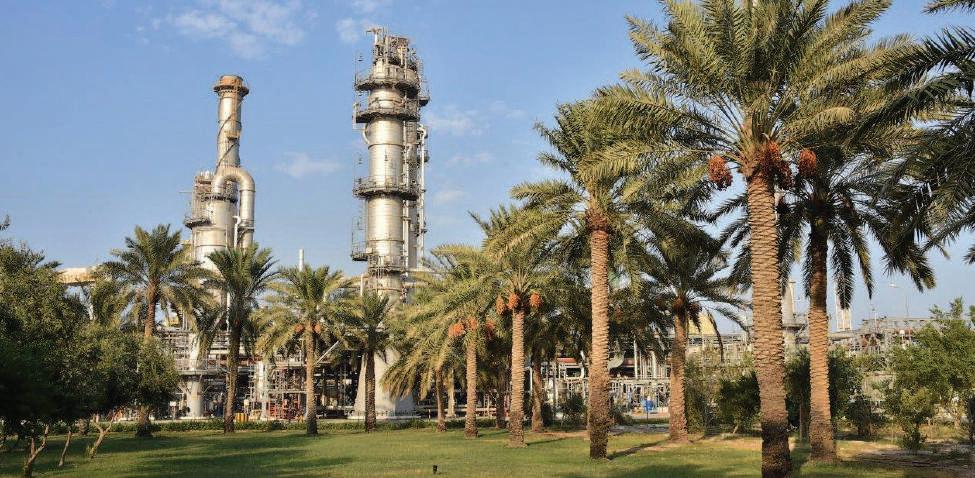
AREA SUSTAINABILITY GOALS TARGET 2020 PERFORMANCE 2021 PERFORMANCE REMARKS SDG
Economic sustainability Maintaining the financial Health of the Company Target Debt to Equity Ratio to optimum lowest 1 : 6 Target exceeded 1:19 Target exceeded Optimize costs, inventories,
financial health
the company.
PROFIT
expenditures and resource utilisation to maintain
of
Business Process Excellence Optimizing plants (Ammonia, Methanol and Urea) availability Actual on-stream factor>= budget on stream factor 99.76% on stream factor in 2020. 99.33% on stream factor in 2021. Enhance reliability and efficiency of plants and ensure Optimum Plants availability. GPIC Sustainability Report 20202021 27
THE NEW NORMAL The COVID -19 Challenge — Preserving our Present and Future
Our world today is dealing with a crisis of monumental proportions. The novel coronavirus is wreaking havoc across the globe, upending lives and livelihoods. The cost of the pandemic in terms of loss of human lives is painful, but the effects on the global economy and on sustainable development prospects are also worrying.
GPIC is mindful of the fact that while we must scale up the immediate health response to curb the spread of COVID-19, the response to the pandemic cannot be de-linked from the SDGs. Indeed, achieving the SDGs will put us on a firm path to dealing with global health risks and emerging infectious diseases. Achieving SDG 3 (Good Health &well-being) will mean strengthening the capacity of countries for early warning, risk reduction and management of national and global health risks.
The proactive steps that GPIC has taken for the past two years and is referenced in this publication, highlights how seriously the company is taking the COVID -19 challenge and in doing so is also addressing the SDG 3 and other Sustainable Development Goals.
GPIC believes that amid the coronavirus pandemic, the SDGs will help us build back better. The challenges posed by COVID-19 should rather spur us to accelerate and deepen our efforts during this Decade of Action to ‘recover better’, and build a healthier, safer, fairer and a more prosperous world.
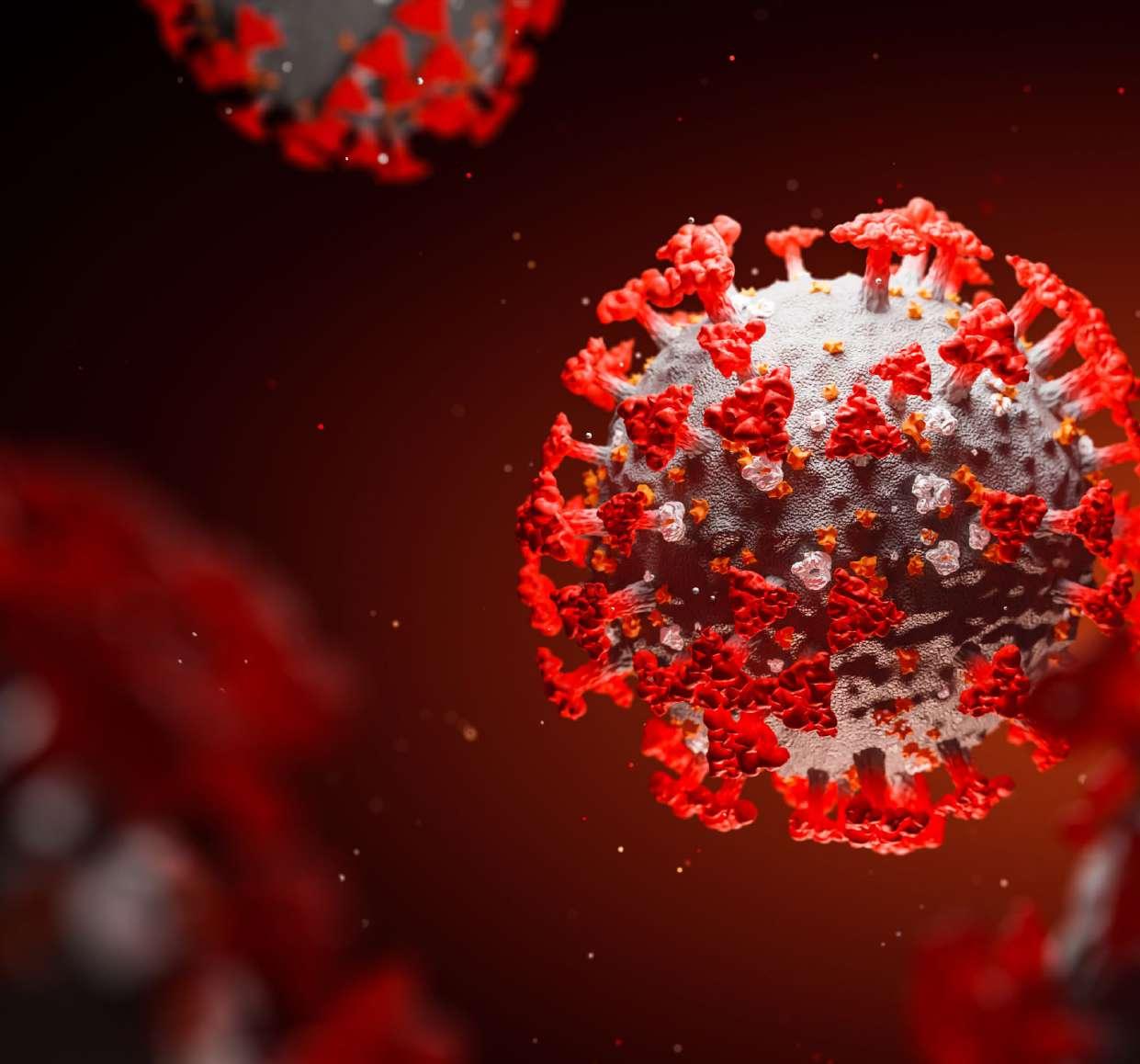
GPIC Sustainability Report 20202021 28
An additional 18 million health workers are needed, primarily in low and lower middle income countries, to achieve universal health coverage by 2030.
Good Health and Well-Being: WHY IT MATTERS
What’s the goal here?
To ensure healthy lives and promote well-being for all at all ages.
Why?
Ensuring healthy lives and promoting well-being is important to building prosperous societies.
However, the COVID-19 pandemic has devastated health systems globally and threatens already achieved health outcomes.
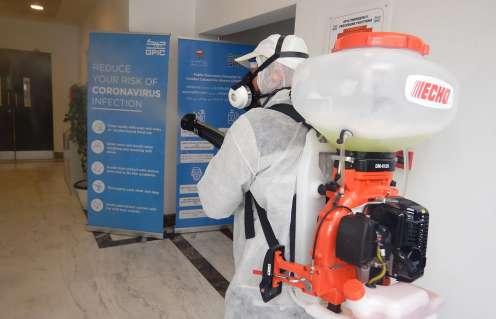

Most countries, especially poor countries, have insufficient health facilities, medical supplies and health care workers for the surge in demand.
The pandemic has shown that in rich and poor countries alike, a health emergency can push people into bankruptcy or poverty.
Concerned efforts are required to achieve universal health coverage and sustainable financing for health; address the growing burden of zoonotic and non-communicable diseases, tackle anti-microbial resistance and environmental factors contributing to ill health.
GPIC’s best practices in relation to COVID-19
• Primary focus on health, safety, well-being of workforce
• Strict adherence to National and International guidelines on COVID-19
• Precautionary approach followed
• Weekly rapid test for all
• Twice a month PCR test for all
• No entry into complex by visitors without a Vaccination certificate
• Virtual organization with max workers working from home
For detailed account of our response please read the enclosed section.
GPIC Sustainability Report 20202021 29
THE NEW NORMAL COVID-19 Pandemic - Our Response

The New Normal
As we have learned dearly, pandemics do not recognize national borders. Therefore, any sustainable recovery from the human and financial toll of COVID-19 requires a coordinated effort.
In this new normal, businesses must choose between recovering better together or losing ground by failing to embrace new partnerships and innovations. We must learn from our collective experiences, to realign and steer our world onto a more equitable, inclusive and sustainable path.
Following are the key lessons learned
• Ingenuity, agility, resilience and flexibility are the key
• Team work helps in a coordinated response to tackle the pandemic
• Prepare for the worst, include pandemic as ERM risks
• Remote work is doable and effective
• Communication is key
• Invest in technology, digitization
• Have a Plan B
• Personal hygiene is important
• Follow a precautionary approach as far as the pandemic is concerned
The COVID-19 Challenge- Preserving our Present and Future
The years 2020-2021 were extremely challenging for GPIC due to various challenges that rose for the organization because of the on going COVID-19 pandemic. Our primary focus remained the health, safety and well being of our work force. We take pride in managing the complexities with the team work and exhaustive efforts of our people. We have so far successfully tackled the challenge of on going COVID-19 pandemic through robust risk management, resilience and discipline. We proactively identified the pandemic outbreak caused by COVID-19 as one of the GPIC’s enterprise risks using the Bow-tie methodology, setting a number of preventive and mitigating measures to deal with the risk. We are happy that most of our work force remained safe and productive throughout the pandemic and thus are business remained productive and profitable. During the past two years, GPIC had a total of 103 positive cases( 63 employees and 40 contractors) who are fully recovered now.
COVID 19: Our Response
At GPIC our people showed an unwavering resilience to the COVID-19 challenge. A global pandemic required a world class response and hence we immediately instituted a multi -tier strategy and a dedicated task force and a hot line to facilitate and update our colleagues on latest medical information as well as provide and coordinate free medical services.
We ensured that work from home (WFH) became the new normal for which necessary technological and other requirements were efficiently and effectively facilitated. To address the health and safety concerns and ensure productivity of our workforce deputed at various locations within GPIC, we devised multitier approach that included general awareness programs and establishing stringent set of protocols on the guidelines of World Health Organization(WHO), Ministry of Health (MOH), Kingdom of Bahrain and established best practice procedures.
Below is a list of various initiatives that GPIC took to limit the spread of COVID-19 infection within its facilities and beyond ensuring the health, safety and well -being of its workforce.

GPIC Sustainability Report 20202021 30
Adherence to External and internal guidence instructions and procedures
+100 Directives issued by GPIC President from February 2020 to December 2021
COVID-19 GPIC’s Key Precautionary Steps
Following are the key areas where precautionary steps were focused:
Facial coverings mandated within GPIC. No one is permitted without a mask within GPIC
Proper use of PPE, including activities that require PPE in addition to facial covering
Disinfecting and hygiene, especially in common areas such as cafeterias, kitchen areas, break rooms, open office spaces and conference rooms. Disinfection carried on weekly basis during weekends

Body temperature Scan/ Vaccination/PCR test/ Rapid test for all employees, contractors and visitors
Social distancing (min 2m/6ft) and controlled access to key nerve centers such as control room and workstations
Site policies for contractors and visitors. All visits are suspended. Dine in not permitted in GPIC cafeteria.
Minimum possible number of employees and contractors at site +70% of non-shift workers WFH during high positive cases

Communication and awareness related to COVID-19.
Virtual meetings are used effectively both internal & external. Webinars used for non-stop learning.
Maintaining an inclusive culture through our behaviors and actions. Responsible behaviour
GPIC Sustainability Report 20202021 31
THE NEW NORMAL COVID-19 Pandemic - Our Response
• Business continuity plan was developed to ensure the safety of the workforce and the continuity of the business.
• Crisis Management Team (CMT) chaired by the President was established to manage the Pandemic Outbreak
• To date more than 100 directives have been issued related to the COVID-19 and associated steps to limit the spreads of infection
• Work from Home (WFH) system activated during this critical period for the majority of the general day workers.
• Sleeping in house facilities prepared for shift staff as part of business continuity plan.
• All Working from Home employees are being monitored by regular video conferencing and phone calls to ensure their availability at all times.
• We have established two 24/7 hot-lines for our employees and their families in case of need or emergency.
• All employees returning from overseas or after a leave of 14 days or more are being advised to follow Government regulations and Company guidelines on PCR testing, selfisolation and return to work.
• All female employees have been told to Work from Home, in order to protect them and their families.
• All employees have been directed to be vigilant with regards to Cyber Security.
• Electronic and vertical learning programme for graduate engineers and trainees has been issued.
• Mandatory Precautionary Measures for Protecting the GPIC Workforce at the Workplace and at Home has been reinforced.
• Thoroughly disinfecting all offices and facilities at GPIC complex on a weekly basis during the weekend.
• The checking of body temperature of everyone entering the complex is mandatory and wearing of masks at GPIC is compulsory.

• Gatherings of more than 2 people is prohibited within the complex, with the exception of maintenance in the plants.
• Coordination with other major companies in Bahrain and our partners PIC and SABIC is ongoing and on a regular basis to share information, knowledge and best practices.
• Workforce business continuity plan is prepared and ready for implementation whenever required.
• Installation of portable rapid deployable thermal imaging fever screening system “FevIR Scan”.
• Employees have been urged to register to “BeAware
Bahrain” Application launched by the National COVID 19 Taskforce.
• Partitioning sheets have been provided in vehicles and no one is permitted to sit with the driver in plant vehicles
• Special accommodation has been taken on lease by the company for the regular contractors so that they do not stay in labour camps.
• Employees are advised to wear face masks and maintain social distancing while being present at various areas around the complex .Common areas include hallways, offices, and kitchens etc. that include more than one individual .
• Employees has been advised to perform their prayer rituals alone in offices or workplace using their private mat. The General prayer is closed till further notice.
• Following the re-opening of commercial shops and rejuvenation of the economic activities, employees have been urged to be more careful and stay at home and apply all precautionary guidelines more than ever as the reopening of commercial activities does not mean things are back to normal.
• Employees have been reminded and urged to stay vigilant and take precaution measures to protect them self and their family members.
• Return To Workplace instructions has been issued.
• In view of increasing number of European suppliers who went on lock down/ shutdowns, close review is done with user’s departments, especially those related to Turnaround Capital Projects.
• Vendor General Meetings and Negotiation meetings are being conducted through on line virtual conferencing.
• GPIC employees and contractors encouraged to actively participate in COVID-19 National Vaccination Campaign.
• COVID-19 Rapid testing for employees and contractors has been increased for timely detection of COVID-19 positive cases to protect the work force from COVID-19 infection.
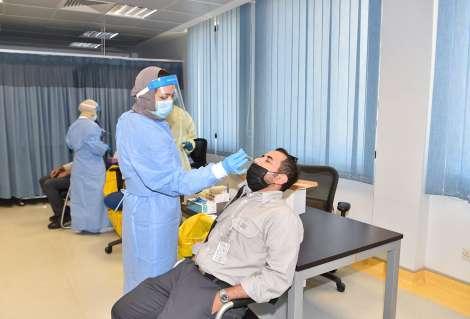
GPIC Sustainability Report 20202021 32
COVID -19 Vaccination Progress

First Dose 98.1% 1.9% Vaccinated Unvaccinated First Dose 98.1% 1.9% Vaccinated Unvaccinated Second Dose 98.1% 1.9% Vaccinated Unvaccinated Second Dose 98.1% 1.9% Vaccinated Unvaccinated
GPIC Employees Received COVID 19 Vaccination Contractors Received COVID 19 Vaccination GPIC Sustainability Report 20202021 33
of the Gulf Petrochemical Industries Company
Strategy & Profile

GPIC Sustainability Report 20202021 34

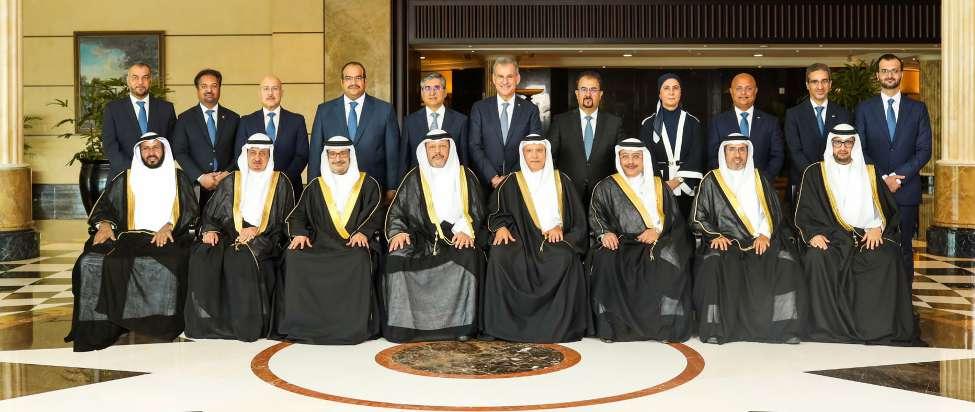
GPIC Sustainability Report 20202021 35
Strategy and Profile
Welcome to our sixth GRI Sustainability Report 2020-2021 ‘Resilient Adaptive Agile’. The theme of the report highlights our corporate culture that was instrumental in enabling us to tackle the various challenges posed by the COVID-19 pandemic. Our primary focus during this period has been the health, well-being, and safety of our employees, and due to various strategies implemented we have been able to protect our people from the negative impact of the pandemic and continue operations in a safe and sustainable way.
To promote transparency, accountability and to share our sustainability performance globally we have prepared this report in accordance with the GRI Standards-Comprehensive. Accordingly, we share our performance on social progress, environmental protection, economic growth and prosperity for the financial years 2020-2021.
For us, sustainability is an ongoing journey and we believe that taking a long-term strategic view will continue to serve us well now and into the future. We are drawing attention to and effecting positive change on global issues that have a significant impact on building a more sustainable and resilient value chain - not only for our Company, but also for the communities we proudly serve.
We remain actively involved in Bahrain’s commitments and efforts to deliver on the Paris Climate Agreement. We also proudly support the 17 Sustainable Development Goals (SDGs) and have taken several steps to make the SDGs a reality at GPIC and we are hopeful that these global goals will help transform our world for a better future.
We continue to strengthen our partnerships and collaboration at both the regional and international level. We have been members since 2012 and further strengthened our commitment to the world’s leading corporate sustainability initiative - The UN Global Compact (UNGC) and its ten principles.
As a stakeholder of GPIC, we thank you for your continued support and interest in the strategic efforts of GPIC. We appreciate you taking the time to review this report which encompasses our material sustainability initiatives and invite you to share your thoughts with us.
With sustained focus on all aspects of our business including; Safety, Security, Health, Well-being, Environment Excellence, Business Continuity, Record Production, Human Capital Development, Women Empowerment, Youth Engagement and an updated Strategic Plan - we are confident that we will be in a position to conquer all future challenges.
Together, I am convinced we can continue to inspire moments of optimism and happiness, create value and make a positive difference.
Dr. Ahmed Al Sharyan Chairman GPIC
 STATEMENT FROM THE CHAIRMAN
STATEMENT FROM THE CHAIRMAN
GPIC Sustainability Report 20202021 36
Presenting Overall Vision GRI 102-14
Together, I am convinced we can continue to refresh the world, inspire moments of optimism and happiness, create value and make a positive difference
 DR. AHMED AL SHARYAN CHAIRMAN GPIC
DR. AHMED AL SHARYAN CHAIRMAN GPIC
GPIC Sustainability Report 20202021 37
Strategy & Profile
At GPIC, we firmly believe that business has both the opportunity and an obligation to make the world a better place. Over the past 4 decades of our existence, this belief has fueled advances in our operations and how we invest in our business and support our communities. GPIC has continued to invest in the societies and communities in which it operates and, has extended its reach far beyond the traditional understanding of corporate philanthropy.
In 2020, with the COVID 19 pandemic taking the world by surprise, GPIC demonstrated resilience and adaptability and in line with its corporate culture of being proactive, agile, flexible, adaptive and willing to change, swiftly transformed to a virtual organization, enabling more than 70% of its workforce to work remotely.
The company was able to achieve favorable results despite the challenges and uncertainty faced due to our business resilience, operational excellence and sustained reliability. Our real pride, as I see it, comes from elements that are under our control, which really comes as a result of the commitment, dedication and high capability of our most valuable asset “PEOPLE”. Such commitment and high level of dedication enabled our plants to sustain reliability, and so making volumes of product available for our customer.
We are conscious that the future growth strategy of GPIC relies on how we measure and manage our stakeholder engagement, social responsibility, environmental sustainability and our overall financial optimization. Financial optimization is critical in today’s current economic uncertainty and volatile market conditions. And, in response to this ever-changing world, GPIC, consistently benchmarks
itself against global best practice and seeks out new and more resilient and sustainable ways to deliver its vision and stakeholders promise.
Business continuity, transparency and sustainability are the cornerstones of GPIC’s values and, it is through these values that we are taking the next steps towards monitoring and reporting excellence. Our new Sustainability Report is aligned to the Global GRI Standards and is also our ‘Communication on Progress’ towards the implementation of the UN Global Compact Principles. We have also highlighted our performance and progress on other key signature platforms, such as; UNGC Food and Agriculture Business Principles, Women Empowerment Principles and Sustainable Development Goals.
We look forward to the future with ambition and optimism. Our efforts embody GPIC’s continuing, 360-degree commitment to the environment and to serving the greater good. It’s a commitment that the people of GPIC uphold each and every day and I am incredibly proud of the positive impact these initiatives and our people, will have on future generations.
Samir A. Al-Abdrabbuh Managing Director GPIC
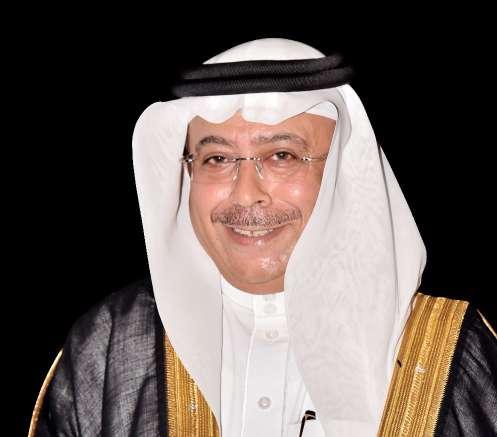
STATEMENT FROM THE
MANAGING DIRECTOR
Presenting Overall Vision GRI 102-14
GPIC Sustainability Report 20202021 38
At GPIC, we have long believed that business has both the opportunity and an obligation to make the world a better place. Over the years, this belief has fueled advances in our operations and how we invest in our business and support our communities
 SAMIR A. AL-ABDRABBUH MANAGING DIRECTOR GPIC
SAMIR A. AL-ABDRABBUH MANAGING DIRECTOR GPIC
GPIC Sustainability Report 20202021 39
Welcome to our sixth GRI Sustainability Report 2020 - 2021. This year marks the 42nd anniversary of GPIC’s commitment to sustainability and our ongoing commitment to ensuring we remain a responsible company, endeavouring to meet the needs of the present generation, whilst ensuring our future dexterity. We achieve this commitment through our focus and dedication to the UNGC ten principles, UNGC FAB 6 principles, the UN’s 17 SDGs, being a Community Member of GRI and, networking and collaborating with the public and private sectors, including NGO’s such as UN Environment, UNGC, the International Fertiliser Association (IFA), the Arab Fertiliser Association (AFA), Royal Society for the Prevention of Accidents (RoSPA) and the National Safety Council.
2020 and 2021 were extremely challenging years for GPIC amidst the on- going COVID-19 pandemic. Despite the uncertainty, we were able to overcome the challenges by being Resilient, Adaptive and Agile. Through our robust risk management and strict adherence to COVID-19 related guidelines, we were able to maintain the safety, health and well-being of our workforce and their families. This helped us in continuing to operate reliably and efficiently, producing and exporting record volumes of products.
In 2021, we achieved over 35 million person-hours without lost time hours and the Company’s Safety, Health and Environmental (SHE) achievements continue to shape industry’s standards both regionally and globally. We continued to excel in many areas and received several global awards including the prestigious Mohammed bin Rashid Al Maktoum Business Excellence and Business Innovation Awards 2021, the Arabia CSR Awards and the Contract Management Team of the Year Award.
As we usher in 2022 and beyond, amidst the on- going COVID-19 pandemic, we have to transform to the ‘new normal’ because business as usual is not a choice any more. Our ‘Optimise Cost to Survive’ mind-set must remain focused; that we must deliver financial success and sustainable returns for our shareholders; and we will continue to innovate beyond the boundaries of standard practices; and, we will build our people capability and deliver on the ambitious goals and targets set for the future. We must target and work to achieve a successful and safe Turnaround 2022. We can achieve this and more through the values, reliability, integrity, professionalism and team work of our work force.
GPIC can maintain its position as a pioneer in best practice and sustainability - as it has done for the past 4 decades, and contribute to the global transformation for a better tomorrow, by taking action on the 17 Sustainable Development Goals.
Yasser Abdulrahim Alabbasi President
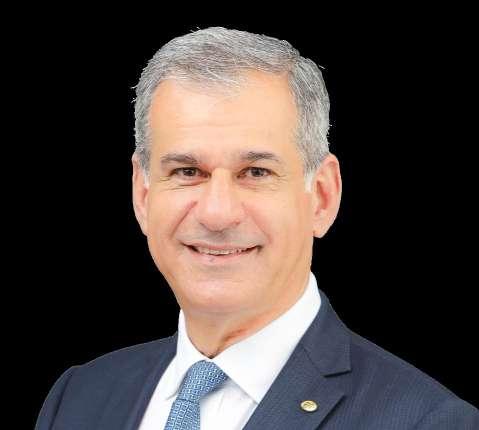
STATEMENT FROM THE PRESIDENT Presenting Overall Vision GRI 102-14
GPIC Sustainability Report 20202021 40
GPIC
Strategy & Profile
Our resilience to overcome this year's challenges amidst the COVID-19 pandemic is down to our incredible Board of Directors and our employees though their loyalty, discipline and professionalism
 YASSER ABDULRAHIM ALABBASI PRESIDENT GPIC
YASSER ABDULRAHIM ALABBASI PRESIDENT GPIC
GPIC Sustainability Report 20202021 41
General Disclosures
GRI Standard Number: GRI 102
Disclosure Number: 102-15
Key Impacts, risks and opportunities

We are committed to a precautionary approach in relation to the environment and development. Being a member of UN Global Compact, the we are committed to all the ten principles including principle number 7 - “Businesses should support precautionary approach to environmental challenges”.
As a responsible corporate citizen, we continue to evolve our well-defined process for assessing and managing risks in the face of uncertainty. We observe a science-based process, ensuring decision-making includes an appropriate evaluation of risks and benefits. It applies to current products as well as those in development for the future.
We uphold the ‘Precautionary Principle’ as an application of the principles of risk assessment and risk management in areas including but not limited to hazard identification, characterization exposure assessment and risk assessment. Risk management within the organization encompasses the identification, selection and implementation of alternative actions for addressing risks through the control of identified hazard(s) and/or exposure.
The company’s operations could be affected by a spectrum of risks, some of which are beyond our control. Corporatelevel identification and management of risk is systematically accomplished through our Enterprise Risk Management (ERM) approach. The most significant of risk factors that could impact our business are included within our Enterprise Risk Register. These ten risks cover the most significant of risks ranging from financial, operational, Safety, Health and Environment, reputational, cyber security, marketing, shareholders, raw material availability, market volatility, talent management, etc.
The Company assesses financial risk from many perspectives. Examples include the potential impact of climate-related events, access to credit, and volatility in purchased feedstock and energy costs. Risk management results are regularly communicated internally with a formal
annual review with the Board of Directors and the Audit, Finance and Risk Committee. GPIC’s Internal Audit Function plays a major role in ensuring ethical business processes within our internal functions.
All the ERM risks are regularly reviewed and updated as deemed necessary. During 2020 a new risk related to COVID-19 pandemic was introduced and additionally all the 10 ERM risk were reviewed and the risk profiles updated respectively in relation to the COVID-19 pandemic.
Companies in the competitive Oil and Gas Sector had to work twice as hard during 2020 to keep up with the rapid and ever-evolving developments due to the pandemic. This resulted in them employing new and innovative processes and procedures to maintain safe and sustainable operations
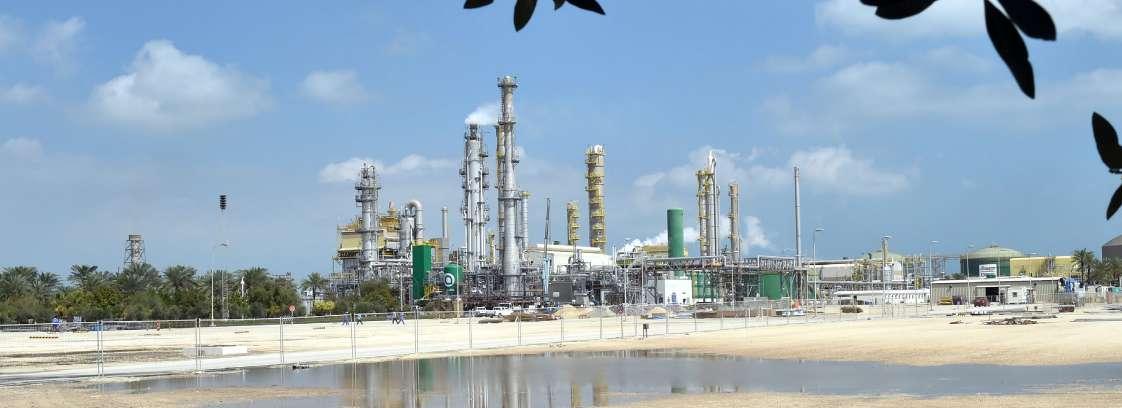
The pandemic encouraged companies to enhance their operations to keep up pace with the global changes within the sector by further developing their management and operational processes. It also ensured that we focused on becoming more lean and sustainable.
This was the fundamental driver behind the need to initiate, develop and improve alternative plans while still expanding practical and management strategies to be able to achieve better results at the lowest possible cost and in the shortest possible time. This development evolved in parallel to the company implementing stringent procedures to protect our workforce from the pandemic and ensure safe and sustainable operations.
The company’s Business Resilience Committee, in coordination with the Executive Management Team, played a prominent role in managing the risks brought on by the pandemic and included even the smallest of risks and details to minimize the impact to the company.
The committee have conducted a thorough study that included all management and operational processes with a focus on analyzing the risks associated with the pandemic.
GPIC Sustainability Report 20202021 42
The committee conducted a review and worked to implement all the plans that were previously prepared. This was done in tandem with all the relevant authorities and even included the adherence to all government guidelines and laws to ensure GPIC’s conformity with the prevalent national COVID-19 precautionary measures.
Risk of economic uncertainty impacted every industry and sector during 2020 amidst the pandemic. This provided a challenge and opportunity to GPIC to maintain business continuity through streamlined and efficient operations , strategic cost optimization initiatives and ensuring appropriate health, safety and availability of its workforce through strict adherence to the national precautionary measures in relation to COVID-19.
GPIC’s leadership and the corporate board are firmly committed to sustainable growth and our expansion aspirations for this organic growth in the petrochemical market, is firmly built on emergent operational capacity and cultivating our global customer base. We have a talented workforce and supportive business environment which allows us to continue to grow our global footprint. We also firmly believe that our competitive cost of doing business, combined with our solid partnerships and relationships, at the local, regional and international level, are some of the reasons we are confident in achieving our expansion plans in the near future.
During 2020/2021 in-spite of the challenging climatic conditions and the rising temperature of the sea water peaking to more than 39 degrees Celsius at its sea water intake, GPIC was able to maintain all its plants at the highest level of safety, productivity and reliability.
Our risk management portfolio has become more robust since we have taken on board the Business Continuity Management system ISO-22301. We have combined both the ERM and BCM under the umbrella of the Resilience committee. All the Business Impact analyses and the Business Continuity plans are reviewed and exercised regularly across the organization. The COVID-19 pandemic has been added as a new ERM risk in February 2020 within our Risk Register.
GRI Standard Number: GRI 102
Disclosure Number: 102-1
Name of the Organization
Gulf Petrochemical Industries Company
GRI Standard Number: GRI 102
Disclosure Number: 102-2
Activities, brands, products, and services
Gulf Petrochemical Industries Company (GPIC) was established in the Kingdom of Bahrain in December 1979 as a
joint venture between GCC member states for the manufacture of fertilizers and petrochemicals. The joint venture is equally owned by nogaholding, the Government of the Kingdom of Bahrain, SABIC Agri-Nutrients Investment Company and the Petrochemical Industries Company, Kuwait.
GPIC uses natural gas (which is readily available in Bahrain) as a feedstock for the production of ammonia, urea and methanol, totalling 1.6 million tonnes each year. The ammonia and methanol plants were commissioned in 1985 whereas the granular urea plant was started up in 1998..
GRI Standard Number: GRI 102
Disclosure Number: 102-3
Location of Headquarters
Sitra, Kingdom of Bahrain
GRI Standard Number: GRI 102
Disclosure Number: 102-4
Location of operations
Sitra, Kingdom of Bahrain
GRI Standard Number: GRI 102
Disclosure Number: 102-5
Ownership and Legal form
Gulf Petrochemical Industries Company (GPIC)is a joint venture setup and owned by nogaholding, the Government of the Kingdom of Bahrain, SABIC Agri-Nutrients Investment Company and the Petrochemical Industries Company, Kuwait.
GRI Standard Number: GRI 102
Disclosure Number: 102-6
Markets Served
GPIC meets the global demand of fertilizers and petrochemicals by producing and exporting ammonia, methanol and granular urea. Key markets include USA, Brazil, China, Thailand, Singapore, South Korea, Taiwan, Africa, India, Australia.

GRI Standard Number: GRI 102
Disclosure Number: 102-7
Scale of the Organization
Personnel count was 436 on December 31, 2021
Net Sales 2020 - US$ 270million
Net Sales 2021 - US$ 513 million
Total Capitalization - US $159 million (100% equity)
Total Assets 2020 – US$ 553 million
Total Assets 2021 – US 679 million
Total number of operations- Single site operation at Sitra, Bahrain
Quantity of products produced - 2020 – 1,632,765 metric tonnes
Quantity of products produced -2021 - 1,612,089 metric tonnes
GPIC Sustainability Report 20202021 43
General Disclosures
GRI Standard Number: GRI 102
Disclosure Number: 102-8
Information on Employees and other workers
GRI Standard Number: GRI 102
Disclosure Number: 102-41
Collective Bargaining Agreement
GRI Standard Number: GRI 102
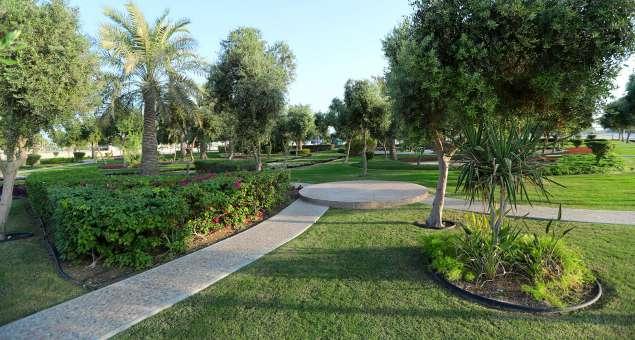
Disclosure Number: 102-9
Supply Chain
GPIC being a Responsible Care certified Company and IFA protect and Sustain product stewardship certified company puts great emphasis on maintaining safety, health, security and environmental excellence throughout the product lifecycle.

GPIC operates in an integrated manufacturing environment. Basic raw materials are processed through many stages to produce ammonia, methanol and granular urea.
The main raw material that feeds the integrated production of the Company’s three products is natural gas. The Company purchases natural gas from Tatweer, mainly to produce ammonia and methanol and also to generate electricity and steam. GPIC also purchases electric power to supplement the internal generation. The products from the ammonia production process which are mainly liquid ammonia and gaseous carbon dioxide are used as raw materials for the manufacturing of granular urea.
EMPLOYEES BY GENDER FEMALE MALE TOTAL EMPLOYEES 2014 Number of Employees 50 528 578 Percentage 8.7 % 91.3% 100% 2015 Number of Employees 53 515 568 Percentage 9% 91% 100% 2016 Number of Employees 50 464 514 Percentage 9.73% 90.27% 100% 2017 Number of Employees 48 429 477 Percentage 10.06% 89.94% 100% 2018 Number of Employees 36 415 451 Percentage 7.98% 92.02% 100% 2019 Number of Employees 35 390 425 Percentage 8.24% 91.76% 100% 2020 Number of Employees 32 412 444 Percentage 7.2% 92.8% 100% 2021 Number of Employees 31 405 436 Percentage 7.1% 92.9% 100% GPIC EMPLOYEES AS LABOUR UNION MEMBERS TOTAL EMPLOYEES EMPLOYEES AS LABOUR UNION MEMBERS % OF EMPLOYEES AS LABOUR UNION MEMBERS 2014 578 497 85.98% 2015 568 482 84.85% 2016 514 459 89.3% 2017 477 436 91.4% 2018 451 386 85.5% 2019 425 376 88.4% 2020 444 386 86.9% 2021 436 381 87.3%
GPIC Sustainability Report 20202021 44
The three products are exported globally by our marketers who are also our shareholders, i.e., SABIC Agri-Nutrients Investment Company Saudi Arabia and PIC Kuwait. These products are transported by sea. Proper handling of these products is critical to avoid harm to people’s health or to the environment and we are committed to quality, safety and sustainability throughout our operations. GPIC Purchasing collaborates with suppliers around the world to help our business to meet the objectives for profitability, growth, innovation, diversity and sustainability. GPIC Purchasing looks for suppliers that demonstrate a commitment to reliable, high-quality supply relationships embodying highly responsible, ethical business practices, including sustainable labor practices. As an enhancement, in 2014, Responsible Care aspects related to minimum Safety, Health and Environment requirements have been added in the pre-qualification criteria of services’ contractors. This criteria requires contractors to provide their SHE policies, training records, previous accident/ incident records, hazardous waste management license and certification etc.
In light of the current COVID-19 situation several counter measures were taken to ensure the sustainability of our supply chain. In view of increasing the number of European suppliers who went on lock-down/ shutdowns, close review, follow-up and alternate arrangements were part of some of the mitigating measures taken during the period.
GRI Standard Number: GRI 102
Disclosure Number: 102-10
Significant changes to the Organization and its Supply change
Global economic challenges faced by the industrial sector amid the COVID-19 pandemic marked by a sharp decline in prices of petrochemicals and fertilizers resulted in a significant impact on GPIC profits in 2020. However the product prices increased significantly in 2021 and coupled with our operational resilience and production continuity and the health, safety, well being and employability of
our work force, we were able achieve business continuity and greater profitability than anticipated. Furthermore, despite the challenges posed by the COVID-19 pandemic, the Company was able to maintain its position and made significant achievements in health, safety and environmental areas as well as reinforced its commitment towards social responsibility. GPIC continued to develop its relationships with international entities and confirmed its role as a significant contributor to Bahrain’s economy through its approach towards the foundations of sustainable development as well as the preservation of the environment and ensuring financial stability.
Petrochemicals and Fertilizer products related to GPIC, their outlook is proving to be challenging during the near future which requires constant monitoring and analysis of the Company’s position in order to sustain. This challenge and opportunity is further compounded by the Global drive towards decarbonization in the quest to NET ZERO emissions by 2050/2060. In this regard GPIC continues to explore rigorously potential growth and expansion opportunities including;
a) Diversify into new products
b) Study, foster and invest in downstream petrochemical industries
c) Continue to look at investment / growth opportunities abroad through mergers/ acquisitions or green field projects where feedstock is competitive and available.
On the organization side, Mr Yasser Abdulrahim Alabbasi became the new President of GPIC in 2021 as the former President Dr. Abdulrahman Jawahery was appointed by the Country’s leadership as the new CEO of Bahrain Petroleum Company( BAPCO). With this organizational change some further changes at the Executive Management level took place with Mr Adnan Al Mahmood becoming the General Manager Corporate Support and Mr Fadhel Alansari takes the position of Executive Advisor reporting directly to the President.

One of our biggest challenges is to have a safe and successful maintenance turnaround in March 2022
GPIC Sustainability Report 20202021 45
YASSER ABDULRAHIM ALABBASI GPIC PRESIDENT
General Disclosures
GRI Standard Number: GRI 102
Disclosure Number: 102-11
Precautionary principle or approach
GPIC supports a precautionary approach related to the environment and development. Being a member of UN Global Compact, the Company is committed to all the ten principles including principle number 7 - “Businesses should support precautionary approach to environmental challenges”.

As a responsible corporate citizen, GPIC continues to use a well-defined process for assessing and managing risks in the face of uncertainty. This process is science-based, ensuring decision-making includes an appropriate evaluation of risks and benefits. It applies to all current products as well as those being developed in the future.
GPIC views the Precautionary Principle as an application of the principles of risk assessment and risk management. Risk assessment includes hazard identification, characterization, exposure assessment and risk assessment. Risk management encompasses the identification, selection and implementation of alternative actions for addressing risks through the control of identified hazard(s) and/or exposure.
GRI Standard Number: GRI 102
Disclosure Number: 102-12
External Initiatives
We partner with organizations around the world, support global sustainability initiatives, and engage regularly with outside stakeholder groups. In addition to our direct business engagement, many of our employees give back through corporate philanthropy and volunteerism. Examples of externally developed principles and initiatives that we support include;
UN Global Compact: Since 2012, GPIC has committed to aligning our operations and strategies with the ten principles in the areas of human rights, labor, environment and anticorruption as outlined by the UN Global Compact.
(For details refer to the section on UN Global Compact)
UN Global Compact Food and Agriculture Business (FAB)
Principles: In 2014 GPIC committed to and endorsed the 6 Food and Agriculture Business Principles.
(For details refer to the section on FAB 6 Principles)
UN Global Compact Women’s Empowerment (WEPs)
Principles: In 2014 GPIC’s President signed his support and commitment to the WEP’s.
(For details refer to the section on WEPs)
GPIC’s Commitment to Responsible Care® RC 14001 Management System:
GPIC is certified to Responsible Care RC 14001 Management System since 2010. Responsible Care is the global chemical industry’s unifying commitment to the
safe management of chemicals throughout their life cycle, while promoting their role in improving quality of life and contributing to sustainable development. As a signatory to the global charter GPIC will actively strengthen the Responsible Care initiative worldwide and is committed to a corporate leadership culture that proactively supports safe chemicals management through the global Responsible Care initiative, safeguarding people and the environment, strengthening chemicals management systems, influencing business partners, engaging stakeholders and contributing to sustainability.
Benchmarking through ISO standards and Management systems: GPIC is one of the few companies globally who are certified to several ISO standards and other management systems
(For complete list of management systems refer to GPIC Overview)
GRI Standard Number: GRI 102
Disclosure Number: 102-13
Membership of Associations
GPIC takes an active role in many international, regional and local organizations, such as the United Nations, Fertilizer Associations, Sustainability and CSR organizations, Health and Safety organizations and the educational institutions. Some of the benefits that GPIC reaps out of its engagement with international and regional organizations are:
• Add value to the organization by obtaining best practices and know-how in house
• Establish international network of associate that can be tapped into when required
• Provide GPIC workforce opportunities to work with and interact with international expertise
• Further solidify the goodwill and reputation of GPIC
GPIC Sustainability Report 20202021 46
Below is a list of our key engagements:
International and Regional Organizations
United Nations
• UN Global Compact
• UN Environment
• UN Food and Agriculture Organization
• UN through Local Government
Fertilizer and Chemical Associations
• International Fertilizer Association (IFA)
• Arab Fertilizer Association (AFA)
• Gulf Petrochemicals and Chemicals Association (GPCA)
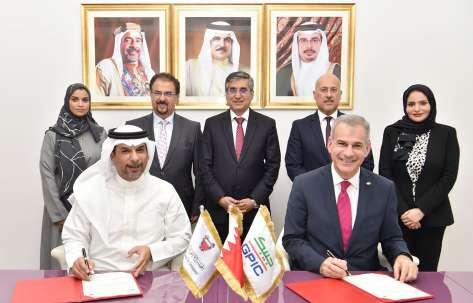
Health and Safety Organizations
• National Safety Council – USA
• Royal Society for the prevention of accidents (RoSPA)
• National Examination Board in Occupational Safety and Health (NEBOSH) – UK
• British Safety Council – UK
Educational Institutions
• Ministry Of Education, Bahrain
• Injaz Bahrain (part of Junior Achievement Worldwide)
• Bahrain Centre for Strategic International & Energy Studies (DERASAT)
• Bahrain Institute of Public Administration (BIPA)
Others
• Global Reporting Initiative (GRI)
• Bahrain Society of Engineers
• Bahrain Health and Safety Society
GRI Standard Number: GRI 102
Disclosure Number: 102-45
Entities Included in the Consolidated financial statements
GPIC does not have any subsidiaries
GRI Standard Number: GRI 102
Disclosure Number: 102-46
Defining report content and topic boundaries
Reporting Principles:
This report is prepared in accordance with the GRI Standards (2016 Edition) – ‘Comprehensive’, to promote transparency, accountability and to share our sustainability linked performance globally. The GRI content index is available on pages 198-208.
The content and quality criteria provided by the GRI Standards, which includes sustainability context, stakeholder inclusiveness, materiality, completeness, balance, comparability and reliability, are an integral part to GPIC’s reporting process.

Topic Boundaries:
Topic Boundary within the organization
As part of the materiality assessment, we have identified
where the impact of material topics could occur, both within and outside of the Company. Within the Company, material topics impact the entire organization. Outside of the Company, material topics impact areas such as value chain (which includes our suppliers), our transportation, distribution, customers and the broader society.
In line with the GRI Boundary protocol, “where the impacts occur” (Disclosure 103-1), the reporting boundary was determined based on where the impacts related to a material topic occur. Therefore, this report includes GPIC’s operations at its production facilities in Sitra, Kingdom of Bahrain.
Data on joint ventures, contractors, suppliers and clients are not included unless specifically mentioned in line with any material impact.
Data Collection and reliability: Information for this report was collected through an internal system to meet specific data collection requirements, ensure accountability and integrity. The Company has set up a formal Sustainability Reporting Committee (SRC), which includes representation from all significant areas of the business. This ensures that we are engaging people from across the entire business operation for the Sustainability Reporting process. The GRI disclosures related to material aspects were assigned to different members of the SRC who coordinated the responses and data input require within their relevant sections of the Company to provide the appropriate subject data and information required for the reporting process.
The data was then verified and compared with the previous year’s data and any significant deviations were justified. This structure also ensures that various data points are challenged, reviewed and confirmed by subject matter experts (SMEs) appropriately.
In compliance with the GRI standards, we aim to provide timely and complete data. Therefore, the report discloses both successes and challenges for the different material aspects. This supports the Company in maintaining the quality of the report, and building trust and credibility with relevant stakeholders.
We confirm the accuracy of our safety and economic data presented in the report. The accuracy of the environmental data depends on the method of measurement, the calculation procedure, emission factors used and whether estimates have been used or not.
The GRI standards recommend that reporters conduct a sustainability-focused materiality assessment to determine the report content. Materiality as defined in the GRI Sustainability Reporting Standards and as that were used for this report includes those issues that reflect the organization’s significant economic, environmental and social impacts; or those that substantively influence the assessments and decisions of the stakeholders.
GPIC Sustainability Report 20202021 47
GPIC Signs a Memorandum of Understanding to plant mangroves with the Supreme Council for Environment
General Disclosures
GRI 102-46
Fundamental processes:
Following the complementary processes together form our picture of materiality, as defined in the GRI Reporting Standards.

Surveys:
In 2015/ 2016, GPIC conducted an extensive stakeholder and corporate interview process to identify key issues, that are the most important and relevant for stakeholders of GPIC as a business entity.
More than 100 stakeholders, both internal and external were surveyed, and some of the surveys were also followed up with interviews, meetings and telephonic discussions. This was carried out to get a clear understanding of the issues that impact us from an economic, environmental and social perspective, and to also be able to prioritize some or all of these issues based on their overall impact on us, as a business.
In 2017, 2019 and 2021 we carried out a high-level review of our materiality, by engaging with both internal and external stakeholders inviting them to validate their previous sustainability survey priority issues and/ or provide us with their perspectives on the new/ emerging issues. More than 80 internal and external stakeholders were engaged in the process. We also used these surveys for our current materiality assessment. For the 2021 survey, we have specifically added new risks related to the Coronavirus pandemic.
Media search:
The purpose of performing a media search is to:
• Identify possible risks GPIC faces via national and international media coverage.
• Identify additional issues to include in GPIC’s Sustainability Strategy and report upon accordingly. The methodology of our media search is as follows:
• In more than 20 media sources we searched for ‘hits’ for GPIC and its subsidiaries when relevant.
• We used ‘search strings’ in order to filter out sustainability related material issues.
• Results were prioritized by number of hits, sentiment and relevance towards GPIC.
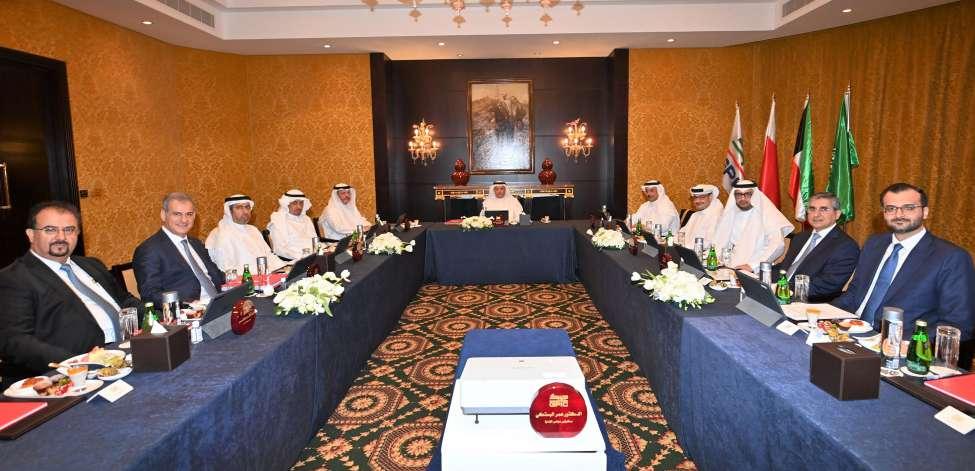
During the media search, we identified the material issues and classified their importance based on which subjects were often in the news, and how relevant the topic was for GPIC. To ensure that we actually captured all issues that were deemed relevant, the media search was extended to cover the ‘petrochemical’ sector and our stakeholders in the region.
Issues pertaining to International Standards and Benchmarking:
Given our international certifications of management systems, various benchmarking studies and feedback received from external certification/ awarding bodies, we have also included some issues that have been raised during these processes into our discussions with our stakeholders.
GPIC Sustainability Report 20202021 48
GRI 102-46
Sustainability strategy and our long- term sustainability goals: Our sustainability strategy and our long-term sustainability goals provide a basis for our report content. (Refer to our sustainability strategy and long-term sustainability goals).
Having prioritized the material issues, accounted for the externalities, and applied a lifecycle thinking where relevant, the materiality assessment at GPIC becomes a process that impact GPIC beyond just the content of GPIC’s sustainability report, but also an important element for the Company to incorporate sustainability and risk assessment into its strategy; leverage existing resources for sustainable value creation; and engage more effectively with our stakeholders on key issues that have a broader impact.
GRI Standard Number: GRI 102
Disclosure Number: 102-47
List of material Topics:
Our materiality mapping process has proven to be a significant step in our sustainability journey, reinforcing to us that all aspects of the business matter to our stakeholders.
At GPIC, we have a fairly unique position as an organization. We are the only native petrochemical organization in the Kingdom of Bahrain, with two significant regional producers engaged as key investors in our organization. We have found that because the community (business and local population) in Bahrain are well integrated and interlinked within the Kingdom, there is high consistency in terms of all issues identified as being of high priority.
The issues identified fall under key development area and can be included under key themes of focus which we monitor, evaluate and develop on a continuous basis. All aspects listed from our materiality process are deemed to be material to GPIC with impacts both within and outside our organization.
1. Environment and CSR:
• Water pollution
• Marine Environment and quality
• Waste management (hazardous and non-hazardous waste management)
• Air Pollution
• GHG Emissions and Climate Change
• Water Conservation
• Energy saving
• Environmental Awareness (in the community)
• Community Engagement and awareness
• Environmental compliance

• Biodiversity
2. Responsible Business:
• Anti-corruption
• Corporate Governance
• Human rights
• Labour rights
• Health & Safety
• Equal rights & Equity (Gender/ Minority rights)
• Partnership & collaborations
• COVID-19 Pandemic
3. Business Continuity:
• Sustainability
• Reputation
• Process & Product safety
• Financial performance/profitability
• Education, training & development
• Raw materials & resources
• Cyber Security
• Circular economy
GPIC Sustainability Report 20202021 49
General Disclosures
GRI 102-47
Ongoing assessment process: We have come to understand that the risks and opportunities we face are constantly evolving, and have a multifaceted impact on our stakeholders while also being quite interdependent.
As a part of our development curve, we aim to strengthen and broaden our enterprise risk management processes to enhance the quality of information to our stakeholders on our analysis of the sustainability issues that are deemed material. This can be achieved by adopting a strategy that focuses on more formal and frequent engagement with stakeholders, including shareholders, communities and civil society organizations within the Kingdom.
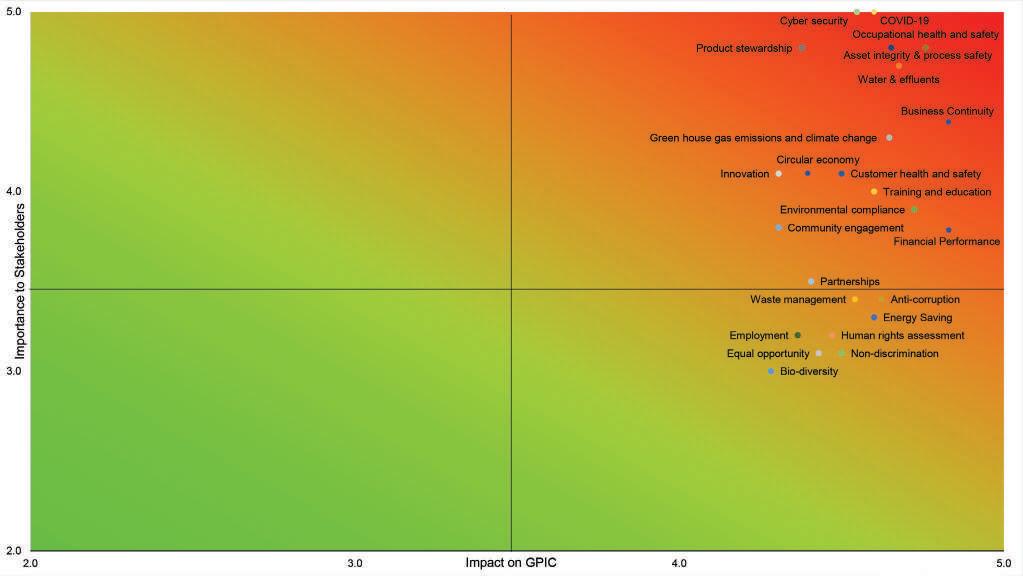
GRI Standard Number: GRI 102
Disclosure Number: 102-48
Restatements of Information: There are no restatements of information

GRI Standard Number: GRI 102
Disclosure Number: 102-49
Changes in Reporting:
There were no significant changes in reporting during the subject period.
GRI Standard Number: GRI 102
Disclosure Number: 102-40
List of stakeholder groups:
Now in our fourth decade of existence, with operations at our manufacturing facility in Bahrain and exports that span the globe, we believe stakeholder engagement is vital to ensure that we understand the demands of a rapidly evolving marketplace while also managing the expectations of society effectively. For GPIC, engagement with our stakeholders is a continual process that helps broaden our enterprise risk management processes to enhance the quality of information to our stakeholders on our analysis of the sustainability issues that are deemed material.
GPIC Sustainability Report 20202021 50
GRI Standard Number: GRI 102
Disclosure Number: 102-40
This is achieved by adopting a strategy that focuses on more formal and frequent engagement with stakeholders including shareholders, communities and civil society organizations within the Kingdom.
Following are the key stakeholder groups that we engage with: 1.
In addition, those who are impacted may then influence how this discourse ultimately impacts GPIC. Through keeping up with current perspectives, more successful issues management and government affairs efforts are accomplished helping to avoid negative impacts for the Company’s businesses.

To initiate our Stakeholder assessment process we prepared an expansive list of stakeholders with whom we should consider active engagement and ranked them as per their influence on GPIC and vice versa. Based on the ranking we identified our key stakeholders. Once the key stakeholders were identified we switched to the next step of deciding with whom to engage with directly and indirectly.
We assessed each stakeholder category comprehensively and decided to engage with six categories of stakeholders. During the brainstorming session, involving the GPIC Sustainability Reporting Committee and the external third party consultants (KPMG), proper validation was provided as to why each stakeholder was considered for engagement or otherwise.
GRI Standard Number: GRI 102
Disclosure Number: 102-42
Identifying and selecting stakeholders: Stakeholder analysis helps identify and evaluate stakeholders that can and do impact or influence the Company’s strategy and reputation. The intentional effort is to identify stakeholders who can drive, block or shape the discourse around sustainability.
In 2015/2016 we carried out a detailed in depth stakeholder engagement process, both internal and external as part of our Materiality Exercise. As per international best practices we have conducted a High level Materiality Review every 2 years and a detailed review post 4 years.
As we have conducted a detailed exercise in 2015/2016, we conducted a High-level review of our Material issues by engaging around 100 of our internal and external stakeholders. In this regard the Sustainability Reporting Committee engaged with identified external and internal stakeholders through questionnaires providing them an opportunity to either validate their 2015/2016 responses or add new issues if they considered them material.
This exercise started in October 2021 and concluded in November 2021. Questionnaires were sent to select managers, superintendents, supervisors and some staff at the shop floor level and was also shared with select external stakeholders as was done in 2016.
Shareholders
Employees
The Local Community
Government and Regulators
Suppliers and contractors
Distributors
The Media
Non-Profit Organizations and Academia
Regional/International Organizations
Customers
Banks
2.
3.
4.
5.
6.
7.
8.
9.
10.
11.
GPIC Sustainability Report 20202021 51
General Disclosures
GRI Standard Number: GRI 102
Disclosure Number: 102-43
Approach to stakeholder engagement: The fundamental principles of GPIC’s on-going sustainability stakeholder engagement strategy focus on three areas:
(1) information sharing and disclosure; (2) participating in active dialogue; and (3) collaborating on issues of mutual interest.
Stakeholder Mechanism for Engagement / Typical frequency
1 Shareholders
2 Employees
The overall purpose of engagement is to advance the most appropriate business objectives while building GPIC’s reputation.
The following are examples of engagement with key stakeholders. It is worth noting that in 2020-2021, due to COVID-19 pandemic, most of the engagement with stakeholders took place virtually.
Key topics of Interest
The board of directors meet on quarterly basis and five meetings are held in a year. In 2021 an Annual General Meeting was convened and in addition to this the Committees of the Board also met seven times during 2021.

1) Market and economic outlook of the petrochemicals and fertilizers 2) Maintaining the financial health of the Company through operational excellence and cost optimisation initiatives 4) Securing growth and expansion projects through implementing GPIC’s 2030 Corporate Strategy including exploration of investment opportunities outside Bahrain 5) Financial Statements 6) internal audit activities and reports 7) external audit reports 8) COVID19pandemic related concerns, issues, challenges.
- Multiple forums throughout the year in which employees are encouraged to share their views with executives about a variety of issues within the Company. (as and when required)
- Strategic executive management and management meeting during the first quarter to discuss and share company performance, future strategies and challenges.
The attendees include managers, superintendents, current and potential employees, Labour Union members .
- Regular meetings right from shop floor to top-tier management level
- Involvement in functional committees and councils (meetings from daily to once a year)
- Printed publications, such as the company magazine (at least once a quarter or special editions covering special occasions)
- On-line communication tools such as e-mails, websites, intranet
- Regular Labour Union meetings with employees and management
- Open face to face discussions
- Conferences, forums, presentations
- Suggestion schemes
- Regular sectional meetings
- Regular shift talks
- Recruit the right people at the right time for the right position
- Employee satisfaction and motivation
- Employee development competency review and enhancement
- Safety and Health care
- Employee retention
- Employee benefits
- Work ethics
- Engagement
GPIC Sustainability Report 20202021 52
Key topics of Interest
- Open to visits by community members to our industrial areas (minimum of 45 visits per year)
- Environmental awareness lectures delivered by GPIC employees to Bahrain schools at various levels (minimum 30 lectures per year)
- Media - electronic and press (throughout the year)
- Social investment (financial support)
- Conferences and speaking engagements (periodic)
- Presence at various business leader forums and policy advisory groups (as and when invited)
- Working closely with local authorities during the planning and implementation of new projects (as and when invited)
- Working closely with regulators related to environment, safety and health to ensure legal compliance (according to the committee charter with minimum once per year)
- Regular audits by government officials (minimum one visit per year)
- GPIC representation and participation in governmental entities, committees and task groups (periodic)
- GPIC President’s representation in different governmental entities (periodic)
- Supplier conferences, forums and workshops
- Day to day communications between suppliers, vendors, buying teams and technologists
- Meetings with suppliers (minimum one kick off meeting)
- Formal feedback from contractors, vendors. (after major activities such as biennial turnarounds)
- Support for their community needs
- Education and awareness on environmental issues
- Legal, legislative and regulatory compliance
- Information sharing
- Skills, economic development and employment opportunities
- Labour standards and employee rights
- Minimising environmental impact

- Alignment with Kingdom of Bahrain’s vision 2030
- Sustainability of raw materials
- Waste management, effluents and recycling activities
- Security
- Long term relationships
- Equal opportunity, fair treatment and competitive pricing
- Sustainability of their products and services
- Sustainability of raw materials
- Social responsibility with a focus on human rights for the work force
Stakeholder Mechanism for Engagement / Typical frequency
3 Local Community
4 Government and Regulators
5 Suppliers and contractors
GRI 102-43 GPIC Sustainability Report 20202021 53
6 Distributors
- Day to day communication, - Meetings
- Phone calls
- Contracts
- Written communication(e-mails, faxes)
- Responses to media requests for information and interviews (as and when requested)
- Conferences and speaking engagements (periodic) - GPIC‘s official website (available 24 hours)
- GPIC’s engagement of media to cover most of its official events held internally and externally (as and when required)
- Reputation
- Sustainability of Products/Services
7 Media
- GPIC‘s publications and newsletters (periodic – minimum one release every quarter)
- Press releases in key newspapers (as and when required)
TV and Radio interviews of GPIC’s President (as and when required or requested)
- Conferences and speaking engagements (periodic)
- Correspondence (as and when required)
- Face to face discussions (as and when required
- Our progress on sustainability and CSR
- Share GPIC’s achievements and best practices regionally and internationally
- Enhance GPIC’s reputation
- Value addition to promote unity amongst the people of Bahrain
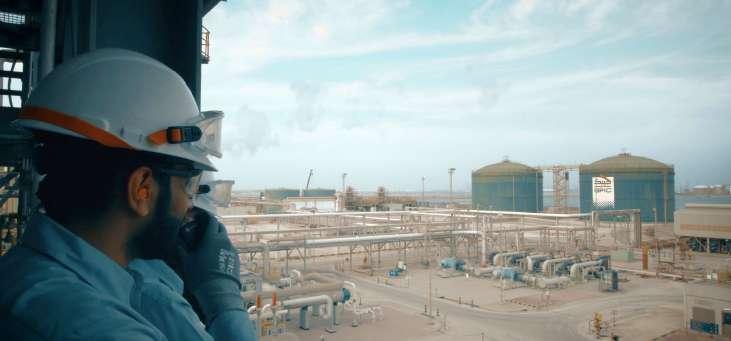
8
Organizations and Academia
- Communicating our position on a range of social and environmental issues (as and when requested/required)
- Responding to information requests and surveys (as and when requested)
- Bench marking surveys (periodic/ as and when requested)
- Financial support towards capacity building the organisations
- Environmental protection, social and economic development
- Establishment of mutually beneficial relationships
- Collaboration and partnership opportunities
Stakeholder Mechanism for Engagement / Typical frequency
Interest
Key topics of
-
Non-Profit
GPIC Sustainability Report 20202021 54
GRI 102-43 General Disclosures
Stakeholder Mechanism for Engagement / Typical frequency
Conferences and speaking engagements (periodic)
- Correspondence (as and when required)
- Face to face discussions (as and when required
Key topics of
Interest
- Add value to the organization by obtaining best practices and know-how in house
9 Regional / International Organizations
- Communicating our position on a range of social and environmental issues (as and when requested/required)
- Responding to information requests and surveys (as and when requested)
- Bench marking surveys (periodic/ as and when requested)
- Financial support towards capacity building the organisations
- Being part of working/ advocacy committees
- Being part of their board
- Feedback through marketing and online feedback forms (online feedback is dynamic (GPIC website) and with every product shipment there is a customer feedback form)
- Audits via buyer surveys (annual meetings with surveyors)
- Customer feedback evaluation forms (as and when required-for every consignment)
- Establish international network of associate that can be tapped into when required
- Provide GPIC workforce opportunities to work with and interact with international expertise
- Further solidify the goodwill and reputation of GPIC
10 Customers
- Customer invitational and group meetings (quarterly meetings with marketers Sabic and PIC) stakeholder engagement (continued)
Media a key stakeholder for GPIC. As part of our commitment towards UN Global Compact, GPIC‘s President has written a letter of invitation to all the stake holders of GPIC inviting them to become members of UNGC.
- Customer satisfaction
- Quality and competitive benefits
- Sustainable products
11 Banks
- Meetings
- Written Communication (emails, faxes),Phone Calls
- Financing,
- Providing Competitive Rates,
- Sustainability of Financial Institution (to secure financing over long periods)
- Ability to Pay Back Loans
- Financial Performance
- Timeline of Projects
- Reputation of Company
GRI 102-43
GPIC Sustainability Report 20202021 55
General Disclosures
GRI Standard Number: GRI 102
Disclosure Number: 102-44
Key topics and concerns raised: The examples of recent feedback received from some of the stakeholders groups are as follows:
Stakeholder group
Issues of Interest
Revamp GPIC Corporate strategic plan ranging till 2020 to GPIC Corporate Strategy 2030 and explore future growth opportunities including overseas investments and debottlenecking of existing plants

Our Response
We revamped our Vision, Mission and values to be in line with our future aspirations and stakeholders needs and updated our corporate strategy to 2030 and formed a strategic high level council to implement it.
We are looking ahead to Secure growth and expansion projects through implementing GPIC’s 2030 Corporate Strategy.
Shareholders
Cost optimization focus due to market volatility and uncertainty
GPIC leadership initiated a Cost Optimization programme and a task team has been formed. The objective being to propose, review and if found feasible implement the cost optimization projects. A number of cost optimization projects have been implemented in 2016-2019. One of the focus areas 2020 and beyond is to continue with the “Cost optimization mindset”
Government and regulators
Supreme council for Environment (SCE) requested GPIC to provide reports on environmental performance on quarterly basis rather than on bi-annual frequency.
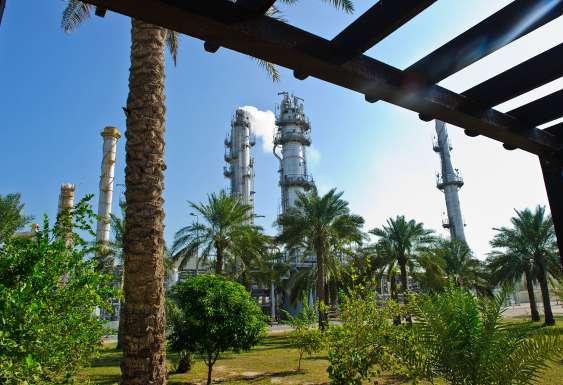
Ministry of Education requested GPIC to continue the Schools Environmental Research Program virtually during COVID19-
Implementation of COVID- 19 related directives and guidelines from Ministry of Health and other Governmental entities
GPIC Labour Union Requested to include female employees also to contest for the labour union elections.
Employees
Issue sustainability reports (SR)in soft version Only.
UN Environment requests GPIC to participate in the Green wave Campaign Since 2015
GPIC is adhering to the new requirements of SCE by providing quarterly reports.
GPIC accepted Ministry of Education request and is now conducting the Schools Environmental research program virtually.
GPIC ensured that all the directives related to COVID19- are followed in letter and spirit
The first female employee was elected as a board member of the Labour union.
GPIC has been issuing Sustainability reports in soft version only since 2018
Since the launch of the program in 2015, 90 local schools have benefited from the program with the distribution of 3600 sapling trees in total by GPIC.
NGOs and Local Community
GPCA requests its member companies to sign the pledge to implement Operation Clean Sweep program for achieving zero plastic resin loss.
InJAz, Bahrain requested to accelerate the provision of volunteers to support its youth development initiatives.
GPIC Signed the OCS pledge in August 2021
GPIC responding by providing its volunteers on sustainable basis.
GPIC Sustainability Report 20202021 56

GPIC Sustainability Report 20202021 57
General Disclosures
GRI 102-44
NGOs and Local Community
UN Global Compact(UNGC) encourages its members to advocate and pass on the mission of UNGC to other non-members.
GPIC‘s President has written a letter of invitation to all the stake holders of GPIC inviting them to become members of UNGC.
Suppliers and contractors
Customers
After completion of every maintenance turnaround the vendors and contractors provide feedback through a structured feedback system for continual improvement of turnaround management system.
Outreach to ammonia and urea buyers through Marketers.
United Nations Declaration of 2016 as the International year of pulses and encouraging businesses to support this initiative.
All the feedback is converted to turnaround recommendations for further evaluation and implementation.
Arrange at least one annual joint meeting with ammonia and urea buyers.
GPIC embraced the initiative and has started a themed menu serving only pulses one day in a month and have invited other local and regional companies to join this initiative by UN. Moreover , GPIC also celebrated the Global Pulse Day on 18 January 2017
Regional and International Organizations
Arabia CSR Network recommended GPIC to join UNGC’s signature issue platform(s) such as Women’s Empowerment Principles (WEPs).
Arabia CSR Network recommended GPIC to scale up their GRI reports from Core to Comprehensive.
GPIC embraced the WEPs in 2014
GPIC have scaled up their GRI reports from Core to Comprehensive since 2018
Distributors
The Ministry of Electricity and Water (EWA) requested GPIC to support EWA power grid load sharing during daily peak demand in summer months.
University of Bahrain requested financial assistance for an Advanced air quality monitoring station.
Arabian Gulf University of Bahrain requested financial assistance to carry out Biodiversity related research.
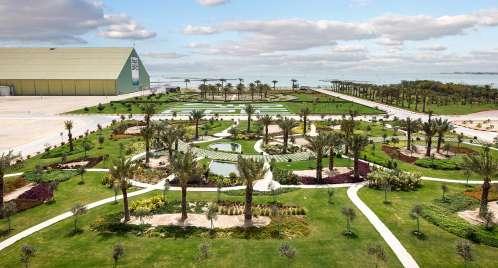
GPIC responded by agreeing to increase their in- house power generation 1400-1600 hrs. every day to off load EWA power grid.
GPIC responded by providing the requested financial Assistance.
Academia
University of Bahrain (UOB) requested GPIC to provide industrial training to students remotely during COVID19- pandemic
GRI Standard Number: GRI 102
Disclosure Number: 102-50
Reporting Period:
Based on 2020-2021 corporate data for the year ended December 31,2021.
GPIC took an active role in the environmental stewardship and in July 2018 has provided financial support to Arabian Gulf University to carry out research on the subject of “ Resilience Assessment of Sub-tidal Habitat- Sea grass and Coral Reef area using very high and moderate. resolution satellite data, GIS and Survey Data.
GPIC accepted the request and provided virtual training to the students
Stakeholder group Issues of Interest
Our Response
GPIC Sustainability Report 20202021 58
GRI Standard Number: GRI 102
Disclosure Number: 102-51
Date of most recent Report: This is GPIC’s sixth GRI Sustainability Report. The previous report covered 2018-2019 and can be found on our website www.gpic.com
GRI Standard Number: GRI 102
Disclosure Number: 102-52
Reporting Cycle: Biennial
GRI Standard Number: GRI 102
Disclosure Number: 102-53
Contact point for questions regarding the report: Adnan A. Al-Mahmood
General Manager Corporate Support Gulf Petrochemical Industries Co. (GPIC) Kingdom of Bahrain. Tel: +973-177 33 773
Mobile:+973- 394 19 945 e-mail: almahmood@gpic.net
GRI Standard Number: GRI 102
Disclosure Number: 102-54
Claims of reporting in accordance with the GRI Standards: The Company has chosen to maintain our historical reporting excellence by adopting the GRI Standards. This report has been prepared in accordance with the GRI Standards: Comprehensive option.
For ease of navigation, please view the GRI Content Index available at the end of the report on pages 198-208
GRI Standard Number: GRI 102
Disclosure Number: 102-55
GRI Content Index: The content index is on pages 198-208
GRI Standard Number: GRI 102
Disclosure Number: 102-56
External Assurance:
We believe that external assurance significantly enhances the credibility of any report. Therefore for this report we have evidence of external assurance from credible international partners for some of the indicators listed below. For instance, our financial performance is audited by financial auditors from KPMG Fakhro and their audit statement is part of our Annual Financial Report.
Most of our business functions are also certified by relevant bodies, for example GPIC is certified for 14 Management System Certifications. Our laboratory, inspection and instrument maintenance functions are certified through ISO 17025 and ISO 17020.
Our environmental monitoring (emissions and effluents) is verified by the environmental inspectors from Supreme Council for Environment, Bahrain.
Our urea storage and export facilities and processes are assured by The Australian Government’s Department of Agriculture, Water and the Environment. The assessment is to ensure meeting the requirements for Level One Gold system status as set out in the department’s Imported Inorganic Bulk Cargo Fertiliser Assessment and Management Policy. GPIC has demonstrated its commitment to ensuring the biosecurity
integrity of their fertiliser product across the supply chain, from manufacture to loading during the audit of 20 May 2021. This status will be maintained until 20 May 2027 subject to a satisfactory result in annual third party audits.
Our production and export quantities and quality are verified by third party surveyors such as M/S SGS. Our year end production and inventories are verified by third party.
Our plant equipment is assured by insurance bodies including statutory requirements.
All our external assurance providers are assisted by our internal control processes that report to our Board of Directors through the Audit and Risk Committee. We have seriously considered external assurance for our SR 2020-2021, however due to the challenges posed by the on-going
COVID-19 pandemic we have decided to postpone the external assurance and we plan to do it for our next GRI SR 2022-2023.
GOVERNANCE
GRI Standard Number: GRI 102
Disclosure Number: 102-18
Governance structure:
Our Corporate Governance framework is developed to establish a common set of expectations and good governance practices that will assist the Board and its Committees to perform their duties effectively.
Corporate governance is an integral pillar of GPIC’s core values, supporting our sustainable growth mission. GPIC is committed to having sound corporate governance principles and practices. We provide detailed information about the Company’s governance structure and processes in our Corporate Governance Policy.
Board of Directors:
Our governance structure starts with our Board of Directors. Our Board of Directors includes nine members, equally nominated by the three shareholders, who share the collective responsibility of ensuring that the affairs of our organization are managed competently and with integrity. As per the Memorandum and Articles of Association of GPIC, the duration of membership for the Board of Directors is three years, and members can be reappointed for the same duration or other durations. All the nine members are non-executive directors.
The Governance clearly states that the Chairman of the Board is to be elected from amongst the Bahraini Board Members, while the Deputy Chairman is to be elected from amongst the Saudi or Kuwaiti Board members. The Chairman and the Deputy Chairman are elected for a period of three years.
The Key responsibility of the Chairman is to monitor and evaluate the performance of the Board and senior management to ensure compliance with the Company’s Code of Corporate Governance.
The Board of Directors appoint a Managing Director from amongst the Board Members to represent the shareholders from Saudi Arabia or Kuwait and shall determine his/ her level of authority. The selection process is alternated between the shareholders from Saudi Arabia and Kuwait. The appointment shall be for a period of three years.
The Managing Director is elected by the Board of Directors as per the Company’s Code of Corporate Governance, with the primary task of being the link between the Board of Directors and the executive management.
GPIC Sustainability Report 20202021 59
GRI 102-18
Executive Management:
The Managing Director is responsible for ensuring full implementation of the approved policies and strategies set by the Board through the Executive Management. His/ her authorities are defined in the Approval Authority Schedule (AAS) by the Board of Directors. The Board of Directors shall appoint a President for the Company and shall determine his/ her levels of authority, responsibility and remuneration. Under the stewardship of the President, the Executive Management is responsible for the day to day operations and activities of the Company. These are based in the overview, guidelines and directives provided by the Board of Directors and/ or the Managing Director.
Board Committees:
The Board is assisted by functional committees that are responsible for monitoring and ensuring compliance with all of the legal and corporate policies and procedures.
Audit, Finance and Risk Committee:
The Audit, Finance and Risk Committee is one of the most critical governing bodies within the company.
The Board of Directors appoint the Chairman and the directors/ members of the Committee after having determined their relevant qualifications, experience and behavioural attributes. Committee members shall be appointed from within and may be removed by the Board at any time. The committee comprises of three directors, each nominated by the three shareholders- SABIC Agri- Nutrients Investment Company-KSA, Petrochemical Industries company(PIC)Kuwait and nogaholding- Bahrain. The Chairman of the Board, the Managing Director and any director who is vested with executive powers shall not be a member of the Committee.
The Committee assists the Board in fulfilling its oversight responsibility relating to: the integrity of the company’s financial statements; the financial reporting process; the systems of internal accounting and financial controls; independence and performance of the external auditors; risk management processes; financial plans; pension plans, etc. The committee will also be in charge of ensuring; compliance by the Company with the ethics policies, and all relevant national legal and regulatory requirements.
They will also need to monitor/manage the internal and external auditors in relation to any fraud, illegal acts, deficiencies in internal control or other similar issues and ensure that audit/ control recommendations by internal and external auditors are addressed and implemented.
Major Projects Committee:
The Projects Committee is chaired by the Chairman of the Board and includes the Deputy Chairman and the Managing Director along with the President. The Major Projects Committee is responsible for reviewing and making recommendations to the Board of Directors regarding important policy matters and essential projects that have a significant impact on our organisation.
Strategic Plans:
The Board has the responsibility for overseeing, understanding, reviewing and monitoring our short, medium and long term strategic plans from their inception through to their development and implementation.
External Auditors:
The external auditors for the Company are appointed by the shareholders in the General Assembly Meeting. The auditors with respect to their authority, responsibility and conduct will be subject to the provisions of the Bahrain Commercial Law. The Auditors will submit to the General Assembly Meeting of the shareholders a report, indicating whether the balance sheet and profit and loss accounts are in agreement with the facts and that they provide a true and fair view of the Company’s financial state.
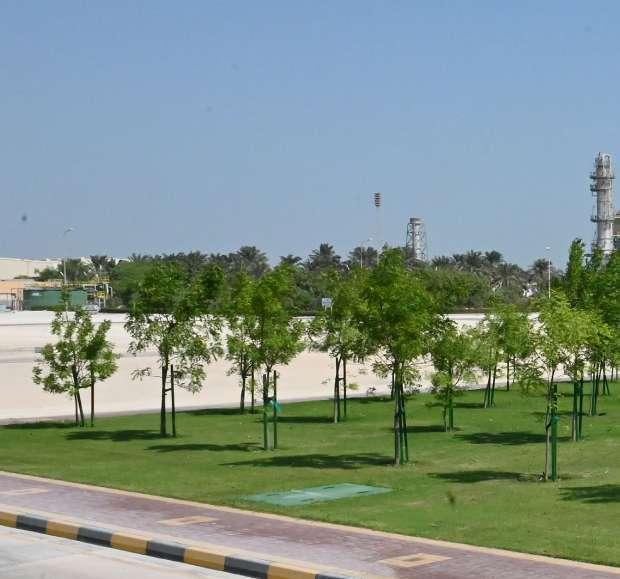
The report will also need to confirm that the Company maintains regular accounts, and whether the stock take conducted by the company has been carried out in an appropriate manner. The auditors will need to verify if the particulars, data and information stated in the report to the Board of Directors are in conformity with those contained in the books of the company, and whether there has been any breach of any rules of the Memorandum and Articles of Association of the Company during the financial year in question. The Auditors (acting as the agent of the shareholders) are responsible for the accuracy of the particulars stated in the report to the shareholders. Each shareholder will have the right at the General Meeting to discuss the audit report and to seek clarification in respect of its contents. The auditors will be liable to the Company for compensation of damages sustained by reason of errors committed by them in the course of carrying out their duties and responsibilities.
Sustainability Committee:
GPIC has a Sustainability Reporting Committee. The Committee is formed with fair representation from personnel responsible for critical operations to ensure that all aspects of the business is taken into consideration when measuring impact. The mandate of
GPIC Sustainability Report 20202021 60
Strategy & Profile
GRI 102-18
the Committee includes ensuring the reporting cycle of GRI Sustainability Reports, the UN Global Compact COP and the FAB 6 principles is completed on time and efficiently. The Committee also engages with international organizations such as UNGC and GRI and provides capacity building assistance to regional Companies with regards to GRI reporting.
GRI Standard Number: GRI 102
Disclosure Number: 102-19
Delegating Authority:
GPIC employs a delegation of authority structure from senior executives throughout the Company through a chain of command. Generally, this occurs from Managing Director to President, to General Manager Manufacturing and General Manager Corporate Support and is cascaded down to Departmental Managers and further to Section Heads.
GRI Standard Number: GRI 102
Disclosure Number: 102-20
Executive Level responsibility for economic, environmental and social topics:
Mr. Yasser Abdulrahim Alabbasi, President/General Manager Manufacturing is the head of the Safety, Health and Environment Council. The Safety, Security, Health and Environment Department is headed by Mr. Jamal Al
Shawoosh who reports directly to Mr. Yasser Alabbasi. Mr. Yasser reports directly to the Managing Director on all sustainability related issues.
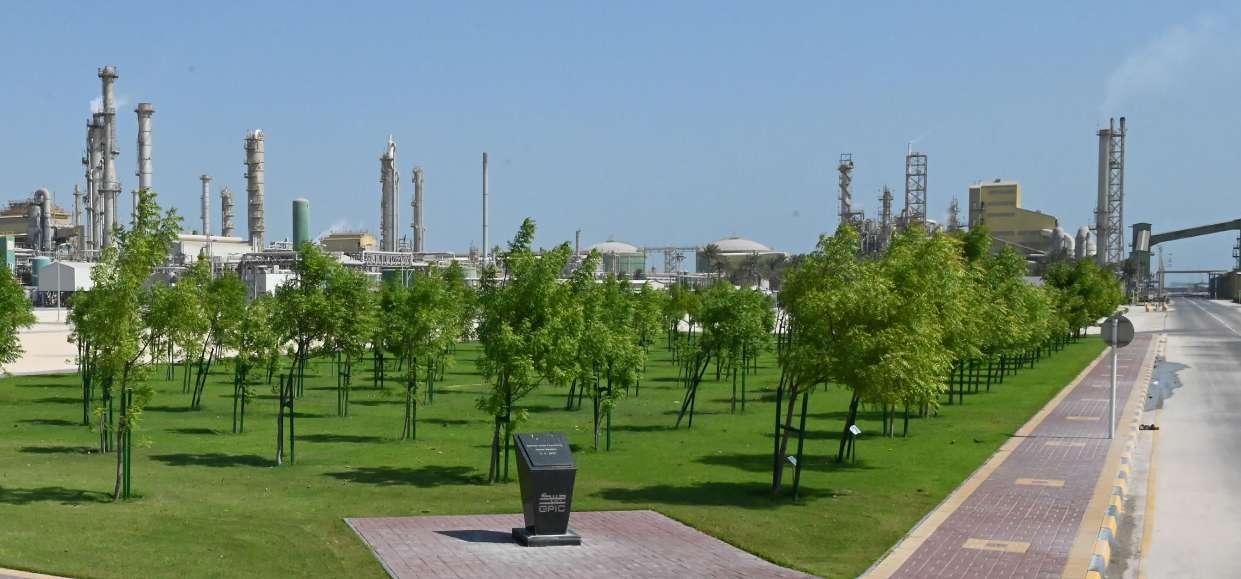
GRI Standard Number: GRI 102
Disclosure Number: 102-21
Consulting stakeholders on economic, environmental and social topics: Stakeholders and other interested parties may communicate with the President and/or the executive management by any of several methods. These methods of communication include e-mails, face to face meetings, formal meetings, executive and functional committee meetings and town hall meetings (such as general employee meeting).
Employees and external stakeholders are invited to give voice to their views though special surveys such as the sustainability surveys. Please refer to the section on stakeholder engagement for details.
GRI Standard Number: GRI 102
Disclosure Number: 102-22
Composition of the highest governance body and its committees:
GPIC BOARD COMPOSITION 2021 SR. NO. NAME POSITION AGE QUALIFICATION COUNTRY 1 H.E. Dr. Ahmed Ali Ahmed Alsharyan Chairman 65 Economics Bahrain 2 H.E. Mr. Hamad D A Baddah Deputy Chairman 56 Engineering Kuwait 3 H.E. Mr. Samir Ali M Alabdrabbuh Managing Director 60 Engineering Saudi Arabia 4 H.E. Shaikh Fahad bin Salman Al Khalifa Board Member - Business Management Bahrain 5 H.E. Mr. Ahmed Mohammed K Alumar Board Member 57 Business Management Saudi Arabia 6 H.E. Mr. Shafi T F TH Alajmi Board Member 48 Engineering Kuwait 7 H.E. Mr. Salem A M S Alazemi Board Member 56 Engineering Kuwait 8 H.E. Mr. Ali Ahmed A Alghamdi Board Member 45 HR Saudi Arabia GPIC Sustainability Report 20202021 61
Strategy & Profile
GRI Standard Number: GRI 102
Disclosure Number: 102-23
Chair of the Highest Governance Body: The chair of the Board of Directors is not an executive officer. All the Board members are non-executive officers.
GRI Standard Number: GRI 102
Disclosure Number: 102-24
Nominating and selecting the Highest Governance Body: The General Assembly of the Company represents its shareholders and is considered to have the highest authority within the corporate governance of GPIC. The shareholders will appoint the Board of Directors who will be entrusted with the responsibility and authority to act on behalf of the shareholders to fulfill their vision, aspiration and protection of their interests as per the Articles of Association of the Company. The General Assembly will have the full power to consider and approve the appointment and termination of the Board of Directors in addition to a number of other issues. The Chairman of the Board will be elected by a secret ballot held amongst the Board of Directors. The Chairman will always be elected from amongst the Bahraini Board Members. The Board of Directors nominate the Managing Director from amongst the Board Members representing Kuwait and Saudi Arabia.
GRI Standard Number: GRI 102
Disclosure Number: 102-25
Conflicts of Interest:
All Directors and employees of GPIC are expected to be familiar with the Company’s Code of Business Conduct, and to apply it in the daily performance of their GPIC responsibilities.
The Code of Business Conduct is intended to help employees and Directors focus on our corporate values of integrity and respect for people, help them recognize and make informed decisions on ethical issues, assist in creating a culture of the highest ethical and business standards, and provide mechanisms to report unethical conduct.
The Conflict of Interest is articulated in section 6.3 of the GPIC Code of Ethics Handbook. It also highlights the importance of bringing to the immediate notice of the management and the legal and compliance supervisor, any suspected cases of conflict of interest.
The full text of GPIC’s Code of Ethics is publicly available via our website - www.gpic.com.
GRI Standard Number: GRI 102
Disclosure Number: 102-26
Role of highest Governance Body in setting purpose, values and strategy:
Mr. Yasser Abdulrahim Alabbasi, the President of GPIC, and senior Management periodically review and update GPIC’s essential elements of mission, vision, values, and strategy.
These essential elements provide insight, offer motivation, and provide direction as the Company seeks to grow and achieve our goals. The Company’s mission, vision, values are reviewed annually by the Executive Management Council (EMC) to ensure its adequacy to meets the corporate goals.
Modifications, if any, are proposed to the Board of Directors for their consideration and approval. GPIC’s internal quality document SOP-GEN-00-03 elaborates the work-flow related to the vision, mission and values.
We believe that in order to add value for the shareholders and to remain competitive and sustainable in this ever-evolving and challenging global market, we have to grow. In line with this outlook, we had developed a strategic plan ranging until the year 2020. The subject plan has been revised and updated as the GPIC Corporate Strategy Plan 2030. A high level council ‘GPIC 2030 Strategy Implementation Council (SIC)’ has been formed, whose main objective it is to ensure the implementation of the GPIC Corporate Strategy Plan 2030.The Council meets at least once a year.

The GPIC Board has the responsibility for overseeing, understanding, reviewing, and monitoring the Company’s short, medium and long-term strategic plans from their inception through their development and execution by management.
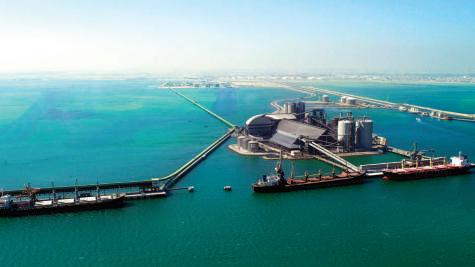
GRI Standard Number: GRI 102
Disclosure Number: 102-27
Collective knowledge of Highest Governance Body: All of the Non-Executive Board of Directors are qualified in the field of Engineering, Business and Economics and have in depth knowledge of Corporate Governance and Risk Management. The Board of Directors are kept informed through presentations and workshops on the latest regional and global initiatives and policy trends related to risk management and sustainability. For example, VAT, Cyber Security, etc. The Board of Directors represent the investing organizations, i.e. nogaholding (Bahrain), Petrochemical Industries Company – PIC (Kuwait), and SABIC Agri- Nutrients Investment Company (Saudi Arabia), and by virtue of this also bring together the collective knowledge of the three organizations to be able to support GPIC at a Board leadership level.
GRI Standard Number: GRI 102
Disclosure Number: 102-28
Evaluating the Highest Governance Body’s performance: Each of the Board Committees conducts an annual review of its charter and performance. In addition to this selfassessment, each Committee makes regular reports to the Board of Directors. The Board conducts an annual review of the performance of the President. The Board Committees also undertake numerous risk oversight activities related to their charter responsibilities.
GPIC Sustainability Report 20202021 62
GRI Standard Number: GRI 102
Disclosure Number: 102-29
Identifying and Managing economic, environmental and social impacts:
The Identified Enterprise Risks also cover the economic, environmental and social segments of the business and the Board is responsible to ensure compliance to ERM, Business Continuity and other control frameworks established within the Company. The establishment, operation and monitoring of the Framework is delegated to the Executive Management, however the overall accountability lies with the Board.
The Board has the responsibility to monitor the enterprise risks to which GPIC is exposed and to ensure that the system of internal control is effective in reducing those risks to an acceptable level.
Normally the Board mandates the Audit, Finance and Risk Committee to perform this task
GRI Standard Number: GRI 102
Disclosure Number: 102-30
Effectiveness of Risk Management Processes:
The Board of Directors are responsible for overseeing the overall risk management process for the Company. Risk management is considered a core strategic activity within the Company and the responsibility for managing risk rests with the executive management while the Committees of the Board and the Board as a whole participate in the monitoring and reviewing the process. Specifically, the Board has the responsibility for overseeing the strategic planning process, reviewing and monitoring management’s execution of the corporate and business plan; and each Board Committee is responsible for oversight of specific risk areas relevant to their Committee’s charters.
GRI Standard Number: GRI 102
Disclosure Number: 102-31
Review of Economic, Environmental and Social Topics: The board of directors meet on quarterly basis and five meetings are held in a year. In 2021 an Annual General Meeting was convened and in addition to this the Committees of the Board also met seven times during 2021.

1) Market and economic outlook of the petrochemicals and fertilizers
Major issues that have been discussed are
2) Maintaining the financial health of the Company through operational excellence and cost optimisation initiatives 4) Securing growth and expansion projects through implementing GPIC’s 2030 Corporate Strategy including exploration of investment opportunities outside Bahrain
5)Financial Statements 6) internal audit activities and reports 7) external audit reports 8) COVID-19 pandemic related concerns, issues, challenges.
GRI Standard Number: GRI 102
Disclosure Number: 102-33
Communicating Critical Concerns: The oversight responsibility of the Board and Committees is enabled by an enterprise risk management model and relevant processes implemented by the management that is designed to identify, assess, manage and mitigate risks. The Audit Committee is responsible for ensuring that the management implements and follows this risk management process and for coordinating the review of outcomes by the other Committees in their respective areas in relation to risk. In addition, the enterprise risk management model and processes are reviewed by the Board of Directors annually, and the Board recognizes that the risk management and oversight requires a dynamic and continuous process.
The strategic plan, critical issues, and opportunities are presented to the Board each year by the President and senior management. Throughout the year, the management reviews any critical issues and actual results in comparison to the plan with the Board and relevant Committees. Members of the executive management team are also available to discuss the Company’s strategy, plans, results and issues with the Committees and the Board, and regularly provide periodic briefings and access via scheduled meetings. In addition to this, the Audit Committee regularly meets in executive sessions, and hosts separate executive sessions with the independent registered public accounting firm, internal auditor, and other relevant management teams as appropriate.
GRI Standard Number: GRI 102
Disclosure Number: 102-32
Highest governance’s body’s role in sustainability reporting: GPIC’s sustainability reporting committee ensures that all material aspects are covered. The chair of the Committee, Mr Adnan A. Al Mahmood, General Manager Corporate Support formally reviews the organization’s sustainability report and then seeks final approval from GPIC President Mr Yasser Abdulrahim Alabbasi. Policy and performance Statements in the report are from the senior most decision makers such as the Managing Director (GRI 102: General Disclosures 2016).
GPIC Sustainability Report 20202021 63
Strategy & Profile
GRI Standard Number: GRI 102
Disclosure Number: 102-34
Nature and Total Number of Critical Concerns: In view of the continuity of market instability, financial crunch and escalating energy costs the key concerns and focus areas revolved around the following topics; (For detailed review refer to our achievements and challenges section of the report):

• The COVID-19 challenge- preserving our present and future
• Maintain the financial health of the Company through operational excellence and cost optimisation initiatives
• Secure growth and expansion projects through implementing GPIC’s 2030 Corporate Strategy
• Embrace new technologies for improving energy efficiency and performance enhancement of plants
• Maintaining safety performance & adherence to environmental legislation
• To have a safe and successful turnaround 2020
• Increase in price of raw materials such as gas and electricity.
• Market instability and low Products price.
• Geopolitics and security challenges
• Improve cyber security measures.
GRI Standard Number: GRI 102
Disclosure Number: 102-35
Remuneration policies: The Company has well established remuneration policies in line with the Bahrain Labour law and GPIC HR policies.
GRI Standard Number: GRI 102
Disclosure Number: 102-36
Process for determining Remuneration: The process for determining remuneration is in line with Bahrain labour law and GPIC’s HR policies.
GRI Standard Number: GRI 102
Disclosure Number: 102-37
Stakeholders involvement in Remuneration: GPIC’s internal stakeholders (selected) are involved in setting the Remuneration policies and the compensation plans and targets.
GRI Standard Number: GRI 102
Disclosure Number: 102-38
Annual total Compensation Ratio: Confidentiality constraints
GRI Standard Number: GRI 102
Disclosure Number: 102-39
Percentage increase in Annual total Compensation Ratio: Confidentiality constraints
GRI Standard Number: GRI 102
Disclosure Number: 102-16
Values, principles, standards, and norms of behavior: Taken together, GPIC’s essential elements of mission, vision, values, and strategy describe why the company exists, who we are, what we intend to do, and how we intend to do it. These essential elements provide insight, offer motivation, and point the way forward as we seek to grow and achieve our goals.
The Code of Conduct for Board of Directors developed by GPIC sets the standards for corporate governance and ethical behaviour within the company which must be followed and respected by Directors of the Board. A similar Code of Ethics is applicable to senior management and employees. All employees and directors of the Company are requested to sign a copy of this code upon joining the company. The acknowledged copy is placed in each employee’s respective personnel file under the custodianship of the Human Resources Department.
In 2016 a new Code of Conduct & Ethics was approved by the Board of Directors: The revised version of the Code of Ethics, issued 2016, outlines GPIC’s commitment to ethical business practices. It forms the framework by which we can all ensure we are doing ethical business and complying with our values and the ten principles of the UN Global Compact in the realms of Labour, Human rights, environment and Anti-corruption. The code is aimed at all GPIC employees and contractors, including shareholders, business partners and customers.
GPIC Sustainability Report 20202021 64
VISION
GPIC VISION, MISSION AND CORPORATE VALUES
To be a world-class petrochemical and fertilizer company of choice, recognized for excellence
• To produce high qulaity petrochemical and fertilzer products
• To grow through successful partnerships and joint ventures
MISSION
• To optimize the business in a safe, sustainable and cost effective manner
• To embrace knowledge, harness innovation and utilize best applicable technologies and practices
• To boost Stakeholders share value
• To train and develop the Human Capital to realize their full potential
VALUES
GRI Standard Number: GRI 102

Disclosure Number: 102-17
Mechanisms for advise and concerns about ethics: For all concerns and questions related to business ethics and the code of ethics protocol one should contact the line manager, legal and compliance supervisor and / or legal adviser at GPIC.
For details refer to GPIC’s Code of Ethics Handbook available both in English and Arabic on GPIC website www. gpic.com and the Company’s intranet.
SOCIAL RESPONSIBILITY CREATIVITY TEAM WORK INTEGRITY TRANSPARENCY PROFESSIONALISM
RESPECT SAFETY
EXCELLENCE
GPIC Sustainability Report 20202021 65
The Economic Impact of Sustainability

GPIC Sustainability Report 20202021 66

GPIC Sustainability Report 20202021 67

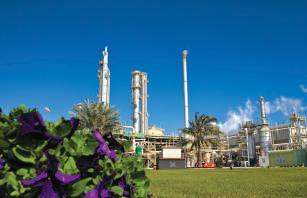
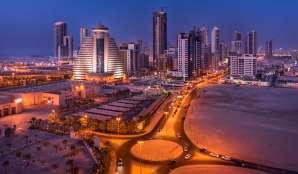


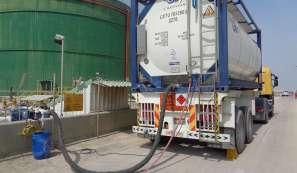

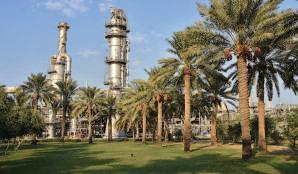


+35.3 MILLION man-hours without LTA till 31 Dec.2021 US$5.58 BILLION injected to Bahrain economy since inception US$ 216 MILLION Profit in 2021 US$513 MILLION sales in 2021 and US$ 270 million sales in 2020 1,663 MT of Methanol exported to local market in 2020 / 2021 US$3.5 BILLION paid to shareholders as dividend
TONS of combined annual production, achieved in 2021 US$ 9.89 MILLION saved through in-house spare part manufacturing since 2004 15 MILLION TONS of Urea production since 1998
GPIC Sustainability Report 20202021 68
Our Performance Highlights 1,612,089
Economic Summary
Despite the uncertainty posed by the ongoing COVID19pandemic, GPIC was fortunate to sustain its profitability due to favourable product prices, efficient and uninterrupted operations, cost optimization initiates and innovative business strategy

GPIC Sustainability Report 20202021 69
Economic Summary
GRI 103: Management Approach Disclosures (103-1, 103-2, 103-3)
As a prime producer of ammonia, methanol and granular urea, GPIC’s business growth and financial performance are essential to its continued sustainability, and creating long term value for our shareholders.
We are aware that our operations have major direct and indirect impacts, and are taking steps to increase the positive impacts whilst reducing any negative impacts. Our direct impacts include (and are not limited to) shareholder returns (dividends), payment to investors, payment of taxes and relevant levies to the Government, payment of salaries and benefits to employees, payment to suppliers etc. while our indirect impact includes the economic betterment of local communities through improvements in business environment, investments, creating viable jobs, etc.. GPIC understands the importance of a strong manufacturing economy, and the importance of manufacturing jobs on the local and global scale. Each job in manufacturing is responsible for multiple indirect jobs created in the regions we do business. We strive to be a good neighbor as well as a global corporate citizen. Through our actions, we know that we are building better, stronger, more sustainable communities in the places where we do business.
We aim to be the growth partner for all our stakeholders by integrating local suppliers within our supply chain where possible, employing Bahraini nationals and contributing to the local community.
Global economic challenges amid COVID-19 faced by the industrial sector, marked by a rise in natural gas and electricity prices and coupled with a sharp decline in prices of petrochemicals and fertilizers produced by the Gulf Petrochemical Industries Company, resulted in a significant impact on profits in 2020. However, through our adoption of bold production targets, cost optimization and a dynamic focus on operational excellence and business continuity throughout the year, we have prevailed through the general slump. Our profits increased from US$4.5 million in 2020 to US$ 216 million in 2021.
We had a total sales of US$ 513 in 2021 due to favourable product prices especially for Urea and Ammonia. The volatile markets and global economic instability have resulted in all companies across every industry, consolidate their costs. GPIC is by no means immune to these factors either, and has during the course of 2020-2021 consolidated and prioritized its capex investment accordingly. Because of COVID-19
we had to defer our major planned turnaround from 2020 to 2022. Based on the above mentioned challenges and to remain sustainable our 2022 and beyond ambitions and goals include improving on employees productivity, further optimizing our cost of production, improving on energy efficiency and capacity utilization, maintaining our continuous production record and sustaining our safety performance and the health / well-being of our workers amid the on going COVOD-19 pandemic.
We are confident that despite the current uncertain environment, GPIC will be able to sustain its profitability and move forward, due to its efficient and streamlined operations, cost optimization initiatives and innovative business strategy supported by an effective workforce and management synergy.

New Plans
We are exploring other potential growth avenues such as overseas joint ventures, mergers and acquisitions as part of GPIC’s Corporate Strategy 2030, knowing that business as usual will not be sustainable. We are also looking for opportunities for improved energy efficiency and enhanced production capacities and have signed an agreement with Italian firm Saipem in 2020 to study the feasibility of technical projects in Bahrain. The agreement signed with Saipem will enhance GPIC’s ability to increase production and expand its contribution to Bahrain’s economy.
The agreement includes study of three projects 1) The first relates to the technical and commercial feasibility of increasing production capacity of ammonia, methanol and urea by 15 percent. 2) The second project consists of a prefeasibility study of a mega ammonia and urea plant with a daily production capacity of 2200 tonnes of ammonia and 3400 tonnes of urea. 3) The third project will look to determine the quality of the gas feed stock in the fields discovered in 2018.
Our Economic Performance 2020-2021
Every industry and every sector felt the impact of economic uncertainty during 2020 and the period thereafter.
Despite the uncertainty, we were able to sustain our profitability due to favourable product prices, reliable, efficient and streamlined operations and various cost optimization and control measures., supported by the availability of our loyal, disciplined and skilled work force. We were also successful in lowering the cost of production by about 4 per cent compared to what was targeted in 2021.
GPIC Sustainability Report 20202021 70

Net Profit in Millions US$ 2016 2017 2018 2019 2020 2021 Actual Target 0 50.0 100.0 150.0 200.0 -50 250.0 21.2 3.1 1.02 1.21 32.2 12 82.6 55.8 33.9 1.1 4.46 216.3 Production Cost US$/MT 2016 2017 2018 2019 2020 2021 Actual Target 210 220 230 240 250 260 270 280 290 200 300 206 213 209 222.92 226.58 239.79 239.10 219.30 229.17 210.85 222.82 201 GPIC Sustainability Report 20202021 71
Economic Performance
Direct economic value generated and distributed including revenues, operating costs, employee compensation, donations and other community investments, retained earnings and payments to capital providers GRI 201-1

Note: The financial figures for 2021 are un-audited, however once audit is completed, will undergo AGM approval during third week of March 2022.

Component 2021 Data 2020 Data 2019 Data 2018 Data 2017 Data 2016 Data Direct economic value generated US$ Revenues US$ 513,032,470 270,378,030 308,285,950 341,072,150 298,959,750 242,331,900 Economic value distributed US$ Major operating costs 75,775,490 64,858,440 78,008,143 88,635,120 109,950,640 83,677,383 Employee wages and benefits 58,434,110 39,946,440 44,646,087 46,482,600 47,427,450 46,460,446 Payment to providers of capital 94,500,000 9,000,000 60,000,000 30,000,000 -Payment to Government 156,446,690 155,367,206 145,362,937 126,237,780 201,770,000 179,329,000 Community Investments 6,154,355 5,736,720 10,530,066 10,223,365 9,830,158 8,673,213 Economic value retained US$ Retained earnings 406,135 283,601 288,135 253,295 263,270 143,672 Ratios 2021 2020 2019 2018 2017 2016 2015 Current Ratio 7.26 4.11 2.84 3.66 4.28 1.82 3.19 Debt / Equity Ratio 0.001 0.002 0.002 0.03 0.15 0.44 0.36 Debt Ratio 0.001 0.002 0.002 0.03 0.13 0.15 0.10 Operating Cash Flow / Assets 28.81% 8.23% 9.55% 18.31% 14.73% 2.36% 25.27% Net operating margin percentage 42.18% 1.47% 10.02% 23.83% 13.66% 1.13% 17.54% Net Profit margin 42.15% 1.65% 9.93% 24.15% 12.02% -0.30% 17.50% Return on Total Assets (ROA) 35.13% 0.81% 5.81% 13.95% 6.24% 0.50% 9.92% Return on Equity ( ROE) 37.04% 0.85% 6.29% 15.67% 7.16% 0.72% 13.50% Receivable Turnover 5.98 4.76 5.68 7.69 6.42 5.05 4.41 Inventory Turnover 27.59 14.02 15.85 17.28 9.61 10.54 12.71 Financial statement Ratios
GPIC Sustainability Report 20202021 72
Invested more than US$ 5.58 BILLION

Assets 2021 2020 2019 2018 2017 2016 2015 Non-Current Assets Property, plant & equipment 427,168 434,164 437,714 455,920 424,201 434,501 455,066 Total Non-Current Assets 427,168 434,164 437,714 455,920 424,201 434,501 455,066 Current Assets Inventories 18,063 19,126 19,448 19,395 20,076 20,172 15,495 Trade and other receivables 118,219 53,270 60,367 48,076 40,632 52,499 43,455 Cash and cash equivalents 115,930 44,879 39,821 86,191 86,381 41,353 4,428 Total Current Assets 252,211 117,275 119,636 153,662 147,091 114,024 63,377 Total Assets 679,380 551,439 557,350 609,582 571,292 548,526 518,443 Equity Capital and Reserves Share Capital 159,000 159,000 159,000 159,000 159,000 159,000 159,000 Statutory Reserve 79,500 79,500 79,500 79,500 79,500 79,500 79,500 Retained Earnings 406,135 283,604 288,945 253,296 230,940 143,672 142,538 Proposed Dividends 9,000 60,000 30,000 85,200 85,200 Total Equity 644,635 522,914 527,445 551,796 499,440 467,372 466,238 Liabilities Non-current Liabilities Employee Benefits 4,831 851 409 15,821 37,491 18,346 25,032 Current Liabilities Trade and Other Payables 29,914 27,675 29,496 41,965 34,360 62,808 19,901 Total Liabilities 34,745 28,526 29,906 57,786 71,851 81,154 52,205 Total Equity and Liabilities 679,380 551,439 557,350 609,582 571,292 548,526 518,443
GRI GPIC Sustainability Report 20202021 73
201-1 in Bahrain’s economy since inception
Economic Performance
GRI 201-1

What has GPIC contributed to the economy of Bahrain
Cash injected into the economy of Bahrain up to December 2021 US$ million
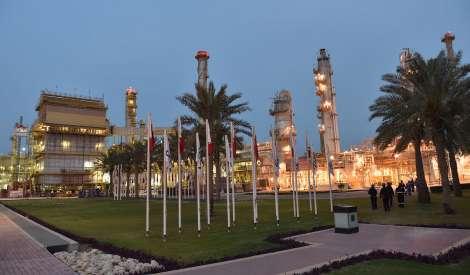
Total Cash injected since inception: US$ 5.582 Billion
Average Annual Contribution for last 10 years: US$ 248.00 million
Projects
Natural Gas/ Electricity consumed
Amount spent locally on employees
Amount paid to contractors
Amount spent on training Bahrainis
Purchases made in Bahrain
Finance Charges paid to Banks
Dividends paid to government of Bahrain
171 118 1,266 1,864 973 786 164 241
GPIC Sustainability Report 20202021 74
ECONOMIC PERFORMANCE
Financial implications and other risks and opportunities due to climate change GRI 201-2

Climate change affects our business in terms of reliability, production capacities and the cost of our operations as outlined below.
Regulatory Risks
As Bahrain has become a signatory to the Paris Climate Change (COP 21) Agreement in 2016, it has embarked on quantifying the carbon emissions of the industrial sector, suggesting the possibility of future regulations regarding carbon management. Meanwhile, the main recent regulatory impact on our business has been a significant phasing out of subsidies on gas and electricity prices, which is expected to continue over the next few years, as well as a nationwide strategy that allocates natural gas more conservatively.
In response, we further stream lined our operations and embarked upon resource optimization initiatives and pursued and successfully achieved the ISO 50001 Energy Management
Systems certification in 2015. Among our current goals is the optimization of natural gas, steam and electrical consumption in our operations through operational excellence and controls and/or by investing in new energy efficient projects. Our Long Term Sustainability Goals established in 2014 also include focus on clean energy, energy efficiency and water conservation to further reduce our energy and carbon footprints and decrease the potential impact of unanticipated regulatory changes on our operational costs.
Physical Risks
Climate change poses the risks of more frequent and severe weather conditions across the globe. Bahrain has witnessed increasing weather extremes since some years. Additionally, since some years we have witnessed a 1.3 degree Celsius increase in ambient sea water temperature rise. This temperature has neared our maximum temperature of 39.5 degree Celsius for seawater intake for process use, which if exceeded would significantly impact our operations and production capacities.
In 2020-2021, in spite of the challenging climatic situations like higher than normal ambient temperatures, GPIC was able to maintain all its plants at the highest level of safety, productivity and reliability. This enabled the Company to achieve its targets and record profitability.
Our main response strategy to severe weather conditions is focusing on reliable production by preparing for all risks listed in our Enterprise Risks Register, Business Continuity and Crisis Management plans.
Our adaptation and mitigation steps to climate action also covers our robust preventive maintenance regime and include our recent drive to energy efficiency including the use of energy efficient equipment and lighting. (For details please refer to our section on energy reduction measures) GPIC has consistently implemented best practices to ensure its sustainability. We have grown, and will continue to grow through our dedication to the three pillars of sustainability, namely planet, people and profits. By addressing climate change and introducing new technologies to reduce our carbon footprint, we have continued to enhance the regions global economic opportunity and our own sustainable prosperity. In November 2021, Bahrain has signed the “ Glasgow Climate Pact” along with 197 countries committing to a reduction of 30% in CO2 emissions by 2035 and further to it Bahrain has committed to Net- Zero emissions by 2060. GPIC as an operating company under nogaholding will be part of drive towards Net Zero.
Opportunities
2020 and 2021 have been very challenging years for GPIC amid COVID-19 crisis. The continuity of uncertainty and escalating energy costs has provided GPIC an opportunity to come up with innovative business norms knowing that business as usual will not be sustainable. As part of this new normal we are tapping in potential areas of growth and looking for opportunities for improved energy efficiency and enhanced production capacities. Please refer to our section on our agreement with Italian firm Saipem articulated on page 70.
Year Net profit (US$) Dividends to Shareholders (US$) 1998 1,000,000 15,000,000 1999 9,000,000 9,000,000 2000 40,000,000 36,000,000 2001 25,000,000 21, 000,000 2002 25,000,000 21,000,000 2003 66,000,000 60,000,000 2004 96,000,000 96,000,000 2005 128,000,000 129,000,000 2006 162,000,000 162,000,000 2007 201,000,000 201,000,000 2008 300,769,700 350,857,350 2009 105,014,200 150,000,600 2010 138,200,150 105,000,950 2011 265,002,650 212,999,050 2012 211,750,900 250,141,450 2013 186,202,250 151,739,000 2014 190,293,850 186,000,850 2015 47,559,550 105,000,950 2016 1,134,200 0 2017 32,070,000 30,000,650 2018 1,134,200 45,000,000 2019 32,070,000 55,000,000 2020 4,469,225 4,500,000 2021 216,221,824 216,000,000
GPIC Sustainability Report 20202021 75
GRI 201-1
Economic Performance
Coverage of the organization’s defined benefit plan obligations GRI 201-3
GPIC ensures that our people’s compensation and benefit plans are in line with our overall strategy. We have also introduced a new early retirement policy for our Bahraini
employees, to improve employee attainability of benefits whilst still ensuring the company’s financial security and business continuity. Other benefits include a savings scheme, health insurance covering all our people and their families, loans, indemnity, annual bonus, etc.
MARKET PRESENCE
Ratios of standard entry level wage by gender compared to local minimum wage GRI 202-1
GPIC offers employees competitive base pay. The Company maintain employee pay that is tailored to geographically competitive standards. The entry-level wage varies based on job role, experience and responsibility. The entry level wage is not dependent on gender.
Entry level wages are offered in accordance with the value of the work being performed in a similar job, at a similar company, in a similar location, in the external marketplace.

The Company does not currently benchmark against minimum wage.
Proportion of senior management hired from local community GRI 202-2
According to the policy of the Company all kinds of recruitment are made on merit and no preference whatsoever is accorded to any other aspect. GPIC is an equal opportunity employer.
Our HR/recruitment policy highlights the need to tap local talent first prior looking for alternate talent and hence the organization does grant preference to local candidates when hiring in significant locations of operation.
GPIC appointed its first Female Manager as the Human Resources Manager which was scaled up to Human Resources and Corporate Communications Manager.
Allowance & Benefits Bahraini Non- Bahraini Social Allowance Yes Yes Housing Allowance Minimum 15% of basic salary to a maximum of 25% of basic salary depending on the grade of the employee Furnished apartment according to the grade of the employee and number of family members Indemnity Yes Yes Saving Scheme Yes No Housing loan Yes No Emergency Loan Yes Yes Settling in Loan No Yes Transport Allowance Yes Yes Medical Insurance Yes Yes Educational assistance for employees children under 18 years Financial assistance for staff grade 14 and above Financial assistance for incoming staff recruited grades 10 and above. Life insurance Yes Yes Canteen food ( Subsidized) Yes Yes Uniform Yes Yes Scholarship programme for staff Yes No
GPIC Sustainability Report 20202021 76
GRI 202-2
GPIC has a well-established Leadership programme with an effective succession plan and talent management that develops potential Bahrainis ready for senior management positions.
Note: Senior management at GPIC includes Departmental Managers and above.
INDIRECT ECONOMIC IMPACT
Infrastructure investments and services supported
GRI 203-1
Initiatives during the year 2020-2021
Initiatives Brief
Supporting local technical institutions (includes vocational, technical, educational):
Through financial contributions and the volunteer efforts of our employees, GPIC supports programs that address education, the environment and economic success – all important aspects of community sustainability.

Since inception, GPIC has invested US$ 5.58 billion into the economy of Bahrain. This contribution has been made in several areas, such as employment, training, procurement, dividends to the Government, purchases made within Bahrain.
• Crown Prince Education program, Ministry of Education, Bahrain Technical institute (BTI), Bahrain Polytechnic, University of Bahrain, Injaz, Tamkeen.
• US$ 100,000 every year to Crown prince education program, US$ 19,000 every year to Ministry of education, Bahrain.
• GPIC supports Bahrain youth development by providing 50 employees each year as volunteers for teaching and coaching students at INJAZ, Bahrain.
Environment awareness program was suspended in 2020-2021 due to COVID-19 however the schools environment research program was completed virtually
Involvement with Schools in Bahrain
Type of engagement:
Environmental awareness lectures, Coaching to secondary school students, Environmental Research Program
• Number of scholarships bestowed to employees children since 2014 is 779
2014: 60
2015: 104
2016: 101
2017: 101
2018: 104
2019: 96
2020: 97
2021: 116
• Level of scholarships: university level
Scholarships for children of employees and community
• Number of scholarships for community children (not employees of the company):
2014: 1
2015: 0
2016 :0
2017: 0
2018: 0
2019: 0
2020: 0
2021: 0
• Approximate monetary value: US$ 2645 per semester for the employees children sponsorship & US$ 530 monthly stipend for the University of Bahrain Scholarship students plus the university fees and books expenses.
GPIC Sustainability Report 20202021 77
Economic Performance
Initiatives during the year 2020-2021
Initiatives
Key social contributions 2020/2021. GPIC’s leadership believes that corporate social responsibility goes beyond the traditional philanthropy. It is about building bridges and partnerships to make the difference.
GPIC Contributes at National level to tackle the spread of COVID-19
GPIC contributed $1 million in support of the Feena Khair campaign, launched by His Highness Shaikh Nasser bin Hamad Al Khalifa, Representative of His Majesty the King for Humanitarian and Youth Affairs, National Security Advisor and Chairman of the Board of Trustees of the Royal Humanitarian Foundation.
The campaign is in response to the growing demands from the private sector and individuals to contribute to national efforts to tackle the Coronavirus (Covid-19).
Company’s former President Dr. Abdulrahman Jawahery, announcing the decision of the Board of Directors, said GPIC, as always, stands in support of all national initiatives that target the good of society. He said Bahrain and other nations are going through never before witnessed and unparalleled challenges to tackle the spread of the Coronavirus, which require everyone’s cooperation.
Please refer to social disclosures section for details
Following are some of the recent examples, for a detailed outlook visit our website www.gpic.com and browse the section press releases and media.
• Royal Charity Organization
• Salmaniya Medical Complex
• AlRahma Centre for disabled
• Bahrain Cancer Society
• inJAz, Bahrain
• Mohammed bin Khalifa bin Salman Cardiac Centre
• Supreme Council for Women
• Ministry of Education, Bahrain
• CSR Regional Network
• Rashid Equestrian and Horse Racing Club
• Bahrain Table Tennis Association
• Bahrain Free Labor Unions Federation
• Bahrain Mobility International Center
• Crown Prince’s Scholarship Programme
• King Hamad Hospital Campus
• Bahrain Women’s Union
• Bahrain Badminton and Squash Federation
• Bahrain Tennis Association
• Bahrain Handicapped sports federation
• Bahrain Society for child development
• UN Environment for supporting environmental sustainability

• Bahrain Diabetic Society
• Isa Bin Salman Education Charitable Trust
• National Institute for disabled
• National Institution for Human Rights
• National Commission for Elderly
• Bahrain Society for Child Development
Significant indirect economic impacts GRI 203-2
Our sustainable business practices and reliable operations along with broad global reach and deep market penetration means that we provide significant indirect economic impacts in a number of ways. As one of the world’s premier petrochemical and fertilizer industry companies, our products help enable productivity, sustainability, food security, and efficiency in the value chains they support.
Examples of other benefits are included in the description of our strategic focus areas at the beginning of this section.
In addition, GPIC gives back to the communities in which we live and work, as part of our commitment to improve quality of life, vitality and sustainability around the world. GPIC has backed this commitment with financial contributions and the active volunteer participation of our employees. We focus on enabling programs and nonprofit organizations that enhance
sustainability in the communities in which we operate. The areas of focus for our philanthropic work are described in GRI 203-1.
Proportion of Spending on Local Suppliers GRI 204-1
GPIC is a strong supporter of local businesses and wherever possible the first priority goes to the local suppliers.
Number of vendors registered with GPIC in 2021 : 29
• Out of 29 vendors, the number of local vendors is 21, i.e. 72 percent
• Number of service vendors screened through Safety, Health and Environment (SHE) assessment criteria (2019): 19 (65 percent)
• No rejection of any recommended vendor due to SHE aspects
• Total number of vendors in GPIC Approved supplier list (ASL): 1941, Local suppliers in the list: 769.
• Percentage of local vendors in the total list: 40
Brief
GRI 203-1
GPIC Sustainability Report 20202021 78
Strong corporate governance is an integral part of GPIC’s core values, supporting our sustainable growth mission

GPIC Sustainability Report 20202021 79
Production Performance
DESPITE the challenges posed by the COVID -19 pandemic, the Gulf Petrochemical Industries Company (GPIC) was able to turn 2020-2021 into successful years in terms of production, safety, health, environmental protection and reliability of its plants.
During this period, our primary focus remained the health, safety, well-being and employability of our work force. We are proud of how the workforce and management synergy helped GPIC move forward amid COVID-19 crisis. The teamwork and relentless efforts of our people have supported us in managing the complexities we have tackled in light of the challenges posed due to the COVID-19 pandemic. Our people exhibited robust risk management mindset, resilience and discipline during the period. We are fortunate that most of our workforce were able to remain safe and productive throughout the pandemic and this has reflected in the way our business has remained productive and profitable. Because of the availability of our workforce and reliability of our plants, our operations were unaffected, especially considering the importance of the Petrochemical and Agri-Nutrient Industry and its connection to food security.
Operational milestones
We maintained business continuity with a high on stream factor and lower specific energy per ton of saleable product during 2020-2021 and witnessed a 7.7% increase in production compared to the production budget for 2021. This represents an increase of 1.1% and excludes the expenditure saved due to postponing the major turnaround originally scheduled for 2021 into 2022.
Plants operation achieved a growth of 9% in product export compared to the export plans of 2021, representing an increase of 1%, which excludes the major turnaround expenditure.

The Ammonia plant completed 1,068 days of continuous daily production on 30 March, 2021, a new record surpassing the previous record of 950 production days achieved in 2012.
The Urea plant completed 1,070 days 1,070 days of continuous daily production on 30 March, 2021, a new record surpassing the previous record of 941 production days achieved in 2012. (For details please refer to the production performance table in this section)
Our Exports
Global markets were adversely affected in 2020 as a result of the Coronavirus pandemic COVID-19, and experienced irregular and erratic growth. This was apparent in logistics as well as weak demand that led to a decline in profit margins from the beginning of the second quarter of the year.
As far as the petrochemical sector is concerned, Methanol prices were greatly affected by the COVID-19 pandemic since it is the major material used as production feedstock for several
manufacturing industries such as olefins, formaldehyde, acetic acid, besides being used in the manufacturing of building materials and consumer goods.
China, Far East and South East Asian Countries, which are considered major importers of Methanol, were among the first markets that were affected with the onset of the pandemic. This led to a decline in demand from those countries, which was specifically affected by the shutdown of Chinese factories that use Methanol as a feedstock for production of MTO. Adversely, abundant rainfall in India during 2020 increased the demand for Urea resulting in increased prices, through several successive tenders by the Indian government from the middle of the year until December. This was supported by the absence of the Chinese producers who were fulfilling high domestic demand for the same period.
During 2021 GPIC was fortunate to be a beneficiary of the increase in product prices of Ammonia and Urea. The sustained operations, strategic marketing and favourable product prices were the main contributors towards greater profitability in 2021 in-spite of the on- going COVID- 19 pandemic.
For details please refer to the Exports performance table in this section)
Our Chief Source of Pride Maintaining the safety and health of our employees, their families and our contractors and continued business resilience during 2020 and 2021 amidst the ongoing COVID-19 pandemic was our biggest challenge and achievement.
Our continual improvement efforts and focus on HSE excellence, culminated in achieving a record +35.3 million working hours for its workforce and contractors without any lost time accident, exceeding years of safe work. Additionally, we did not have any Tier 1 and Tier 2 process safety incidents, zero reportable environmental incidents and zero security breaches and incidents.
GPIC Sustainability Report 20202021 80
Year 2020-2021 Highlights and Achievements:
Significant achievements during the reporting period include the following;
Maintaining business continuity, uninterrupted operation and exports amidst the COVID19- pandemic. Profitability more than anticipated due to continued operation and favourable product prices.
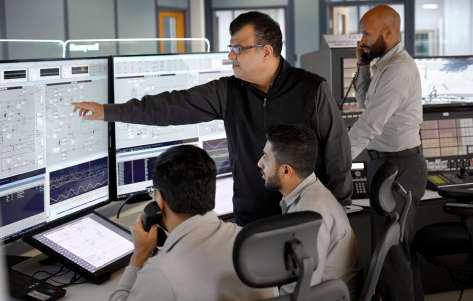
Ammonia plant completed 1068 days of continuous production run by 30 March 2021 (the highest ever, the previous record was 950 days in 2012).
Urea plant completed 1070 days of continuous production run by 30 March 2021 (the highest ever, the previous record was 941 days in 2012).
Methanol plant completed 1351 days of continuous production run by the end of December 2021. (the highest ever, the previous record was 961 days in 2012)
The total cumulative combined production since 1985 achieved 45.4 million tonnes.
The total cumulative combined exported since 1985 achieved 36.8 million tonnes.
The total Ammonia production since 1985 achieved 15 million tonnes.
The total Methanol production since 1985 achieved 15 million tonnes.
The total Urea production since 1998 achieved 15 million tonnes.
Our challenges 2020-2021:
Significant challenges experienced during the reporting period include the following;
• The COVID-19 challenge: preserving our present and future.
• Deferring the turnaround 2020 to 2022 due to challenges in securing resources amidst the COVID-19 pandemic and operating the plants safely and reliably for 4 years since the last turnaround in 2018.

• Continuity of market uncertainty, instability and unpredictability, financial crunch and escalating energy costs.
• One of the highest ever seawater intake temperatures reaching 39.2°C affecting plant performance.
• All the Ammonia and Ammonium Carbamate leaks from various equipment in Ammonia and Urea Plants were identified and addressed during a short shutdown of Ammonia Back -End and Urea plant in 2021 and hence making the plants more reliable and safer to operate till the next Turnaround in March 2022.
GPIC Sustainability Report 20202021 81
Production Performance
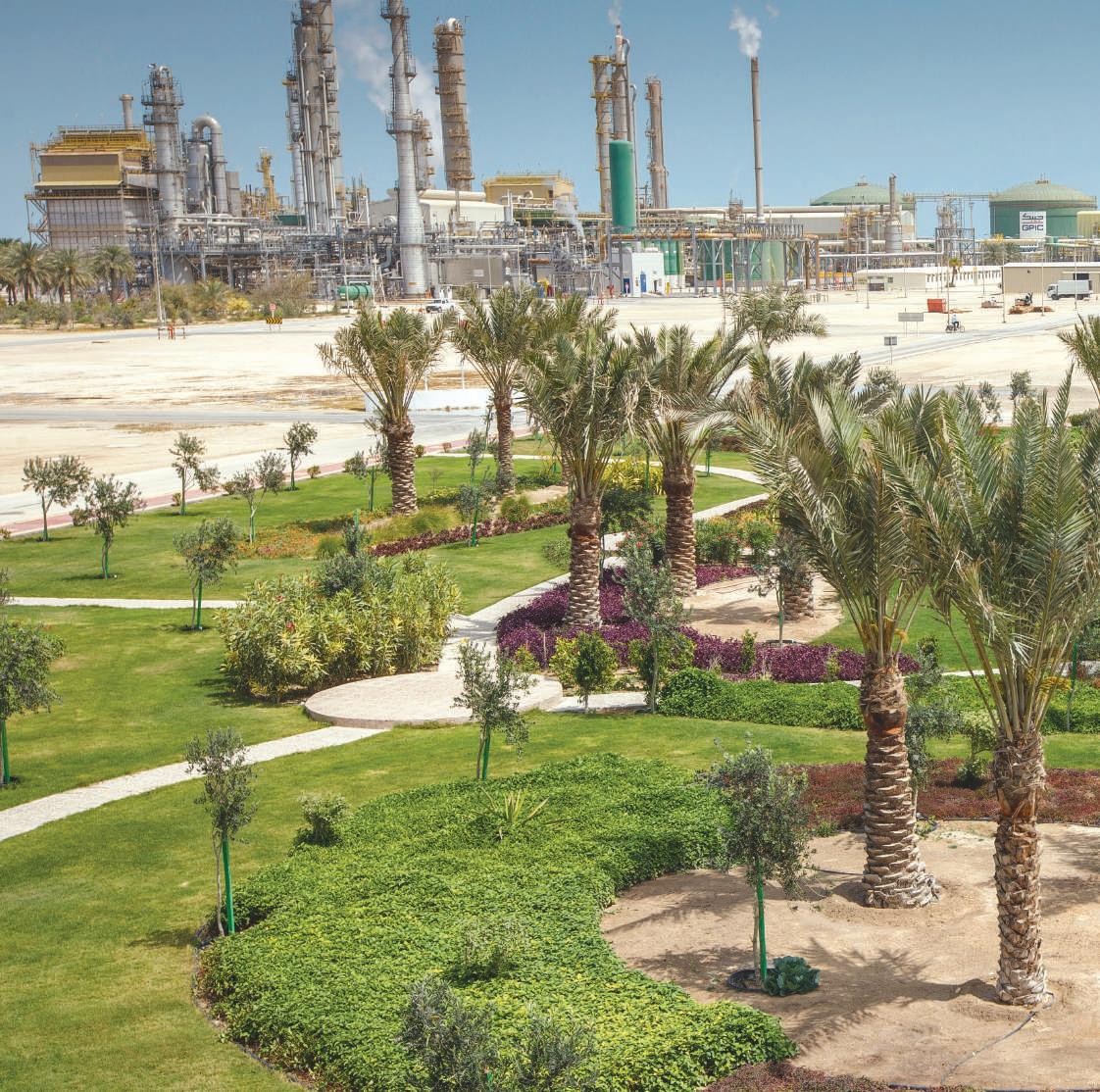
Yearly Production and Export Performance Figures Units 2020 2021 Budget Actual Deviation Budget Actual Deviation Ammonia Production MT 425200 463875 38675 429080 459788 30708 Methanol Production MT 412360 450097 37737 414510 445757 31247 Urea Production MT 651100 718793 67693 650880 706544 55664 Total Cumulative Production MT 1488660 1632765 144105 1494470 1612089 117619 Ammonia Exports MT 54071 71305 17234 58078 56328 -1750 Methanol Exports MT 408000 447635 39635 410,000 434958 24958 Urea Exports MT 651100 705444 54344 650880 717556 66676 Total Exports MT 1113171 1224384 111213 1118958 1208842 89884 On stream Factor (2) Ammonia % 93.17 99.60 6.43 93.02 99.06 6.04 Methanol % 92.35 100.00 7.65 92.30 100.00 7.97 Urea % 92.90 99.69 6.79 92.90 98.95 6.05 Capacity Utilization (1) Ammonia % 96.81 105.62 8.81 98.00 104.97 6.97 Methanol % 93.89 102.48 8.59 94.60 101.77 7.17 Urea % 104.64 115.52 10.88 104.90 115.14 10.24 Plant outages Ammonia Days 25 1.47 -23.53 25 3.40 -21.60 Methanol Days 28 1.14 -26.86 28 0.00 -28.00 Urea Days 26 0.00 -26.00 26 3.80 -22.20 Notes: 1) Capacity utilization is the percentage of design capacity utilized based on calendar days 2) On stream factor is the Operating days as percentage of calendar days
GPIC Sustainability Report 20202021 82
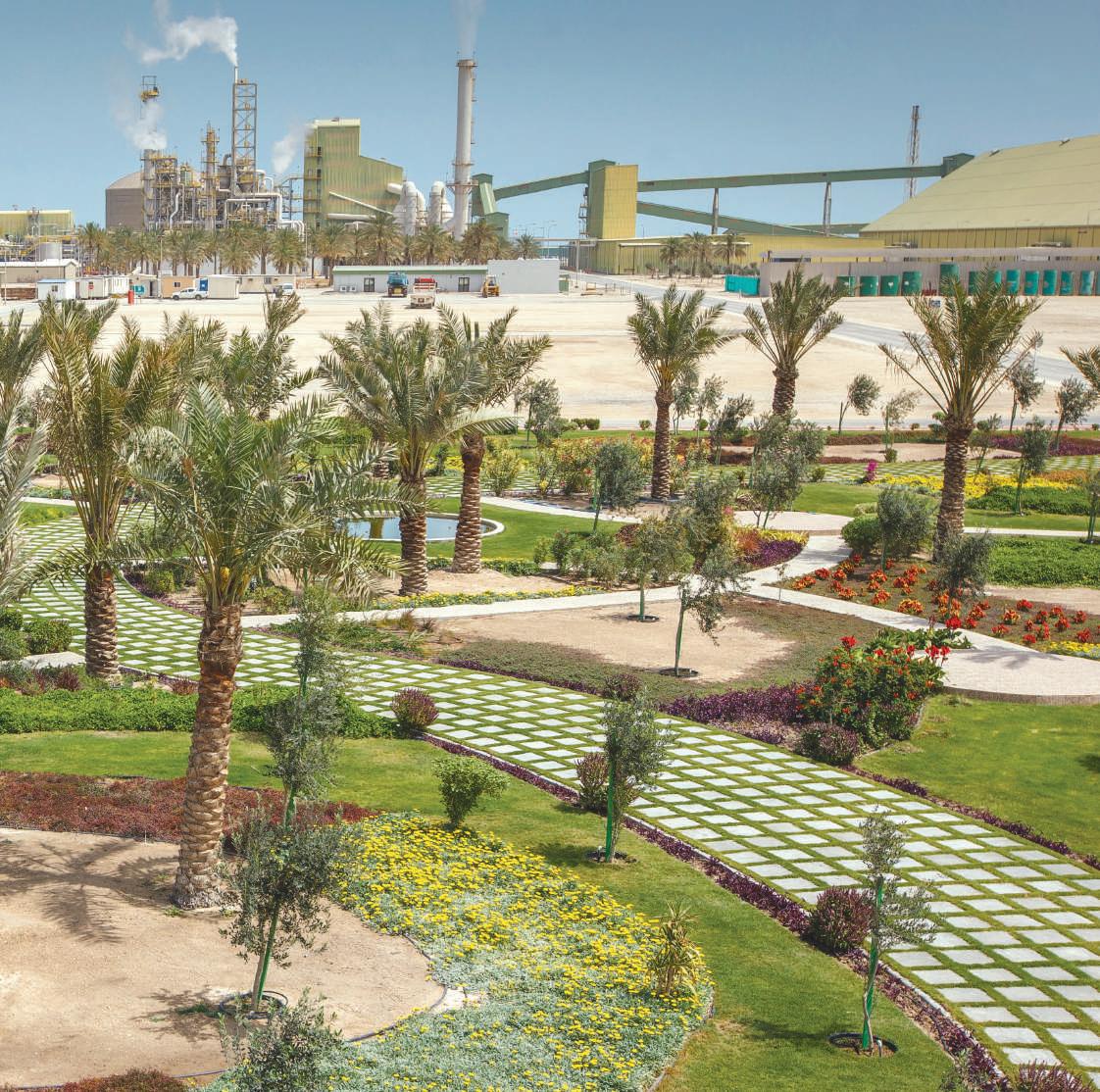
Yearly Exports performance Figures Units 2020 dev 2021 dev Budget Actual % Budget Actual % Ammonia Exports MT 54,071 71,305 31.9 58,078 56,328 3.0 Methanol Exports MT 651,100 705,444 8.3 650,880 717,556 10.2 Urea Exports MT 408,000 447,635 9.7 410,000 434,958 6.1 Total Exports MT 1,113,171 1,224,384 10.0 1,118,958 1,208,842 8.0 Our exports GPIC Sustainability Report 20202021 83
Production Performance
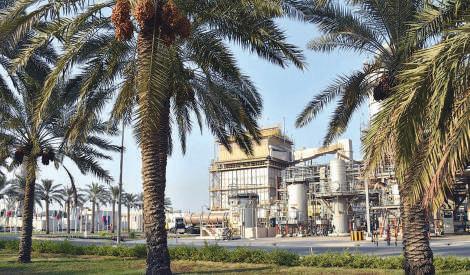

Ammonia export by region Unit 2020 2021 Tonnes Percentage Tonnes Percentage Ammonia export by region China MT 4,723.856 6.6 India MT 10,999.083 15.4 208.958 0.3 Korea MT 55,582.663 78.0 46,669.461 82.9 South Africa MT 9,449.138 16.8 TOTAL MT 71,305.602 100.0 56,327.557 100.0 Urea export by region Australia MT 92,038.463 13.1 32,057.310 4.5 Brazil MT 79,714.217 11.3 168,516.92 23.5 Argentina MT 43,999.824 6.1 India MT 219,970.818 31.2 211,439.389 29.5 Korea MT 32,999.512 4.7 31,618.242 4.4 South Africa MT 32,999.936 4.7 21,999.539 3.0 Sudan MT 20,379.142 2.9 Thailand MT 97,893.494 13.9 46,725.114 6.5 USA MT 93,499.894 13.3 88,999.524 12.4 Mozambique MT 34,961.432 4.9 71,509.557 10.0 Local MT 837 0.1 691.000 0.1 Kuwait MT 150 0.1 TOTAL MT 705,443.908 100.0 717,556.419 100.0
Methanol export by region USA MT 6,298.332 1.4 India MT 10,065.268 2.2 43,884.087 10.1 UAE MT 48,642.711 11.2 Indonesia MT 6,108.346 1.4 Korea MT 25,723.971 5.7 12,999.595 3.0 Thailand MT 94,772.275 21.2 141,403.032 32.5 Taiwan MT 303,953.762 67.9 187,077.673 43.0 Local MT 712.99 0.2 950.870 0.2 TOTAL MT 447,634.944 100.0 434,957.968 100.0 GPIC Sustainability Report 20202021 84
In 2021, we were the beneficiary of favourable product prices of Urea, Ammonia and Methanol with South Korea, India and Taiwan being our key markets

GPIC Sustainability Report 20202021 85
Safety and Health Performance
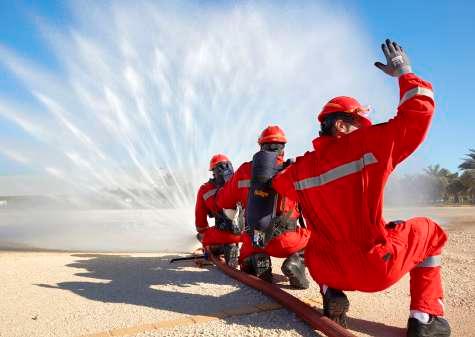
GRI 103: Management Approach Disclosures (103-1, 103-2, 103-3)
Our priority number one- Health, Safety and well -being of our workforce
Safety is our top priority – driven by our leadership and applied across the organization. We believe that employers are only truly sustainable when they ensure the safety, health and welfare of their workers.
GPIC’s leadership commitment to Safety, Health and Environment is built on a genuine belief in the “triplebottom-line” business concept, where profitability and creating shareholder value is equal to the company’s social responsibilities and commitment to health, safety and protection of the environment.
As a forward moving company, GPIC has understood the worker safety dimension of sustainability and has started proactively leveraging the OHS and sustainability connection. With the launch of the UN’s 17 Sustainable Development Goals, GPIC is using these global strategies to underpin its sustainability efforts.
Our Long term goals, the corporate annual goals and the departmental goals clearly highlight our OHS and Sustainability connection and the linkage to the relevant UN’s 17 SDGs.
We are successful at GPIC because Safety, Health and Environmental (SHE) management systems are not just programmes; they are a way of life. As a forward-looking petrochemical and fertilizer company, GPIC recognises that our commitment to SHE is the foundation for building and maintaining trust and public confidence. It is part of being a good citizen, a good neighbour and a good partner. SHE excellence drives our commitment to sustainable business and defines whom we are and what we stand for. By instilling a culture that ensures the well-being and safety of our employees, we empower them to focus on the details and to do what is right first time, every time. This leads to improved performance and reliable, consistent and predictable delivery of our high-quality products.
GPIC considers the safety of its employees and the neighbouring communities as one of its top priorities and responsibilities.
We ensure the highest standards of health and safety at our manufacturing facilities, monitoring carefully every potential risk to our operations and our employees so that we can provide a safe working environment for our people and the community at large. We invest significantly into projects related to the safety, environmental care and the reliability of our equipment and facilities. We are also certified to ISO standards related to Occupational Health and Safety, Risk Management, Business Continuity and Responsible Care ( ISO 45001, ISO 31000, ISO 22301, RC 14001) and have well-established policies related to health and safety. All are certifications and policies can be viewed on our official website www.gpic.com.
“Zero Harm” continues to be our vision. As we move forward, our resolve to achieve our goals have intensified. “Zero Harm” is not restricted to rates, statistics, numbers or metrics, although these are important ways to measure our progress. It is about our people, and keeping our people, facilities, environment and communities safe.
GPIC also has a well-developed health strategy focused on prevention, quality, health system management and advocacy.
Employees are provided with the tools and information they need to take action to invest in their personal health and the health of their families. The company also works to establish a “culture of health and well-being” through additional policies and practices.
Our Performance
Maintaining the safety and health of our employees, their families and our contractors and continued business resilience during 2020 and 2021 amidst the ongoing COVID-19 pandemic was our biggest challenge and achievement.
We have so far successfully tackled the challenge of COVID19 through robust risk management, resilience, discipline and team work.

We proactively identified the pandemic outbreak caused by COVID-19 as one of the GPIC’s enterprise risks using the bow tie risk management methodology, setting a number of preventive and mitigating measures to deal with the risk. A Business Continuity Plan was developed to ensure the safety of the workforce and the continuity of the business. A Crisis Management Team (CMT) chaired by the President was established to manage the Pandemic Outbreak.
So far GPIC has been extremely successful in limiting the COVID-19 related infections to the minimum. This was made possible by the strict implementation of preventative measures, adherence to rules and regulations, company-wide awareness, robust inspections and auditing. 32,957 Random Rapid Test were conducted to ensure the workers entering GPIC are not infected with COVID-19 virus. Moreover 92% of our workforce is fully vaccinated.
GPIC Sustainability Report 20202021 86
These continual improvement efforts culminated in achieving a record +35.3 million working hours for its workforce and contractors without any lost time accident, exceeding years of safe work. Additionally, we did not have any Tier 1 and Tier 2 process safety incidents, zero reportable environmental incidents and zero security breaches and incidents.
During such challenging times, GPIC won the RoSPA Chemical Industry sector award, the Arabia CSR Award for the 7th consecutive year in the large business category and also in the partnerships and collaboration category.
The following is a list of significant Safety and Health achievements during 2021:
- + 35.3 million man hours without lost time accidents.GPIC won the RoSPA Chemical Industry sector safety award and the British Council safety award.- There were Zero Tier 1 and Tier 2 process safety incidents.
- COVID-19 precautionary and preventive measures: Company wide support provided by SSHE department through awareness, prevention and compliance
endeavoring to control the spread of infection. 32,957 Random Rapid Test were conducted to ensure the workers entering GPIC are not infected with COVID-19 virus.
- GPIC’s fire and safety operator saved the lives of a Bahraini family of six, trapped in a house fire. This is a true testimony of the effective training that he has undergone while at GPIC.
- Capex project to replace fire panels has been completed successfully.
- As part of emergency response and preparedness, 8 fire plans were prepared for high risk scenarios and 24 fire & safety and 18 security mock drills were carried out in 2020-2021.
- Major security Emergency Exercise with Bahrain National Guards and Local Government Authorities conducted on 26 October 2021.
- Digitization: Virtual training, webinars, workshops, interviews, external and internal audits.

OUR SAFETY, HEALTH, ENVIRONMENT AND SECURITY PERFORMANCE S. No METRIC NAME METRIC FORMULA / DEFINITION 2016 2017 2018 2019 2020 2021 A Occupational Health &Safety 1 Employee Fatalities # of Fatalities 0 0 0 0 0 0 2 Lost Time Injury Incident rate for Employees (# of days away from work cases X 200,000) / Employee man-hours worked 0 0 0 0 0 0 3 OSHA Recordable Cases Incidence Rate for Employees (# of Injuries X 200,000) / Employee man-hours worked 0 0.36 0 0 0.31 0.21 4 Contractor Employee Fatalities # of Fatalities 0 0 0 0 0 0 5 Lost Time Injury Incidence Rate for Contract Employees (# of Injuries X 200,000) / Contractor manhours worked 0 0 0 0 0 0 6 OSHA Recordable Cases Incidence Rate for Contract Employees (# of Injuries X 200,000) / Contractor manhours worked 0 0 0 0.206 0 0.20 7 First Aid Injuries (Contract+ employees) # of Injuries 13 8 23 (TA YEAR) 8 7 11 B Process Safety 1 Process Safety Incidents (Tier 1 and Tier 2) (# of Incidents that meet the Process safety Incident Criteria 0 0 0 0 0 0 2 Process Safety Total Incident Rate (PSTIR) (# of Process Safety Incidents x 200,000) / (Employee + Contractor Employee man-hours) 0 0 0 0 0 0 3 Process Safety Total Incident Severity Rate (PSTISR) (Total Severity Score x 200,000) / (Employee + Contractor man-hours) 0 0 0 0 0 0 C Environment Reportable Environmental Incidents Tier 1 and Tier 2 Incidents 0 0 0 0 0 0 D Security 1 Security breaches Number of security breaches 0 0 0 0 0 0
GPIC Sustainability Report 20202021 87
Safety and Health Performance
Self-assessment of Responsible Care codes of management practices was completed.
- GPIC Participated in International Fertilizer Association (IFA) safety and environment benchmarking.
Sick
- Security Management System enhancement project was completed successfully.
- Radiation License for the use of X-ray machines and radioactive sources obtained.
Notes: 1) Sickness Absence % ratio according to International Labor Organization (ILO) (No. S.L days X 100)
No. of Emp. X No. Calendar days / year
Emergence preparedness for a swift response - A major security drill was carried out at GPIC in October 2021
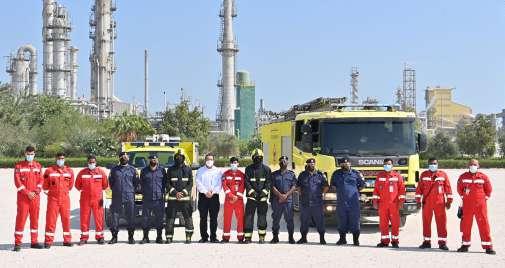
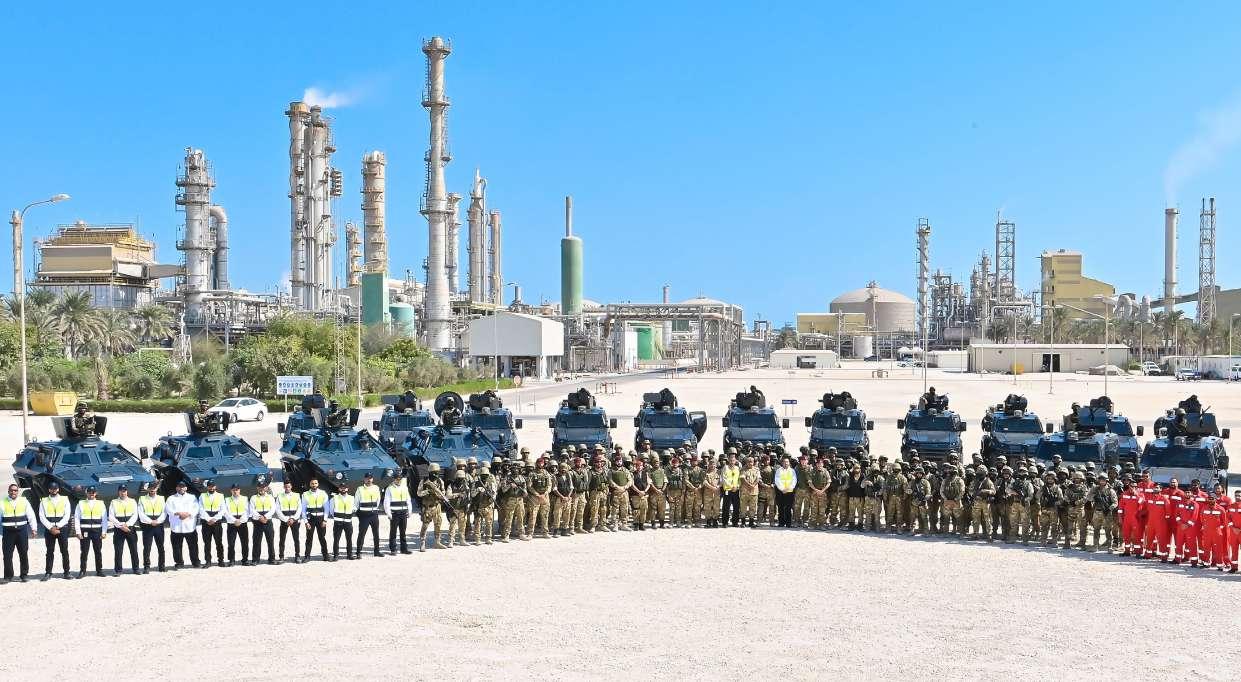
-
Year No. of sick leave days (with surgeries) % sick leave days % sick leaves by gender % sick leave days by age Male Female ‹20 20-29 30-39 40-49 50-59 60+ 2010 5969 2.8 2.6 5.7 1.5 1.5 2.5 3.9 2.4 1.8 2011 4729 2.4 2.3 2.2 1.4 2.1 2.4 2.9 1.8 1.0 2012 5486 2.6 2.76 2.4 1.92 3.08 2.83 3.03 1.97 1.51 2013 4963 2.4 2.39 2.24 0 2.65 2.57 2.65 1.59 1.05 2014 4694 2.28 2.3 2.17 0.00 2.66 2.06 2.64 1.98 0.46 2015 5040 2.44 2.37 2.69 0.00 2.71 2.24 2.84 1.93 0.84 2016 3603 1.88 1.78 2.27 0.00 2.42 1.75 1.91 1.29 1.49 2017 2939 1.64 1.83 3.28 0.00 2.62 1.93 2.27 1.18 0.71 2018 2454 1.44 1.48 1.73 0.00 2.32 1.74 1.32 0.86 1.13 2019 2324 1.36 1.32 1.51 0.00 2.11 1.56 1.11 1.05 0.89 2020 1383 0.81 0.85 0.42 0.00 0.73 0.84 1.04 0.67 0.09 2021 3100 1.81 1.95 0.52 0.00 1.65 2.02 1.84 1.59 1.57
Leaves Statistics (with surgeries)
Sick
Total
Leave % = ________________________________________
GPIC Sustainability Report 20202021 88


Sick Leave Statistics (without surgeries) 2016 2017 2018 2019 2020 2021 Actual Target 1000 2000 3000 4000 5000 0 6000 3900 3600 1792 3000 2800 2000 1800 1693 2494 1423 1175 782 GPIC Safety Performance - LTA free hours 2003 2004 2005 2006 2007 2008 2021 5000 10000 15000 20000 25000 30000 35000 0 40000 Running Hours (Thousands) Contractors 1,513,256 145,196 914,036 1,731,306 235,706 1,015,049 12,491,066 GPIC 1,878,337 3,238,403 4,417,848 739,643 2,037,272 3,184,435 22,861,556 Total hours 3,391,593 3,383,599 5,331,884 2,470,949 2,272,978 4,199,484 35,352,622 GPIC Sustainability Report 20202021 89
Protecting our Planet

GPIC Sustainability Report 20202021 90

GPIC Sustainability Report 20202021 91
Environmental Sustainability

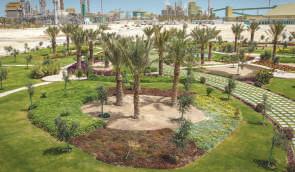

Our Performance Highlights
ZERO
Reportable Environmental Incidents in 2020-2021
+1.4 MILLION
tons CO2 emissions reduced through the carbon dioxide recovery plant since 2009


50% reduction in paper consumption in 2021 as compared to a target of 30%

ZERO
Hazardous waste to landfill in 2020
19.4% INCREASE
in recycling in 2021 as compared to a target of 30%

7,666
LEDS

since 2013 resulting in energy saving of 1697 MWH/Y and CO2 emission reduction of 846 tons/year
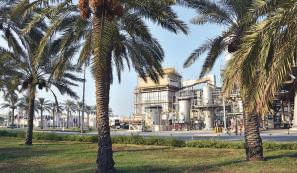
5.6%
lower specific energy consumption at 7.57 Gcal/ MT of product as compared to 2021 target of 8.02 Gcal/MT of product

1.12 MILLION
tons CO2e (scope 1+ scope 2) GHG emissions in 2020
ZERO
incidents of non-compliance to environmental legislation in 2020-2021
GPIC Sustainability Report 20202021 92
GPIC is a pioneer in environmental protection. The company has consistently demonstrated that a rapidly growing company in a highly competitive emerging market cannot only meet its environmental responsibilities, but also dramatically reduce its carbon footprint whilst simultaneously improving profitability

GPIC Sustainability Report 20202021 93
GPIC aspires to be a key enabler in ensuring access for all to safe, nutritious and sufficient food. Responsible resource and manufacturing stewardship, supported by sustainable consumption practices are fundamental to building equitable and better quality food systems globally. Towards this end, we are committed to embedding sustainable practices in our day to day operations as well as working closely with our partners and peers to embrace business models, products and solutions that align and build greater ambition towards the achievement of these goals.
Yasser Abdulrahim Alabbasi, GPIC President
Responsible Consumption & Production: WHY IT MATTERS

What’s the goal here?
To ensure sustainable consumption and production patterns.
Why?
Economic and social progress over the last century has been accompanied by environmental degradation that is endangering the very systems on which our future development and very survival depends.
If we don’t act to change our consumption and production patterns, we will cause irreversible damage to our environment.
GPIC ‘s contribution towards SDG# 12
We ensure responsible consumption and production through resource efficiency; energy conservation and energy efficiency; high on-stream factor resulting in less process venting and flaring; maintaining air and water quality;continuously decreasing our waste to landfill through enhanced recycling and reuse( cardboard recycling started in 2015);ongoing campaigns for waste minimization and recycling; sustainability reporting and advocating it as part of target 12.6.
GPIC Sustainability Report 20202021 94
Environmental Sustainability
Environmental Sustainability
GRI 103: Management Approach Disclosures
(103-1, 103-2, 103-3)
At GPIC, protecting people and the environment is at the core of everything we do and every decision we make.
GPIC has consistently demonstrated that a rapidly growing company in a highly competitive emerging market cannot only meet its environmental responsibilities, but also dramatically reduce its carbon footprint whilst simultaneously improving profitability.
As the world’s climate begins to change, no company can afford to ignore the impact it has on the environment. We have committed ourselves to some of the most stringent standards when it comes to environmental management because we believe that the way any organisation manages environmental issues is a crucial measure of their responsibility, competitiveness and vision.
At GPIC, our management approach is based on three areas: Reducing the environmental footprint of our activities, embedding environmental protection (alongside safety and health) into our operations and complying with legislation, and communicating our environmental performance to our various stakeholders as done through this report.

We have shown our strong commitment by establishing and upholding high environmental standards while at the same time pursuing capabilities and expertise towards softening the impact of our industrial activities on communities and the surrounding natural environment.
This approach is aligned to the Bahrain Environmental policy, based on the precautionary principle, the polluter pay principle, the sustainability concept, and the concept of shared responsibility, to fulfill the ultimate goals of sustainable development through harmonious action of all relevant actors.
Below are the highlights of our Environmental Strategy based on which we have prioritized our investments.
Environmental review at design stage
An environmental impact study and review at the design stage is carried out for all minor and major projects as well as engineering modifications. We identify environmental impacts and seek to avoid them or minimize them right at the planning stage. Any gaps or concerns highlighted as part of the environmental impact study are addressed to ensure an environmentally sustainable project. In addition to that, an Environmental Review for each Modification and Capital Project is carried out as part of the Company’s electronic MOC system.
Reliable operations with minimum business interruption
We believe that by operating our plants in an efficient and reliable manner with minimum production interruptions and down-time, the environmental impacts from our operations will be minimized. Hence, to achieve this we invest in reliable, state of the art technology and equipment, and ensuring that all our people are appropriately trained for their roles.
Monitoring and control of emissions, effluents and waste
As a part of our responsible operations protocol, we actively monitor our gas emissions, liquid effluents and
waste generation, and have also initiated several measures to reduce our carbon footprint to improve our overall environmental footprint.
Resource Efficiency and conservation
We ensure that we are maximizing resource utilization within all our processes. This includes issues around water, energy, and even raw materials, to minimize wastage from our manufacturing processes, and ensure that our facilities are greener and more eco-friendly.
Strict Compliance to Legislative and regulatory requirements
We ensure regulatory compliance to applicable environmental laws and legislation. This is embedded at the core of all our policies.
Benchmarking for continual improvement
We benchmark ourselves against some of the highest global standards by pursuing internationally recognized certifications such as the Environment Management Standard ISO-14001, Responsible Care RC 14001, ISO 50001 and others. Moreover, we also take part in specific environment and energy benchmarks by global organizations such as International Fertilizer Association(IFA) and others.
Regular Audits
In addition to internal audits carried out by our various committees, our facilities are frequently audited by third party expert organizations to ensure that we are holding ourselves to the standards we have committed ourselves to.
Environmental awareness
We are actively engaged in inculcating a culture of environmental responsibility amongst our people and in the communities we are located in. This is sustained by training our people and providing them with the necessary skills, competencies and empowerment to continuously improve, as they are the key to the success in implementing HSE best practices.
Biodiversity and protection of natural habitats
Our production site now hosts; a fish farm where about 100,000 sea bream fish are released into the deep sea annually to enrich marine life. We also nurture; a bird sanctuary which hosts birds of different species (migratory and local). Our facility in Bahrain is surrounded by a number of gardens specifically designed to promote the growth of rare, indigenous, aromatic and desert plants. The gardens are also used to help educate school students on environmental preservation and to expand their knowledge on Bahrain’s natural biodiversity. We have planted mangroves within our facility and recently planted 1000 mangroves in 2021.
Environmental care beyond borders
At GPIC, in line with our business principles of sustainability, coupled with responsible care and corporate social responsibility ethics, our strategy of environmental management goes beyond our facilities. Our Responsible Operations strategy ensures that we do not have an adverse impact on our neighbouring communities. The key goal is to manage our business processes to produce an overall positive impact on society.
GPIC Sustainability Report 20202021 95
Environmental Sustainability
GRI 103: Management Approach Disclosures (103-1, 103-2, 103-3)
Climate Change Commitments
In an era of global climate change, GPIC greenhouse gas emissions, as well as its carbon footprint, are some of the biggest challenges we face when planning our investment in environmental sustainability.

GPIC has been able to implement some projects such as the urea plant and the carbon dioxide recovery plant that have reduced the company’s carbon footprint and greenhouse gas emissions, thereby helping us to contribute towards slowing the pace of climate change. The Carbon Dioxide Recovery (CDR) plant commissioned in 2009, captures 450 MT/Day of CO2 from the methanol reformer flue gases and then recycles it back into our processes. Hence reducing the Company’s carbon footprint in addition to improving resource efficiency and production augmentation. This project is the best example of how GPIC combines business strategy with environmental sustainability.
Life Cycle Perspective:
Some of GPIC’s significant environmental impacts occur during the sourcing of raw materials, manufacturing, transportation, delivery, and final disposal of its product or service. By monitoring and reviewing relevant information, we can potentially prevent or mitigate adverse environmental impacts during these life cycle stages. We consider the extent of control or influence that it can exert over activities, products and services considering a life cycle perspective.
GPIC and the Environmental dimension of the Sustainable Development Goals (SDGs):
In September 2015, 193 Member States of the United Nations adopted 17 new Sustainable Development Goals (SDGs) to make our world more prosperous, inclusive, sustainable and resilient. These SDGs represent an unprecedented opportunity for companies such as ours, to align their own sustainability goals with the broader societal aspirations at hand.
The Environment related domain is expanded in the SDGs and the environmental dimension of sustainable development is fully fleshed out in the goals on oceans and marine resources, ecosystems and biodiversity, land degradation and desertification, and are also main streamed/ embedded under all other goals. Almost half of the SDGs have a significant relevance to our environment.
We have pro-actively aligned our business priorities with the SDGs and as part of this journey have demonstrated our contribution to a number of SDGs including the ones related to the Environment.
Global engagement and sustainability
In addition to the commitment and responsibilities we have for our operations, we are also engaged in environmental efforts at several levels, Creating Impact, efforts for environmental sustainability and stewardship. One of the examples is our commitment to the UN Global Compact 10 Principles including the three principles on environmental sustainability and also the UN Global Compact Food and Agriculture Business Principles (FAB 6) where Principle number 2 is to be Environmentally Responsible.
We take environmental stewardship very seriously and in this context we are the joint Sponsors of the annual RoSPA International Dilmun Environmental Award that is given to the companies with outstanding Environmental management system.
Our Environmental Performance 2020-2021
Our Environmental performance during 2020-2021 was par excellence. We achieved our environmental targets including the energy targets. Our emissions , effluents and wastes were in compliance to the Bahrain Environmental Standards and we did not experience any reportable environmental incidents in 2020-2021. We enhanced our waste recycling, introduced card board recycling for the first time in GPIC and also implemented recycling at the GPIC Club. We continued our drive towards energy efficiency and energy efficiency projects such as the introduction of energy efficient lighting. We participated in a number of environmental bench marking studies including IFA bench marking for effluents and emissions. We continue to maintain our biodiversity projects within GPIC and also outside and established a new Neem tree garden in 2019 with 150 trees. As part of our climate action, we have planted 1000 mangroves in 2021 within our facility, this is in addition to several hundred mangroves planted several years ago. We are also in the process of studying a 3MW solar energy project at GPIC.
Our Salient achievements
More recently the Company received the Best Partnership Award for its Schools Environmental Research programme from UAE based Arabia CSR Network. GPIC continued with its leadership role in SSHE excellence at regional and global levels and has been actively involved and engaged with Regional and Global organizations such as National Safety Council, Royal Society for the Prevention of Accidents, UN and UN Environment. GPIC has engaged actively governmental bodies on National level strategy formulation and legislation revision on environmental issues covering Paris climate change agreement COP 21 and associated greenhouse gas inventory reporting, Role of Industries and private sector in the implementation of UN 17 SDGs, National Energy Efficiency and National Renewable energy action plan, Carbon capture and potential future scenarios, Ozone depletion and Montreal Protocol national level initiatives and way forward, National Implementation plan of the Stockholm Agreement related to BCPs. GPIC team participated in last year’s COP26 held in Glasgow.
Since 2013 we are continuing with the replacement of existing conventional lights in process areas, non- process areas, buildings and street lights with energy efficient LEDs. Since 2013, we have installed 7666 LEDs both in process and nonprocess areas resulting in an energy savings of 1696 MWh/Y and a GHG emission reduction by 846 tons CO2e/Y.Energy efficient LEDs replacement project continued and in 2021 alone we installed 443 LEDs with an annual energy savings of 142.64 MWh and a yearly GHG reduction of 70 tons CO2.
We have stopped our CDR steam boiler and are utilizing excess steam available from our network. This has resulted in a cumulative natural gas savings of 2 million NM3 during 2021.
GPIC Sustainability Report 20202021 96
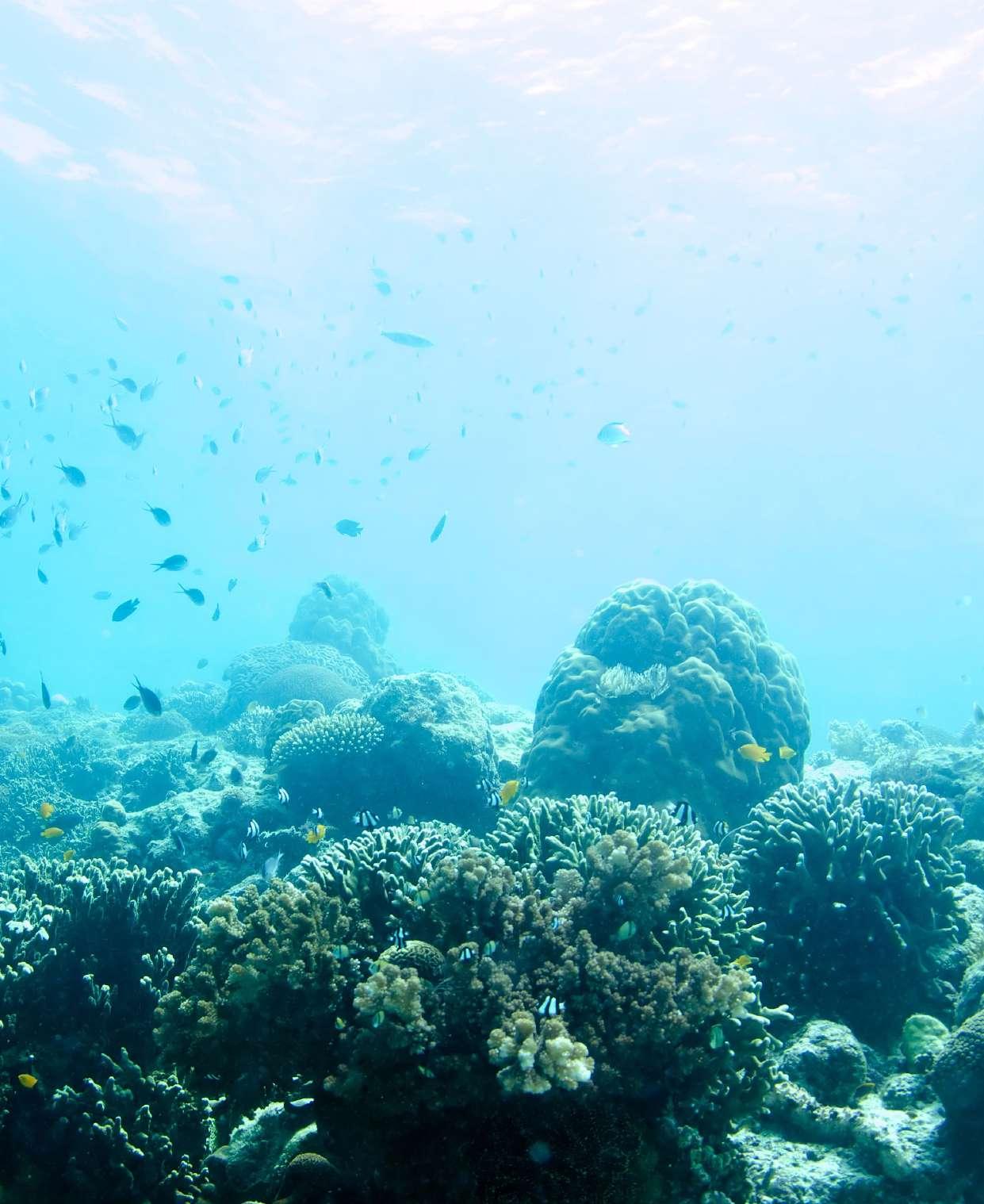
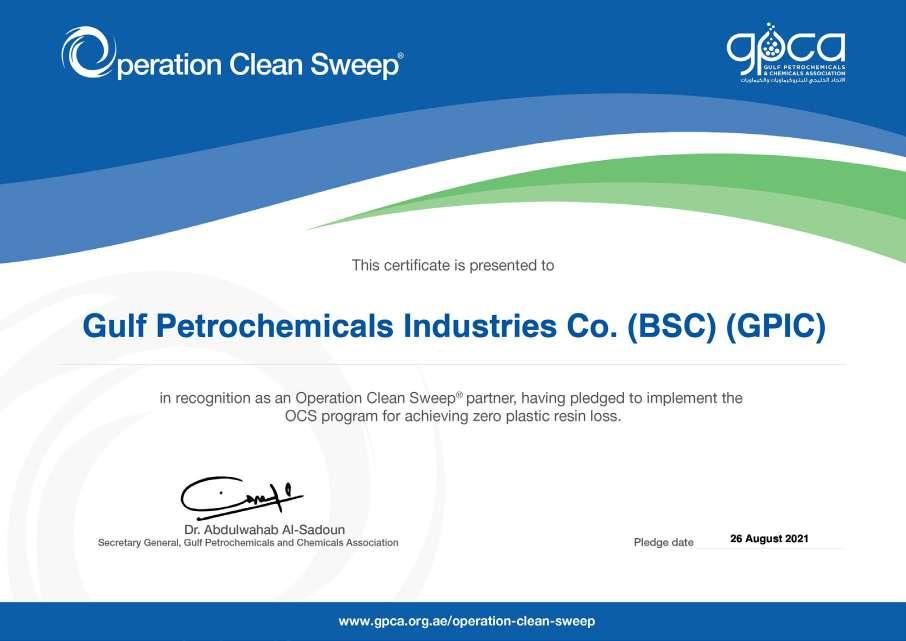
GPIC Sustainability Report 20202021 97
GPIC becomes an Operation Clean Sweep® partner, having pledged to implement the OCS program for achieving zero plastic resin loss.
Environmental Sustainability
GRI 103: Management Approach Disclosures
(103-1, 103-2, 103-3
• As part of Post COP 21 requirements, GPIC in collaboration with NOGA provided refresher training to its Greenhouse gas (GHG) inventory reporting team members on the use of IPCC GHG Inventory software and issued its annual GHG Inventory Report in 2020 and 2021.
• GPIC in cooperation with UN Environment and Ministry of Education continued with the Green Wave initiative that was launched in 2015. Through this program we sponsor and facilitate the planting of local trees at public schools in order to promote biodiversity awareness and encourage environmental stewardship. At each school a variety of local tree saplings, such as pomegranate and olive, are planted by the students. It is worth mentioning that since the launch of the program in 2015, 90 schools have benefited from the program with the distribution of 3,600 sapling trees in total. However, due to COVID -19 the program has been stopped temporarily.
• To date we have recycled 120 tonnes of plastic, paper, metal cans and card board.This has resulted in reduction of our carbon emissions by 200 tonnes.
- There were Zero reportable environmental incidents and Zero Tier 1 and Tier 2 process safety incidents.
- Our commitment to transparency and accountability continued as we issued our 6th GRI sustainability report in February 2022, marking ten years of sustainability reporting at GPIC.
- GPIC obtained the Radiation License for the use of X-ray machines and radioactive sources at its facilities.
• Publicizing environmental awareness amongst future generations through our flag ship environmental awareness lectures program in both public and private schools in Bahrain has progressed exceptionally well since 2001.
The total number of students benefitting from this program has reached 43,700 in 574 schools. These awareness lectures are given by our young engineers and they also touch base on subjects such as Responsible Care and Sustainable Development Goals in addition to Environmental Sustainability. Due to the on-going COVID-19 pandemic, the program has been stopped temporarily and we are currently exploring ways to continue the lectures virtually.
• Since 2004 we are continuing with our flag ship GPIC Environmental Award program. Its a partnership program between GPIC and the Ministry of Education for Environmental Research targeting secondary school students in Bahrain. We continued this program virtually in 2021 amidst the COVID-19 pandemic.
Our Challenges
• Our biggest environmental challenge is the location of our facilities, which is surrounded by sea, neighbouring facilities and the residential communities. We as a
responsible care company are mindful of the challenges and hence follow a precautionary approach when it comes to environmental sustainability.

• Compliance to the Environmental legislation, reducing energy consumption and emissions, resource conservation, energy efficiency, hazardous waste management and pollution prevention are some of our main priorities towards the environmental challenges we face at GPIC.
- Impact on sea water effluent dispersion as a result of reclamation around GPIC and the increase in sea water intake temperature during summers is a challenge impacting the energy requirements and the production rates.
MATERIALS GRI 103: Management Approach Disclosures
(103-1, 103-2, 103-3)
GPIC embraces Responsible consumption &production as part of its sustainability and environmental strategy. Resource efficiency and optimum material use is embedded in all our operations. Where ever possible we progress the concept of reuse and recycle. Optimum material use reduces both our production cost and the carbon foot print.
Materials used by weight or volume GRI 301-1
As part of our corporate drive, we have reduced our paper consumption significantly over the past three years mainly due to enhanced awareness and use of electronic platforms. We achieved our paper reduction targets for both 2020 and 2021 as most of our staff were working from home during 2020/2021, in addition to our digitalization strategy.
Material Unit Quantity 2020 Quantity 2021 Natural gas MMSCF 46,161 46,137 Chemicals Kg 7,158,152 7,684,023 Catalyst M3 1,020 92,910 Paper Kg 1,170 1,138 Diesel liter 85,000 90,000 Petrol liter 135,000 150,000
GPIC Sustainability Report 20202021 98
Recycled input materials GRI 301-2
We
ENERGY
GRI 103: Management Approach Disclosures (103-1, 103-2, 103-3)
The Company believes that a sustainable energy future is connected to innovative technologies and energy efficient operations where sustainable production and consumption is the area of focus.
The manufacturing of fertilizers is a relatively clean but highly energy intensive process. In a global context, the greatest environmental impact is from GHGs emitted during the production of ammonia and methanol along with the emissions from fossil fuel fired boilers and gas turbines.

We have reduced our GHG emissions and improved our energy efficiency significantly since the commissioning of our first ammonia and methanol plants in 1985. At that time, the total energy per tonne of the product was 11Gcal/Metric tonne, which has been reduced to 7.4 Gcal/Metric tonne in our current operations. This significant reduction has been achieved through reliable operations with high on-stream factor, high capacity utilization, and through a range of energy saving
projects, such as the implementation of the urea plant in 1998 and commissioning of the carbon dioxide recovery unit in 2009.
In recent years, we have embarked on many energy saving projects, including the ammonia converter revamp that involved the replacement of Uhde converter basket with Haldor Topsoe S-200 series basket. This has resulted in a reduction in the synthesis loop pressure and a net energy saving of 0.17 Gcal/MT of ammonia produced. Furthermore our equipment have been technically upgraded to optimize energy efficiency. Similarly many energy-saving projects have been successfully implemented in our plants, leading to improved energy efficiency and the added benefit of reducing CO2 emissions.
With energy efficiency being a corporate priority, we opted to undergo an ISO:50001 certification in 2015. Among our several energy goals, we have an ambition to replace all the conventional lights currently being used within the facility with LEDs and also to provide for solar energy infrastructure to support our energy requirements for the buildings outside of the process areas.
do not use any recycled input materials in our processes.
Paper Consmuption Reduction 2016 2017 2018 2019 2020 2021 A3 Paper (Ream) A4 Paper (Ream) 2,238 35 105 59 39 35 30 0 500 1,000 1,500 2,000 2,500 1,985 1,965 1,961 1,155 1,308 GPIC Sustainability Report 20202021 99
Environmental Sustainability
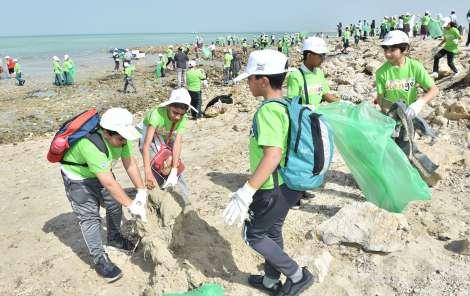
Our latest initiatives 2020/2021 and beyond
- GPIC reduced the daily natural gas consumption by shutting down the Carbon Dioxide Recovery unit(CDR) steam boiler and utilised the conserved natural gas to generate more power in 2021. This resulted in reducing the total cost of energy as well as our carbon footprint.
- A feasibility of installing 3 MW Solar energy project at GPIC is being studied.
The following energy related projects are planned for 2022:
- Improving Urea Reactor conversion efficiency by providing supercup trays.
- Bypassing of Dehydro- Reactor in urea plant.
Energy consumption Gcal/MT of saleable product
- Upgrading Urea side Sea Water / Fresh Cooling water Plate type Exchangers.
- Provide bypass across tube side of E-0401 in ammonia plant to maintain methanator inlet temperature.
- Improve HH steam temperature inlet to syngas compressor turbine MT-0701.
- Replace Methanol reformer catalyst tubes with G4852 Micro R material.
- Other miscellaneous energy related projects.
Energy consumption outside of the organization GRI 302-2 For this report we have not calculated energy consumption outside of the organization. However we will be considering scope 3 estimation for our future reports.
2016 2017 2018 2019 2020 2021 Actual Target 7.7 7.55 7.58 7.3 7.4 7.5 7.6 7.7 7.8 7.9 8.0 8.1 8.2 7.2 8.3 7.755 7.99 7.8 8.21 8.02 7.53 7.37 7.42 7.57 2021 2020 2019 2018 2017 2016 Component Unit Quantity Quantity Quantity Quantity Quantity Quantity Total energy consumption as Natural Gas (Feed and fuel) GJ 37,234,352 37,241,253 36,887,288 34,861,736 37,153,352 37,277,395 Total imported electricity MWH 114,893 119,768 139,386 121,265 135,764 148,341 Total imported electricity in terms of natural gas GJ 1,328,341 1,384,706 1,611,524 1,402,014 1,629,068 1,779,981
Energy consumption within
organization GRI 302-1 GPIC Sustainability Report 20202021 100
the
Reduction of energy consumption GRI 302-4
In the light of the increasing gas price in Bahrain and increased competitiveness in the global market, reliability and energy efficiency have become one of the most important means to maintain and sustain the profitability of a petrochemical plant. GPIC, has been very successful in achieving high standards by consistently maintaining on-stream factors, as well as an excellent safety track record for the Complex.
On the energy front, the specific energy consumption of the Ammonia, Methanol and Urea plants has improved over the years. This improvement is an outcome of implementing various energy saving and environmental schemes and adopting efficient technologies for the new equipment and plants. The declining trend in the average energy consumption of the plants over the years is the testimony to these efforts.
GPIC always believed that a plant with high on-stream factor and with high capacity utilization only, can be regarded as an energy efficient plant on a sustained basis.
In line with this theme, some of the major modifications implemented to improve the reliability and efficiency in the past 15 years, are listed below detailing their accrued benefits
• 2007:
o Replacement of Ammonia plant Secondary Reformer with Modified Design helped in reducing the specific energy consumption by 3.7%.
o Reformer Tubes Replacement in Ammonia Plant and Methanol plant to take advantage of reduced specific energy consumption. An energy saving of 0.4% i.e. 0.04 Gcal/MT of Methanol was realised.
• 2009-2010:
o Carbon dioxide recovery unit and Urea Stripper Replacement to take advantage of reduced specific energy consumption The overall specific energy consumption after CDR and Urea Stripper has reduced by around 3.4%.
• 2012:
o Replacement of Converter Basket in Ammonia Synthesis Converter resulted in a reduction in the synthesis loop pressure and a net energy saving of 0.17 Gcal/MT of ammonia produced.
• 2014-2017:
o An 11 KV capacitor bank was installed and commissioned in April 2015 to improve the power factor. The improved power factor above 0.9 shall ensure optimum consumption of electricity without much reactive power loss to both GPIC and Electricity and Water Authority. This has resulted in substantial cost saving for the Company and the net saving as a result of this project has been US$ 1.6 million till December 2015.
o As part of ISO 50001 GPIC has identified its significant energy uses which is primarily natural gas as fuel and steam. In this context a couple of energy saving opportunities have been identified and modifications are being processed for implementation in Urea plant and CDR unit.
• 2018-2019:
o GPIC’s focus on energy efficiency continued and in 2019 the energy target for the year was 7.80 Gcal/MT and we actually achieved 7.37 Gcal/MT.
o The project to replace conventional lights with LEDs is progressing. The project started in 2013. So far 6604 LEDs installed with an energy saving of 1486.35 MWH/yr and CO2 reduction of 741.66 T/yr.
o Reduction of fuel natural gas in CDR unit by using surplus LSU in Urea Plant to CDR unit resulting a saving in natural gas by 990 NM3/h and GHG reduction of 7831 T/ yr of CO2
o Interconnection of discharge of Boiler Feed Water pumps of Auxiliary Boilers that resulted in a saving of 8T/H of medium pressure steam. GHG reduction of 8224 T/yr of CO2
• 2020-2021:
o GPIC reduced the daily natural gas consumption by shutting down the Carbon Dioxide Recovery unit(CDR) steam boiler and utilised the conserved natural gas to generate more power in 2021. This resulted in reducing the total cost of energy as well as our carbon footprint. The cumulative natural gas savings were of the order of 2 million NM3 in 2021.
- A feasibility of installing 3 MW Solar energy project at GPIC is being studied.
2021 2020 2019 2018 2017 2016 Component Unit Quantity Quantity Quantity Quantity Quantity Quantity Energy Intensity Gcal/MT of Combined product 7.57 7.42 7.37 7.58 7.53 7.55 Energy intensity GRI 302-3
GPIC Sustainability Report 20202021 101
Environmental Sustainability


Reduction of energy requirements of products and services
GRI 302-5
Not Applicable. We do not sell products that require energy for use. (such as electrical appliances, computers etc.)
WATER
GRI 103: Management Approach Disclosures
(103-1, 103-2, 103-3)
Water is an important factor in the manufacturing processes. GPIC mainly needs it for production of steam and cooling Purposes, and some part of it goes towards our horticulture practices. Our water requirements are through a desalination mechanism of sea water, and our plants are designed in a way where most of the process related water streams such as process condensate, steam condensate is recovered and recycled back into the process after treatment through steam stripping and polishing for higher resource optimization and energy efficiency.
There is a strict monitoring regime involving online analysers, laboratory analysis and regular checks by government regulators. These stringent controls ensure that we remain compliant to the national legislative requirements by not exceeding the allowable threshold levels. Ground water monitoring is also carried out to ensure the process fluids and chemicals do not contaminate the sea water and that any leakages or seepages are detected on time. In 2012, the use of chlorine from sea water was eliminated and Sodium Hypochlorite was introduced as a safer alternative. In 2014
GPIC constructed and commissioned a double HDPE lined evaporation pond which is capable of storing 1000 m3 of waste water and other solvents. This pond was used very effectively during our turnaround in 2015 and 2018 for spent fresh cooling water (nitrite based), catalyst contaminated waste water (Heavy metals contamination) etc. The solid sludge after evaporation is disposed to the government controlled hazardous waste landfill site or sent to other waste management facilities for treatment.
The waste water generated in our processes is treated through skimming (oil removal) and neutralization to reduce the pollutant to acceptable limits prior to discharging it into the marine environment. Hence, our effluents do not burden the environment.
On an average, during 2020-2021 the discharged water to marine environment contained Chemical Oxygen Demand (COD) value of ‹25 ppm and Biological Oxygen Demand value of 5 ppm, which were well below the accepted levels as per the Bahrain Environment Standards(BES).
The GPIC complex is certified as per environmental standard ISO-14001:2004 and RC-14001 and has been transited successfully to 2015 version. All our emissions and effluents are within the prescribed BES limits and are regularly reported to Supreme Council for Environment. This reporting is done on quarterly basis on various identified parameters as per the new Bahrain environmental legislation on effluents and emissions in place since 2021. During the period 20202021, all our effluents, emissions and wastes were managed in an eco-friendly manner.
One of the challenges, which is also an opportunity for us, is to further reduce our water consumption by treating and reusing some of the waste water streams, this includes biological waste water streams and the methanol contaminated waste water streams. In addition to that, we continuously work on reducing our steam losses which in turn reduces our energy and our water consumption.
Period Qty of LEDs installed Energy Saved MWH/ Yr CO2 emissions reduction tons/ year 2013 to 2015 1041 285.65 142.25 2016 235 188.73 93.98 2017 455 272.12 135.51 2018 2561 373.88 186.94 2019 2312 365.97 182.98 2020 619 67.95 33.83 2021 443 142.64 71.03 Total 7666 1696.94 846.52
GRI 302-4 GPIC Energy Efficient LED lights project
GPIC Sustainability Report 20202021 102
Water Withdrawl by Source GRI 303-3
Note: No water sources are significantly affected by withdrawl of water

2021 2020 2019 2018 2017 2016 Component Unit Quantity Quantity Quantity Quantity Quantity Quantity Sea Water M3 343,892,001 337,816,000 338,689,000 328,252,000 352,596,000.0 353,946,000.0 Purchased Water M3 57,583 60,369 80,733 104,235 100,977 117,976 Description 2018 2019 2020 2021 Desal water to Demin 1,108,724 1,119,014 1,180,668 1,150,976 Process condensate recovery from Ammonia and Methanol Plants 1,397,86 1,061,606 1,184,668 1,106,271 Process condensate recovery from Urea Plant 228,837 251,601 215,249 252,394 Total water recycled/reused 1,626,702 1,313,207 1,399,617 1,358,665 Percentage of recycled/reused water 60% 54% 54% 54%
Water Consumption GRI 303-5
GPIC Sustainability Report 20202021 103
We believe that by operating our plants in an efficient and reliable manner with minimum production interruptions and down-time, the environmental impacts from our operations will be minimized
Environmental Sustainability
GHG EMISSIONS
GRI 103: Management Approach Disclosures (103-1, 103-2, 103-3)
Energy and GHG emissions are directly linked, since the production of energy is a major source of emissions for our organization.
GPIC’s concern for minimizing the emission of Greenhouse Gases (GHG), received the highest attention right at the design stage of the plants. We have always believed that the environment should be protected, and industries should optimize their use of resources to minimize their impact on the environment while meeting the needs of modern society. Therefore, we built several concepts over the years, into the design of the plant and structured its operating philosophy in such a way that the greenhouse gases released are low.
Reduction of our GHG emissions is one of our long term sustainability goals.
GPIC’s Philosophy to minimise the emission of Greenhouse Gases (GHG)
In GPIC, the emphasis has always been on maintaining a very high on-stream factor of the plants whilst improving our
environmental and safety aspects. At GPIC we believe that a plant with high on-stream factor and with high capacity utilization only can be regarded as an energy efficient plant on a sustained basis. An increase in interruptions in the plant’s operations, will automatically increase the levels of greenhouse gases emitted.
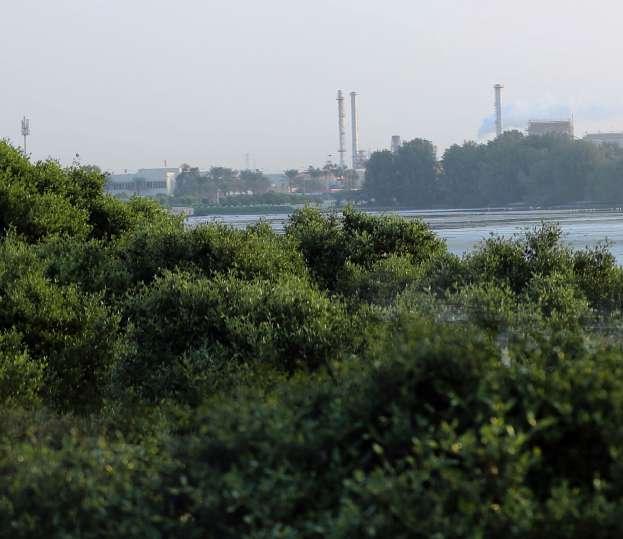
Globally, it is regarded that an energy efficient Plant will emit fewer greenhouse gases as compared to the one which is not so energy efficient.
Since 1985, we have reduced our total CO2 emissions by 58%. This has been achieved through reliable operations and several energy-saving projects, starting with the de-bottleneck project in 1989 followed by the setup of our urea plant in 1998 and then the commissioning of carbon dioxide recovery (CDR) unit in 2009. The CDR unit recovers 450 tonnes of CO2 per day from the methanol reformer stack emissions and converts it into more methanol and urea. On an annual basis around 0.12 million tonnes of CO2 emissions are reduced. Since 2009 around 1.4 million tonnes of CO2 emissions have been reduced through our CDR unit.
2021 2020 2019 2018 Energy metric tons of CO2 equivalent Boilers and Gas turbine 526098 517759 504369 477801 Transport 597 548 756 838 Fugitive Emissions (Flare) 8630 8684 8594 7908 Total Energy 535325 526991 513720 496547 Industrial Processes and Product Use (IPPU) Ammonia 271240 267440 272821 259077 Methanol 252231 248245 240969 253484 Total IPPU 523471 515685 513790 512561 Waste Waste water treatment 328 353 25.20 23.35 Refrigerants HCFC 296 586 271 394 HFC 440 1006 633 852 Total Refrigerants 736 1592 904 1246 Total Scope 1 1059860 1044621 1028439 1000377
Direct (Scope 1) GHG Emissions GRI 305-1
GPIC Sustainability Report 20202021 104
Energy Indirect (Scope 2) GHG Emissions GRI 305-2
Indirect GHG emissions are the consequence of GPIC’s
consumption of energy but are emitted from sources controlled by another company. For example the supplier of purchased power.
Other Indirect (Scope 3) GHG Emissions GRI 305-3
We have not yet started estimating the scope 3 emissions and will be considering for our next report
GHG Emissions intensity GRI 305-4
Reduction of GHG Emissions GRI 305-5
We have reduced the Company’s absolute GHG emissions by more than 50 percent since 1985. The energy savings resulting from increased efficiency from 2007 through 2021 as reported in GRI 302-4, can be converted to equivalent GHG emissions avoided. The activities described in GRI 302-4, and implementing new processes that emit less green house gases compared to traditional routes, will be important to driving reductions in the future.
GPIC was actively involved in pre and post COP 21 consultations at National and International levels. We have contributed towards Bahrain’s Intended Nationally Determined Contribution (INDC)and are currently engaged at the National level and the industry level in exploring potential projects for carbon capture. We are also providing our GHG inventory reports since 2016 based on IPCC version 2006. GPIC’s team participated in the recent COP 26 proceedings in Glasgow.
In addition to this we are also involved in discussions regarding a renewable energy action plan and a national energy efficiency action plan, an initiative spearheaded by Bahrain’s Ministry of Energy in collaboration with UNIDO.
Our Carbon Dioxide Recovery unit(CDR), which has been in operation since 2009, has so far extracted over 1.4 million tonnes of carbon dioxide, which has been used to enhance the production of urea and methanol. This translates to an average of 450 tons/day carbon dioxide being captured by the CDR unit.
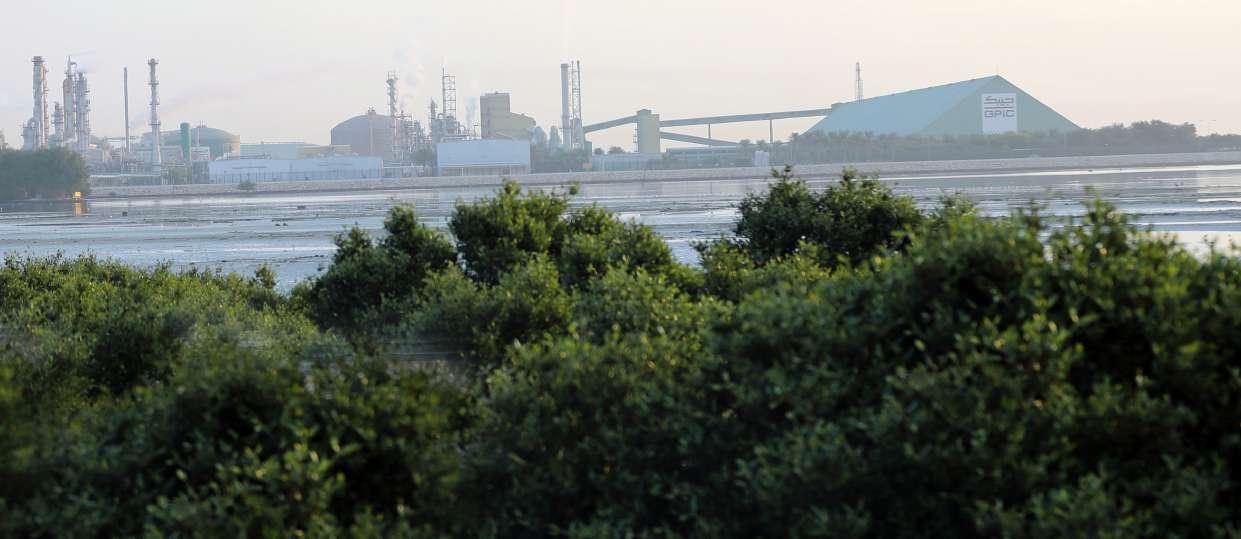
Emissions
of ozone-depleting substances (ODS) GRI 305-6
Ozone-depleting emissions include substances with an ozone depletion potential greater than zero that can deplete the stratospheric ozone layers. The emissions factors are based on the Montreal Protocol.
In compliance to Bahrain’s Environmental legislation and in accordance to the requirements of the Montreal Protocol GPIC is taking proactive steps to make our complex free from ozone depleting substances, such as class 2 HCFC’s. In this context we are undergoing a phased replacement of Air Conditioning units using R-22 with an environmentally friendly refrigerant. However with the latest developments post COP 21, the choice between the phase out and phase down of HCFC and HFCs is posing challenges to industry. In this context GPIC is following a precautionary approach keeping in view the OD potential and GWP potential and also the energy efficiency while making the right choice.
Imported Power 2021 2020 2019 2018 tons of C02 equivalent 81180 84660 98248 85566 2021 2020 2019 2018 tons of CO2 equivalent emitted / tons of saleable production 0.94 0.93 0.91 0.96
GPIC Sustainability Report 20202021 105
Environmental Sustainability

EMISSIONS
Nitrogen oxides (NOx, Sulphur oxides) SOx, and other significant air emissions GRI 103: Management Approach Disclosures (103-1, 103-2, 103-3)
Air pollutants can have adverse effects on climate, ecosystems, air quality, habitats, agriculture, and human and animal health. Reductions in regulated pollutants lead to improved health conditions for workers and neighbouring communities. GPIC is mindful of the fact that reductions, or performance beyond compliance, can enhance reputation of the company, enhance relations with the neighbouring communities and workers, and the ability to maintain or expand operations. More regional impacts from GPIC production plants include emission of acidifying gases (NOx and SOx) from flue gas stacks of four HP steam boilers, one LP boiler, two reformers, one gas turbine and particulate matter and ammonia from the urea granulator
stack. All such impacts are monitored closely through online continuous emission monitoring system (CEMS) and also through laboratory sampling to ensure that allowable levels are not exceeded. GPIC was the first industry in Bahrain to have a installed a mobile ambient air quality monitoring station on voluntary basis. We are in the process of replacing the mobile air quality monitoring unit with a new one, currently engineering and manufacturing is going on with a target to commission in Q1 2022. Over the years GPIC has taken several steps to further reduce emissions beyond compliance, examples include, operational improvements and investments in clean technologies such as the ultra- low NOx burners in the new HP steam boiler and the CDR boiler.
The SOx emissions from the flue gas stacks is dictated by the content of H2S in supply natural gas as fuel. During 2020-2021 the content of H2S in supply natural gas has been higher, resulting in increased SOx levels however still within the contractual and legislative limits.
2021 2020 2019 2018 2017 2016 Component Unit Quantity Quantity Quantity Quantity Quantity Quantity Ozone Depletors tonnes CFC -11 equivalent 0.0065 0.0081 0.007 0.010 0.024 0.015 Ozone Depletors as CFC-11 equivalent GRI 305-6 NOx, SOx and other significant emissions GRI 305-7
2021 2020 2019 2018 2017 2016 Component Source Unit Quantity Quantity Quantity Quantity Quantity Quantity SOX HP steam boilers, gas turbine, reformer stacks Metric tonnes 4,450 4,043 4,384 3,787 4,101 3,764 NOX HP steam boilers, gas turbine, reformer stacks Metric tonnes 1,080 1,051 1,053 1,012 893.3 958.4 VOC Urea Granulation stack Metric tonnes 12 16 17 18 22 48 PM10 Urea Granulation stack Metric tonnes 89,264 93,579 91,746 93,294 99,660 111,712 NH3 Urea Granulation stack Metric tonnes 80,964 97,981 61,145 60,575 69,730 80,307
GPIC Sustainability Report 20202021 106
The project to replace conventional lights with LEDs started in 2013 and so far we have replaced 7666 lights resulting in an annual energy saving of 1697 MWh and a CO2 emission reduction of 847 tons

GPIC Sustainability Report 20202021 107
Environmental Sustainability
EFFLUENTS
GRI 103: Management Approach Disclosures
(103-1, 103-2, 103-3)
Our main effluent to the marine environment is the sea water discharge from the process units. All other effluents after their primary treatment and quality checks also intermix with the main sea water effluent before being discharged into the marine environment. The main sea water effluent is closely
Water discharge GRI 303-4
Note:
monitored through regular laboratory analysis and periodically( on quarterly basis) monitored by governmental environmental inspectors for compliance.
We optimize our total water requirements and associated effluents keeping in view our process requirements related to load and climatic conditions. For example our sea water requirements increase by approximately 33% during summers.

• Sea water (SW) quantity includes 1) Return SW cooling 2) desalination unit reject 3) desalination unit vacuum system sea water outlet 4) SW basins sand wash pumps dis charge 5) Neutralised waste water from plants.
• The quality of water discharged was in accordance to the permissible limits as per Bahrain Environmental Standards stipulated in Ministerial order 3 of 2021 and there were no cases of non-compliance during the reporting period 2020-2021. However the thermal dispersion of the sea water has been impacted by the reclamation around the GPIC sea water outfall as part of new development around that area, resulting in occasional increase in the SW outlet differential temperature beyond the threshold of +/- 3 deg C within 100 meters of the mixing zone.
Total number and volume of significant spills
Our operations can result in products or other hazardous materials released to the atmosphere through accidental spills. Our utmost responsibility is in managing safe operations and product handling; therefore, we aim to prevent accidental spills. During 2020-2021 we did not experience any reportable environmental incidents involving significant spills.
Water bodies affected by water discharges and/ or runnoff
Our biggest environmental challenge is the location of our facilities, which is surrounded by sea, neighbouring facilities and the residential communities.

The discharges from our complex to the marine environment are controlled and regulated, complying to the limits set by the Supreme council for Environment.
During 2020-2021 we did not have any incident related to noncomplying water discharges.
2021 2020 2019 2018 2017 2016 Component Unit Quantity Quantity Quantity Quantity Quantity Quantity Sea water Millions of M3 343.9 337.8 338.7 328.3 352.6 353.9
GPIC Sustainability Report 20202021 108
WASTE
GRI 103: Management Approach Disclosures

(103-1, 103-2, 103-3) Management Approach
Responsible management of hazardous and non-hazardous waste is one of the key focus areas within our environmental strategy. Our strategy is defined by a Waste Minimization Hierarchy, which fundamentally includes waste reduction at source (most preferred) to proper disposal (least preferred). monitored through regular laboratory analysis and periodically (on quarterly basis) monitored by governmental environmental inspectors for compliance.
We have taken a number of steps over the years in enhancing recycling of paper, plastic and metals and have also introduced Cardboard Recycling in April 2015. An increase in the recycling target (10% increase over the 2014 baseline) was introduced in 2015 and was achieved successfully. The target has been increased incrementally to 30% and was also achieved in 2019. However, the recycling targets were not achieved in 2020-2021 as less recycle waste was generated due to most of the employees were working from home and the number of contractors was also decreased to bare minimum.
Catalysts are one of the main raw materials in our industry and we recycle spent catalysts (hazardous) by selling them to certified overseas recycling agencies. In 2019 we exported 385 tons of catalyst to overseas recycling agencies and in 2020 we exported 174 tons of spent catalyst.
We are fervently pursuing our ultimate goal of minimal waste to a landfill site and have succeeded in reducing our hazardous waste to the landfill to almost zero. This has been achieved by utilizing incineration facilities. However, we still generate a significant amount of non-hazardous waste that goes to the landfill site locally. We have sent 140 tonnes of hazardous solid waste in 2018 to the government monitored landfill site at a total fee of US$15,000. However in 2020 we sent zero hazardous waste to landfill and in 2021 we sent 5 tons of hazardous waste to the landfill.
One of our latest initiatives to manage the hazardous liquid waste generated within our facility is, the construction and commissioning of a 1000 M3 double HDPE lined evaporation pond in 2014. The pond was effectively used during the turnarounds in 2015 and 2018 and will be again used during turnaround 2022.
Some of our other initiatives include:
• Reducing our hazardous waste (mainly catalysts) by operating the plants in an efficient way with minimum unplanned outages and thereby increasing the life of the catalysts.
• Reusing a number of items such as the catalyst drums from new catalysts. These drums are used to store spent catalyst.
• Some of the empty chemical drums are cleaned and reused to store spent resins prior to sending them to the landfill.
• Wood waste is reused to make wooden boxes for storing maintenance tools and also for storing rotary equipment such as compressor rotors before sending them to overseas OEM workshops
GPIC Sustainability Report 20202021 109
Environmental Sustainability
Waste generated GRI 306-3
Notes: In addition to the below notes, following note to be added The medical waste in 2021 was more due to COVID-19 related testing waste.
Notes
Density for gasoline estimated 0.77kg/l
Density of used oil from MSDS 0.87kg/l
Urea Scrap 1 load= 5 tons and 1 skip is 7m3 (2018= 65 ton, 2019= 55 ton)
Non Hazardous waste 2019 = 9350 m3 general waste, 77 m3 urea scrap
Non Hazardous waste 2018 = 10216 m3 general waste, 105 m3 urea scrap,
2021 2020 2019 2018 2017 Component Unit Type Quantity Quantity Quantity Quantity Quantity The total amount of waste (hazardous & non-hazardous) in tonnes by type for composting tonnes nil nil nil nil nil The total amount of waste (hazardous & non-hazardous) in tonnes by type for reuse tonnes Not quantified Not quantified Not quantified Not quantified Not quantified The total amount of waste (hazardous & non-hazardous) in tonnes by type for recycling tonnes Hazardous Waste Spent Catalyst to overseas recycling agencies. nil 174 385 nil nil Gas condensate to Tatweer Petroleum 209 211 147 381 234 Waste oil to recycling agencies 30 30 69 182.5 28 Non-Hazardous Waste Metal Scrap 0 156 0 86 0 Plastic & Aluminum cans 0.67 0.70 1.2 1.9 1.76 Paper & card board 8.70 8.16 16.3 19.5 13.32 The total amount of waste (hazardous & non-hazardous) in tonnes by type for landfill tonnes Hazardous waste (spent catalyst & Resins etc.) 5.09 nil nil 140 116.2 M3 NonHazardous General Waste 9350 9350 9350 10216 9068 The total amount of waste (hazardous & non-hazardous) in tonnes by type for Incineration tonnes Industrial hazardous and nonhazardous Waste 158.3 5.25 nil 2 nil Medical Waste 1.145 0.052 0.045 0.077 0.06
GPIC Sustainability Report 20202021 110
GPIC Recycling Statistics

Year Recycled Waste (Kg) CO2 emission reduction (Kg) Landfill Space saved (m3) 2014 11633 31386 15 2015 19083 38190 18.3 2016 13588 24165 17.9 2017 15081 25224 19.3 2018 21472 36406 27.6 2019 17440 28135 22.4 2020 8864 14439 11.4 2021 9371 14326 12.1 Total 116532 212271 144 Recycled waste includes paper, cardboard, plastic and aluminum cans Recycling 2020 Recycling 2021 830 511 193 7330 Paper Plastic Aluminium Cans Cardboard 1365 599 72 7335 Paper Plastic Aluminium Cans Cardboard GPIC Sustainability Report 20202021 111
Transport
of Hazardous waste
Six type of hazardous waste are transported from GPIC. Five are within Bahrain and the sixth one is exported outside Bahrain. All the hazardous waste transportation is governed by Bahrain’s MO 3 of 2006.
Type 1- Hazardous solid waste to Hafira Landfill in Bahrain (Asbestos contaminated waste)
Type 2- Hazardous solid & Liquid waste to waste incinerator in Bahrain( Resins, activated carbon, oily rags, waste paints, chemicals etc)
Type 3- Spent tube lights/ mercury lamps for crushing/ disposal to waste management companies in Bahrain.
Type 4- Medical waste generated at GPIC Medical Centre is sent to certified incinerator for medical waste in Bahrain
Type 5- Natural Gas condensate is recycled back to Tatweer Petroleum in Bahrain
Type 6- Spent catalysts from process plants is exported to overseas recycling agencies.
ENVIRONMENTAL COMPLIANCE
GRI 103: Management Approach Disclosures (103-1, 103-2, 103-3)
Proper compliance with legislation and regulations is a precondition for operating a sustainable and socially responsible business. Organizations are held accountable for their‘ compliance behaviour’ and non-compliance carries heavy risks.
At GPIC compliance with all relevant laws and regulations is an essential element in our realisation of our vision and, as such, we endeavour to integrate such compliance throughout all of our business activities. We see this commitment as fundamental to any responsible company operating in today’s world, thus we have made it an integral part of our Corporate Governance and policies.
Non- compliance with environmental laws and regulations
GRI 307-1
GPIC was fully compliant to all environmental laws and regulations during the reporting period 2020-2021 and hence did not pay any fines or experience any non-monetary sanctions.
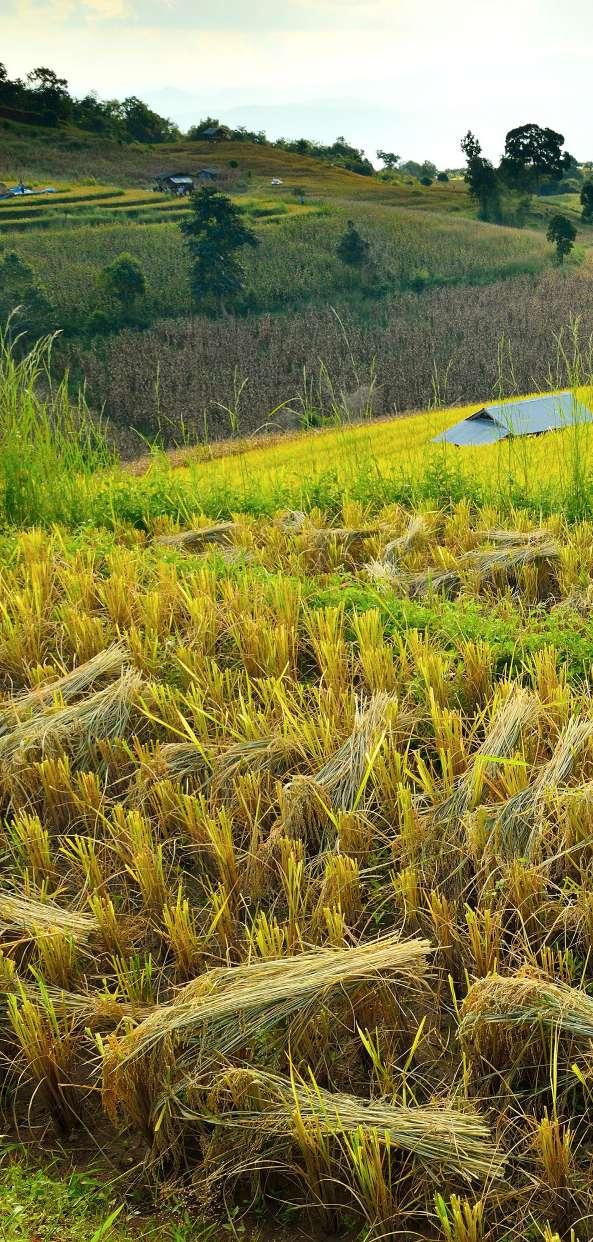
Total Kg CO2e Total Recycled Waste (Kg) 2021 2020 2019 2018 2017 2016 0 10000 20000 30000 40000 50000 24165 15081 25223.6 21472 36406.3 17440 8864 9371 28361 13588 Recycled Waste & GHG Emissions Environmental Sustainability 14326 14439 GPIC Sustainability Report 20202021 112
SUPPLIER ENVIRONMENTAL ASSESSMENT
GRI 103: Management Approach Disclosures
(103-1, 103-2, 103-3)
Locally based suppliers are defined by the Company as ‘Suppliers within Bahrain’. Wherever possible we prefer to procure from local suppliers. We always promote local suppliers as a priority, and nearly 40% of our approved suppliers include local suppliers.
The following factors are considered in selecting suppliers.
- Suppliers’ ability to meet the requirements.
- Principal suppliers or original manufacturers.
- Suppliers’ previous history record of performance in similar scope of supply.
- Suppliers who have service facilities in Bahrain.
- Suppliers with Bahrainisation level of manpower.
- Safety. Health & Environment system certification.
Note: As GPIC has transited from ISO 14001: 2004 to ISO 14001:2015 hence we have included life cycle perspective in the scope of supplier environmental assessment
New suppliers that were screened using environmental criteria GRI 308-1
Number of new suppliers screened through Safety, Health and Environment (SHE) assessment criteria in 2021 - 19 (60%)
Negative environmental impacts in the supply chain and actions taken GRI 308-2
By focusing on safe and reliable operations with high onstream factor and robust mechanical integrity program, we did not experience any event impacting adversely our environment. We also did not receive any complaints from neighbouring communities regarding any negative impacts of our operations. Moreover there were no reported cases of negative environmental impacts in the supply chain and hence no actions were taken.

GPIC Sustainability Report 20202021 113
GPIC We Change Lives
Great Place to Work at

GPIC Sustainability Report 20202021 114
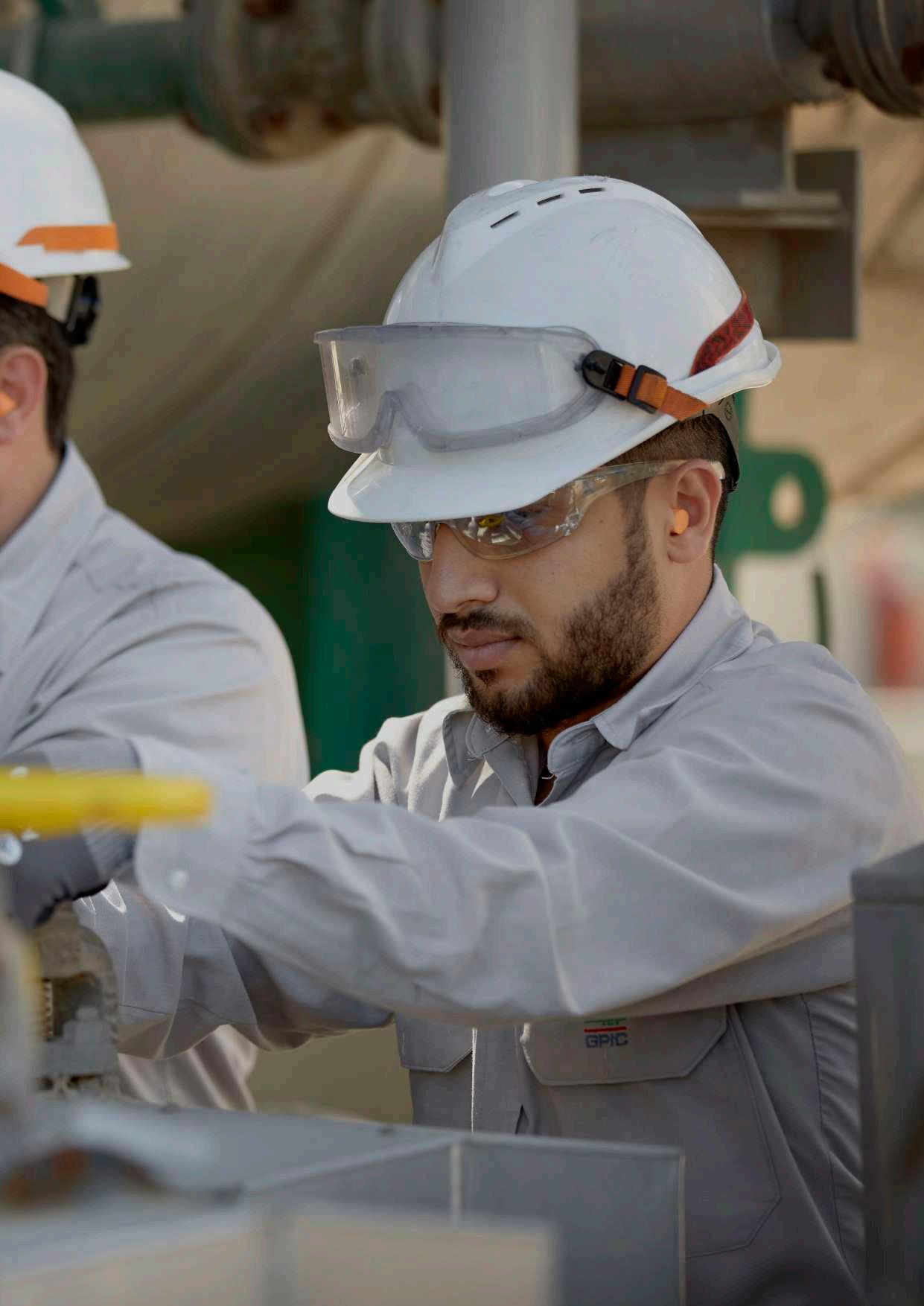
GPIC Sustainability Report 20202021 115
Our People
Our Performance Highlights
22 average training hours per employee in 2021
60% reduction in First Aid injuries in 2021 as compared to 2014
782 sick leave days in 2020 the lowest in 10 years

74% of the training courses in 2020-2021 were virtual due to COVID-19

12

Schools participated in GPIC and Ministry of Education schools Research program that was completed Virtually in 2020-2021 due to COVID-19
99% employee retention level in 2021

201
e-Learning users in 2020-2021 and a total of 3104 since 2010

7% female employees at GPIC

11,404 total training hours for GPIC employees in 2021

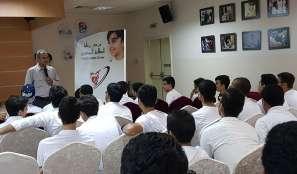
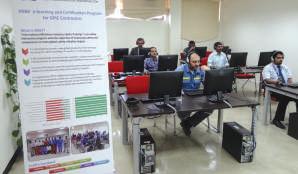

GPIC Sustainability Report 20202021 116
Training and development of Bahraini nationals is one of our main priorities, and our training policy aims to achieve progressive integration of Bahraini nationals into our work force through the implementation of a wellstructured and systematic career development scheme. This is our commitment towards empowering the indigenous community

GPIC Sustainability Report 20202021 117
Our People
GRI 103: Management Approach Disclosures (103-1, 103-2, 103-3)
We value our people as an important asset to our business, and we are committed to treating employees fairly, promoting diversity and inclusion, providing open & fair feedback, as well as ensuring compliance with Bahrain’s laws, regulations and the Company’s Code of Conduct. We also endeavor to educate our employees and ensure their health and safety.
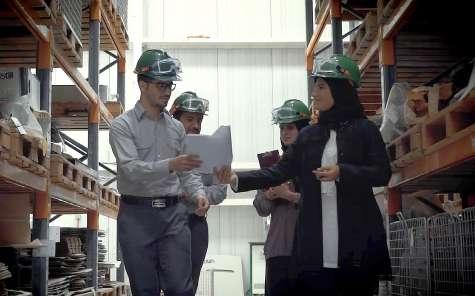
We have established a well-defined HR policy to manage priorities based on Bahrain’s Labour Law. Succession planning, development planning, development of local talent, leadership development, coaching, rewards and recognition of deserving talent is a critical part of our vision for people development.
Training and development of Bahraini nationals is one of our main priorities, and our training policy aims to achieve progressive integration of Bahraini nationals into our work force through the implementation of a structured and systematic career development scheme. This is our commitment towards empowering the indigenous community.
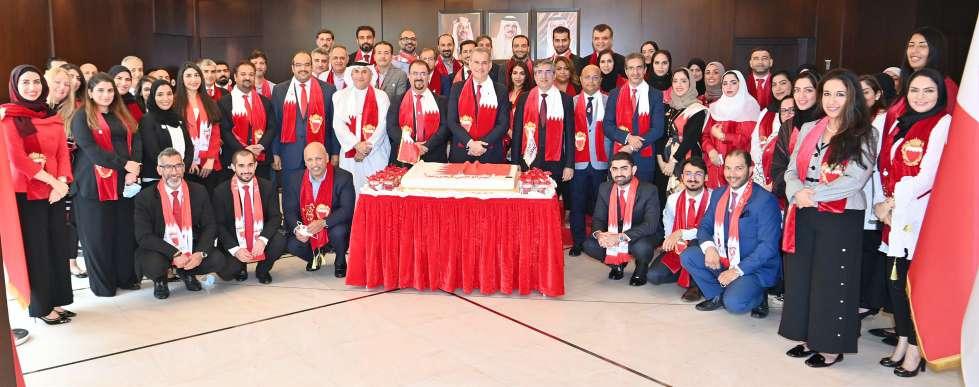
To make GPIC the employer of choice for both fresh graduates and experienced professionals, we have made significant investments in our multi-pronged strategy.
Attracting talented people and investing in tomorrow’s talent Recruiting and retaining manpower with relevant skills set has become a major challenge within the chemical industry. As a way forward, we have developed innovative approaches towards our recruitment and Learning & Development strategies which essentially helps us to maintain a highly engaged workforce.
In recent years, we demonstrated significant progress in our strategy to ensure continuity of our business. We made enhancements to develop and manage our people, which was essentially designed to help us transform GPIC into a great workplace for talented, committed and responsible people.
We believe that our ability to endure and persevere as an organization depends significantly on our capability to attract and retain the best talent within the industry. We have also included this in our Enterprise Risk Management and have taken necessary actions to demonstrate the highlights of ‘a career with GPIC’ to potential employees at all levels.We have also improved our outreach to potential employees through many initiatives.
During 2020-2021, amid the COVID-19 pandemic, the training and development of our work force, especially our graduate engineers continued virtually, through effective use of digital platforms.
GPIC Sustainability Report 20202021 118
GRI 103: Management Approach Disclosures (103-1, 103-2, 103-3)
We have an education sponsorship programme for our people who intend to pursue their undergraduate / post graduate degrees. Some of our other initiatives launched to support our people include:
• Facilitation of vocational/ industrial training for Bahraini students and our employees’ children.
• Sponsoring and supporting key educational programmes across Bahrain, along with a provision for scholarships for our employees children.
• Improvements to our recruitment systems by introducing psychometric analysis, which helps us to enhance the recruitment, screening and selection processes.
• Introduction of a standardized,internet based system for all job applications that will facilitate the process for prospective candidates in registering their applications.
In recruiting potential future leaders and staff, our primary focus is on empowering the indigenous communities, and we do prioritize in providing opportunities for Bahraini Nationals through our recruitment processes. The minimum age for being recruited in GPIC is 18 years – as per provisions under The Ministry of Labour.
GPIC is an equal opportunity employer and provides a fair opportunity to all applicants for vacancies subject to relevant rules and regulations. The Human Resources Department rules are applied in a non–discriminatory manner in all aspects of employment including recruitment, assignment, promotion, transfer, termination, salary and other benefits and even in nominations for training.
In 2011 we launched our bridging programme which enabled experienced employees to further develop their skills by pursuing their formal education until they reached a competency level commensurate with a supervisory level position. Now these employees have graduated and are progressing in their development programme as supervisors.
Developing our People
The personal and professional development of our people is a critical priority for us and we use a variety of methods to help our people enhance their capabilities. Each employee has a personal development plan.
Our people are provided with growth opportunities in alignment with the vision to enhance the Company’s culture. This is achieved through organizational development interventions such as training, the ability to participate in secondments, work related travel opportunities and engaging in volunteering activities within the community.
We have introduced a SAP-based Performance Management System (PMS) to further improve the training and
development of our work force. The system has been further enhanced by rolling out a SAP - Competency Based Training module (CBT).
We focus on employee development through periodic training, which is conducted on a competency based need analysis. Our people are also provided with opportunities to enhance their skills through self-learning platforms such as e-learning and the Toastmasters programme to improve their confidence and communication skills.
Adhering to our Principles
GPIC adheres to the strictest principles of merit in recruitment, compensation and promotion related decisions to ensure that all our people have been treated fairly and without bias.
We also recognize and reward our people for their superior efforts and performance through an awards programme and seek to retain the best of our talent through leadership opportunities.
Our Leadership Programme
We ensure focus on successive leadership development and have a comprehensive Succession Planning programme in place. We identify high potential performers within the organization based on their aspirations, engagement and ability, and support them in their development to enhance our internal talent pool. This is achieved through GPIC creating the right opportunities for employees to build their capabilities and take on additional roles and responsibilities throughout their career path.
This robust HR strategy has resulted in all our current Executive Management Team coming through the ranks through internal skills and merit based promotions. and our top leadership pool reflecting composition of our different local communities in Bahrain.
Leading research highlights the critical importance of ensuring effective emotional competency development for businesses and their ultimate sustainability – both in terms of effective business decisions and, in the ability of companies to create the perfect environment for people to drive progressive thinking and innovation.
This led to the implementation of our specialized internal strategy based on the Hay Emotional Competency Index 360 Feedback initiative implemented throughout the top levels of GPIC. The Leadership Development initiative was sponsored by Tamkeen. Through this process, individual leaders have developed their own unique Individual Development Plan (IDP) geared towards enhancing their EQ (emotional intelligence) and achieving GPIC’s top rated leadership skills matrix. Various initiatives such as Executive Coaching and specific training workshops – both national and international – have also been implemented to support this undertaking.
GPIC Sustainability Report 20202021 119
Our People
GRI 103: Management Approach Disclosures (103-1, 103-2, 103-3)
During recent years, 19 of our potential future leaders attended the GPIC leadership program, two attended the Darden University, USA program and 17 went to the UK to attend the program led by Leadership Trust. However in 20202021, in person training was discontinued temporarily due to COVID-19 pandemic.
Our
Young Leadership Programme
At GPIC we change lives
According to a number of research surveys conducted over the past few years, many employers have failed to fill in vacancies over the past couple of years due to the fact that many university graduates lack basic communication and leadership skills. Even government departments have experienced similar issues in finding suitable candidates as even graduates with “very good degrees” were unable to impress them during interviews, or have relevant experience in working with and collaborating in teams to achieve the necessary goals.
The main shortfalls were in areas such as interpersonal skills, where applicants were unable to demonstrate the right combination of “necessary” skills such as team-work, communication and attitudes combined with relevant academic achievements.
In alignment with GPIC’s key strategy on sustainable Corporate Social Responsibility (CSR), the company developed a Junior Leadership Program that tackled the competency gaps regarded as necessary soft skills for potential young entrants into the job market. This was also confirmed by the overview research conducted with undergraduates and graduates as necessary employability skills.
The Junior Leadership Framework and its related curriculum is strategically aligned to the identified Core competencies developed within GPIC.
Sustainable Coaching Culture
We have been working to develop a robust, formal and sustainable coaching culture at GPIC. The first stage of the process was achieved with 42 members of the GPIC team qualifying through a formal training workshop by one of the world’s leading international coaching experts - The Leadership Trust. Having completed the training workshop, we are now working towards the second stage of the process, i.e. creating real opportunities for our people practice they newly acquired coaching skills within the community.
Diversity and Inclusion
We work towards building a work environment which provides equal opportunities with a particular focus on empowering women and the indigenous communities within Bahrain. About 20% of our employees are expatriate workers from Asia, Africa, Europe and the Far East. 7% of our employees are female employees. Our Ladies Working Committee is actively involved in promoting the role of women in the company and society.
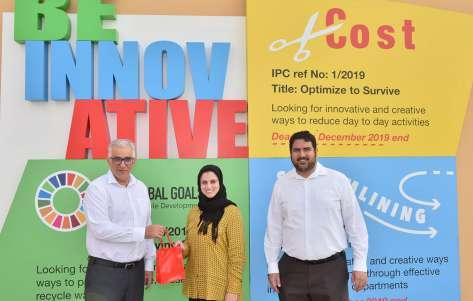
Ladies working committee charter includes:
• Carrying out activities in support of women inside and outside the company.
• Organizing special events for women.
• Coordinating with external professional women organizations.
For further details on women empowerment please refer to the section on ‘Women’s Empowerment Principles’
Safety of our Employees and the Host communities
GPIC considers the safety of its employees and the neighboring communities as one of our top most priority and responsibility. We ensure the highest standards of health and safety at our manufacturing facilities, monitoring carefully every potential risk to our operations and our employees so that we can provide a safe working environment for our people and the community at large. We invest significantly into projects related to the safety, environmental care and the reliability of our equipment and facilities.
We have a number of committees which oversee the implementation and maintenance of our policies related to occupational safety, Process Safety and Responsible Care.
These committees include:
• Safety, Health and Environment Council.
• Safety Committee.
• Process Safety Management Committee.
• Responsible Care Committee.
Health Care
Health Care at GPIC is a privilege that is not just limited to our people, it covers the entire GPIC family. We maintain a state of the art Health Centre within our facility which operates on a 24 hour basis for any emergency needs.
All our people undergo regular health checks. We also facilitate several awareness lectures on industrial hygiene and occupational health. Obesity and diabetes remains key areas of focus from a health perspective. The professional nutritionist at our Health care Centre is available to assist our people.
Many of the GPIC employees are certified first aiders. GPIC aligns and are a part of the various global awareness programmes related to health, safety and the environment. We have an active Health Committee whose prime objective is to oversee all health related issues and to raise awareness amongst GPIC employees in coordination with the Safety, Health and Environment Council.
The committee’s charter includes:
• Promoting and organizing Health and Responsible Care awareness activities.
• Managing the GPIC Anti-Smoking Program.
• Overseeing hygiene & food quality in main canteen and club canteen.
GPIC employee wins the best suggestion award on implementation of SDGs
GPIC Sustainability Report 20202021 120
During 2020-2021, GPIC ensured the well-being of its workers amid the COVID-19 pandemic, through strict adherence to SOPs and preventive measures. The company went beyond the mandatory requirements, following a precautionary approach, including regular PCR test campaigns,Weekly Rapid tests for all employees and daily for all contractors in addition to 100% screening through body temperature checks. 91% of our employees and contractors have been vaccinated with two doses and many have taken the booster dose also.( For a complete account of our COVID-19 related initiatives, please refer to COVID 19 section on page 28-33 of this report).
GRI 103: Management Approach Disclosures
(103-1, 103-2, 103-3)
• Conducting regular / emergency committee meetings to discuss the health status of the employees as well as all issues pertaining to and affecting the health, hygiene and wellness of GPIC employees at the complex and at the GPIC Club premise.
Innovation and Creativity
GPIC believes that innovation and creativity are crucial to our business success. We provide lots of opportunities and platforms for our people to express their views, exchange ideas and unleash their talent. The Innovation and
Suggestions Committee and GPIC’s Industry 4.0 Committee are just a few examples.
GPIC labour Union
Our commitment towards labour rights is ingrained across the organization and are agreed upon between the Executive Management and the Labour Union at the beginning of each year.
GPIC is one of the first companies in Bahrain to facilitate a forum to encourage our people to voice their opinions in the form of a labour union. Recently the first female member of the labour union was elected, highlighting women empowerment. The management and the labour union share a strong relationship and the two groups are partners in working committees such as:
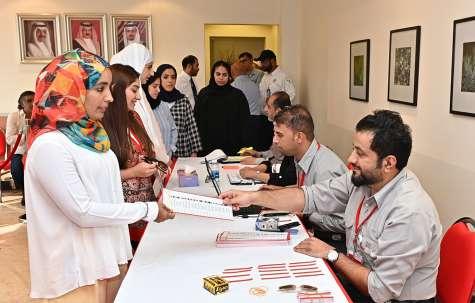
Management Labour Union High Council, Management Union Committee, SHE Council, Safety Committee, Health Committee, Environment Activities Committee, Savings Committee, Social Committee, Training, Development and Education Sponsorship Coordination Committee, Housing Loan Committee and Special Needs Cases Committee, etc.
This arrangement ensures that the labour union representatives are involved in all key decision-making processes
Committee (SAC )
Loan Committee (HLC)
Union Committee (MUC)
Farm & Bird Sanctuary Committee (FFABSC)
Children’s Education & Sponsorship Committee (ECSC)
Inspection Committee (CIC)
LABOUR UNION (LU) REPRESENTATION IN GPIC COUNCILS & COMMITTEES FOR 2020 AND BEYOND TITLE MEMBERS Safety, Health & Environment Council LU Chairman Safety Committee (SC) LU Representative Health Committee (HC) LU Representative Environment Committee (EC) LU Representative Management
LU Chairman LU Deputy Chairman LU Representatives Social
Deputy Chairman LU Representative Housing
LU Chairman LU Representative Saving
LU Deputy Chairman LU Representative Management
LU Chairman LU Deputy Chairman LU Representatives
LU Deputy Chairman
LU Chairman LU Deputy Chairman LU Representative Canteen
LU Representative GPIC
LU Deputy Chairman LU Representatives
& Union High Council (MUHC)
Activities
Scheme Committee (SSC)
Fish
Employees
Club Committee (GCC)
GPIC Sustainability Report 20202021 121
GPIC Labour Union elections
Our People

GRI 103: Management Approach Disclosures (103-1, 103-2, 103-3)
Recognizing and rewarding employees
At GPIC we have a wide range of awards at every level of the Company, to ensure that our people are duly recognized and rewarded for their extraordinary efforts and work that goes beyond the call of duty. This includes performancebased awards across departments and divisions, as well as acknowledgement of best safety practices.
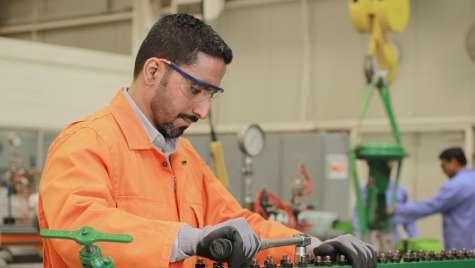
We also have an incentivized scheme to reward our people during an annual awards ceremony. Some of the awards recognizes sustained performance, outstanding performance, Best Suggestion of the Year, Environment Personality of the Year, Safety Personality of the Year, etc.
Employee Benefit Scheme
GPIC ensures that our people’s compensation and benefit plans are in line with our overall strategy. We have also introduced a new voluntary early retirement policy for our
Bahraini employees, to improve employee attainability of benefits whilst reinforcing the company’s financial security and business continuity.
Other benefits include a savings scheme, health insurance covering all our people and their families, loans, indemnity, etc.
OUR HUMAN RESOURCES PERFORMANCE 2020-2021
GPIC achieved most of its HR related objectives. Our employee retention was 99% and our Bahrainisation levels are improving as compared to 2017. The previous lower trends were due to the early retirement of Bahraini employees and not being able to find suitable candidates.
Due to COVID-19 pandemic and restrictions on in-person training, we swiftly moved to virtual training in 2020-2021.
BAHRAINISATION LEVELS
Our Bahrainisation levels are improving as compared to 2017. The previous lower trends were due to the early retirement of Bahraini employees and not being able to find suitable candidates.
Bahrainisation Levels 2016 2017 Actual Target 90% 90% 86% 80% 80% 77% 75% 80% 85% 90% 70% 95% 78% 85% 85% 81% 86% 82% 2018 2019 2020 2021 GPIC Sustainability Report 20202021 122
In 2020, the actual training hours were lower than the budgeted training hours due to the sudden outbreak of
COVID-19 pandemic. However we swiftly moved to virtual training facilitated by digital platforms.

Total
training hours
Total Training Hours Employee Retention 2016 2016 2017 2017 2018 2018 2019 2019 2020 2020 2021 2021 Actual Actual Target Target 25000 98% 98% 98% 98% 98% 98% 98% 98% 20000 20230 5000 93% 10000 94% 15000 95% 20000 96% 25000 97% 98% 30000 99% 0 92% 35000 100% 23210 98.6% 15000 15000 15000 10000 29721 24798 6895 11404 99.2% 99% 99% GPIC Sustainability Report 20202021 123
Our People


Number of E-learning users at GPIC Total Training Events 2014 2015 284 74 127 299 323 534 398 444 100 200 300 400 500 0 600 2016 2017 2018 2019 2020 2021 2014 2015 251 296 308 279 321 168 216 416 50 100 200 150 300 250 350 400 0 450 2016 2017 2018 2019 2020 2021 GPIC Sustainability Report 20202021 124
Our challenges in the Human Resources Business area Recruitment and retention of the best talent available remains as our biggest challenge for sustaining and persevering as an organization. To this end, as a company, we continue to introduce best practices, including highly competitive benefit plans, development and growth opportunities, to reassert our position as an employer of choice.
While the early retirement of a number of Bahraini employees presented a challenge to the company, it also provided an opportunity to induct young employees into our workforce.
The second challenge, which is also common within our industry, is ‘complacence’. We have launched several programmes which will assist in combating complacency. These programmes include coaching, mentoring, behavioral based safety and many more.

The third challenge we face is, diversity. Even though we are on the right track with regard to women’s employment and empowerment, we understand that we still have to go a long way to go in terms of increasing the number of women within our organization.
Our fourth challenge, which is also one of our focus areas is to build our people capability and improve employee productivity. Our current challenge is related to COVID-19 pandemic and the uncertainty it poses. Maintaining the Safety, Health and well- being and employability of our greatest asset “ Our Employees” during the on going COVID-19 crisis.
GPIC Sustainability Report 20202021 125
Labour Performance Indicators
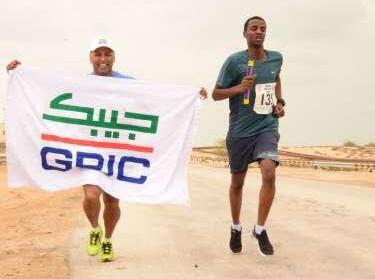
Being a committed member of UN Global Compact and the Women’s Empowerment Principles, GPIC has allocated special parking lots for special needs and pregnant ladies

RETIRED EMPLOYEES DURING 2020 / 2021 JOB FAMILY 2020 (AS OF 31/12/2020) 2021 (AS OF 31/12/2021) MALE FEMALE TOTAL MALE FEMALE TOTAL ADMINISTRATIVE EMPLOYEES (MANAGERS & SUPERINTENDENTS EXCLUDED) NUMBERS 0 2 2 2 0 2 PERCENTAGE 0.000% 40.00% 40.00% 10.526% 0.000% 10.526% TECHNICAL EMPLOYEES (MANAGERS, SUPERINDENDENTS, SENIOR SECRETARIES & SECRETARIES EXCLUDED) NUMBERS 2 0 2 14 1 15 PERCENTAGE 40.00% 0.000% 40.000% 73.68% 5.26% 78.947% SUPERINDENDENTS NUMBERS 0 1 1 1 0 1 PERCENTAGE 0.000% 20.00% 20.000% 5.26% 0.000% 5.263% MANAGERS NUMBERS 0 0 0 1 0 1 PERCENTAGE 0.000% 0.000% 0.000% 5.26% 0.000% 5.263% TOTAL COUNT NO. NUMBERS 2 3 5 0 0 19 PERCENTAGE 40.00% 60.00% 100.00% 0.000% 0.000% 100% ASPECT: EMPLOYMENT New Employee Hires and Employee turnover GRI 401-1
GPIC Sustainability Report 20202021 126
New Employee Hires
28 Bahraini employees were recruited in 2020 and 17 in 2021
Benefits provided to full-time employees that are not provided to temporary or part time employees GRI 401-2 GPIC makes a wide variety of benefits available to all eligible regular full-time employees.
For detailed outlook on the benefits plan please refer to GRI 201-3
Parental leave GRI 401-3
Maternity Leave
A female employee at GPIC is entitled to maternity leave on full pay for 60 days. Such leave shall include both pre and post natal.
Child Care Hours
A female worker shall be entitled to periods of care for her newborn after her maternity leave. The period of care is one hour per day till the child is six months of age and half an hour per day subsequently till the child completes one year of age. A female employee shall have the right to combine these two periods and two additional periods shall be calculated as a part of the working hours without resulting in any reduction of wage.
LABOR/MANAGEMENT RELATIONS
Minimum notice period regarding operational changes
GRI 402-1
GPIC has a proven history in recognizing and respecting all prevailing labour and employment laws in our country of operation. We maintain strong relationships with our labour union.
We strive to create mutually beneficial agreements for both our people and our business. Safety concerns are always non-negotiable as GPIC maintains a strong safety culture and has one of the best safety records in the industry.
While there is no globally established minimum notice period for operation changes, stipulations regarding what would happen in the event of operation changes are always agreed upon ahead of time by all parties, and included as a clause in the labor contract. Stipulations regarding action taken in the event of operation changes may vary by region.
Communications from the top management to the employees happen in a timely and effective manner. Committee meetings regularly take place between labour union which represents employees and the GPIC Management to discuss a wide range of topics from health and safety concerns to administrative issues. All employees are provided with regular forums to voice their concerns

RETIRED EMPLOYEES DURING 2020 / 2021 DIVERSITY INDICATORS 2020 ADMINISTRATIVE TECHNICAL SUPERINDENDENTS MANAGERS TOTAL BAHRAINI EMPLOYEES 2 1 1 0 4 NON-BAHRAINI 0 1 0 0 1 TOTAL 2 2 1 0 5 30 YEARS OLD 0 0 0 0 0 BETWEEN 31-50 YEARS 2 1 1 0 4 51 YEARS OLD 0 1 0 0 1 TOTAL 2 2 1 0 5 GRI 401-1 DIVERSITY INDICATORS 2021 ADMINISTRATIVE TECHNICAL SUPERINDENDENTS MANAGERS TOTAL BAHRAINI EMPLOYEES 2 12 0 1 15 NON-BAHRAINI 0 3 1 0 4 TOTAL 2 15 1 1 19 30 YEARS OLD 0 0 0 0 0 BETWEEN 31-50 YEARS 1 11 0 0 12 51 YEARS OLD 1 4 1 1 7 TOTAL 2 15 1 1 19
GPIC Sustainability Report 20202021 127
Labour Performance Indicators

Workers covered by an occupational health and safety management system GRI 403-8

“Zero Harm” continues to be our vision. As we move forward, our resolve to achieve our goals must intensify. “Zero Harm” is not restricted to rates, statistics, numbers or metrics, although these are important ways to measure our progress. It is about our people, and keeping our people, facilities, environment and communities safe.
GPIC also has a well-developed health strategy focused on prevention, quality, health system management and advocacy.
Employees are provided with the tools and information they need to take action to invest in their personal health and the health of their families. The company also works to establish a “culture of health” through additional policies and practices.
By the end of December 2021, we achieved more than 35 million accident free working hours for our workforce and contractors.
Our work force is 100% represented through the members of the labour union in key committees related to safety and health. Even in the Safety, Health and Environment Council, which is the top tier council, the labour union chairman represents the workforce.
Work related injuries GRI 403-9
The overall Injury and Illness rate is a highly visible metric of the Company’s Sustainability Goals. Dividing incidents by a defined cumulative number of hours worked by the employee population is a standard way of viewing the rate of injury and illness for a specific population. The progress made in reducing our rate of injury and illness since 2012 has prevented recordable incidents involving GPIC employees and contractors.
Refer to details on Safety and Health in the Economic impact section on page 86-89. OCCUPATIONAL SAFETY 2016 2017 2018 2019 2020 2021 Employee Fatalities # of Fatalities 0 0 0 0 0 0 Lost Time Injury Incident rate for Employees (# of days away from work cases X 200,000) / Employee man-hours worked 0 0 0 0 0 0 Recordable Cases Incidence Rate for Employees (# of Injuries X 200,000) / Employee man-hours worked 0 0.36 0 0 0.31 0.21 Contractor Employee Fatalities # of Fatalities 0 0 0 0 0 0 Lost Time Injury Incidence Rate for Contract Employees (# of Injuries X 200,000) / Contractor man-hours worked 0 0 0 0 0 0 Recordable Cases Incidence Rate for Contract Employees (# of Injuries X 200,000) / Contractor man-hours worked 0 0 0 0.206 0 0.20 First Aid Injuries Employees + Contractors 13 8 23* (11 injuries in TA 2018) 8 7 11
GPIC Sustainability Report 20202021 128
Work related ill health GRI 403-10
GPIC controls occupational health risks in our worker’s environment. Comprehensive workplace risk assessments are carried out to evaluate hazards in the manufacturing, office and field settings. Workers are provided detailed education and training along with specific procedures for safe operation. General health prevention programs to reduce overall health risks are provided. Risk control measures in the workplace are implemented and emergency planning is coordinated with external medical and public health experts. Detailed exposure controls are implemented as per global standards. All workers undergo baseline and periodic medical screening, testing, evaluation, and health counseling to identify and control health problems. General medical treatment is also available to all our employees.
As a part of the petrochemical and fertilizer manufacturing industry, our employees are exposed to high risk occupational hazards and are monitored and tracked through our health record systems. Such high risk groups include hearing conservation, confined space, and other potential exposures or other identified hazards. Their risks are minimized by providing them with the appropriate preventive measures.
In our system, health protection hinges upon:

• Recognizing Hazards
• Reducing Risks
• Screening for illness
• Confirming the effectiveness of our system
In addition, GPIC is committed to enhancing employees’ overall health to prevent/minimize injuries and illnesses at the workplace. GPIC offers medical benefits that cover a range of preventive, diagnostic and treatment services.
GPIC Health Services makes the following available in the area of Occupational Health:
• Employee Clinical treatment services
• Periodic employee health assessments
• Health promotion programs
• Employee assistance programs
GPIC Labour union members are part of the Company’s top tier committees such as the Safety, Health and Environment Council, Safety Committee, Health Committee and the Environment Committee. All safety and health related topics are discussed in detail regularly during the committee meetings. All employees and their families are provided with a comprehensive health insurance.
GPIC Sustainability Report 20202021 129
Labour Performance Indicators
Average hours of training per year per employee GRI 401-1 GPIC’s philosophy of continuous learning and development is supported by a robust curricula assigned to leaders and employees. Recognizing that effective leadership is a critical link to employee engagement, the Company’s leadership development solutions target employees transitioning to people leader roles. A smooth and successful transition is important for leadership effectiveness.
The Company offers structured learning courses for experienced leaders, enabling them to continue to develop their leadership skills.

GPIC encourages continuous learning – in classrooms, on assignment and through mentoring and networking, thereby enabling employees to sharpen their knowledge, skills and abilities.
For ongoing training, employees also use the online e-Learning system that helps them select and manage the curriculum that aligns with their core role responsibilities and personal development interests. Required training is assigned to employees in the e-Learning development tool.
In addition to e-Learning courses, GPIC employees complete thousands of hours of job specific training annually. GPIC’s training opportunities include both traditional classroom and hands-on training. Training and development varies by job role and responsibilities. On average, there were 16 hours of training per employee in 2020/2021. The total training hours are lower due to the on-going COVID-19 pandemic.
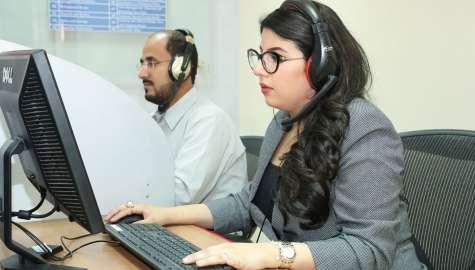
GRI 404-1 AVERAGE HOURS OF TRAINING PER YEAR PER EMPLOYEE CLASSIFICATION 2021 2020 2019 2018 Total training hours 11,404 6,895 29,721 20,666 Total training events 118 161 416 321 Total number of employees undergone training 301 out of 437 293 out of 444 412 out of 433 433 out of 452 Total training hours for management staff 1,532 883 4,432 2,832 Total number of staff who attended management courses 302 274 213 258 Total number of staff who attended non-management courses 566 510 394 366 Total training hours for non-management staff 9,872 6,012 25,289 17,834 Total management staff trained 39 29 41 35 Total non-management staff trained 219 235 371 398 Average hours of training per year per employee for management staff 39.3 22.6 108 70.8 Average hours of training per year per employee for non-management staff 37.7 22.8 68 43.3 Total training hours for females 754 568 3,165 2,976 Total training hours for males 10,650 6,327 26,556 17,690 Average hours of training per year per employee for female 19.8 16.7 93 83 Average hours of training per year per employee for male 24 13.9 66 43 Total participants in all training events 868 784 2,062 1,506
GPIC Sustainability Report 20202021 130
Programs for upgrading employee skills and transition assistance programs GRI 404-2
Our approach to training and development of our people is crafted in such a way that it not only develops their job specific technical skills but also to develop them to be a successful corporate citizen.
Our trainings enable our employees to develop:
• Supervisory skills
• Leadership skills
• SAP Competency based performance management and appraisal system
• Classroom training
• Coaching and Mentoring
• Other behavioral interventions
Some examples of trainings provided include:
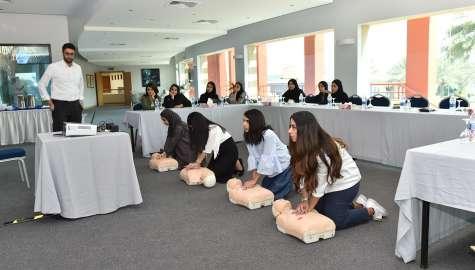
• E-Learning
• Toastmasters
• Facilitating higher education
Percentage of employees receiving regular performance and career development reviews GRI 404-3 Performance Management (PM) strives to maximize the connection between employee development and organizational performance. Both leaders and employees together play a key role in ensuring the effectiveness of Performance Management by establishing SMART goals, encouraging continuous development feedback and dialogue, and reviewing progress on an on-going basis throughout the year, both formally and informally. Performance Management aligns with GPIC’s overall employee development strategy by building skills that promote change, align behaviors with
corporate strategies and ethical standards, and provide employees with opportunities to improve their performance and effectiveness.
Our Performance Management cycle provides a structure to facilitate the alignment of expectations and goals, the integration of on-going coaching and feedback, and the summary of contributions – both the “What” (core job, goals, impact) and the “How” (behaviors and competencies).
The key elements are:
• Aligning Expectations & Establishing Goals

• Ongoing Coaching, Feedback, and Reviews
• Summarizing the Annual Contribution
• Mid- term and Annual Review
Setting clear, meaningful and challenging performance expectations along with providing regular coaching and feedback are critical leadership skills. Our leaders are encouraged to partner with their employees to identify their strengths as well as opportunities for development. This ongoing collaboration is one way we can engage our employees and drive GPIC’s success.
The Performance Management cycle concludes with a formal review of the annual performance. This discussion features feedback on achievements and areas for development from their performance during the year, which employees use to craft personal development goals for the coming year.
Eligible employees receive an Annual Performance Review and have a performance rating in the system.
Thank you for your leadership and commitment to eliminating preventable deaths in our lifetime. The work that you and the employees of GPIC do every day requires care and focus and we know that safety is always your first priority. Your efforts to go above and beyond by providing training in first aid and CPR are exemplary
GPIC Sustainability Report 20202021 131
NATIONAL SAFETY COUNCIL, USA
Diversity and Equal Opportunities
Diversity of Governance bodies and employees GRI 405-1
GPIC has made a commitment of support to the UN Women’s Empowerment Principles (WEPs), signed in 2014 by our President. The WEPs is a partnership initiative supporting the mission to promote gender equality and women’s empowerment globally. Signing these principles has complemented GPIC’s internal efforts around women’s
advancement. As a result of the WEPs, GPIC is reporting on a broad range of data related to women’s equality to create greater transparency around our efforts.
For details please refer to our section on Women’s Empowerment Principles.

JOB FAMILY 2020 (AS OF 31/12/2020) 2021 (AS OF 31/12/2021) MALE FEMALE TOTAL MALE FEMALE TOTAL ADMINISTRATIVE EMPLOYEES (MANAGERS & SUPERINTENDENTS EXCLUDED) NUMBERS 37 25 62 37 25 62 PERCENTAGE 8.333% 5.631% 13.964% 8.467% 5.721% 14.188% TECHNICAL EMPLOYEES (MANAGERS, SUPERINDENDENTS, SENIOR SECRETARIES & SECRETARIES EXCLUDED) NUMBERS 338 5 343 333 4 337 PERCENTAGE 76.13% 1.13% 77.25% 76.201% 0.915% 77.12% SUPERINDENDENTS NUMBERS 26 1 27 26 1 27 PERCENTAGE 5.86% 0.23% 6.08% 5.950% 0.229% 6.18% MANAGERS NUMBERS 11 1 12 10 1 11 PERCENTAGE 2.48% 0.23% 2.70% 2.288% 0.229% 2.52% TOTAL COUNT NO. NUMBERS 412 32 444 406 31 437 PERCENTAGE 92.79% 7.21% 100.00% 92.91% 7.09% 100.00% DIVERSITY INDICATORS 2020 ADMINISTRATIVE TECHNICAL SUPERINDENDENTS MANAGERS TOTAL BAHRAINI 54 274 23 12 363 NON-BAHRAINI 8 69 4 0 81 TOTAL 62 343 27 12 444 30 YEARS OLD 7 79 0 0 86 BETWEEN 31-50 YEARS 48 198 18 4 268 51 YEARS OLD 7 66 9 8 90 TOTAL 62 343 27 12 444
GPIC Sustainability Report 20202021 132
Ratio of basic salary and remuneration of women to men GRI 405-2
Distinction is based on talent and merit and not gender 1:1
SUPPLIER SOCIAL ASSESSMENT Management Approach
GPIC is an active member and participant in the chemical industry’s Responsible Care® initiative.
In the case of External Manufacturing, where GPIC equipment is manufactured at a third party site, there are regular audits to ensure adherence to quality and practices specified in the Fundamental EH&S Expectations for External Manufacturers. We ensure that all new suppliers selected are in line with acceptable labor practices. For many materials, particularly those designated as hazardous, GPIC provides written ‘Safe Handling’ Guides, and in some cases we also provide training sessions to ensure awareness to safety procedures.
Percentage of new suppliers that were screened using social criteria GRI 414-1
• Number of vendors registered with GPIC in 2021 : 29
• Out of 29 vendors, the number of local vendors is 21, i.e. 72 percent
• Number of service vendors screened through Safety, Health and Environment (SHE) assessment criteria (2019): 19 (65 percent)
• No rejection of any recommended vendor due to SHE aspects

• Total number of vendors in GPIC Approved supplier list (ASL): 1941, Local suppliers in the list: 769.
• Percentage of local vendors in the total list: 40
Negative Social impacts in the supply chain and actions taken GRI 414-2
There are no significant actual and potential negative impacts for labor practices in the supply chain that have been reported for the year 2020 and 2021.
DIVERSITY INDICATORS 2021 ADMINISTRATIVE TECHNICAL SUPERINDENDENTS MANAGERS TOTAL BAHRAINI EMPLOYEES 51 277 24 11 363 NON-BAHRAINI 11 60 3 0 74 TOTAL 62 337 27 11 437 30 YEARS OLD 5 76 0 0 81 BETWEEN 31-50 YEARS 51 200 18 4 273 51 YEARS OLD 6 61 9 7 83 TOTAL 62 337 27 11 437
GOVERNING BODY GOVERNING BODY GENDER MINORITY GROUP AGE GROUP MALE FEMALE MUSLIM NON-MUSLIM ‹30 35 - 50 ›50 BOARD OF DIRECTORS 100% - 100% - - 29% 71% GPIC Sustainability Report 20202021 133
Human Rights
GRI 103: Management Approach Disclosures
(103-1, 103-2, 103-3)
GPIC believes that respect for the dignity, rights and aspirations of all people is a cornerstone of business excellence.
“Man has the fundamental right to freedom, equality and adequate conditions of life, in an environment of a quality that permits a life of dignity and well-being, and he bears the solemn responsibility to protect and improve the environment for present and future generations.” 1972 Stockholm
Declaration principle 1
Leadership commitment
GPIC‘s former President, who has previously served as a board member of the “National Institution for Human Rights (NIHR) Board of Commissioners” and participated in policy making and consultations related to human rights at national level says that respecting the rights of all is an integral part of our Corporate governance policy, the Bahrain’s Labour law and the UN Global Compact principles and we aim to encourage protection of human rights through organization wide policies.
Human Rights and Environmental Protection in light of the SDGs
The adoption of the 17 Sustainable Development Goals (SDGs) represents an unprecedented moment in human history for global governance and the protection of human rights of (individuals) and our planet (the environment). Both humans and the environment are the center of the 2030 Sustainable Development Agenda.
“Climate change is one of the greatest threats to human rights of our generation, posing a serious risk to the fundamental rights to life, health, food and an adequate standard of living of individuals and communities across the world” UN
“Human beings are at the centre of concerns for sustainable development. They are entitled to a healthy and productive life in harmony with nature” Principle 1- Rio
Please refer to the section” Making the SDGs a Reality at GPIC” in the beginning of the report.
Human Rights of Employees
GPIC will ensure respect for the human rights of our employees as established in the ILO’s Declaration on Fundamental Principles and Rights at Work and the Bahrain Labour Law, including nondiscrimination, prohibition of child and enforced labour, freedom of association and the right to engage in collective bargaining, prohibition of harassment, providing equal opportunity to employees, and being fair and equitable.
GPIC’s goal is to achieve zero injuries and illness in the working environment as well as emphasizing the off-the-job safety of all employees. Strict compliance with all applicable SHE policies, standards and practices is maintained, for the benefit of the company’s human capital.
GPIC will provide a work environment that is pleasant, healthy and free from intimidation, hostility or other offensive behavior towards employees, contractors, vendors or customers. The working atmosphere will contribute to the achievement of economic and social development, while providing the opportunity for creativity and innovation.
GPIC’s policy is to honour and respect the right of all employees to practice their religious beliefs with dignity. Employees will obey all local laws and regulations. The company will maintain appropriate levels of awareness to protect both the company’s and employees’ interests by anticipating the legal requirements that may arise from new laws and regulations, new business endeavours or modifications of existing business arrangements. GPIC’s grievance handling system aims to ensure that any and all cases of grievances are filed.
We will provide equal employment opportunities to all applicants and employees. Recruitment for all employment vacancies will be based upon relevant qualifications, skills, experience and eligibility.
All decisions that directly affect an employee’s employment status will be fair and equitable, in terms of:
a) advancement
b) development and training
c) the disciplinary process
Our employees are encouraged to make suggestions or contribute ideas that help improve any aspect of the work process, including production. All such constructive ideas and suggestions will be valued, as part of motivation and innovation.
GPIC aims to ensure the confidentiality of all employee information; that personnel records, medical or any other records relating to employees are maintained accurately and securely.
We encourage all our employees to be good corporate citizens in that, at work, they will be in a suitable mental and physical condition in order to perform their duties in a safe and effective manner. The employees of the company are also encouraged as individuals to maintain good relationships with society, including participating effectively in professional societies, licensed charities and community centres in the Kingdom of Bahrain.
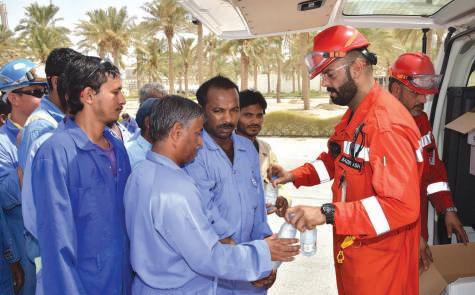
GPIC Sustainability Report 20202021 134
GRI 103: Management Approach Disclosures
(103-1, 103-2, 103-3)
Human Rights of the Youth
‘Accelerating youth empowerment for sustainable development’.
Our leadership believes that youth will be central in taking forward the universal, integrated and transformative sustainable development agenda forward and they are mindful of the fact that the overall success of the SDGs depends on youth engagement because young people are, Critical thinkers, change makers, Innovators, Communicators, Leaders.
To show commitment to youth empowerment and engagement, GPIC has formed a new Youth Committee in 2016, with a mandate to identify the needs and requirements of young GPIC employees and keep the management appraised of areas for development and make constructive decisions for the benefit of GPIC’s young employees. GPIC’s president has emphasized that “Our ability to shape the minds of young future leaders and give them the insight and opportunity to sustainably change the world in which we live, is a calling of the highest order” He further states that” Education has always been key to changing an uncertain future into a prosperous one. This truth also applies to the way we educate and pass on the knowledge when it comes to ensuring a sustainable environment for our future. Through inspiring our young future leaders, GPIC employees have awoken their ability to change what can be changed and inspired them to a future of amazing possibility.”
Human Rights of Suppliers and Contractors
Suppliers and Contractors will receive the same care in terms of prevention of injuries or illness as company employees. Contractors also enjoy a work environment that is as pleasant, healthy and free from intimidation, hostility or any other offensive behaviour. Our Suppliers and Contractors will be able to place their trust and confidence in GPIC’s ability to conduct its affairs in a transparent and ethical manner, pursuant to a standard of fundamental honesty and fair dealing.
Those who contract to work with or supply GPIC will benefit from any conflict of interest or even the chance of one being declared at the earliest possible stage. Contractors and Suppliers will also benefit from guidance in such matters from the GPIC HR Department.
Anyone who deals with GPIC may be assured that their business will be transacted without fear of bribery or corruption as well as freedom from coercion or undue influence.
Human Rights of Women
GPlC aims to remain as a role model in empowering women with in Bahrain’s industrial sector. We pursue our strategic priority to employ more women in various positions as allowed by the laws of Bahrain. We have also established an Equal Opportunities Committee, which is now elevated to a Council, to oversee practices of fairness between men and women and to ensure adherence to the human rights of women. GPIC continues in its commitment of support to the UN Women’s Empowerment Principles (WEPs), signed in 2014 by GPIC’s former President. The below message is from GPIC’s President Yasser Alabbasi to all the GPIC Women employees marking 1 December,2021 as Bahrain Women’s Day.
“Dear GPIC Ladies
Today, Wednesday 1 December 2021, is Bahrain Women’s Day, and this year’s theme is Bahraini Women in the National Development.
This year’s theme reflects the deep-rooted presence of Bahraini women in the nation’s development into the modern and internationally recognised Kingdom it is today. At the start of my first year as President I would like to take this opportunity to express how very much you are valued and how truly important all our wonderful women are to GPIC and the Kingdom we live in, as well as to every aspect of life, society, work and progress.
In marking Bahrain Women’s Day, I would like to take this opportunity, on behalf of the Executive Management, to express our sincere admiration to all our female colleagues for the amazing efforts put by you in the workplace. We appreciate everything that you have done over the past years. The endless hours that you have spent working here, and the professionalism that you have shown has motivated the entire workforce.
I wish all our GPIC ladies the best of success and prosperity. We value our ambitious team of women and all the sacrifices you have made in helping this company grow to where it is today, and appreciate that our women go above and beyond to help this company reach its full potential. At GPIC, we are very lucky to be surrounded by so many inspiring women.
Once again, thank you ladies, and have a great day.”
Human Rights of Children
GPIC will uphold the human rights of children by the deliberate and methodical support of children in education, innovation, environmental awareness, health, safety, road safety, responsible care and social responsibility.
GPIC will do its utmost to protect the human rights of children in that the company will never employ children to work for it and will also do its utmost to ensure that all other business with which we have dealings do the same.
Human Rights of Communities
GPIC will at all times respect the cultures, customs and values of the people in the communities in which we operate. The company will involve the community and protect its rights through open, transparent, and amicable partnership with NGOs, local charities, sports clubs, ministries, and parliamentary representatives.
The company will serve as a source of positive influence within the community by contributing, within the scope of our capabilities, to the promotion and fulfillment of community human rights through improving economic, educational, environmental and social conditions.
Further, GPIC will seek to have open dialogue with stakeholders and participate in community engagement activities.
GPIC will share with the community its performance indicators and concerns. We have made our integrated Quality, Health & Safety, and Environment Policy and the Responsible Care Policy available to the public by hosting it on our company’s website.
GPIC Sustainability Report 20202021 135
Human Rights
HUMAN RIGHTS ASSESSMENT
Significant investment agreements and contracts that include human rights clauses or that underwent human rights screening GRI 412-3
All our contracts and significant agreements require compliance with Bahrain Labour law and the human rights requirements Bahrain recognizes. Our contract supervisors are responsible for monitoring the performance of contractors, including their treatment of workers. This is particularly important in relation to our temporary work force, most of which is outsourced to contractors.
Employee training on human rights policies or procedures
GRI 412-2)
In 2018-2019 the Company has carried out specific training for its security personnel on UN Human Rights and etiquette. In addition to this recently a number of GPIC employees have undergone training on etiquette by National Institute of Human Rights (NIHR) and also on Bahrain labor law. In all 109 employees attended various training on aspects related to Human rights, labor rights and ethics. However in 20202021, due to COVID-19 related restrictions, there was no specific human rights training carried out.
In addition to this all employees are made aware of the Company’s Code of Conduct highlighting the significance of company’s core values. The copy of the same is provided to each employee and each employee signs the code of conduct.
NON-DISCRIMINATION
Incidents of discrimination and actions taken GRI 406-1
In 2020-2021 there were no cases of discrimination. The Company strictly follows non- discrimination policy.
FREEDOM OF ASSOCIATION AND COLLECTIVE BARGAINING
Operations and suppliers in which the right to exercise freedom of association and collective bargaining may be at riskk GRI 407-1
No operations are identified that put collective bargaining at risk. GPIC’s position on freedom of association is included in our Code of Business Conduct. Under this policy, employees are free to form collective bargaining agreements in all areas of operation. 86.9 percent of GPIC’s workforce was covered by formal collective bargaining agreements in 2020 and 87.3 percent in 2021. Non-Bahraini employees are also allowed to be part of the labour union.
CHILD LABOR
Operations and suppliers at significant risk for incidents of child labor GRI 408-1
No operation has risk of child labour. GPIC strictly complies with labour laws. The information of suppliers has not been included in this review. Moreover the Company respects the rights of all and is committed to the UN Global Compact
principles on human rights which includes principle number 5‘ Abolition of child labour’.
FORCED OR COMPULSORY LABOR
Operations and suppliers at significant risk for incidents of forced or compulsory labor GRI 409-1
No operation has risk of forced or compulsory labour. The Company strictly complies with the labour laws. The information of suppliers has not been included in this review. Moreover the Company respects the rights of all and is committed to the UN Global Compact principles on human rights.
SECURITY PRACTICES
Security personnel trained in human rights policies or procedures GRI 410-1
In 2018/2019 the Company has carried out specific training for its security personnel on UN Human Rights and etiquette and 11 of our employees attended.
HUMAN RIGHTS ASSESSMENT
Operations that have been subject to human rights reviews or impact assessments GRI 412-1
No incidents of grievances related to human rights were filed in 2020/2021
SUPPLIER SOCIAL ASSESSMENT
New suppliers that were screened using social criteria GRI 414-1
All our suppliers undergo a strict screening and our prequalification criteria covers all the aspects.
Number of vendors registered with GPIC in 2021 : 29
• Out of 29 vendors, the number of local vendors is 21, i.e. 72 percent
• Number of service vendors screened through Safety, Health and Environment (SHE) assessment criteria(2019): 19(65 percent)
• No rejection of any recommended vendor due to SHE aspects

• Total number of vendors in GPIC Approved supplier list (ASL): 1941, Local suppliers in the list: 769.
• Percentage of local vendors in the total list: 40
Negative social impacts in the supply chain and actions taken GRI 414-2
No negative social impacts in the supply chain were identified in 2020/2021. Our supply chain remained sustainable even during the COVID-19 pandemic.
GPIC Sustainability Report 20202021 136
Man has the fundamental right to freedom, equality and adequate conditions of life, in an environment of a quality that permits a life of dignity and wellbeing, and he bears the solemn responsibility to protect and improve the environment for present and future generations.
1972 STOCKHOLM DECLARATION PRINCIPLE 1

GPIC Sustainability Report 20202021 137
GRI 103: Management Approach Disclosures
(103-1, 103-2, 103-3)
At GPIC Corporate Social Responsibility (CSR) is all about how we manage our business processes to produce an overall positive impact on society. We feel a substantial responsibility towards the societies and communities in which we work.
We believe that the way any organization manages environmental issues is a crucial measure of its standards of Corporate Social Responsibility, competitiveness and vision. Every action we take depends on our people. At the forefront of our social responsibility, comes the safety of our employees and the citizens of Bahrain. We ensure our plants are operated and maintained in a way that has no adverse impact whatsoever on the safety of our employees and the community at large.
We are committed to the idea that our stakeholders include a much broader category of people than only our employees, shareholders or our financial investors. We have an unwavering commitment to invest in helping address the social needs, firstly of our neighboring communities, but also of Bahrain as a whole.
We believe in giving back to the communities, addressing not just their immediate needs but also their long term ability to lead healthy and productive lives. This is why we invest in providing and supporting educational, technical / vocational training and health care. Furthermore, we ensure that our social investments reach every segment of Bahraini society in need.
Our social investments
GPIC has also contributed over US$ 5.58 billion into the national economy of Bahrain since inception. This contribution has been made in several areas such as employment, training, procurement, dividends to the Government and, most importantly, through including local businesses into our supply chain.

Community Involvement
Community involvement is embedded in the fabric of our business. Most importantly, our active participation in various institutions has been growing consistently by the year. We are represented on the boards and committees of several organizations both inside and outside Bahrain. Our former President has served as the Chairman of the International Fertilizer Association (IFA) and is also the Chairman of the Arab Fertilizer Industry Association(AFA).
We are also represented in the University of Bahrain, Bahrain Training Institute, Bahrain Polytechnic, Bahrain’s National Committee for Safety, The Royal Society for the Prevention of Accidents (RoSPA, UK), National Safety Council (USA), Gulf Petrochemical and Chemicals Association (GPCA), International Fertilizer Industry Association (IFA), Arab Fertilizer Association (AFA), Global Reporting Intiative (GRI)
to name but a few. This allows us to positively influence decision making in issues such as health, safety environment, education, sport, and the like. We have always leveraged this presence to bring in up-to-date legislation, enhanced quality and tighten up rules and procedures.
We are always at the forefront of sponsoring conferences, workshops and seminars organized by professional bodies and take the lead in participating in such events. In this regard, we pride ourselves in cooperating closely with the Bahrain Society of Engineers to propagate knowledge and promote the engineering profession.
Supporting the welfare of the community is also realized through generous contributions, financial, in-kind, and time towards governmental and non-governmental organizations in the fields of health, safety, environment, education, charity, sport, culture, child care, the disabled and needy people, sponsorship and many other worthy causes.
The educational projects sponsored by GPIC carry significant prestige in the country as they support the Crown Prince’s International Sponsorship Program for higher studies. GPIC both sponsored and provided material support to the Crown Prince International Sponsorship Program (CPISP) for high school graduates. We have a strategic partnership with this over- arching initiative by His Royal Highness, the Crown Prince Shaikh Salman bin Hamad Al Khalifa, to groom future leaders. Moreover, we also support and participate in the Bahrain Institute for Banking and Finance (BIBF) Executive Development Program in association with Darden School of Business (USA).
To encourage good educational skills, we also recognize & reward the best students from amongst the employees’ children as well as children from neighboring schools. We generously contribute to the employees’ children’s education and financially support our people for further studies inside and outside Bahrain.
We have partnered with inJAz Bahrain (a non-profit organization led by Her Highness, Shaikha Hessa bint Khalifa Al Khalifa, and affiliated to Junior Achievements of the USA) that provides a curriculum and teaching program for high school students to prepare them for the work environment and a smooth transition into the business world. We support it financially, Chair its Board of Directors and provide more than 50 volunteers annually to teach its subjects. This is over and above the expert regular advice given to students participating in the programs. Due to COVID-19 pandemic, virtual sessions were conducted for the students..
The company’s Toastmasters Club is also very active and instrumental in providing support to society, spreading the art of public speaking and leadership to schools, societies, employees’ children and employees themselves. We have also sponsored almost all major Toastmasters events in the country and consistently had the biggest presence.
Society GPIC Sustainability Report 20202021 138
GRI 103: Management Approach Disclosures (103-1, 103-2, 103-3)
Community Care
At GPIC, we believe that being successful is about sharing opportunities, about trying to be successful in making our world a little bit better. In the end, everyone in the community should benefit from our existence.
In 2004, GPIC built an exclusive club for its employees and their families. The club organizes summer activities during school holidays for employees children in addition to various sports, educational activities and entertainment. The club is equipped with a gymnasium,swimming pool, foot ball pitch and tennis court. The club is also used for various training events.
The Family Safety Day is a traditional part of the Health, Safety and Environment Week and our management is keen to ensure that Safety, Health and Environmental standards are followed by employees and their families at home too.
The family get-together, held annually, is designed to enhance a safety culture within the community in a fun-filled and relaxed atmosphere. Prizes are awarded to employees’ children who win different competitions such as drawing and essay writing, with a focus on safety, health and environmental standards.
We have taken a unique approach and have published a series of books, leaflets and educational aids to share knowledge not only within the industry, but with the society as a whole. The publications are suitable for all age categories.
Our Social Committees
We have an active Social Activities Committee that oversees all social activities organized by the company.
The committee’s charter includes:
• To propose overall policy and management of the activities and social functions in GPIC Club and other social activities.
• To organize GPIC Camping activities.
• To coordinate with external organizations for social events such as beach cleaning.
Other committees that are actively involved with the community are:
• Ladies Working Committee
• Environment Activities Committee
• Safety, Health and Environment Week Organizing Committee.
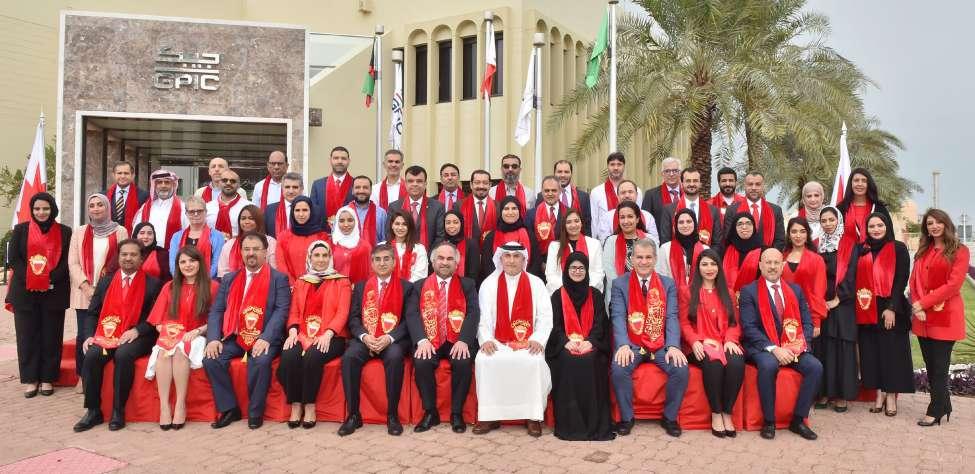
• Responsible Care Committee
• Agri-Nutrient Committee
• Youth Committee
Our CSR performance 2020-2021
Since inception, GPIC has learned that we can only achieve a competitive advantage by weaving social and environmental considerations into our business strategy. This ethos has become the fundamentals of our Sustainability and Corporate Social Responsibility Strategy. We try to give a human touch to whatever we do.
We have won the Arabia CSR Award for the seventh consecutive in both the large category and the partnerships and collaboration category in 2020 and 2021. Winning the Arabia CSR Award is in itself recognition of our unwavering commitment and ongoing contribution to social responsibility. The success motivates us further to meet future challenges. It inspires and reinforces our commitment to manage our business processes to produce an overall impact on society.
COVID-19 pandemic had an impact on many of our CSR related activities. There were challenges but opportunities too. Our flag ship partnership program, the schools environmental research program was continued virtually utilizing the digital platform. We extended support to InJaz through virtual one to one sessions with the students. Industrial students were provided industrial training remotely. We continued to support various segments of the community and society in whatever way we could. We contributed US$ 1 million to the National Campaign for combatting COVID-19.
GPIC Sustainability Report 20202021 139
Note: Due to COVID-19, all the school lectures have been temporarily suspended
Note: Due to COVID-19, all visits to the complex were stopped

Environmental Awareness Lectures to Schools 2016 2017 2018 2019 2020 2021 Actual Target 32 32 32 32 32 32 32 17 42 39 5 15 10 30 25 20 40 35 45 0 50 44 Social and Educational Visits to GPIC 2016 2017 2018 2019 2020 2021 Actual Target 45 30 30 30 15 15 32 20 18 0 0 0 10 30 20 50 40 0 60 33
Society
GPIC Sustainability Report 20202021 140

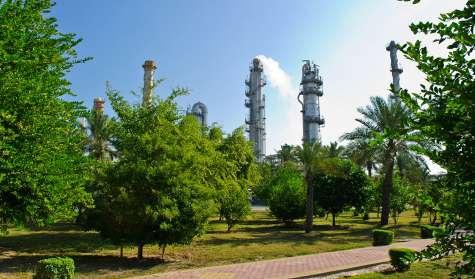
Contributions and sponsorship to charities, NGOs and other worthy causes 2016 2017 2018 2019 2020 2021 Actual Target 100% 100% 100% 100% 100% 100% 100% 100% 100% 100% 100% 100% 20% 60% 40% 100% 80% 0% 120% GPIC Sustainability Report 20202021 141
COMMUNITY
Operations with local community engagement, impact assessments, and development programs GRI 413-1
GPIC has strived to be a good neighbor and a trusted collaborator, making sure we leave a positive impact on every community where we operate. The well-being of the communities in which we operate is paramount for us.
100%. of our operations have implemented local community engagement, impact assessments and development programs. The local community is engaged by the Company in identifying the needs of the community, impact of Company operations on the Community and development of programs towards creating value in the life of the community. The activities for long term sustainable social interventions that have been carried out in these main areas as listed below.
Community investment;
1. Strategic philanthropy (Donations and sponsorships)
2. Capacity building
3. Educational Support
4. Women Empowerment
5. Youth engagement
Environmental Protection and awareness;

1. Safe & Eco-friendly operations
2. Visits to GPIC by members of the community
3. Out-reach programs by GPIC employees delivering environmental awareness lectures to school children
4. Industrial training at GPIC for students during summer break.
Employment opportunities to the local community;
1. The Company provides ample opportunities of suitable employment at its facilities and the Bahraini population gets the priority.
Operations with significant potential or actual negative impacts on local communities GRI 413-2
GPIC provides a great number of economic and social benefits to the local communities in which it operates. GPIC operates in a highly regulated and monitored industry. We work closely with state officials and regulators on operations, expansions and sales to ascertain the environmental impact of industry activities on local communities. Through this collaboration, GPIC has identified and implemented mitigation opportunities that safeguard local communities from potential negative impact.
GPIC is a Responsible care company and is certified for RC-14001 since 2010. The Company applies all the guiding principles and codes of the Responsible Care both within and beyond the fences.
This process identifies the potential for negative impacts on communities, the characteristics of most risk within the individual location, the points of vulnerability and leads to an improvement plan where needed to reduce the potential for negative impacts.
GPIC has specifically implemented the Responsible Care Security Code including repetitive security vulnerability assessments at its sites globally, and has included security scenarios in all emergency plans.
ANTI-CORRUPTION
GRI
103: Management Approach Disclosures
(103-1, 103-2, 103-3)
GPIC’s focus on sustainability is embedded in everything we do – our strategy, operations and daily actions; which also includes our critical stance as a responsible business against fraud and corruption within the marketplace and our communities. We strongly believe that ‘how we make our profits’ is a critical enabler towards our credibility amongst our stakeholders, and is a core element of our operational environment.
Investing towards anti-fraud and anti-corruption mechanisms and principles makes good business sense, and within GPIC, we start right at the top. The Board of Directors and Executive Management have a strong commitment toward operating and managing an ethical organisation with a strong sense of responsibility towards all stakeholders.
We believe that the “tone at the top” is absolutely critical for us to foster an ethical environment within the workplace; and it is the same tone from the top that establishes our leadership commitment throughout the organizations to positively influence our management and our people towards transparency, integrity, honesty and ethical behavior. In order to sustain our commitments throughout the organization, we enforce the following actions as a part of our daily operations:
• Communicating what is expected from our people and promoting ethical values: We clearly communicate the values and ethics of the organization, and how this should be performed consistently and continuously. We also make this formally available by means of a written ‘Code of Ethics’.
Society
GPIC Sustainability Report 20202021 142
GRI 103: Management Approach Disclosures (103-1, 103-2, 103-3)
• Leading by example: We believe in living our values, and we believe that this starts from right at the top of the organization. Our leadership and management are expected to go over and beyond to apply these values in their own day-to-day actions, whilst being a positive role model for our people.

• Providing a safe environment for reporting violations: We have established a safe environment for our people to be able to report on any unethical action or behaviors they have witnessed without the fear of reprisal. Our people also have a route to file a report anonymously, should they chose not to disclose their identity.
• Rewarding acts of integrity: We ensure that we recognize and reward ethical behavior within the organization including considering our people who have exhibited high levels of integrity and ethical behavior over and beyond their call of duty for organizational awards.
GPIC’s pursuit of profit is underlined by a pervasive commitment to be ethical in all that we do. As a result, GPIC’s work ethos embodies some of the highest standards of corporate governance. In fact, GPIC have voluntary aligned its corporate governance to the Bahraini law requirement, to ensure best practices.
Our pursuit of ethical behavior stems from a corporate governance strategy built upon mechanisms that ensure responsible behavior across all tiers of interaction throughout the organization’s operations; including who we conduct business with, the employees of the organization, the people of the communities that host us, as well as the government representatives who regulate our business practices.
Our Corporate governance policy begins with a very simple and basic premise. All of GPIC’s workings, ranging across all stakeholders, must and do, comply with the laws and regulations of Bahrain. However, as with everything that is GPIC, we aim to go beyond just mere legal compliance, and hold ourselves to an even higher standard.
GPIC’s stringent policies ensure that we monitor the action of those connected to the organization in any capacity, thus preventing them having undue advantage of their access to information. Access to GPIC legal, compliance and internal audit function is made available to the business partner and trading organizations associated with GPIC to ensure liaison
with the external parties to report any potential malpractice, fraud and corruption.
At GPIC, corporate governance is also about preventing a disadvantage to those who interact with the organization. The company makes it a point to pay suppliers on time, as well as fulfilling all other financial obligations without any delays. Additionally a strict pre-qualification process takes place before accepting any new trading organization.
Furthermore, our governance framework allows for a stringent, frequent and thorough audit of every department where financial transactions are scrutinized and system compliance audits are conducted. Each department is regularly audited and issued audit reports. Additionally an independent external auditor would also further audit the control system to ensure its effectiveness and elevate any potential wrongdoing or cases involving anti-corruption. We have always obtained an opinion from an independent external auditor. Moreover, a joint shareholders audit is conducted on GPIC every three years targeting a comprehensive scope which adds to our credibility, integrity, and ethical values.
In 2020, we were successfully able to improve our governance by issuing a revised Corporate Governance Policy. In 2019, we have prepared an SOP related to conflicts of interest The purpose of this Standard Operating Procedure is to ensure that there is a clearly documented framework to identify, declare, manage and resolve any matters that are or lead to Conflicts of Interest between the employee and Company Businesses.
In 2013 - 2014, the company has prepared a comprehensive Segregation of Duties (SOD) guidelines and matrix identifying positions that should be separated, positions that require compensating controls when combined, transaction codes that should not be combined with a single user and the risks arising from the conflicts. To ensure the compliance with SOD framework, a detailed and comprehensive compliance audits had been conducted, which resulted in significant improvements. The SOD framework is considered to be another essential milestone toward enhancing the anticorruption and anti-fraud programs and systems, which include the following areas:
GPIC Sustainability Report 20202021 143
Society Performance Indicators
GRI 103: Management Approach Disclosures
(103-1, 103-2, 103-3)
• The GPIC Corporate Governance Policy
• The Board of Directors’ Charter
• The Board’s Performance Assessment Framework
• The Board Sub-Committee Charters
• The Board Sub-Committee Performance Assessment
• The Directors Code of Conduct
• Board of Directors Conflicts of Interest and Disclosure Policies
• Director independence and conflict of interest to be declaration
• The Secretary to Board terms of reference
• Board of Directors Appointment Letter
To further enhance the anti-corruption framework, we have conducted a comprehensive compliance review with the Corporate Governance Policy. Such reviews are conducted on a yearly basis. In addition, the company prepared a detailed Code of Ethics Handbook which was presented to the Audit, Finance and Risks Committee in December 2015. The Handbook had been reviewed and approved by the Board of Directors in May 2016. This Handbook emphasizes working sincerely, honestly, acting responsibly and reaffirms GPIC’s commitment to the UN Global Compact. The Handbook describes GPIC’s ethical principles in relation to Human Rights, Labour Rights, the Environment and Anti-Corruption. The company rolled out a comprehensive awareness campaign for Code of Ethics in 2018.
Following are some of our recent highlights reflecting our commitment to UN Global Compact’s principles related to ant-corruption
• New Guidelines on segregation of duties have been issued and an audit has been conducted.
• The corporate governance framework was reviewed by the BoD in 2016 and a revised version issued in 2020.
• Every employee is given a code of business ethics booklet.
• Robust accountability and auditing system prevents any wrong doing.
• The three bids system for tendering is yet another step towards anti-corruption.
Over and above this, we are also a member of the Pearl Initiative, which is the leading independent not-for-profit, by-business for-business, institution working across the Gulf Region of the Middle East to influence and improve corporate accountability and transparency. One of the key aims of the Pearl Initiative is to positively influence and drive
collaborative action on issues such as corporate governance, anti-corruption, codes of conduct, integrity and reporting across the region.
Eventually these practices will have a huge impact in reducing the intention of employees of engaging in any sort of corruption and fraud activities.
Operations assessed for risks related to corruption GRI 205-1
Our internal audit has carried out a process risk assessment that covers major functions in Finance, Human Resource and Marketing from fraud perspective. Our financial audits both internal and external across the organization ensure that no financial corruption is taking place. Our Enterprise Risk Management also covers the risk of a major fraud. Our Audit, Finance and Risk Committee along with an external audit, reviews our financial statements and legal/ regulatory compliance on quarterly / yearly basis.
Communication and training on anti-corruption policies and procedures GRI 205-2
As part of its commitment to the UNGC principles on anticorruption recently, a number of our employees attended specific training and conferences related to corruption, bribery, fraud etc.
Confirmed incidents of corruption GRI 205-3
A review of the complaints and completed investigations in 2020/2021 revealed that:
• No GPIC employees were terminated for corruption related behavior.
SOCIO ECONOMIC COMPLIANCE
Non-compliance with laws and regulations in the social and economic area GRI 419-1
The Company did not pay any fines for non-compliance during the reporting period and there were no monetary sanctions.
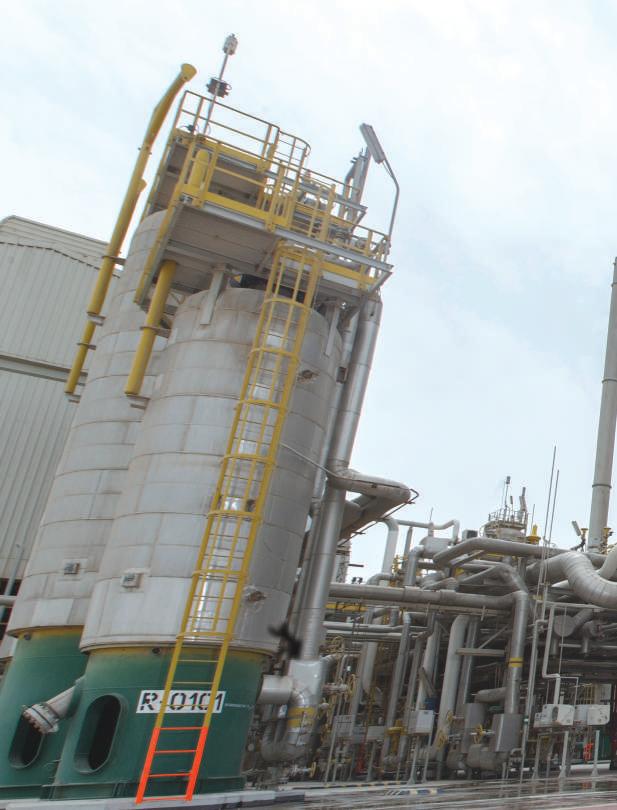
GPIC Sustainability Report 20202021 144
Product Stewardship
GRI 103: Management Approach Disclosures
(103-1, 103-2, 103-3)
GPIC produces the highest quality fertilizers and petrochemicals at the company’s state of the art complex for the welfare of people around the world. We at GPIC envisage, initiate and effectively see through interventions in the areas of sustainable and responsible business practices, thus setting a precedent for others to emulate.
We are aware that the benefits of our industry are accompanied by enduring commitments to Responsible Care in the management of petrochemicals and fertilizers worldwide. Keeping this objective in view, GPIC has become part of the global voluntary initiative to drive excellence in safety, health and environmental management by becoming accredited to the RC-14001 Management System in 2010.
By attaining the RC 14001 certification, GPIC has demonstrated its seriousness and staunch commitment towards continual improvement and its establishment of product stewardship principles across its functional operations, whether it is the upstream supply of raw materials, manpower, services and spare parts or its downstream product supply chain. Today the company is proud of the fact that in the selection of suppliers for materials and manpower, it gives preference to local suppliers who have service facilities in Bahrain and a satisfactory level of national manpower.
We consider our approach to product stewardship as our commitment to SHE PLUS (Safety, Health, Environment and Security) aspects throughout the product life cycle. We clearly identify risks relevant to our product life cycle and try to mitigate them. As a tool of continual improvement and benchmarking, GPIC attained the prestigious IFA (International Fertilizer Association) Protect & Sustain Excellence Certification in Q1 2014, which again signifies the importance GPIC Management attaches to the underlying principles of Product Stewardship.
We at GPIC, work very closely with our marketers, customers, suppliers and contractors to foster the safe and secure use, transport and disposal of Urea fertilizer, Ammonia and Methanol by providing comprehensive hazard and risk information to them. We also ensure that we communicate product risks to our stakeholders, listen to their concerns and consider their perspectives on the matter.
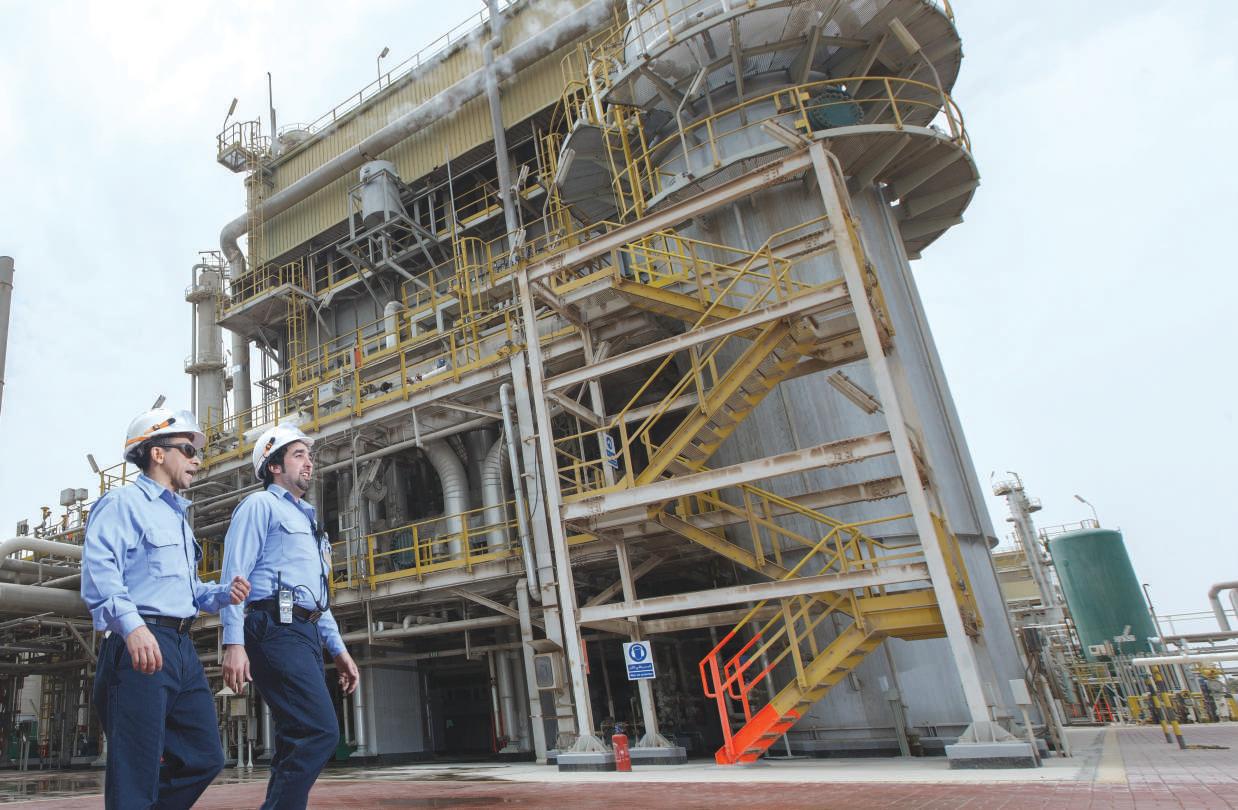
GPIC Sustainability Report 20202021 145
Product Stewardship
GRI 103: Management Approach Disclosures (103-1, 103-2, 103-3)
As part of the GPIC Responsible Care Product Stewardship programmes we do the following:
• Use innovative solutions during the engineering and design stage of the new projects or modifications to the existing plants to ensure the reduction of our own environmental impact and carbon footprint.

• Run responsible operations in terms of producing, handling and exporting the highest quality products to ensure the customers and end users are fully satisfied with our products.
• Communicate in the form of booklets and guidelines on product risks and handling procedures including safety data sheets(SDS), distributed to all personnel involved in products transport, such as ships and trucks.
• Arrange meetings with local buyers and make them aware of the GPIC way in conducting business in terms of safety, health, environment and product handling.
• Hold regular meetings with marketers, namely Sabic Agri-Nutrients Investment Company- KSA, PIC-Kuwait and customers, to further streamline the entire supply chain, linking operation with the end users. One of the most important points on the agenda of each of these meetings is to gauge the level of customer satisfaction and attain feedback on finding ways to further improve our processes and operations.
• Use a responsible methodology of collection, recycling and disposal of contaminated product in line with local environmental standards and legislation.
• Observe mandated external independent surveyor inspections of Product Handling Facility and ship cargo tanks to ensure full compliance with the buyer’s requirements and international standards.
• Maintain GPIC compliance with Level – 1 (Gold Status) by the Department of Agriculture, Water and the Environment- Australia. Accreditation means that GPIC has the best low-risk facility for the production, storage and export of granular urea, which in turn provides an added value to all GPIC Urea customers around the world. This accreditation specifies stringent guidelines that ensure the GPIC product is fully controlled from the source until it reaches the end user and is adequately protected from any objectionable contaminants and pollutants.
The extract from the latest inspection report 2021 states quote “ The above facility has been assessed as meeting the requirements for Level One Gold system status as set out in the department’s Imported Inorganic Bulk Cargo Fertiliser Assessment and Management Policy.
The above facility has demonstrated its commitment to ensuring the biosecurity integrity of their fertiliser product across the supply chain, from manufacture to loading. This commitment has been achieved through recognised management strategies, supporting continuing compliance with the department’s import requirements, as confirmed through the Desk Audit of 20 May 2021.
This status will be maintained until 20 May 2027 subject to a satisfactory result in annual third party audits.” unquote
• Ensure that GPIC’s Marine Terminal is in compliance with the International Ships & Port Security (ISPS) according to IMO regulations and the local port authority. Ships calling at the GPIC Marine Terminal to load Urea must declare their security level according to the ISPS code, before entering berth.
• Hold shore and ship meetings to achieve smooth, efficient and safe operations so that all safety, environmental and security requirements are fully understood and implemented by the ship personnel.
• Ensure that GPIC Urea and Methanol products are registered under the European REACH programme (Registration, Evaluation, Authorisation and Restriction of Chemical Substances) (UREA REG# 01-211946327733-0095 & METHANOL REG# 01-2119433307-44-0005). This is the case for GPIC procedures with regard to product and service information and labeling, with particular reference to (i) substances that might produce an environmental or social impact, (ii) the disposal of the product and environmental/social impacts, and (iii) the safe use of the product or service.
• Invite customers to visit the company’s complex to exchange views and ideas with regard to working procedures and further enhance business relationships.
• Fully extend technical support as deemed required/ necessary.
• During 2017 GPIC has also started export of methanol to downstream industry in Bahrain.
• IIn, 2017, GPIC was also among the first industrial organizations in the Kingdom of Bahrain to acquire the “ Port Operator license” in July 2017 by the Ports and Maritime Authority. This license allows GPIC to solely operate and manage its jetty for the export of urea to the international market. The subject license was again renewed in 2021.
This license provides our stakeholders and clients clear assurance that GPIC’s Marine Terminal was built to the highest international standards for export terminals, and meets all marine and industrial safety requirements for loading large bulk carriers.
PRODUCT STEWARDSHIP PERFORMANCE INDICATORS Customer Health and Safety
Assessment of the health and safety impacts of products and service categories GRI 416-1
All products (100 percent) are assessed in an appropriate manner – depending upon Safety, Health and Environment (SHE) profile, application, and exposure potential, for improvement opportunities as part of the GPIC SHE management approach at each of the stages of the product life cycle shown below in the table.
GPIC Sustainability Report 20202021 146
GPIC businesses use the Business Risk Review process to assess and minimize possible adverse impacts on people, property and the environment as a result of GPIC’s business activity, including minimizing SHE impacts associated with new and existing operations, products, applications and services throughout the products’ life cycle.
Businesses are required to conduct risk reviews when material new information is received, including material changes in product uses, regulations, raw materials, etc., or when triggered, in certain cases, by the passage of time. Improvement opportunities have been identified to clarify and strengthen these triggers.

Development
GPIC’s products are in two categories 1) Urea and Ammonia are additive for enhancing agricultural produce and due care has been given to health and safety. 2) Methanol can be used in fuel additives, pharmaceuticals and households etc. and hence due care is also given to health and safety. Our industry’s basic raw material is fossil fuel(natural gas) and we are not exploring alternate raw materials for our process however we invest on sustained basis to improve our energy and resource efficiency and we are also carrying out a feasibility study to implement the use of solar energy within GPIC.
Life cycle stages in which health and safety impacts of products and services are assessed for improvement and percentage of significant products and services categories subject to such procedures
Research and Development
Certification
Products are already developed and the Company does not conduct any in- house research and development.
No certification is required. However, the Company has obtained all the key certifications and one of the few Companies who are certified to ISO9001; ISO14001; ISO:45001;PAS99; RC14001; ISO27001; ISO31000; ISO22301; ISO50001; Halal Methanol; IFA Protect & Sustain Product Stewardship
Manufacturing & production
Marketing & promotion
Yes
The marketing of our three products is done by our share holding companies Sabic & PIC. The health and safety risks are communicated through product safety information and MSDS.
Storage, distribution & supply
Use & Service
Disposal
Reuse/Recycling
Note: All products of the Company are subject to health and safety analysis.
The health and safety risks are communicated through product safety information and MSDS.
The health and safety risks are communicated through product safety information and MSDS
Not applicable.
For ammonia product it is exported as ammonia and also recycled to produce urea.
COMPONENT LIFE CYCLE STAGE RESPONSE -
product
of
concept
416-1 GPIC Sustainability Report 20202021 147
GRI
Product Stewardship
Incidents of non-compliance concerning the health and safety impacts of products and services GRI 416-2
We did not experience any incidents related to noncompliance concerning the health and safety impacts of products and services.
Marketing and Labeling
Requirement for product and service information and labeling GRI 417-1
All are product storages are properly labeled and the urea bags are also labeled and the product information is provided to all customers.

Incidents of non-compliance concerning product and service information and labeling GRI 417-2
We did not have any Incidents of non-compliance concerning product and service information and labeling.
Incidents of non-compliance concerning marketing communications GRI 417-3
We did not experience any incidents related to noncompliance concerning marketing communications.
Customer Privacy
Substantiated complaints concerning breaches of customer privacy and losses of customer data GRI 418-1
We did not experience Substantiated complaints concerning breaches of customer privacy and losses of customer data.
Socioeconomic Compliance
Non-Compliance with laws and regulations in the social and economic area GRI 419-1
We did not experience any non-compliance concerning non-compliance with laws and regulations in the social and economic area.
GPIC Sustainability Report 20202021 148
Our commitment to Responsible Care and the Protect and Sustain initiatives drives excellence in Security, Safety, Health and Environment aspects throughout our product life cycle
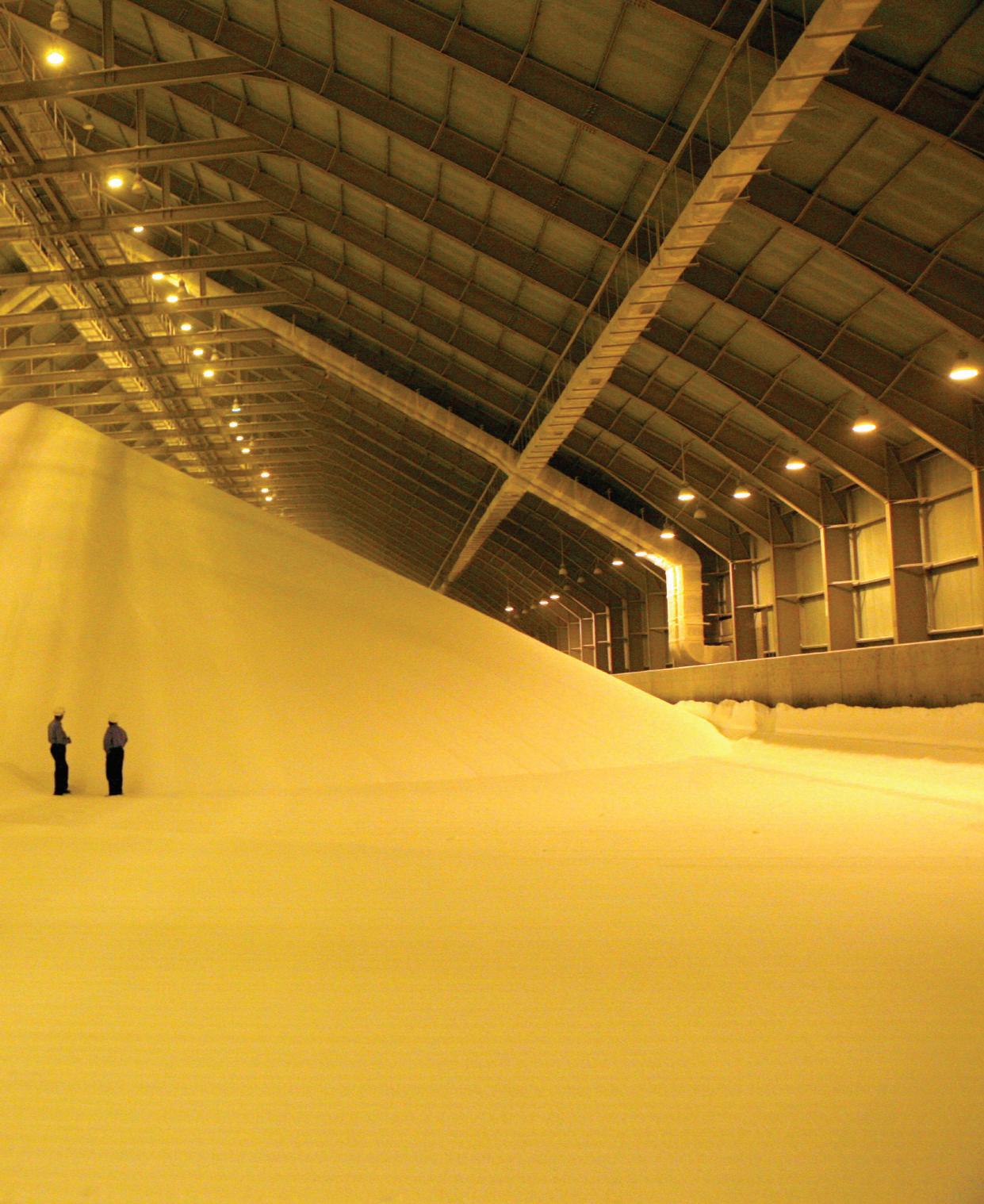
GPIC Sustainability Report 20202021 149
In 2012, Gulf Petrochemical Industries Company (GPIC) became part of the global transformation for a sustainable future by committing to the United Nations Global Compact’s ten principles in the realms of Human Rights, Labour, Environment and Anti-Corruption

UN Global Compact
GPIC Sustainability Report 20202021 150
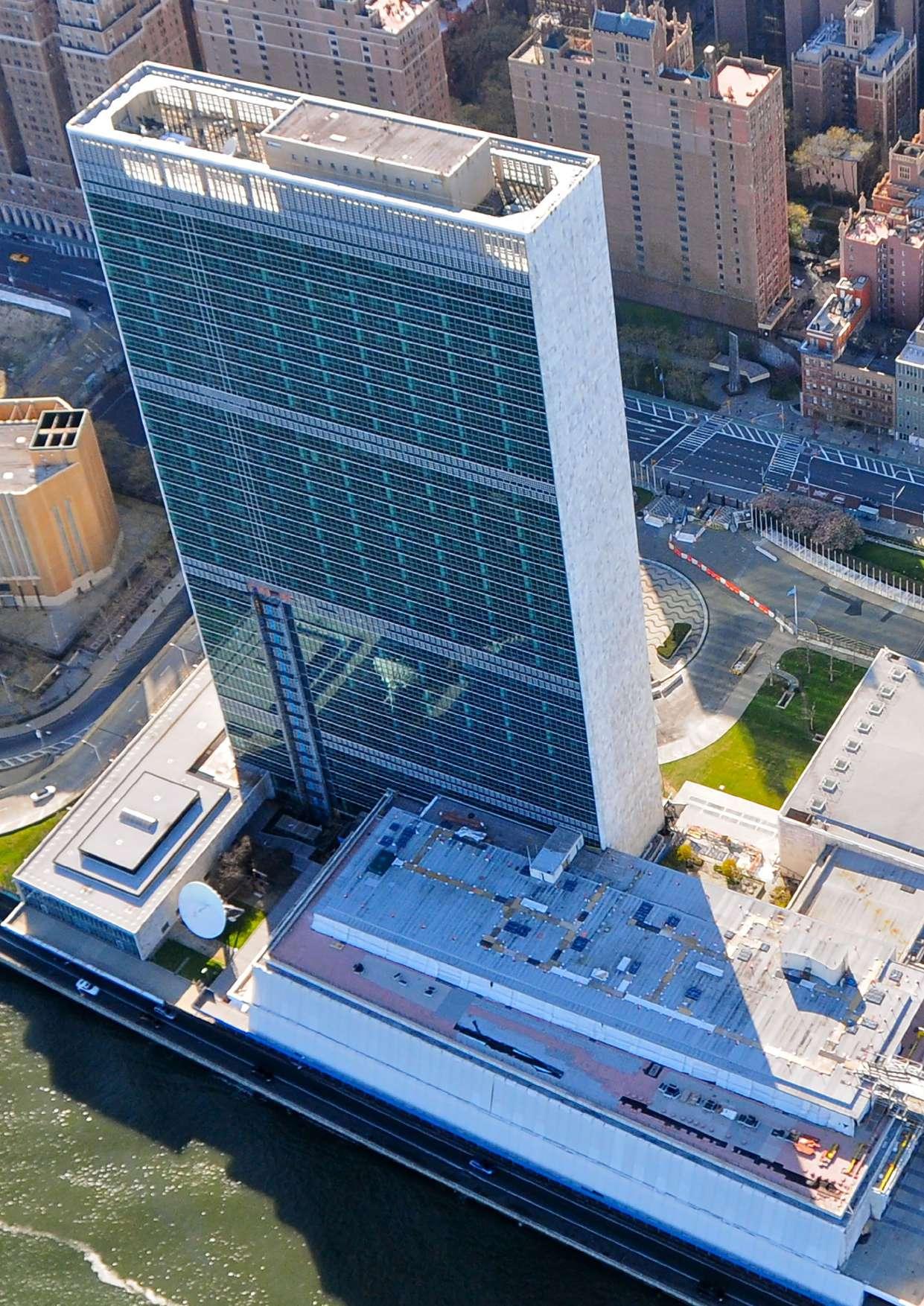
GPIC Sustainability Report 20202021 151
Our Committment
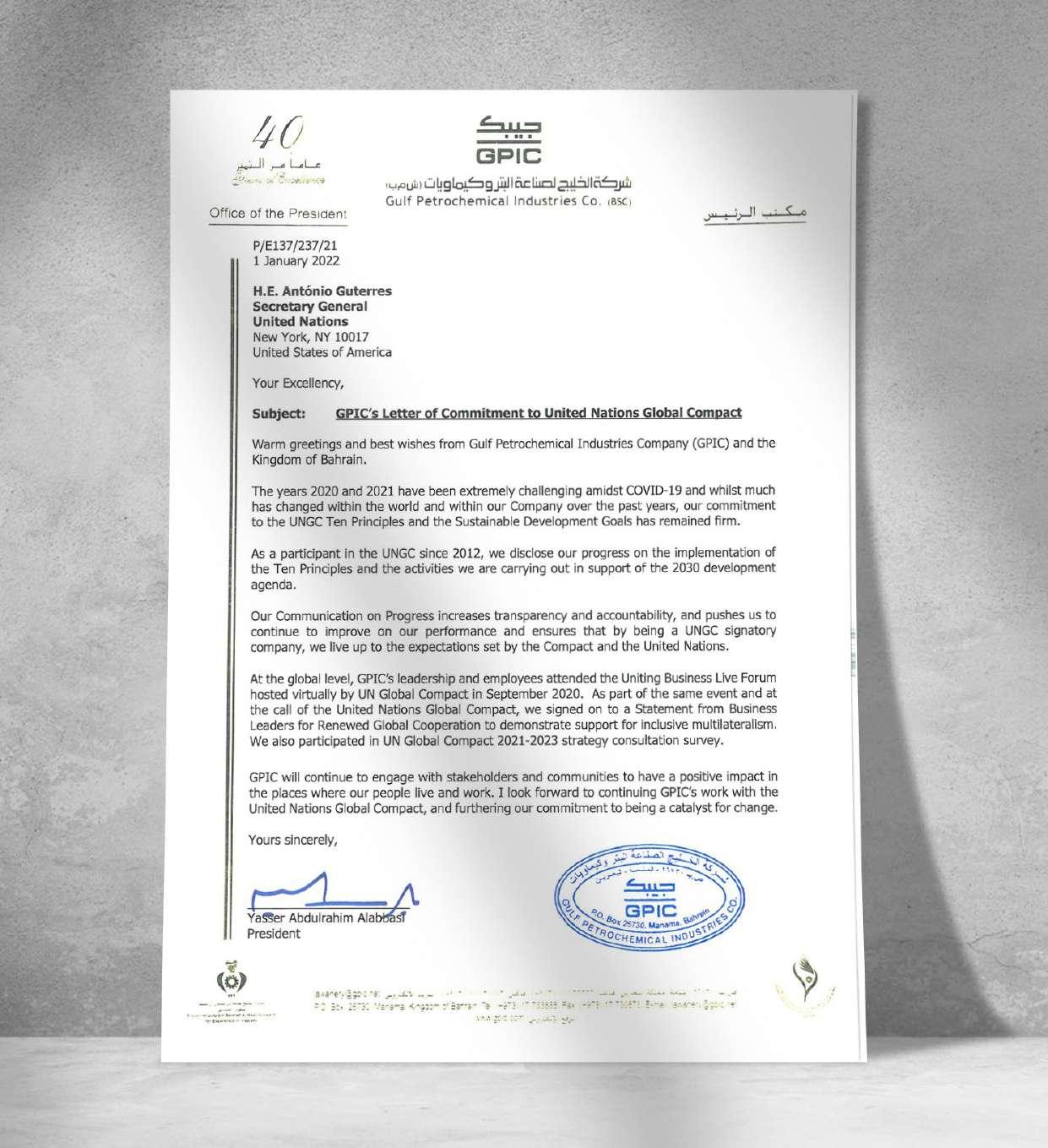
GPIC Sustainability Report 20202021 152
Management Approach
At GPIC we recognize that contributing to sustainable economic development is a shared responsibility. We have been publicly committed to the UNGC principles since 2012 because we believe we have a responsibility to conduct business ethically while respecting our people and the planet that sustains us.
GPIC has been a signatory of the United Nations Global Compact (UNGC) since 2012 and is also committed to UNGC Food and Agriculture Business Principles (FAB 6) and the UNGC Women’s Empowerment Principles (WEPs) since 2014.
GPIC is committed to supporting the ten principles of the UN Global Compact relating to human rights, labour standards, the environment and the fight against corruption as well as reporting and communicating annually to its stakeholders on progress made to implement these principles.
GPIC is reporting according to the UN Global Compact
“Advanced Level” and describes how it meets the 21 criteria of this Level in the following areas:
• Implementation of the 10 Principles into Strategies & Operations
• Robust Human Rights Management Policies & Procedures
• Robust Labour Management Policies & Procedures
• Robust Environmental Management Policies & Procedures

• Robust Anti-Corruption Management Policies & Procedures
• Taking Action in Support of Broader UN Goals and Issues
• Corporate Sustainability Governance and Leadership
It reflects our self-assessment on how we have met the UN Global Compact Advanced Level criteria. We consider that a criterion is met when we communicated its implementation or planned implementation of one or more of the commonly accepted best practices suggested under each criterion.
As a signatory of the Women’s Empowerment Principles (WEPs), GPIC furthermore reports according to the WEPs Reporting on Progress Guidance. As a way forward we have also shown our alignment and contribution to the UN’s SDGs.
Scope: Implementing the Ten Principles into Strategies & Operations
Criterion 1: The COP describes mainstreaming into corporate functions and business units
Our commitment to responsible business is embedded into our business agenda through our vision and mission and core values, articulated in our corporate governance and sustainability strategy.
We are integrating sustainability into our strategy and innovation to help drive business growth. We are working with our customers and suppliers, engaging employees and forging new partnerships.
Our management structures help us to fulfill our commitment towards mainstreaming the core principles into our organisational framework.
GPIC adopted the United Nations’ pillars of Sustainable Development: People, Planet, Profit, and Partnership; in which our success factors are measured based on our performance in our core business areas. UNGC 10 Principles are part of our goals and governance and we have already aligned our business priorities with the 17 UN SDGs.
Our plan spans our entire portfolio of products, mainly ammonia, methanol and granular urea to all countries in which we sell our products and it applies across the whole value chain – from the sourcing of raw materials to our production, storage and exports.
- GPIC Corporate Governance (An updated version issued in 2020)
https://www.gpic.com/ media/Publication/other/ CorporateGovernance. aspx
- Code of Ethics
https://www.gpic.com/ media/Publication/ other/CodeofEthics2016. aspx
- Sustainability framework (GPIC SR 2020)
- GPIC ISO and other certifications
https://www.gpic.com/ company/OURPOLICIES/
- GPIC policies on HSE and Responsible Care
https://www.gpic.com/ company/OURPOLICIES/
- GPIC Annual Reports
https://www.gpic.com/ media/Publication/?c=12
- GPIC’s Vision, Mission and Corporate Values
https://www.gpic. com/company/ VisionMissionValues/
PRINCIPLES
GC SCOPE OR PRINCIPLE CRITERIA FOR GC ADVANCED LEVEL GPIC APPROACH WHERE TO FIND OUT MORE REFERENCE TO GRI DISCLOSURES
IMPLEMENTING THE TEN
INTO STRATEGIES & OPERATIONS
GPIC Sustainability Report 20202021 153
Our Committment
Scope: Implementing the Ten Principles into Strategies & Operations
Criterion 2: The COP describes value chain implementation.
Our Responsible business ethics embodies our commitment to conduct business with integrity, openness, and respect for the universal human rights and core labour principles throughout our operations. It advocates a ’beyond compliance’ approach to our supply chain.
Our pre-qualification criteria for suppliers include certifications such as ISO 14001 and Responsible Care and our IFA P&S product stewardship addresses the above.
We are working towards making Gulf SQAS qualification as a pre-requisite for all our logistics’ service providers.
- GPIC Sustainability Report 2020

- Our policies on HSSE and Responsible Care https://www.gpic.com/ company/OURPOLICIES/
- Code of Ethics https://www.gpic.com/ media/Publication/ other/CodeofEthics2016. aspx
- GPIC Annual Reports https://www.gpic.com/ media/Publication/?c=12
Principle 1: Businesses should support and respect the protection of internationally proclaimed human rights.
Principle 2: Businesses should make sure that they are not complicit inhuman rights abuses
Criterion 3: The COP describes robust commitments, strategies or policies in the area of human rights.
We are committed to driving fairness by further building human rights across our operations, and advancing human rights in our supply chain, continuously improving and promoting best practice.
Our approach is to uphold and promote human rights in three ways:
1. in our operations by upholding our values and standards .
2. in our relationships with our suppliers, customers and other business partners and,
3. by working through external initiatives, such as the UNGC
We continue to build our employees’ and workers’ awareness and knowledge of human rights, and continue to encourage them to speak up without fear for retribution about any concerns they may have.
We are a signatory to the United Nations Global Compact since 2012 and our President has made a public commitment towards the UNGC’s 10 principles. We are committed to respecting all internationally recognised human rights’ standards as relevant to our operations.
Our legal section maintains updates on regulations and our new ‘code of ethics’ document is aligned to the UNGC’s four areas and is publicly available on our website.
- GPIC Code of Ethics
https://www. gpic.com/media/ Publication/other/ CodeofEthics2016.aspx
- COVID-19 and GPIC Response on page 1617 of UNGC COP 2020 and GPIC SR 2020-2021 Page 28-33
IMPLEMENTING THE TEN PRINCIPLES INTO STRATEGIES & OPERATIONS GC SCOPE OR PRINCIPLE CRITERIA FOR GC ADVANCED LEVEL GPIC APPROACH WHERE TO FIND OUT MORE REFERENCE TO GRI DISCLOSURES
HUMAN RIGHTS MANAGEMENT POLICIES
PROCEDURES GC SCOPE OR PRINCIPLE CRITERIA FOR GC ADVANCED LEVEL GPIC APPROACH WHERE TO FIND OUT MORE REFERENCE TO GRI DISCLOSURES
&
GRI 412-3 GRI 412-2 GRI 406-1 GRI 407-1 GRI 408-1 GRI 409-1 GRI 103-2
GPIC Sustainability Report 20202021 154
Criterion 4: The COP describes effective management systems to integrate the human rights principles
Human rights principles are embedded in our corporate governance policy which is regularly updated. Our employees also undergo regular trainings in relation to human rights, labour rights and women’s rights. Our governance and policies set mandatory requirements on human and labour rights for our suppliers and includes a continuous improvement ladder. Mandatory requirements are entry level for doing business, then advancing to good/ best practice over time – from ‘doing no harm’ to ‘doing good’.
The Board of GPIC is responsible for ensuring adherence to these commitments and our senior management has the responsibility for overseeing their implementation, effective enforcement and to ensure that any breaches to our Code of Business Principles are investigated and remediated.

- GPIC Corporate Governance https://www. gpic.com/media/ Publication/other/ CorporateGovernance. aspx
Criterion 5: The COP describes effective monitoring and evaluation mechanisms of human rights integration
We have established a grievance reporting mechanism internally (both individual and collective) including a SOP on Industrial relations. External stakeholders can raise their concerns, grievances through various channels provided for appropriate feedback.
We recognise that we must take steps to identify and address any actual or potential adverse impacts with which we may be involved whether directly or indirectly through our own activities or those of our business relationships/ stakeholders. We manage these risks by integrating the responses as a part of our due diligence process into our policies and internal systems, acting on the findings, tracking our actions, and communicating about how we address impacts appropriately with our stakeholders.
HUMAN RIGHTS MANAGEMENT POLICIES & PROCEDURES GC SCOPE OR PRINCIPLE CRITERIA FOR GC ADVANCED LEVEL GPIC APPROACH WHERE TO FIND OUT MORE REFERENCE TO GRI DISCLOSURES
GPIC Sustainability Report 20202021 155
Our Committment
Principle 3: Businesses should uphold the freedom of association and the effective recognition of the right to collective bargaining.
Principle 4: The elimination of all forms of forced and compulsory labour.
Principle 5: The effective abolition of child labour.
Principle 6: The elimination of discrimination in respect of employment and occupation
Criterion 6: The COP describes robust commitments, strategies or policies in the area of labour
We are committed to creating a framework for fair compensation, and help employees take action to improve their health (physical and mental), nutrition and well-being. We strive to reduce workplace injuries and accidents in our facilities. GPIC also takes care of the families of our employees and the community’s wellbeing through guidance, structured programs, awareness & education, and medical insurance.
We have a formal labour union to ensure our employees have the opportunity to leverage a formal structure to leverage their right to collective bargaining. Membership to the union is by application, and there are no restrictions that deter an employee from joining the labour union.
In addition to labour policies that strongly respect employee rights we incorporate global best practices in relation to HR development including wellbeing campaigns, benefits to labour, and capacity building of employees/ contractors, all of which won us number of HR Awards.
- Sustainability Report 2020 https://www.gpic. com/responcibility/ SustainabilityReport/
- COVID-19 and GPIC Response on page 16-17 of UNGC COP 2020 and GPIC SR 2020-2021 page 28-33
Criterion 7: The COP describes effective management systems to integrate the labour principles
We live by the principles of diversity and inclusion and work to embed these firmly into our day-to-day business decisions via our talent management and people processes.
All company goals are under the ownership of specific employees; the company’s labour union is actively engaged in meetings/ activities; the grievance mechanism procedure is accessible to all.
- COVID-19 and GPIC Response on page 16-17 of UNGC COP 2020 and GPIC SR 2020-2021 page 28-33
Criterion 8: The COP describes effective monitoring and evaluation mechanisms of labour principles integration
Employees can report concerns to their Line Manager/ HR section or the Legal and Compliance Supervisor.
Prior to approving suppliers, references and if necessary site visits are conducted to ensure their adherence to good labour practices and standards; labour standards are included within all our business contracts.
- GPIC Code of Ethics
https://www. gpic.com/media/ Publication/other/ CodeofEthics2016.aspx
LABOUR MANAGEMENT POLICIES & PROCEDURES GC SCOPE OR PRINCIPLE CRITERIA FOR GC ADVANCED LEVEL GPIC APPROACH WHERE TO FIND OUT MORE REFERENCE TO GRI DISCLOSURES
GRI 404-1 GRI 404-3 GRI 407-1 GRI 413-1 GRI 413-2 GRI 408-1 GRI 406-1
GPIC Sustainability Report 20202021 156
Partnering with UN Environment for Sustainability
Principle 7: Businesses should support a precautionary approach to environmental challenges.
Principle 8: Businesses should undertake initiatives to promote greater environmental responsibility.
Principle9: Businesses should encourage the development and diffusion of environmentally friendly technologies.
Criterion 9: The COP describes robust commitments, strategies or policies in the area of environmental stewardship
GPIC views the Precautionary Principle as an application of the principles of risk assessment and risk management. Risk assessment includes - hazard identification, characterization, exposure assessment and risk assessment.
Risk management encompasses the identification, selection and implementation of alternative actions for addressing risk through the control of identified hazard(s) and/ or exposure.
Environmental stewardship as well as the specific principles such as the precautionary principle are strongly emphasized in our environmental and responsible care policies, environmental and sustainability strategy, long term and the annual goals and contracts with businesses.
Sustainability and in particular environmental sustainability is strongly embedded in our Mission statement which is:
‘To produce high quality petrochemical and fertiliser products;
To grow through successful partnerships and joint ventures;
To optimise the business in a safe, sustainable and cost effective manner;
To embrace knowledge, harness innovation and utilise best applicable technologies and practices;
To boost Stakeholders’ share value to train and develop the Human Capital to realise their full potential.
- Environment section of GPIC SR 2020-2021 page 90-113
- Environmental section of UNGC COP 2020
GRI 302-4
GRI 302-3
GRI 304-1
GRI 305-1
GRI 305-2
GRI 305-4
GRI 306-2
GRI 306-3
GRI 307-1
Criterion 10: The COP describes effective management systems to integrate the environmental principles
Criterion 11: The COP describes effective monitoring and evaluation mechanisms for environmental stewardship
Our environmental management system (EMS) underpins our environment strategy. GPIC employees must comply with all the policies, procedures and rules and regulations for occupational safety, health and environmental care (SHE).
Based on ISO 14001, our environmental management systems are designed to achieve continuous improvement.
We have developed a set of metrics to assess our environmental impacts across the value chain covering: greenhouse gas (GHG) emissions, water, waste and energy efficiency. We also deliver tools, techniques and awareness, and share best practices directly with the people responsible for reducing the environmental impact of our manufacturing operations. Environmental auditing programmes have been implemented within each section to help sites achieve continuous improvement in environmental performance and the findings are provided as inputs to our management review process to continually improve our performance.
- Environment section of GPIC SR 2020-2021 page 90-113
- Environmental section of UNGC COP 2020.
- GPIC Environmental strategy(available on www.gpic.com).
- Environment section of GPIC SR 2020-2021 page 90-113
- Environmental section of UNGC COP 2020
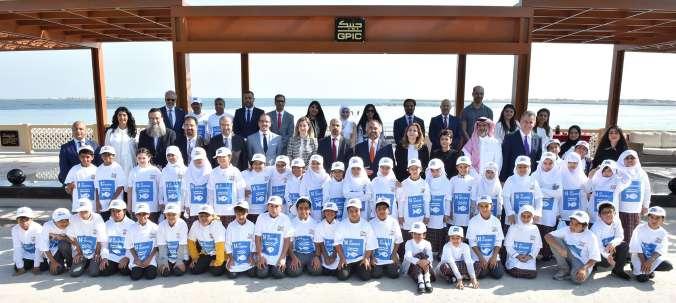
ENVIRONMENTAL MANAGEMENT POLICIES & PROCEDURES GC SCOPE OR PRINCIPLE CRITERIA FOR GC ADVANCED LEVEL GPIC APPROACH WHERE TO FIND OUT MORE REFERENCE TO GRI DISCLOSURES
GPIC Sustainability Report 20202021 157
Our Committment
Principle 10: Businesses should work against corruption in all its forms, including extortion and bribery.
Criterion 12: The COP describes robust commitments, strategies or policies in the area of anticorruption
GPIC has a zero-tolerance approach to bribery in any form: it is committed to being a nobribe business & eradicating any practices or behaviors in this regard. This zerotolerance policy extends to GPIC’s employees, contractors, third parties, through which or with whom we do business, irrespective of financial values involved. We operate with a broad definition of corruption which includes fraud and financial misrepresentation, conflicts of interest, bribery, anti-trust activity, misuse of information and misrepresentation of the company or its assets.
Our Corporate Governance policy and our code of conduct includes anti-corruption; and our segregation of duties framework eliminates conflicts of interest within the organisation.
- Anti-corruption section of GPIC SR 2020-2021 page 142-144
- and also UNGC COP 2020

Criterion 13: The COP describes effective management systems to integrate the anti-corruption principle
Criterion 14: The COP describes effective monitoring and evaluation mechanisms for the integration of anti-corruption
Our systems are regularly audited internally and externally; we train our employees in areas such as procurement fraud, anti-money laundering, procurement auditing. etc.
Our Audit, Finance, Risk committee and the Internal Audit function plays a major role in ensuring ethical business practices within our relevant functions.
- GPIC Internal Audit function charter (available on request)
Our Segregation of duties framework is externally audited; our corporate governance policy and our new ‘code of ethics’, aligned to the UNGC’s ten principles is publicly available on the GPIC website.
Our Audit, Finance, Risk committees and the Internal Audit function plays a major role in ensuring ethical business practices.
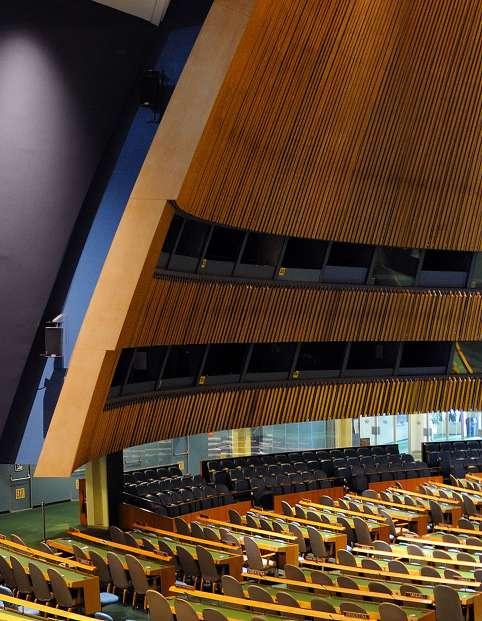
ANTI-CORRUPTION MANAGEMENT POLICIES & PROCEDURES GC SCOPE OR PRINCIPLE CRITERIA FOR GC ADVANCED LEVEL GPIC APPROACH WHERE TO FIND OUT MORE REFERENCE TO GRI DISCLOSURES
GRI 205-1 GRI 205-2 GRI 205-3
GPIC Sustainability Report 20202021 158
Scope: Taking Action in Support of Broader UN Goals and Issues
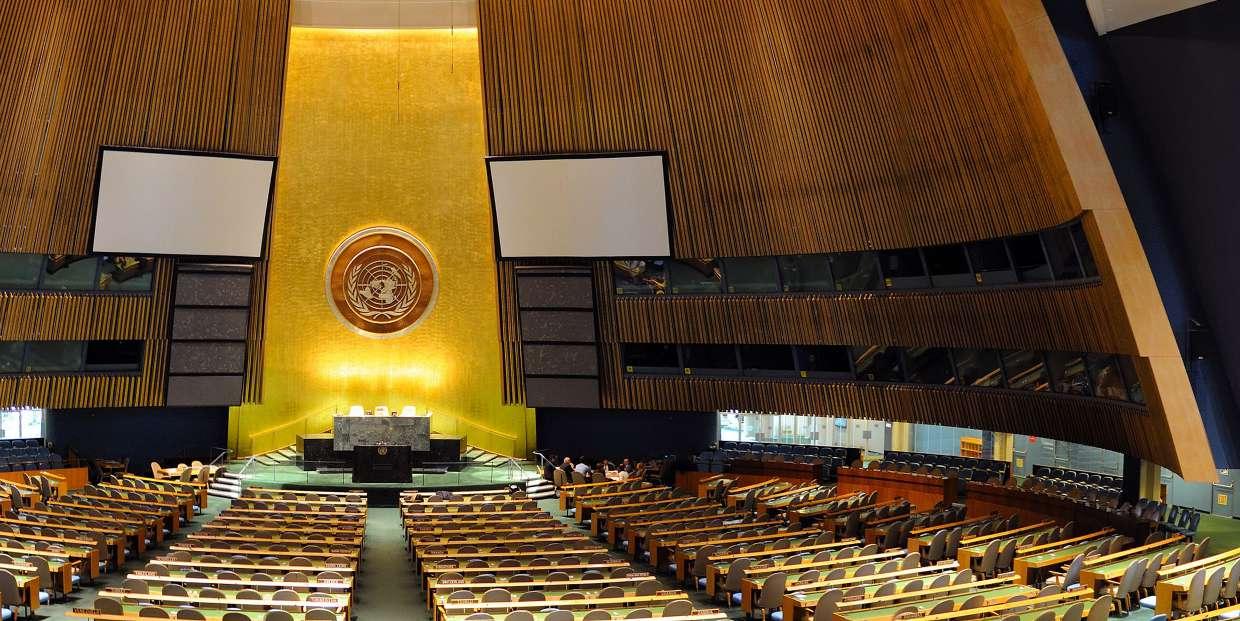
Criterion 15: The COP describes core business contributions to UN goals and issues
We are a signatory to the Global Compact and are committed to upholding its Principles across our business. In 2014 we endorsed the Women’s Empowerment Principles, collaboration between the UN Global Compact and UN Women and are also committed to the FAB 6 principles.
Our GRI Sustainability report 2020 which is also our previous COP highlights how our long-term sustainability goals are aligned to the SDGs and what is GPIC’s current contribution in alignment with the 17 Global Goals respectively. We endorse the SDGs on our website and within all our communications. In 2017 we have also aligned our annual corporate and departmental goals to the SDGs and have a system in place for linking our technical and non-technical projects with the SDGs.
GPIC and its alignment and contribution to the SDGs (GPIC SR 2020-2021]
page 18-24
UNGC SDG Industry matrix- GPIC examples
Criterion 16: The COP describes strategic social investments and philanthropy

Criterion 17: The COP describes advocacy and public policy engagement
Criterion 18: The COP describes partnerships and collective action
Our long-term sustainability goals include strategic philanthropy and we are open to new CSR opportunities as they arise based on the needs within our communities and stakeholders. As part of the national campaign to combat COVID-19 , GPIC contributed US$ 1million towards national initiatives. GPIC’s President who also served as IFA’s President is involved with the UN Committee on World food security, UN SD Summit and the UNEP GEO 6 HLG. We are also engaged in Bahrain’s COP 21 related activities including carbon management. We also constantly encourage all our stakeholders to consider the overall benefits and actively campaign for them to follow suit. Globally we are involved in fertilizer industry associations’ leadership and working groups and locally our latest partnership with the UNEP is for the Green Wave for Biodiversity tree planting campaign.
GPIC participated in the COP 26 conference in Glasgow as a part of the team representing the national interests of the Kingdom of Bahrain, highlighting our commitment towards Climate action.
TAKING ACTION IN SUPPORT OF BROADER UN GOALS AND ISSUES GC SCOPE OR PRINCIPLE CRITERIA FOR GC ADVANCED LEVEL GPIC APPROACH WHERE TO FIND OUT MORE REFERENCE TO GRI DISCLOSURES
GPIC Sustainability Report 20202021 159
Our Committment
Scope: Corporate Sustainability Governance and Leadership
Criterion 19: The COP describes CEO commitment and leadership
GPIC’s President endorses and is committed to the UNGC Principles and the UN SDGs and promotes sustainability at all international platforms and in all correspondences with our stakeholders.
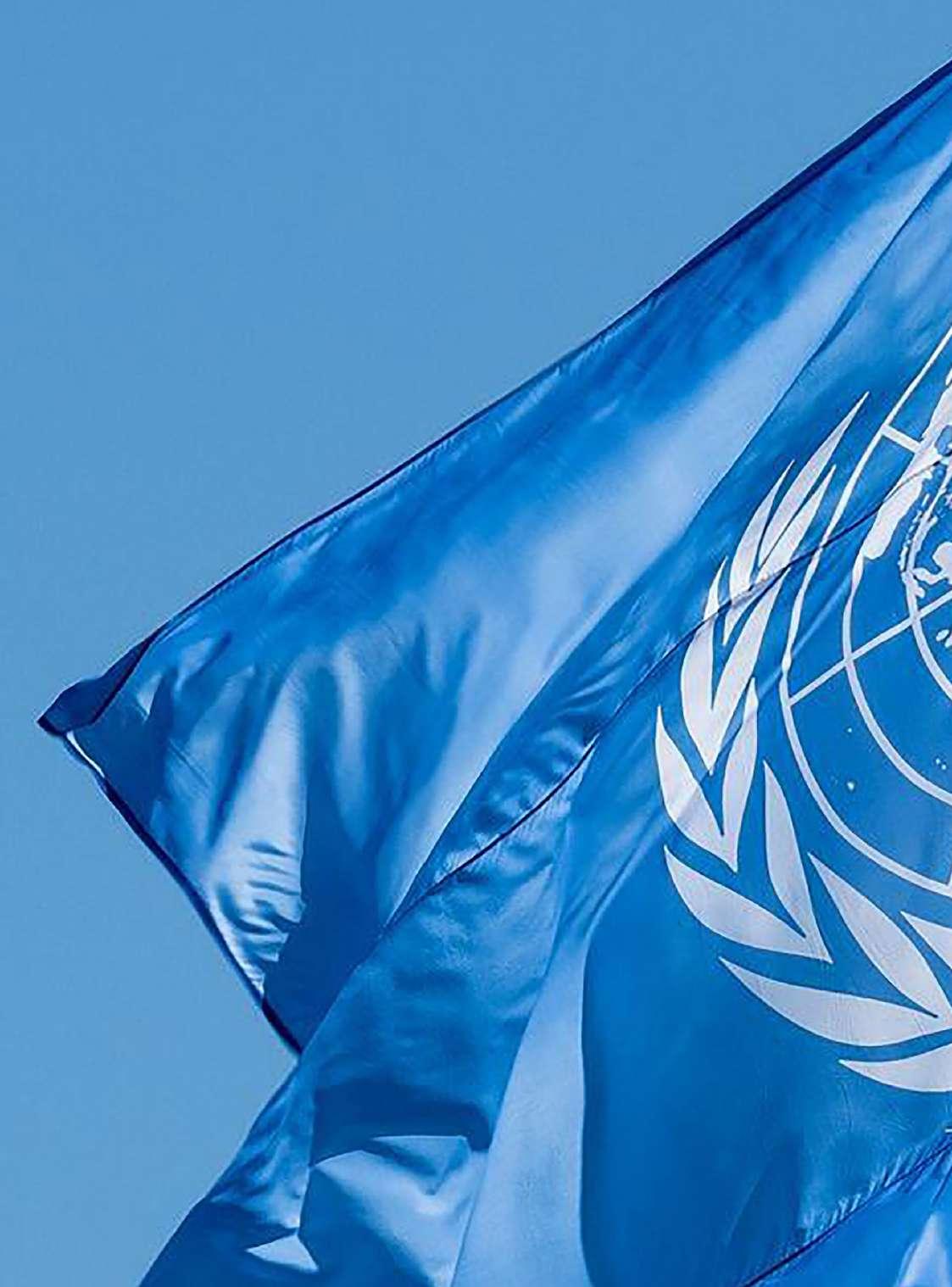
In 2020 the GPIC President at the UNGC Private Sector Forum demonstrated support for the United Nations and inclusive multilateralism by signing onto the powerful Statement from Business Leaders for Renewed Global Cooperation.
- Letter of commitment from GPIC’s president
Criterion 20: The COP describes Board adoption and oversight
The Board is aware of our long-term Sustainability goals and the Annual sustainability goals and these are one of the inputs while approving the capital expenditure projects. Our Sustainability report is also approved by the Chairman, MD and the President.
- GPIC long term and annual corporate goals
Criterion 21: The COP describes stakeholder engagement
In 2015/2016 we embarked on our most extensive stakeholder engagement process to date and invited them to highlight material issues from a broad list that included all aspects that highlighted on the UNGC’s spectrum. In 2019 & 2021 we carried out a high-level review of our material issues by engaging with more than 100 internal and external stakeholders.
- GPIC GRI Sustainability Report 2020 https://www.gpic. com/responcibility/ SustainabilityReport/ and GPIC GRI SR 20202021
CORPORATE SUSTAINABILITY GOVERNANCE AND LEADERSHIP GC SCOPE OR PRINCIPLE CRITERIA FOR GC ADVANCED LEVEL GPIC APPROACH WHERE TO FIND OUT MORE REFERENCE TO GRI DISCLOSURES
GPIC Sustainability Report 20202021 160
This year marks the 10th anniversary of GPIC’s commitment to the United Nations Global Compact (UNGC). While much has changed in the world and in our Company over the past several years, our commitment to the UNGC’s Ten Principles remain firm
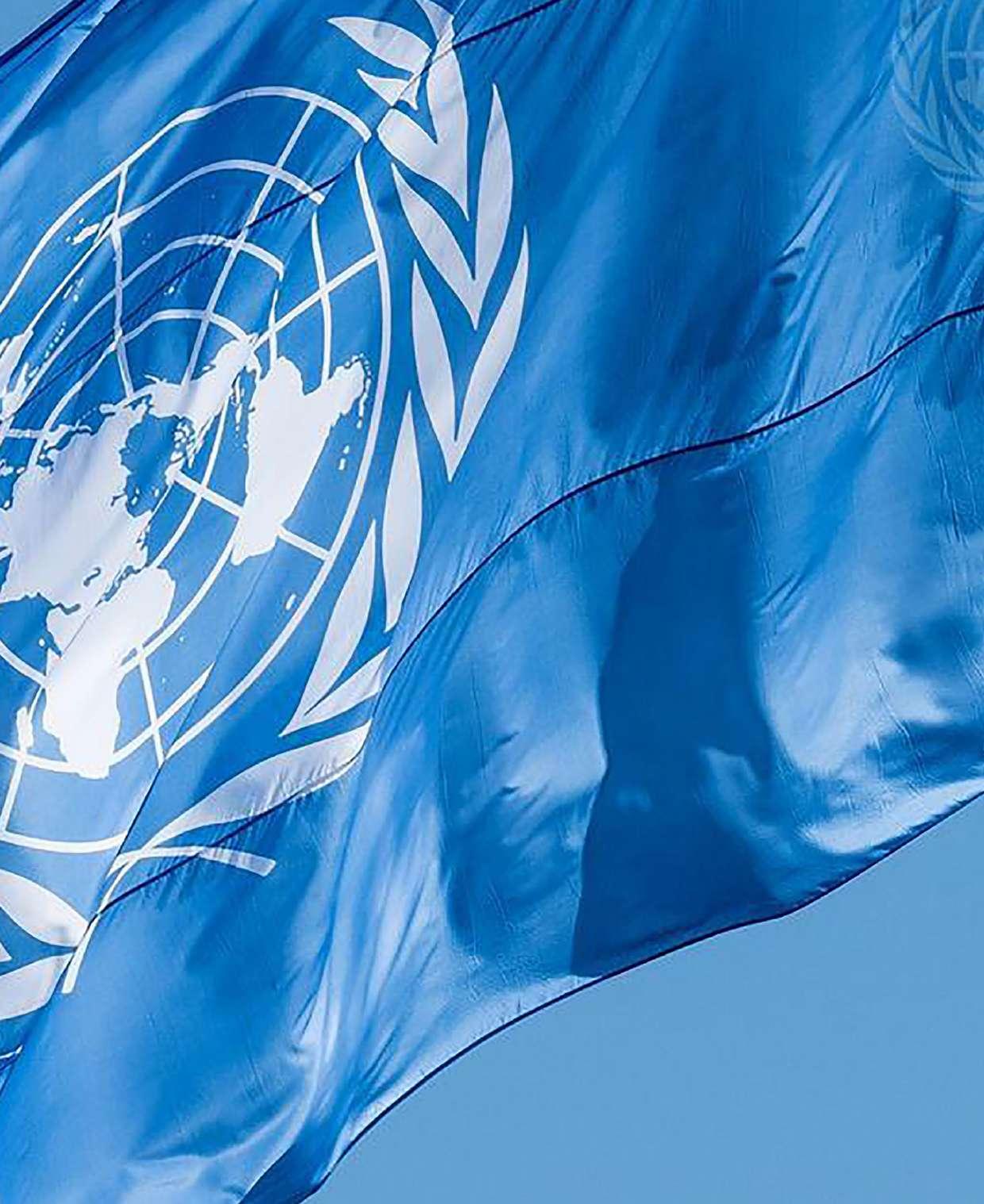
GPIC Sustainability Report 20202021 161
UNGC Food and AgricultureBusiness [FAB 6] Principles

GPIC Sustainability Report 20202021 162

GPIC Sustainability Report 20202021 163
Food and Agriculture Business Principles
Food and Agriculture Business Principles

AIM FOR FOOD SECURITY, HEALTH AND NUTRITION
Businesses should support food and agriculture systems that optimize production and minimize wastage, to provide nutrition and promote health for every person on the planet.
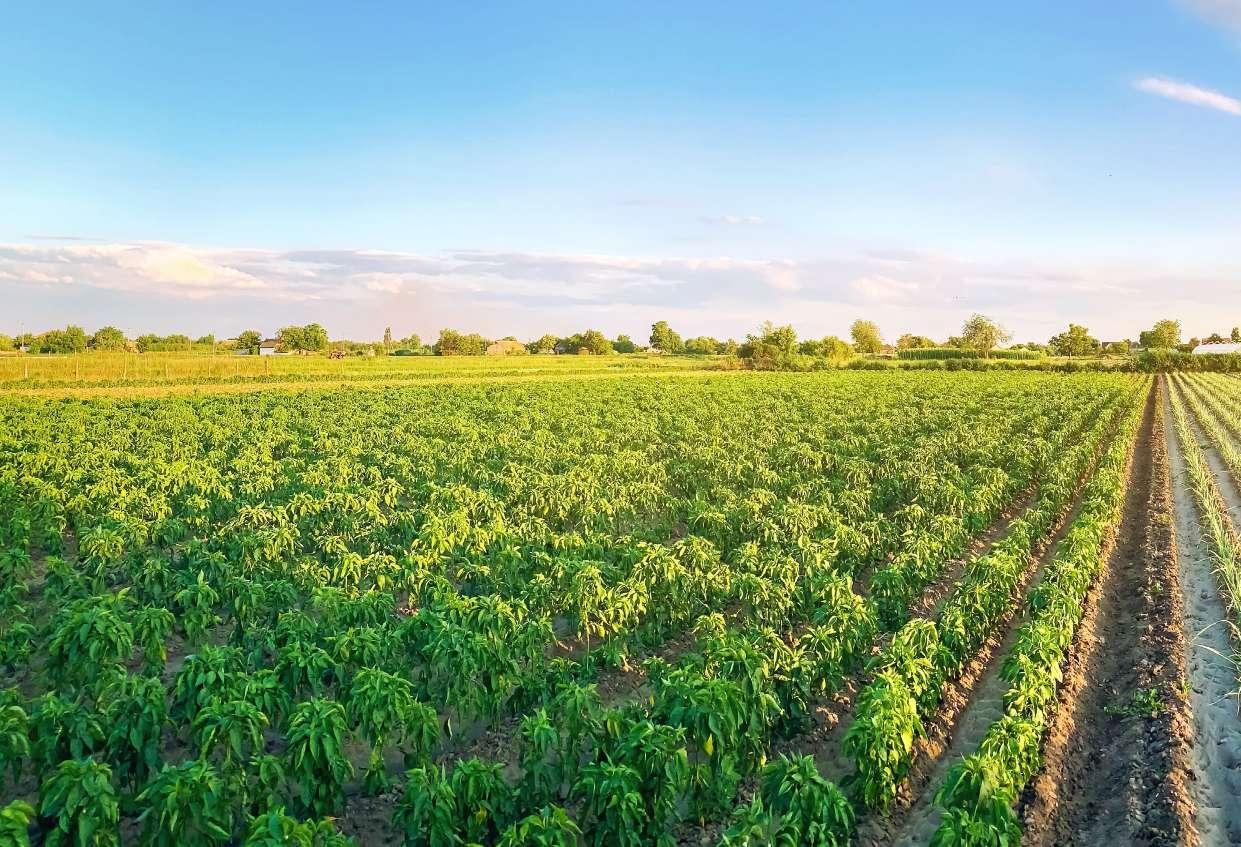
BE ENVIRONMENTALLY RESPONSIBLE
Businesses should support sustainable intensification of food systems to meet global needs by managing agriculture, livestock, fisheries and forestry responsibly. They should protect and enhance the environment and use natural resources efficiently and optimally.
ENSURE ECONOMIC VIABILITY AND SHARE VALUE
Businesses should create, deliver and share value across the entire food and agriculture chain from farmers to consumers.
RESPECT HUMAN RIGHTS, CREATE DECENT WORK AND HELP COMMUNITIES TO THRIVE
Businesses should respect the rights of farmers, workers and consumers. They should improve livelihoods, promote and provide equal opportunities, so communities are attractive to live, work and invest in.
ENCOURAGE GOOD GOVERNANCE AND ACCOUNTABILITY
Businesses should behave legally and responsibly by respecting land and natural resource rights, avoiding corruption, being transparent about activities and recognizing their impacts.
PROMOTE ACCESS AND TRANSFER OF KNOWLEDGE, SKILLS AND TECHNOLOGY
Businesses should promote access to information, knowledge and skills for more sustainable food and agriculture systems. They should invest in developing capacities of smallholders and small - and medium - sized enterprises (SMEs), as well as more effective practices and new technologies.
GPIC Sustainability Report 20202021 164
Reporting on the UNGC FAB Principles
As part of our commitment towards sustainability, we at GPIC have embarked on various initiatives in the field of sustainable agriculture. Globally, GPIC is actively involved with the International Fertilizer Association and Arab Fertilizer Association. Locally, GPIC is a partner of the National Initiative for Agriculture Development, a local non-profit focused on promoting sustainable agriculture through training, financing and capacity building. In 2015, we established an internal Agriculture Committee to further promote activities and awareness on the topic, particularly amongst employees, whilst overseeing external projects. In 2016 the committee’s name has been changed to Agri-nutrient committee, having the same objectives, however focusing on raising awareness to increase crop yield and nutrient content.
By producing and exporting fertilizers worldwide and participating in several platforms globally to develop the agriculture sector and improving the food security GPIC is directly contributing towards UN SDG #2 Zero Hunger.

(Please refer to our section on SDGs for further details)
GPIC contribution towards SDG #2
GPIC produced more than 15 million tons of granular urea since 1998 and exported globally. Moreover GPIC is engaged with global and regional fertilizer organizations such as International Fertilizer Association( IFA) and Arab Fertilizer Association (AFA) for knowledge sharing and capacity building to further enhance the agri-nutrient sector and address food security.
Zero Hunger: WHY IT MATTERS
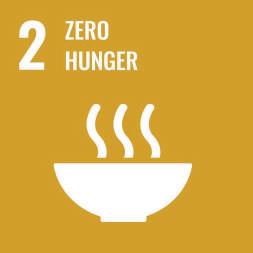

What’s the goal here?
To end hunger, achieve food security and improved nutrition and promote sustainable agriculture.
Why?
Extreme hunger and malnutrition remains a barrier to sustainable development and creates a trap from which people cannot easily escape. Hunger and malnutrition mean less productive individuals, who are more prone to disease and thus often unable to earn more and improve their livelihoods. There are nearely 800 million people who suffer from hunger worldwide, the vast majority in developing countries.
GPIC Sustainability Report 20202021 165
Food and Agriculture Business Principles

Principle 1 – Aim for Food Security, Health and Nutrition
Businesses should support food and agriculture systems that optimize production and minimize wastage, to provide nutrition and promote health for every person on the planet.
Partnerships
At an industry level, GPIC is a prominent member and one of the pioneers of Gulf Petrochemicals and Chemicals Association (GPCA) and a Champion Practitioner of the Responsible Care RC-14001 Standard. GPIC is also an active member of international safety organizations such as NSC-USA, RoSPAUK, Nebosh-UK; Global Fertilizer Associations such as IFA and regional organizations such as AFA. In 2020-2021, GPIC took an active part in regional and global forums such as the GPCA Agri-nutrient conference, IFA Global Sustainability Summit, and the COP 26 at Glasgow. Our leadership shared their insights and thoughts through fireside chats and focused interviews on the role of the Fertilizer Industry post the Covid-19 pandemic.
GPIC’s leadership is keenly involved in promoting sustainable development and agriculture on both a local and global level. GPIC’s former President has served as the International Fertilizer Association’s (IFA) Chairman in addition to holding the roles of the Chairman and President of the Arab Fertilizer Association (AFA) and the Chairman of the Responsible Care Committee of the Gulf Petrochemicals and Chemicals Association (GPCA). He was also involved by invitation from the UNEP with the Geo 6 High-Level Intergovernmental Groups and Stakeholder Group. In Bahrain, he is a member of the Supreme Consultative Council of the National Initiative for the Development of the Agricultural Sector. GPIC has ongoing organizational involvement in the working groups within the associations such as the IFA Communications and the Public Affairs working group and the AFA Communications and Media working group.
GPIC has been the proud recipient of the Arab Corporate Social Responsibility Award for the year 2021 for the 7th consecutive year in the large companies category and the partnerships and collaborations category for our commitment and role towards Corporate Social Responsibility; as well as our adoption of social and environmental initiatives, which are considered as one of our top priorities. This award is the result of significant appreciation for our efforts, investment and organizational commitment in the field of sustainability.
In 2021, GPCA launched the Fertilizer Advocacy Campaign to bridge the gap and raise awareness about Agri-Nutrients and

its role in contributing towards attaining food security around the world. The aim of the campaign is to actively advocate and create awareness at the consumer level by highlighting its importance in feeding the global population and for nations to achieve sustainable food security. GPIC’s team has contributed towards the campaign through formulating the strategy, the topics and the outreach with the relevant media outlets and other relevant stakeholders to ensure effective communication on the role of the industry within the marketplace and community.
Supporting local Farming
GPIC sponsors the annual Farmer’s Market in Bahrain. The farmer’s market is a empowering initiative that hosts a number of local farmers and agriculturists in a large market setup which spans across a period of 5 months in a year. Typically, most of the fruits and vegetables available in commercial outlets like supermarkets and hypermarkets are imported from different countries. The Bahrain Farmer’s Market is an opportunity for the community to gain access to locally produced fruits and vegetables directly from the farmers and producers within the Kingdom. This is one of the main reasons for GPIC to sponsor the Farmer’s Market over the past many years to be able to raise awareness about local produce, while also creating a platform that will connect the producers to the consumers.
In 1992, GPIC launched the ‘Charity garden’ covering 1,500m2 of fertile land located within our facility. The aim of the garden is to grown indigenous fruits and vegetables and providing the produce directly to low-income Bahraini households within the community.
In, 2015 GPIC launched a project in partnership with the UNEP Green wave for the Biodiversity program, through which the company is planting local trees in 10 schools per year in order to promote green spaces and biodiversity, and encourage environmentalism amongst the younger generation. In 2016, we took the initiative to increase the number of participating schools within the program by planting local trees across 20 school campuses. A total of 800 saplings were distributed to 20 schools for the academic year 2018/2019 and the same quantity was repeated for the academic year 2019/2020. Each school was provided with 40 saplings of four specific types, i.e., lime, fig, pomegranate
GPIC Sustainability Report 20202021 166
and almond trees. Since the launch of the Green Wave initiative in 2015, GPIC has contributed over 3,600 saplings to over 90 schools across the Kingdom of Bahrain. In 2020, we also donated 50 saplings to the Muharraq Social Welfare center in Bahrain.
One of the objectives of the campaign was also to provide the students with the practical skills required to effectively plant trees, as we paired the students with our experienced employees during the initiative. However, the campaign was unfortunately put on hold for the academic year 2020/2021 due to the precautionary measures to ensure the safety of our employees and the students due to the COVID-19 pandemic.
Access to nutritious food
Our employees and contractors have access to the exclusive ‘GPIC canteen, where we provide variety of nutritious food options like salads, fresh fruits and juices and local fish at subsidized rates. The company also provide healthy meals based on the nutrition and calorie content of meals for employees to help raise awareness towards healthy eating habits. During our last maintenance turnaround in 2018, over 4000 external contractors worked onsite in our premises, during which GPIC provided them with a bag of fresh fruits and juices every morning to promote the access to nutritious sources of food for low-income workers.
In 2016, GPIC launched the FAO’s International Year of Pulses campaign, for which a pulse-based menu was introduced, replacing the conventional menu once a month to promote viable meat alternatives resulting in healthier people and a healthier planet. Furthermore, our agri-nutrient committee have issued an informative booklet on local trees and the various health benefits they provide to help raise awareness amongst our employees and the community we are operating in.
Principle 2 – Be Environmentally Responsible Businesses
should support sustainable intensification of food systems to meet global needs by managing agriculture, livestock, fisheries and forestry responsibly. They should protect and enhance the environment and use natural resources efficiently and optimally.

Preserving local species and biodiversity
In 1996, GPIC commissioned a fish farm located within the facility at the sea water outfall of the farm which was further expanded in 2012. The fish farm nurtures the local ‘sea bream’ fish which was released into local waters as over fishing had led to a diminishing population of the fish in Bahrain waters. We released over 80,000 fish into the sea with the aim to increase fish stock and availability in our local markets. The initiative also included the planting of mangroves in the areas surrounding the bird sanctuary and the fish farm which helps in sustaining the bio-diversity and the ecosystem within the area..
Local herbs and plants have been used for many years by locals in many traditional medical applications and even beauty products. However, due to the modernization of medical practices, cosmetics’ production and even overall urbanization the existence and availability of those herbs and plants are threatened. GPIC has dedicated 2 gardens (a total of 1,200 square meter of land) within the facility to preserve and revive local herbs, medicinal plants and aromatic plants. The garden is dedicated to the honor of HH Shaikha Sabika bint Ebrahim Al Khalifa. GPIC is committed towards preserving and nurturing local indigenous species and increasing the green cover around the complex. In 2019, GPIC established the Neem tree garden preserving over 150 trees. Furthermore, in 2021 the collaboration between the Supreme Council for Environment (SCE) and GPIC led to the planting of 1,000 mangrove trees within our complex next to our bird sanctuary.
Bird Sanctuary
The Bird Sanctuary established by GPIC in 2001 is a real demonstration of how Nature and Technology can co-exist. The bird Sanctuary is maintained within our facility, with more than 70 Species of migratory birds visiting the sanctuary on an annual basis. Moreover, we have published a booklet highlighting all the various species of birds that can be spotted at the sanctuary. The booklet is periodically distributed to our employees and within the community to raise awareness regarding the various species and their characteristics, and specifically focusing on the endangered species.
GPIC Sustainability Report 20202021 167
Food and Agriculture Business Principles


Environmental Protection
GPIC is a pioneer in environmental protection and is a key consideration in all our decision making as a part of our core operations. We monitor and manage the environmental impacts of our facility through the development and implementation of our Environment and Responsible Care Management System and the IFA Protect and Sustain Product Stewardship certifications. We have also adopted the ISO 50001 Energy Management system in 2015/2016 and we have created an Energy management committee to investigate potential opportunities to reduce energy consumption and promote energy efficiency within the company’s operations.
In addition, environmental assessment and approval is conducted for all modifications and new constructions within the facility to ensure no environmental degradation takes place and that we are also in compliance with the environmental legislation. As part of the National communication in line with the Paris Agreement, we have been reporting our GHG inventory based on the IPCC guidelines since 2016, to strengthen our sustainability targets, manage our climate change risks and identify new opportunities.
In 2018, GPIC won the International Fertilizer Association SHE Excellence gold medal for excellence in health, safety and environmental conservation, for being one of the region’s largest fertilizer producers working to establish a culture of clean industry and safe working environment.
We participate in benchmarking surveys related to Safety, Energy and Environment on regular basis, with the most notable one being the IFA benchmarking surveys. In 2020, during IFA Annual General Meeting, GPIC was recognized as the “Industry Stewardship Champion” for our outstanding achievements in product stewardship. This Industry Stewardship Champion Label is attributed to fertilizer companies that have participated in all of IFA’s most recent safety performance, environmental performance, energy efficiency and CO2 emissions benchmarks and that are certified under the IFA protect and sustain banner.
Principle
Share Value
Maintaining GPIC compliance with Level – 1 (Gold Status) by the Department of Agriculture, Water and the EnvironmentAustralia and associated accreditation means that GPIC has the best low-risk facility for the production, storage and export of granular urea, which in turn provides an added value to all GPIC Urea customers around the world. This accreditation specifies stringent guidelines that ensure the GPIC product is fully controlled from the source until it reaches the end user and is adequately protected from any objectionable contaminants and pollutants.
The extract from the latest inspection report 2021 states quote “ The above facility has been assessed as meeting the requirements for Level One Gold system status as set out in the department’s Imported Inorganic Bulk Cargo Fertilizer Assessment and Management Policy.
The above facility has demonstrated its commitment to ensuring the bio-security integrity of their fertilizer product across the supply chain, from manufacture to loading. This commitment has been achieved through recognized management strategies, supporting continuing compliance with the department’s import requirements, as confirmed through the Desk Audit of 20 May 2021
This status will be maintained until 20 May 2027 subject to a satisfactory result in annual third party audits”
Department of Agriculture, Water and the Environment, Australian Government.
Agriculture Awareness
At GPIC we produce Urea which is exported and used by farmers as fertilizer all around the world. However, we do not have direct contact with the consumers and farmers, and therefore GPIC has published and issued “The Urea Guideline” book which is distributed to farmers to help educated them on the safe handling of urea and for best utilization and results with their Crops. In 2020 GPIC has issued an updated version of the book with guidelines and techniques that could be adapted by farmers for better agriculture.
GPIC is committed towards raising awareness and knowledge among the younger generation in relation to the local herbs, plants and biodiversity. This is achieved by distributing educational activity books addressing the “Glueberry”, a local fruit. A total of 4,000 copies was produced and distributed at the Bahrain Garden show. Hundreds of copies were also sent to “The National Initiative of Agricultural Development (NIAD) to distribute among children in schools and a local children’s hospital.
Product Quality along the supply chain
At GPIC we ensure quality control is embedded right from the point of production, storage and all the way to the export of the urea product by following strict guidelines and an effective audit system. Our efforts and commitments towards providing high quality uncontaminated fertilizer was recognized by the Australian Department of Agriculture, and we were the proud recipient of the Level 1 Gold status accreditation for our bulk fertilizer shipments.
GPIC Sustainability Report 20202021 168
3 – Ensure Economic Viability and
Businesses should create, deliver and share value across the entire food and agriculture chain from farmers to consumers.
Principle 4 – Respect Human Rights, Create Decent Work and Help Communities to Thrive
Businesses should respect the rights of farmers, workers and consumers. They should improve livelihoods, promote and provide equal opportunities, so communities are attractive to live, work and invest in.

Employee opportunities towards agriculture
In 2015, GPIC won the HR Management Award at the 2nd Gulf Cooperative Council (GCC) Forum for HR Development in addition to the HRH Shaikha Sabeeka bint Ebrahim Al Khalifa award for Empowerment of Bahraini Women. As a significant contributor to the local economy and community, our workforce primarily includes people from the local indigenous communities and with a growing focus towards women within the workforce. Over the past years, we invited women entrepreneurs in the field of Agriculture and local farmers to educate our employees about farming techniques, local plants and plants that best suits the climate and soil in Bahrain.
Even though our employees are not directly working in the agriculture sector we believe in investing in our people to enhance their knowledge towards sustainable agriculture through workshops, conferences and formal training courses. We aim to enhance their knowledge towards the products we are producing and how they are utilized by end consumers and the value the company creates within the agriculture sector and for farmers/ producers. We engage our employees in the AFA meetings and the associated activities as their engagement is important for the company to take part in important discussions towards supporting the Arab fertilizer industry. In 2020, due to the COVID-19 pandemic it was not conducive for our employees to attend public ‘in-person’ conferences and workshops. However, due to our strong partnership with the IFA our employees were able to register themselves on the webinars organized by IFA in the field of food and agriculture. Our efforts towards enhancing our employees knowledge towards food and agriculture has been recognized during the 26th AFA Annual Forum held in 2020 in which one of our young employees participated and won a grand prize in the forum’s gold seat competition amongst 360 other international participants. Furthermore, GPIC has formed an Agri-nutrient committee,
the members of which are actively engaged in sharing information and newsletters on a regular basis covering topics including seasonal agriculture and home agriculture tips to increase awareness and encourage further interest in the subject. The committee also manages a database of agriculture related resources for reference and specific plants to host awareness sessions internally in order to develop the capacity and capability of employees to participate in that has contributed towards national food security.
As part of the company’s social responsibility, to enhance employee’s engagement in environmental protection and their interest towards increasing the greenery in the Kingdom of Bahrain; GPIC hosted the Best Home Garden competition in 2021, and invited all our employees to participate. The employee gardens were evaluated based on the design and overall coordination of the garden, agricultural techniques, irrigation systems used, diversity of plants and number of indigenous local trees and overall aesthetic view of the garden.
Supporting Farmers
GPIC does not work with farmers directly however we are committed towards supporting their needs. We tend to achieve that by our active participation in the IFA, AFA and their relevant working groups, and locally via the partnership with the National Institute for Agriculture Development. Our marketing committee regularly requests for feedback from our customers and have conducted field visits, including a visit to Brazil in 2014 where GPIC participated in the FMB Fertilizer Latin America Conference to learn and understand more about the critical market needs. GPIC provides urea fertilizer to the Ministry of Works, Municipality Affairs and Urban Planning on an annual basis to support local farmers and increase the green fields across the Kingdom of Bahrain.
On a regular basis GPIC provides over 50 tonnes of urea to support the Bahraini farmers via an annual initiative. The initiative is aimed at supporting the National initiative for the development of the agricultural sector, patronized by Her Royal Highness Princess Sabeeka bint Ibrahim Al Khalifa. The initiative contributes towards promoting a green culture and bringing out the importance of the agricultural sector in achieving sustainable development in the Kingdom. In 2020, 10 tonnes of urea was donated to the Ministry of Agriculture and 20 tonnes to the Al Areen wildlife park and reserve respectively. Furthermore, recycled urea generated within our facility has been donated to the Municipalities Affairs, and Hoorat Aali. Domestic subsidized Urea sales in support of the local farmers for GPIC in 2020 and 2021 addesd up to 987 tonnes and 691 tonnes respectively.
GPIC Sustainability Report 20202021 169
Food and Agriculture Business Principles

Principle 5 – Encourage Good Governance and Accountability
Businesses should behave legally and responsibly by respecting land and natural resource rights, avoiding corruption, being transparent about activities and recognizing their impacts.
Sustainability Reporting
In addition to managing our environmental impacts and taking steps to reduce our energy consumption, we publicly document our activities through our biennial sustainability reports and have so far published six reports since our initiation in 2012. Our last report in compliance with the GRI Standards was issued in March 2020 and the current report SR 2020 -2021 is also based on the GRI Standards under the theme “Resilient - Adaptive - Agile ”. In 2014, GPIC became an organizational stakeholder with the Global Reporting Initiative in order to further promote sustainability and transparency globally.
Engagement with Policy Makers
In recognition of the interdependence of resources and the environment since 2015, we have been actively engaged, as a stakeholder, with the National Oil and Gas Authority, in dialogue and upcoming workshops on Bahrain’s Intended Nationally Determined Contributions towards the climate change negotiations at COP 21. GPIC Engineers were part of the Bahrain’s delegation attending the COP 26 forum in Glasgow.
We were also engaged with the Supreme Council for Environment in the process of updating the National Biodiversity Strategy and Action Plan, and the National Implementation Plan for the PCBs in relation to the Stockholm Convention. Additionally, our Leadership is representing GPIC on several policy making platforms at a local, regional and international level; including the National Initiative for Human rights, IFA, AFA, NSC, RoSPA, GPCA and many more.
In 2020, the National and Gas Authority (NOGA) formed the NOGA joint solar project committee where all representatives from the relevant industries and sectors are members including GPIC. The committee works with the aim to achieve a collaborative Solar project among the key players within the energy and petrochemical sector. In 2020 NOGA launched a Water Resource Management (WRM) unit and GPIC have nominated a team to support this unit to support the implementation of a system at a national level and specifically for the energy and petrochemical sector on water management including conducting water audits and defining the potential use of treated water. GPIC is in engagement with NOGA to establish an appropriate GRI reporting system for all NOGA companies given our hands on experience in developing our sustainability report in compliance with GRI standards since 2012.
Environmental compliance
We ensure environmental compliance is adhered to throughout the complex through regular monitoring and management of our emissions and effluents. Moreover, we also report our emissions and effluents to the Supreme Council for Environment on a quarterly basis in their presence. We report annually to the Supreme Council for Environment on our chemical consumption and waste generated. In 2020, through our commitment towards recycling, we were able to achieve ‘zero’ hazardous waste to the landfill.
Principle 6 – Promote Access and Transfer of Knowledge, Skills and Technology
Businesses should promote access to information, knowledge and skills for more sustainable food and agricultural systems. They should invest in developing capacities of smallholders and small- and medium-sized enterprises (SMEs), as well as more effective practices and new technologies.

Knowledge sharing with the community and farmers
As highlighted earlier, GPIC produces and distributes booklets on the guidelines for optimal use of urea per crop, to buyers prior to the execution of each sale. The booklet includes general information on the soil health, fertilizers and farming best practices.
Annually GPIC takes part in the Bahrain International Garden
Show which is open for the community, where we share home agriculture tips and seasonal agriculture best practices with the visitors. Based on the theme each year, we share books with the community covering topics such as food, safety and human health to support the environment and encourage them to increase green areas across the Kingdom.
Knowledge sharing with the employees
GPIC Sustainability Report 20202021 170
GPIC has formed their agri-nutrient committee specifically to raise awareness amongst our employee and the community in relation to agriculture. The committee has been actively involved in sharing tips and newsletters providing our stakeholders with guidance on better farming and agriculture practices, which in turn has also help in raising our employee engagement. The committee also manages a database of agriculture related resources for reference, and plans to host awareness sessions internally in order to develop the capacity and capability of employees to participate in food growing that contributes towards national food security. Employees can also share their own knowledge and suggestions via GPIC’s suggestion scheme, in which the Agriculture Committee plans to designate a specific section for agricultural suggestions. In 2020, our employees have virtually attended the Emirates Environmental Group’s 2nd panel discussion - “Feeding a Thirsty World: Food and Water Security”. This helped our employees understand the risks
we face due to living in an arid region in alignment with our needs for drinking water and water resources for irrigation. Additionally, our employees were given the opportunity to access the IFA webinars addressing relevant topics about fertilizers, agriculture and food security.


Promoting Research
In order to promote more informed agricultural practices, we are planning to sponsor a research study on soil types across the country including what kinds of crops are suitable for each area. GPIC has also been a sponsor for the annual Environmental Research Program hosted by schools in Bahrain since 2004. The program also covers sponsorship for 20 research programs and the ensuing awards to the top three ideas. Among this year’s participants, some projects in the field of agriculture included irrigation control via smart phones and irrigation through controlled water release.
GPIC Sustainability Report 20202021 171
UNGC Women’s EmpowermentPrinciples [WEPs]

GPIC Sustainability Report 20202021 172

GPIC Sustainability Report 20202021 173
UNGC Women’s Empowerment Principles
GPIC contribution towards SDG# 5 is highlighted through its organizational policies and actions related to gender equality; this is further enhanced by the organization’s commitment
towards the 7 principles of the UNGC’s - Women’s Empowerment Principles (WEPs)
GPIC contribution towards SDG 5
- First female HR &Corporate Communications manager at GPIC
- First female Labour union member at GPIC
- Women are represented in training, events, committees, audits, etc.
- Equal opportunities council includes equal remuneration and promotion of women in the workplace
- GPIC committed to UN Global Compact Women’s Empowerment Principles WEPs in 2014
- GPIC’s Human Resources and Corporate Communications Manager is amongst the most influential women in the Arab world and the Middle East for 2021, according to CEO Middle East Magazine
Gender Equility: WHY IT MATTERS

What’s the goal here?
To achieve gender equality and empower all women and girls.
Why?
Women and girls represent half of the world’s popu¬lation and therefore also half of its potential. But, today gender inequality persists everywhere and stagnates social progress.
Women continue to be underrepresented at all levels of political leader¬ship. Across the globe, women and girls perform a disproportionate share of unpaid domestic work.
Inequalities faced by girls can begin right at birth and follow them all their lives. In some countries, girls are deprived of access to health care or proper nutrition, leading to a higher mortality rate.
GPIC Sustainability Report 20202021 174

GPIC Sustainability Report 20202021 175
UNGC Women’s Empowerment Principles
GPIC aims to be a leader in the marketplace through our commitment towards women empowerment strategies by recruiting, nurturing and retaining more women in a range of roles including within top management. We have zerotolerance towards any forms of discrimination and this is documented in our organizational discrimination policy which is championed by our Equal Opportunities Council (the first in the Oil & Gas Industry sector) and is headed by our President. We believe in our people and we know that, by developing the qualifications and professional competencies of the women in our organisation, we will ensure a sustainable future.
GPIC is a signatory to the UN Global Compact’s Women’s Empowerment’s Principles (WEPs) since 2014 and have joined companies that publicly support equal opportunities within the workplace. As a result of our continuous efforts, the company has won the Award for Women’s Empowerment presented by the First Lady Her Royal Highness Princess Sabeeka bint Ibrahim Al Khalifa, twice in 2008 and 2014, which makes GPIC the only company in the region to have won this prestigious award more than once despite competing with companies from a range of sectors and industries.
Further, the dedication and ongoing continuous efforts towards nurturing and empowering women both inside & outside of the company, has earned the honor and recognition for our former President, Dr. Abdulrahman Jawahery as the Bahraini Women Empowerment Personality of the Year from the First Lady and the President of Supreme Council for Women (SCW); the only award presented to any individual.
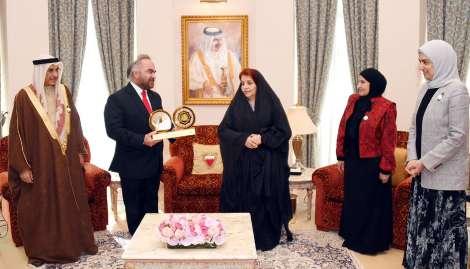
Women in GPIC have reached the senior executive level and are flourishing within their careers. Various international & regional awards have also been presented to our women employees including the Women in Leadership Award from the Bilateral US-Arab Chamber of Commerce; Procurement Hero Award 2020 from the Middle East Procurement Conference; Women’s Award in Industry and Assets Management from the Gulf Society for Maintenance and Reliability (GSMR); and the Rising Star Award from the Gulf Petrochemicals and Chemicals Association (GPCA). In addition, we are focused on recruiting women with unique competencies and expertise, and in turn they have received the recognition of Her Royal Highness Princess Sabeeka bint Ibrahim Al Khalifa.
We strive to engage our women employees in ongoing professional training to develop them professionally in line with some of the challenging situations that the industry faces which will prepare them as future leaders within the manufacturing industry. Our efforts are reflected through the performance of our women employees and their engagement even in a number of international awards. Our female engineer was honored as the young ADEPEC Engineer for 2018 after competing with 488 engineers from 172 companies in 32 countries.
In 2019, a female employee became a member of the GPIC Labour Union Board Members, making her the first woman to lead in this position since the inception of the Labour Union committee.
GPIC’s Human Resources and Corporate Communications Manager is amongst the most influential women in the Arab world and the Middle East for 2021, according to CEO Middle East Magazine.
GPIC’s empowerment strategy and initiatives are encouraging our people to increase engagement in the business. Through our formal communication channels and committees, our employees are encouraged to work with and influence our business goals as well as their personal and professional development objectives. Participation in our internal topical committees has encouraged greater autonomy in decisionmaking, has created a positive and engaging culture, and has resulted in the overall de-layering process and has thereby helped us in creating an inclusive organisation.
In 2014, our former President Dr. Jawahery signed the CEO Statement of Support to the Women’s Empowerment Principles (WEPs) in order to publicly endorse the principles, including committing to communicate progress towards the principles using gender-specific data as illustrated below.
An Equal Opportunities Committee within the company was established in 2013 as a result of an ongoing partnership with the Supreme Council for Women in the Kingdom of Bahrain. This committee is responsible for creating and monitoring equal opportunity procedures, setting goals and targets in alignment with the SCW, coordinating with the SCW regarding community activities and investigating potential discrimination cases. The committee was later elevated to the Equal Opportunities Council in March 2017, with the aim of establishing and maintaining equal opportunities, monitor and manage compliance with the associated rules and regulations, and encouraging their implementation in the company. We also have a Ladies Working Committee which is focused on enhancing the social environment for female employees by organizing events and activities, and coordinating with external organizations for women.
Overall, our company policies are designed and enforced to ensure that there is no discrimination against any of our employees irrespective of grade, role or level within the organization.
Equal opportunity at GPIC begins with the inclusion of women in all departments of the company. The Labour Law in Bahrain has specific restrictions for women in relation to working in shifts as a part of their job, however, there is a representation of women in all our departments where we proactively recruit and appoint them to managerial and executive positions.
In order to assure sufficient participation of women in decisionmaking and governance at all levels and across all business areas, our women employees are appointed on various committees as members, coordinators, and chairpersons such as the Youth Committee
Principle 1 – Leadership Promotes Gender Equality
GPIC Sustainability Report 20202021 176
Principle 2 – Equal Opportunity, Inclusion and Non-discrimination
As we aim to be an equal opportunity employer, we have established a zero-discrimination policy in relation to recruitment, promotion, compensation, and all other HR related aspects. Women have access to the same benefits as their male counterparts, including insurance, loans, and scholarship opportunities for employees’ children. They are members of the Labour Union in which all members receive equal benefits.
All our women have access to the GPIC Club’s fitness facilities and are supported with specific sports’ campaigns. Since GPIC is a supporter of community sports, women are
also encouraged to engage in the sports’ clubs within the community and to participate in competitions, some of which are sponsored by GPIC.
Women are also recognized for their service during award ceremonies, such as Labour Day, Annual Celebrations, and Employee of the Month awards. All employees are honored for completing additional degrees and certifications, winning competitions and other achievements. Some of the award categories include awards for male and female employees separately such as Outstanding Performance and Sports Person of the year.
Female Employees Female Employees (percentage of non-shift workers) Female Employees (percentage of total workers) 2014 50 15% 9% 2015 53 17% 9% 2016 50 19% 10% 2017 48 20% 10% 2018 35 17% 8% 2019 35 17% 8% 2020 32 15% 7% 2021 31 15% 7%
Female Employees
Senior Management Female Employees in Senior Management (percentage) Female Employees in Supervisory Levels Female Employees in Supervisory Levels (percentage) 2014 3 7% 9 7% 2015 3 7% 14 11% 2016 3 7% 10 7% 2017 3 7% 11 9% 2018 3 7% 14 14% 2019 2 7% 14 14% 2020 2 5% 14 14% 2021 2 5% 13 12% Table 2
Management
Supervisory
Female Male 2014 3 9 2015 2 10 2016 3 9 2017 2 10 2018 3 9 2019 3 11 2020 3 9 2021 3 9
Table 1 - Female Employees at GPIC
in
- Females in Senior
and
Levels
GPIC Sustainability Report 20202021 177
Table 3 - Employee of the Month by Gender
UNGC Women’s Empowerment Principles


As per the company policy, all our employees are entitled to free medical treatment at the company’s Medical Centre or any other approved facility which include access to both male and female doctors. The company’s medical insurance policy is designed to cover a majority of all ailments, and for specific ailments/ treatments that are not covered by the insurance policy, all the associated medical costs are borne by the company, including maternity costs.
As per Bahraini law, a female employee is entitled to a maternity leave period on full pay for 60 days. Upon returning, they are eligible for 2 hours maternity care in the first year. To ensure we are providing our employees with support
that goes above and beyond the Bahraini Labour Law, we provide an hour of maternity care period for all our employees until the baby completes its second year of age to enable working mothers to attend to their children’s needs. Our medical center staff are NSC certified in CPR, which includes modifications for pregnant women. The medical staff provide training for both our male and female employees in CPR on a regular basis. Health campaigns specifically targeting female employees include Breast Cancer Awareness and exercise courses led by female instructors. Our women were offered the option to work from home throughout 2020 amidst the COVID-19 pandemic and those coming in to work were facilitated with shortened working hours. Our women were recognized and awarded for their support during the COVID-19 pandemic to support the company with their continued efforts to foster work-life balance despite the challenges posed during the ongoing pandemic.
All our employees have the same access to basic safety training, including general safety awareness and fire extinguisher use. They are required to complete safety e-learning courses, which include an optional course on pregnancy safety at the workplace. All our women who work on site are equipped with the appropriate helmets, safety goggles, gloves, safety shoes and coveralls. Our women engineers are provided with the access to individual company cars to support their commute within the complex particularly during the turnaround (plant maintenance) activities. To ensure the safety and wellbeing of our employees and their families, women at GPIC were given the opportunity to work from home during COVID-19 pandemic. They were provided with all the facilities to make working from home possible and effective.
GPIC have also appointed women in the role of security officers who are available during general working hours to be able to attend to female employees entering and exiting the plant premises.
At GPIC, training and performance reviews are a part of our career development process. We have invest in policies and programmes that open avenues for advancement for women at all levels and across all business areas. The general training program for new graduates is the same for both men and women on the same job title. Our employees also have access to training courses both in Bahrain and abroad. However, the total training hours during the year 2020 and 2021 has significantly reduced due to the Covid-19 pandemic yet it was compensated through incorporating a number of webinars and digital online training.
GPIC has sponsored a number of our young women and men to pursue their postgraduate qualification supporting their future career prospects.
Females Males 2014 13 (26% of total) 37 2015 10 (19% of total) 42 2016 25 (17% of total) 122 2017 8 (8% of total) 91 2018 9 (11% of total) 72 2019 2 (4% of total) 47 2020 10 (83% of total) 12 2021 15 (50% of total) 30
Table 4 - CPR Training for Employees by Gender
Principle 3 – Health, Safety and Freedom from Violence
GPIC Sustainability Report 20202021 178
Principle 4 – Education and Training
Although most of our suppliers are the original manufacturers of our equipment, our bidding process is open to all qualifying suppliers and our selection process is based on objective technical criteria. However, we strive to support and expand our business relationships with women-owned enterprises, including small businesses and women entrepreneurs. We regularly invite health practitioners from women owned businesses to conduct lectures, and work with external female training personnel to conduct trainings. We also sponsor a number of publications launched by women authors. As for our marketing strategies, our products are marketed through our shareholders worldwide based on their technical specifications and do not include any gender based marketing.
suppliers and community leaders to promote inclusion and advance equality.
We recognize that women empowerment in the community has the greatest impact through long-term constructive partnerships. We support Bahrain’s Supreme Council for Women (SCW) by sponsoring the Bahraini Women’s Day celebrations and other activities. GPIC women engineers in collaboration with SCW have visited a number of high school and college students across the country sharing their experience in Science, Technology, Engineering and Math (STEM) wirhin the sector and are encouraging young female students to consider pursuing a career path within the STEM field.
We lead by example and leverage our influence to advocate for gender equality and collaborate with business partners,

The focus of this year’s celebrations is on the Bahraini Women in the Field of Higher Education and Future Sciences, in which our company has made remarkable efforts in encouraging women within the workforce obtaining higher educational degrees and providing them with scholarships. The table below shows that the percentage of women who hold higher degree amongst our employees are double in percentage when compared to their male counterparts.

Female (training hours) Male (training hours) 2014 1186 7750 2015 1401 4662 2016 629 3467 2017 911 4553 2018 1170 7575 2019 1395 7539 2020 91 2624 2021 84 1638
Table 5 - Training Hours Abroad (Outside Bahrain) by Gender
Principle 6 – Community Leadership and Engagement
Principle 5 – Enterprise Development, Supply Chain and Marketing Practices
Females Males 2018 8 (23% of total female) 44 (11% of total male) 2019 8 (22% of total female) 42 (10% of total male) 2020 8 (25% of total female) 44 (11% of total male) 2021 8 (25% of total female) 38 (11% of total male)
GPIC Sustainability Report 20202021 179
Table 6 - Females Higher Education
UNGC Women’s Empowerment Principles

One of our main educational partners in the Kingdom is InJAz Bahrain, an affiliate of the Junior Achievement Worldwide program, a program that equips students with skills that ease their transition into the work environment. We support the program in addition to providing them with volunteers to conduct the courses across schools in Bahrain. Furthermore,
the company offers training chairs for InJAz employees and provides the organization’s beneficiaries with internship opportunities. All employees have the opportunity to volunteer and enhance their leadership skills, and the programs benefits students both girls and boys across the Kingdom.
We also coordinate a host of annual training programs for students in cooperation with the Ministry of Education. The Environmental Lectures’ program which was launched 20 years back, spreads awareness on environmental protection & climate change; and the Environmental Research program which was launched 15 years back, supports high school science projects are run by our employees. During the academic year 2020-2021, environmental lectures and
Green Wave campaign were put on hold due to the COVID-19 pandemic to ensure the safety of both the students and our employees respectively.
With the increasing threats of cyber security attacks, the company has also introduced awareness lectures about the importance of cyber security to school students.
Female Male 2014-2015 37 38 2015-2016 20 24 2016-2017 22 29 2017-2018 21 29 2018-2019 18 43 2019-2020 16 51 2020-2021 One to one virtual sessions due to COVID-19 4 12
Table 7 - GPIC Volunteers with InJaz Program
Table 9 - Environmental Lectures Program – Targeted Schools
Academic Year Female Male Co-ed 2014-2015 9 8 4 2015-2016 9 9 2 2016-2017 11 8 1 2017-2018 10 7 3 2018-2019 11 8 1 2019-2021 10 7 3
Academic Year Female Male Co-ed 2014-2015 10 19 1 2015-2016 23 17 1 2016-2017 26 14 2 2017-2018 12 32 4 2018-2019 24 4 5 2019-2020 7 6 4 2020-2021 Suspended temporarily due to COVID 19
Table 8 - Environmental Research Program – Participating Schools
GPIC Sustainability Report 20202021 180
As a part of the employee benefits the company provides, the scholarship for employees’ children and our recognitions program for honoring high achieving students directly impacts young members within the community. All students who
achieve the minimum academic requirements are awarded equally. Young female students from Bahrain and abroad are also amongst the students accepted to complete their industrial training at GPIC.
Finally, we are the annual sponsors of the Crown Prince’s International Scholarship Program, which supports an equal number of males and female students each year in pursuing their higher studies abroad. We believe that equal access to educational opportunities is the right and that is forms the basis of equal opportunities within the community at large.
As a way forward, we have included a special section in our UNGC CoP Report 2020 and our GPIC GRI sustainability report 2022, to measure, monitor, manage and report on progress in alignment to the 7 principles of UNGC WEPs, using data aggregated by gender.

Academic Year Female Male 2015-2016 5 5 2016-2017 10 10 2017-2018 10 10 2018-2019 10 10 2019-2020 10 10 2020-2021
-19
Suspended temporarily due to COVID
Table 10 - Greenwave Campaign - Targeted Schools
Female Male 2014 63 (29% of total) 156 2015 66 (38% of total) 110 2016 69 (44.8% of total) 85 2017 81 (42% of total) 113 2018 74 (38% of total) 119 2019 93 (75% of total) 124 2020 7 (43% of total) 16 2021 11 (40.7% of total) 27
Table 11 - Industrial Trainees by Gender
GPIC Sustainability Report 20202021 181
Principle 7 – Measure and publicly report on progress to achieve gender equality

LeadingExcellence
GPIC Sustainability Report 20202021 182
Awards 2020-2021

GPIC Sustainability Report 20202021 183
Our Key Achievements
We are humbled to have been honoured and awarded again with several accolades throughout the years 2020 and 2021. We take immense pride in being recognized by such esteemed international and regional organisations worldwide for our diligence and contribution to social development and advancement, responsible care, safety, health and environmental global best practice standards. GPIC has received significant awards and recognition during the last couple of years for its pioneering efforts. Some of our key achievements include:
RoSPA Industry Sector Award for Excellence in Health and Safety
GPIC has been awarded the Chemical Industry Sector Award for outstanding performance in health and safety, demonstrating a robust and high quality safety management system and a continuously improving health and safety performance.
Mohammed bin Rashid Al Maktoum Business and Innovation Awards
GPIC won the prestigious Mohammed bin Rashid Al Maktoum Business Excellence and Business Innovation Awards 2021. The Mohammed bin Rashid Al Maktoum Business Award is dedicated to cultivate a world class business culture in the region with the ultimate goal of creating a high level competitive business environment that fosters trade, business development and job creation, which ultimately contributes to a solid and sustainable growth of the GCC economies.
Mohammed bin Rashid Al Maktoum Business Innovation Award aims at supporting and encouraging companies to focus on innovation excellence and recognizing the success of those who are proven to be leaders in the realm of innovation, and whose outstanding achievements in innovation contribute to the development of their economies and serve as an inspiration for all the like-minded companies.
Arabia Corporate Social Responsibility Award
GPIC won the 13th and 14 th cycle of the Arabia CSR Awards in both the large category and the partnerships and collaboration category from the Arabia CSR Network. The award was presented to highlight GPIC’s efforts in the
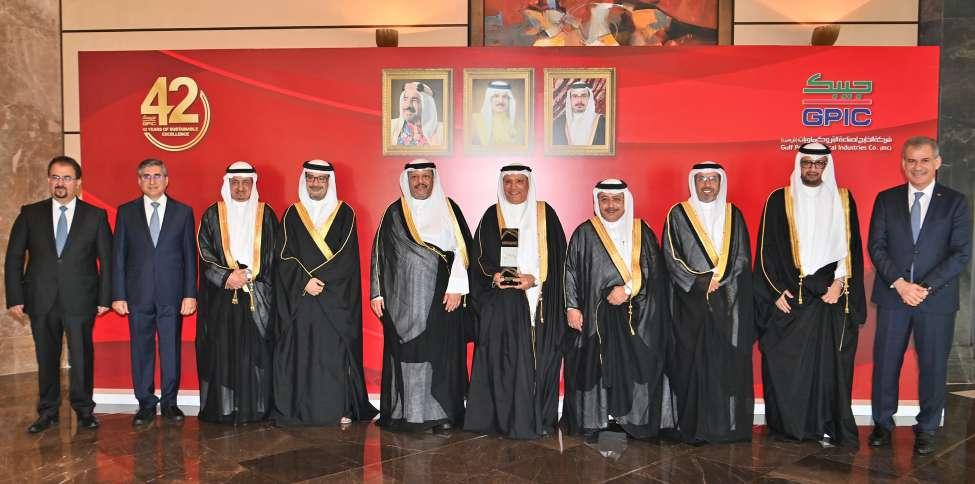
GPIC Sustainability Report 20202021 184
field of social and environmental activities and sustainable development and for its attention towards its social role and responsibilities that aim to reduce environmental damage resulting from operational processes.
“Arabia CSR Awards” a flagship initiative from Arabia CSR Network was instituted in 2008, it is widely acknowledged for applying the most stringent and comprehensive international standards such as the Ten principles of the UN Global Compact, the GRI Sustainability Reporting Standards and the European Model for Quality Management (EFQM) and the 17 UN SDGs in its application criteria. Coupled with the support
of UNGC, the UNEP and the League of Arab States in its formation years, has helped earn it the prestige of the ‘Green Oscars of the Middle East’, which is indicative of the strength and reach of the Arabia CSR Awards in the Region.
Contract Management Team of the Year Award
GPIC won this award in 2021 during the awards ceremony held at the Middle East Procurement Conference, in the Kingdom of Bahrain. It highlights performance excellence and highly effective systems as part of a strong and sustainable supply chain.
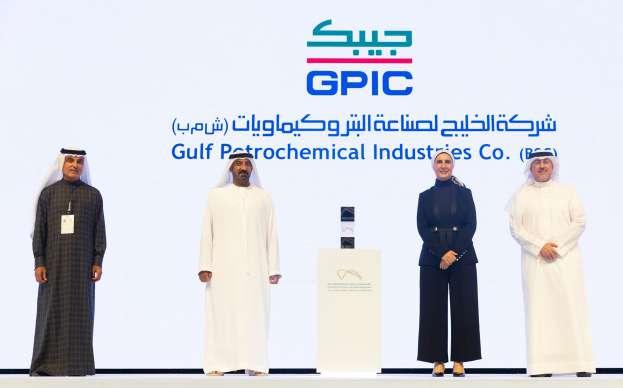
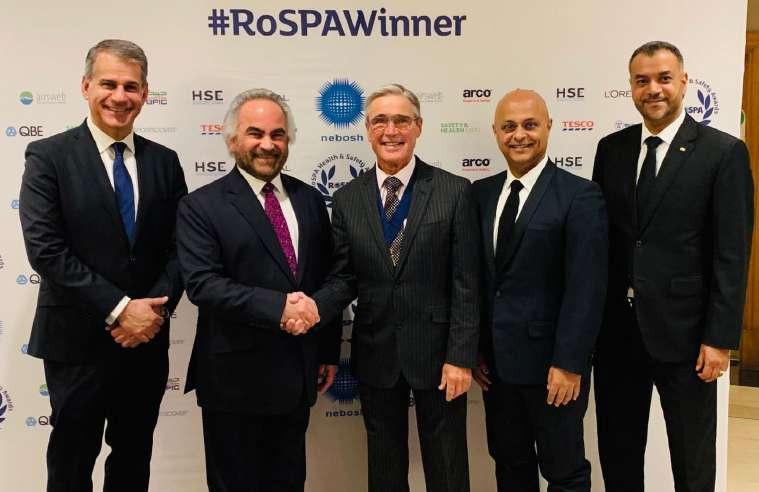
GPIC Sustainability Report 20202021 185
What Others Say

GPIC Sustainability Report 20202021 186

GPIC Sustainability Report 20202021 187
What Others Say
At GPIC, we give paramount importance to the feedback and comments from all of our stakeholders. We believe that this kind of remarkable engagement and networking with our stakeholders enables excellence and sustainability.

It also keeps us well informed of what others think about GPIC and helps us in maintaining excellent international and regional relationships. It motivates us to attain further heights and success.
Marking 42 Years of Our Sustainable Success, we have selected some testimonials that take us back into history, and highlights what others think about GPIC.
“Some 1,300 CEOs from more than 100 countries said as much in September, through a powerful Statement from Business Leaders for Renewed Global Cooperation. “Now is our opportunity,” they asserted, “to learn from our collective experiences, to realign behind the mission of the UN and steer our world onto a more equitable, inclusive and sustainable path.”
Thank you for joining us on that path. Let us forge ahead, united in the business of a better world, to achieve the transformational change we need in 2021 and beyond.”
Sanda Ojiambo CEO & Executive Director of the UN Global Compact
“A clear leadership route has been carved by GPIC with all the proper and necessary strategies, policies, procedures, and tools in place to ensure the continuity of the sustainable journey that it has carved for itself. The application clearly shows that COVID-19 did not deter this forward thinking organisation from forging ahead and continuing to be a trend setter in CSR and Sustainability in the region and beyond.”
Arabia CSR Awards Judging Panel
“ I continue to be impressed by GPIC’s commitment to safety under your leadership; congratulations on your achievements. I would welcome the chance to connect with you and your team in the near future”
Lorraine M. Martin President and CEO National Safety Council
“ I want to share my heartfelt congratulations on being awarded with the Mohammed Rashid bin Al Maktoum Business Excellence Award and the Business Innovation Award for the year 2021. An achievement like this comes as a result of the collective efforts of the entire GPIC team. Your hard work and diligence made this happen and it is your hard work and diligence that ensure GPIC continues to shine and represent Bahrain amongst other international and regional industry leaders “
Mark J. Thomas Group Chief Executive Officer, nogaholding
GPIC Sustainability Report 20202021 188

GPIC Sustainability Report 20202021 189
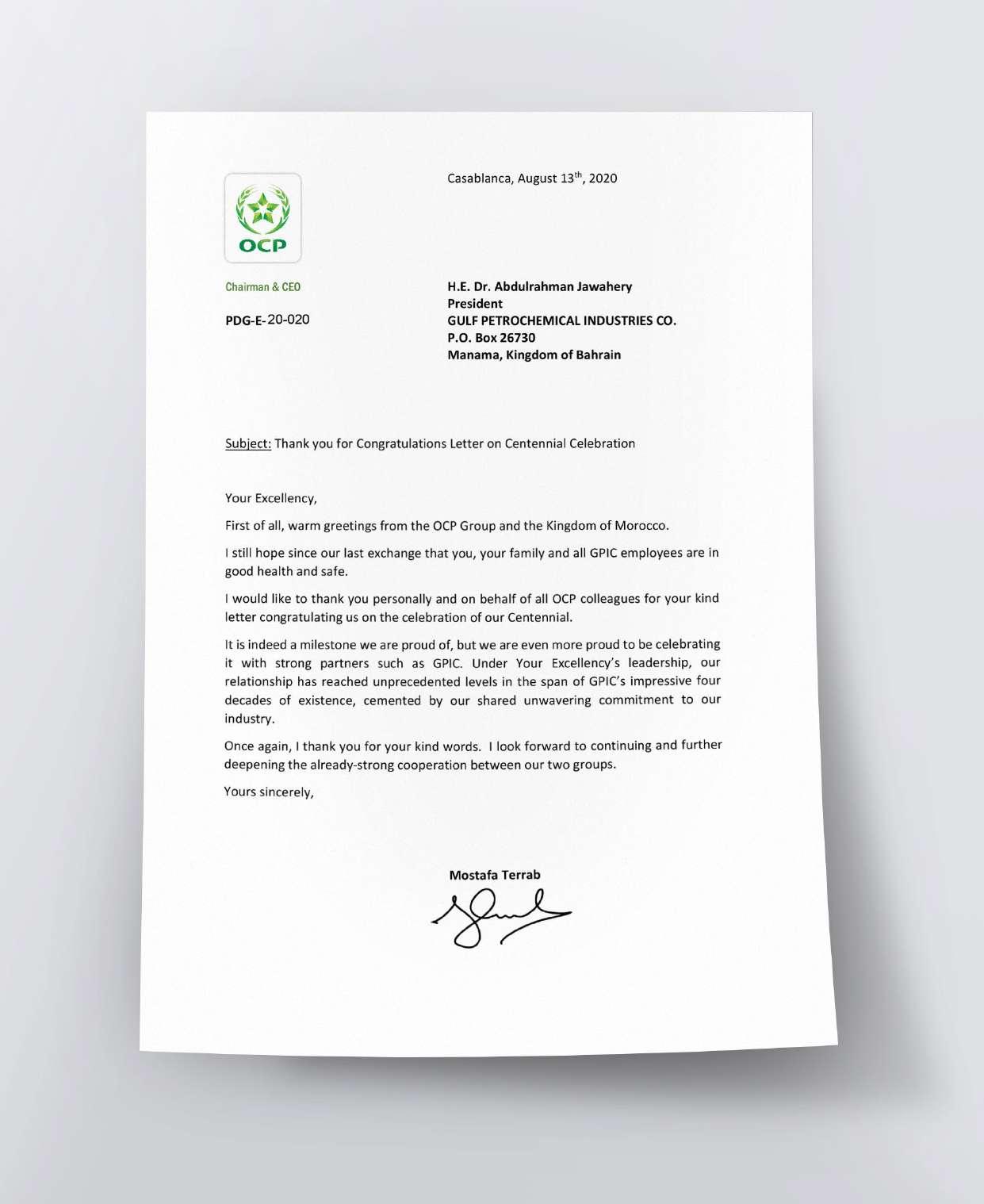
GPIC Sustainability Report 20202021 190
What Others Say

“Having read your letter to IFA Executive Board and the Board of Directors, I would like to express, on behalf of Yara International and myself, a warm thank you for all your efforts in making the IFA Board and Executive Committee a functional, well-organized working body, that has achieved a lot under your leadership, in terms of improving industry-wide safety records, strengthening our stance on environmental issues and successfully reinforcing our corporate social responsibilities. Your clarity and strength on these topics has been an inspiration for me. “
Svein Tore Holsether President and Chief Executive Officer Yara International ASA
“Ever since I joined RoSPA – fourteen years ago (!) – I have been aware of your inspirational leadership of GPIC. Not only is your organisation a worldleader in terms of its business activities, but it is also exemplary in terms of its approach to safety, the environment and community engagement. GPIC has deservedly and repeatedly won RoSPA awards, including our most prestigious award, the Sir George Earl Trophy.
Errol Taylor Chief Executive ROSPA
I would like to sincerely congratulate you for the excellent news I learned regarding the Gulf Petrochemicals Industries Company (GPIC) Labour Union’s nomination of the first female member of its Board Members; Ms. Elham Janahi.
As a considerable representative of the private sector, your relentless endeavors for women empowerment and gender equity demonstrated through your esteemed company are to be commended. Your efforts to incorporate the fifth Sustainable Development Goal as an essential and intersected goal to all aspects of sustainable development contributes greatly to the Culture of Peace.
Nejib Freji Director International Peace Institute, MENA
“INJAZ Bahrain would like to express its sincere appreciation and gratitude to you and your esteemed staff members for your active dedication and partnership in hosting the Internship Programme for the students participating in the Company programme. We truly value your unwavering support and devoted contributions in time and support to delivering this Internship and adding so much value to our Bahraini youth, who are the pillars of a successful and prosperous Bahraini future. With your committed support and guidance our youth are exposed to the real world of work and are more equipped to succeed in a global economy.”
Shaikha Hessa bint Khalifa Al Khalifa Chief Executive INJAZ, Bahrain
GPIC Sustainability Report 20202021 191
What Others Say
“I just wanted to drop you a note on behalf of myself and my colleagues at NEBOSH to say what a pleasure it was to work with you last week. I would particularly like to thank you for your generosity and fantastic hospitality.
I am looking forward immensely to future opportunities to working with GPIC to achieve our vision of preserving and improving health, safety and the environment in workplaces worldwide. Your own and your company safety record is a benchmark for companies to aspire to.”
Ian Taylor Chief Executive NEBOSH
“Allow me to reiterate my sincere appreciation for not only the important role you played during the Book Launch on the 17 Sustainable Development Goals( SDGs) at the International Peace Institute, but for the continuously great work you deliver in promoting Sustainable Development at the national, regional and international levels, and relentlessly advocating for youth as a vital component to the Education and Culture of Peace.”
Nejib Freji Director International Peace Institute, MENA
“Thank you for your gracious hospitality during my visit to GPIC last week. It was a great pleasure to meet with you and your dynamic and talented staff, visit the impressive GPIC facility, and learn about the projects that you are undertaking in industry, the community, and for the environment. The role of all staff including labor advocates, in making GPIC such a model of success demonstrates unique leadership we might all learn from. The gardens, fish farm, and nature preserve were also impressive and a joy to experience.”
Justin Siberell Ambassador of the United States of America

“I wanted to take this time and thank you for making our visit memorable and outstanding experience. Although I’ve been in this field for over two decades, I was impressed during this visit of discovering one of the top industry leaders who had contributed to developing a benchmark among regional and global forums related to the petrochemical and fertilizer industry.
We at BHGE are excited to be part of an agreement with a worldwide premier company who had made a mark not only in the industrial field, but also in the professional work, initiatives towards raising the local talents, women empowerment, community service and the environmental care.”
Maria Sferruzza President, LNG &Global Services Baker Hughes GE
GPIC Sustainability Report 20202021 192
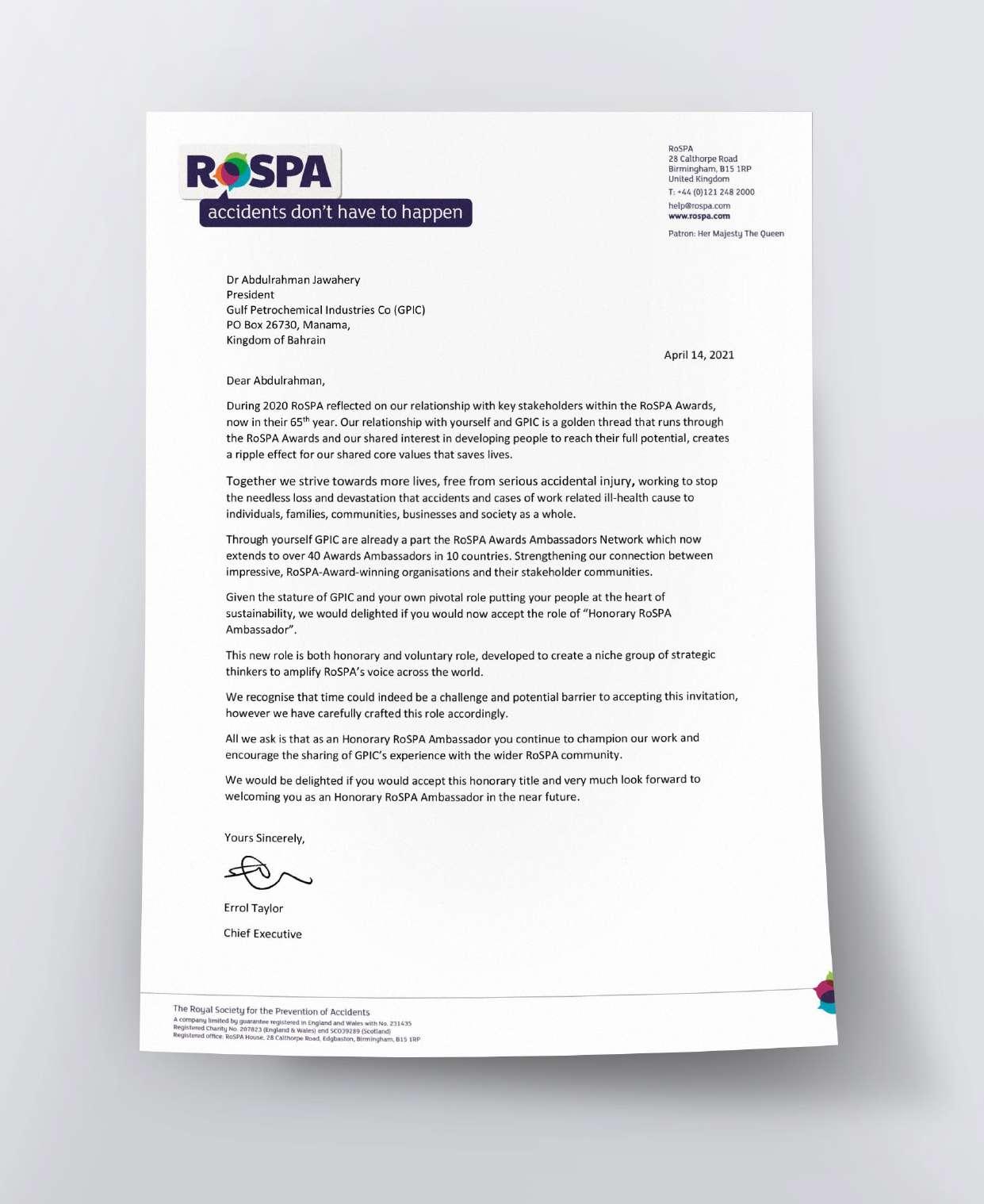
GPIC Sustainability Report 20202021 193
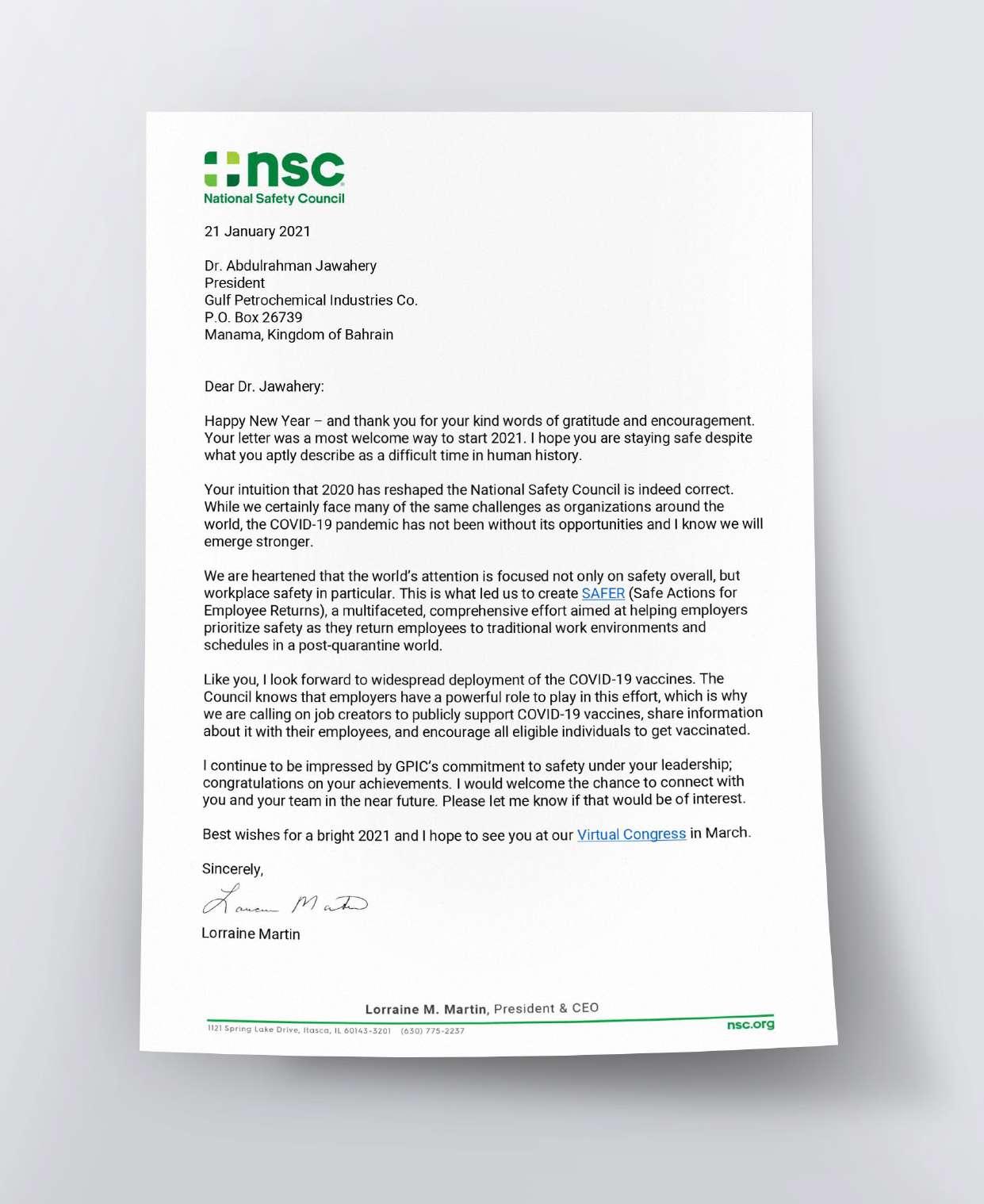
GPIC Sustainability Report 20202021 194
What Others Say

“We thank you for your participation in providing us copies of SDG’s book for children, we are also pleased to witness your efforts and your successful initiatives for SDG awareness. “
Amin Al Sharqawi UNDP
“Thanks for sharing the report. Looks great and very impressed that the sustainability report is done to highest international standards and are meeting high standards of GRI for reporting. I have asked my team to explore doing the same and will appreciate if you can send us the contact person within your company that my team can coordinate with for cross learning and benchmarking.”
Ahmed Al Jahdhami CEO ORPIC, Oman
“Many thanks for considering Alba as part of your esteemed stakeholders & Congratulations on releasing 2019 Sustainability Report.
As a leading industrial company in Bahrain, this initiative will lead the way for others to look at sustainability as a core of their operations.
We found that the GPIC Sustainability Report is comprehensive as it defines the Company’s goals, performance measurement and evaluation as well as enables all stakeholders to understand GPIC’s vision, mission and values. It is also transparent as it is reported in accordance with GRI StandardsComprehensive and outline’s UN Global Compact Communication on Progress (CoP).”
Ali Al Baqali, CEO Alba, Bahrain
“Congratulations on being recognized by Safety+Health magazine as a 2018 CEO who “Gets It”. The National Safety Council applauds your commitment to safety and your success in creating a safe environment for your employees. You are one of only a handful that will be featured in the February 2018 issue of Safety+Health magazine”.
Deborah A.P. Hersman President and CEO National Safety Council
GPIC Sustainability Report 20202021 195

GPIC Sustainability Report 20202021 196
GRI Content Index
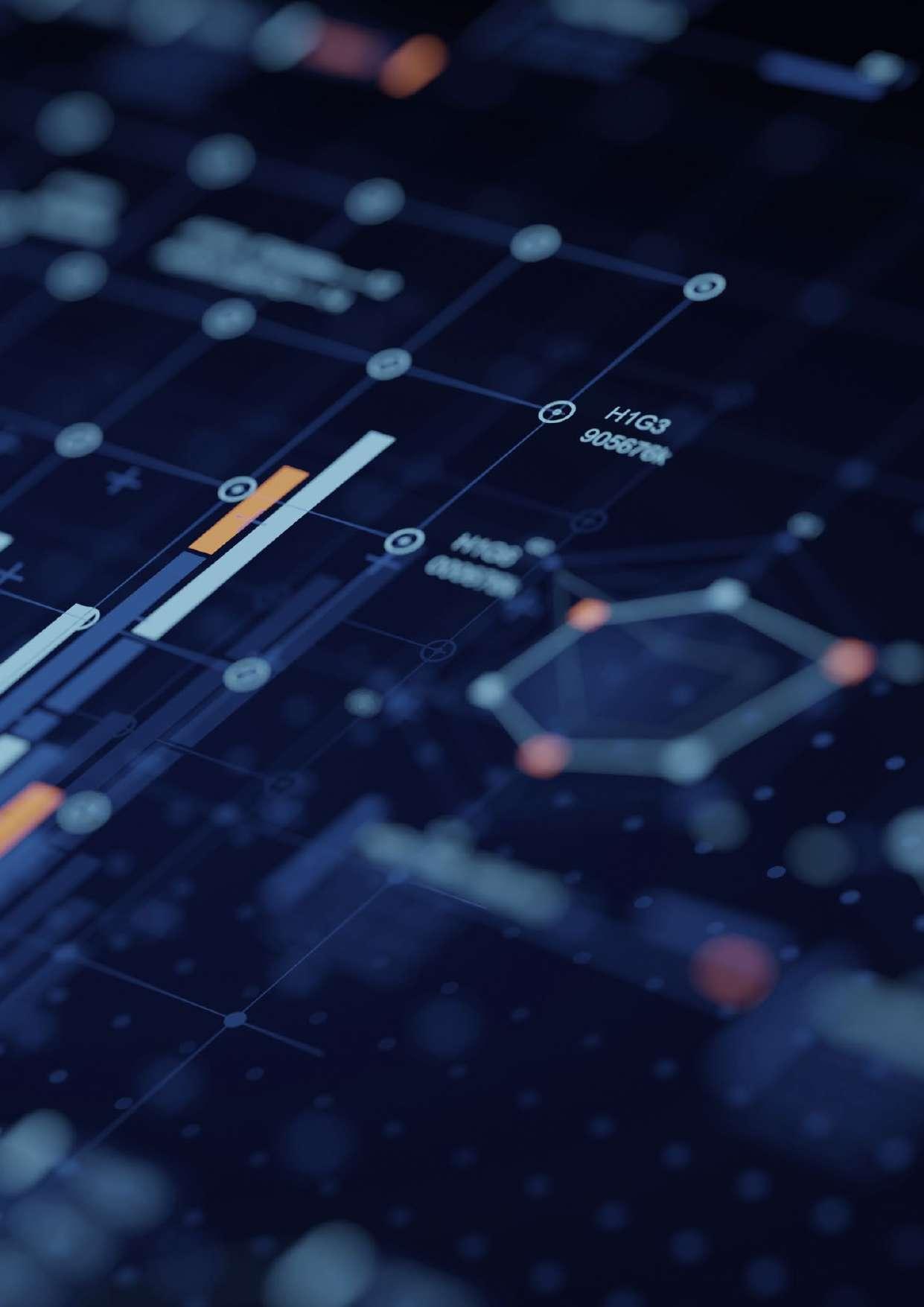
GPIC Sustainability Report 20202021 197
GRI Content Index
For the Materiality Disclosures Service, GRI Services reviewed that the GRI content index is clearly presented and the references for Disclosures 102-40 to 102-49 align with appropriate sections in the body of the report.

GRI Standard and/or GRI Disclosure Number Disclosure Title Page Reference / Location (or direct response in case of omission) UN SDGs UNGC Principles GRI 101: FOUNDATION 2016 GRI 102 : GENERAL DISCLOSURES 2016 ORGANIZATIONAL PROFILE 102-1 Name of the organisation 43 102-2 Activities, brands, products and services 43 102-3 Location of headquarters 43 102-4 Location of operations 43 102-5 Ownership and legal form 43 102-6 Markets served 43 102-7 Scale of the organisation 43 102-8 Information on employees and other workers 44 8 1,2,3,4,5,6 102-9 Supply chain 44, 45 102-10 Significant changes to the organisation and its supply chain 45 102-11 Precautionary principle or approach 46 102-12 External initiatives 46 102-13 Membership of associations 46, 47 STRATEGY 102-14 Statement from senior decision-maker 36, 38, 40 102-15 Key impacts, risks and opportunities 42 ETHICS AND INTEGRITY 102-16 Values, principles, standards and norms of behaviour 64 16 1,2,3,4,5,6,10 102-17 Mechanisms for advice and concerns about ethics 65 16 1,2,3,4,5,6,10 GOVERNANCE 102-18 Governance structure 59, 60, 61 102-19 Delegating authority 61 102-20 Executive-level responsibility for economic, environmental and social topics 61 102-21 Consulting stakeholders on economic, environmental and social topics 61 16 1,2,3,4,5,6,10 102-22 Composition of the highest governance body and its committees 61 16 1,2,3,4,5,6,10 102-23 Chair of the highest governance body 62 16 1,2,3,4,5,6,10 102-24 Nominating and selecting the highest governance body 62 16 1,2,3,4,5,6,10 102-25 Conflicts of interest 62 16 1,2,3,4,5,6,10 GPIC Sustainability Report 20202021 198

GRI 102 : GENERAL DISCLOSURES 2016 GRI Standard and/or GRI Disclosure Number Disclosure Title Page Reference / Location (or direct response in case of omission) UN SDGs UNGC Principles GOVERNANCE 102-26 Role of highest governance body in setting purpose, values and strategy 62 102-27 Collective knowledge of highest governance body 62 4 1,2 102-28 Evaluating the highest governance body’s performance 62 102-29 Identifying and managing economic, environmental and social impacts 63 16 1,2,3,4,5,6,10 102-30 Effectiveness of risk management processes 63 102-31 Review of economic, environmental and social topics 63 102-32 Highest governance body’s role in sustainability reporting 63 102-33 Communicating critical concerns 63 102-34 Nature and total number of critical concerns 64 102-35 Remuneration policies 64 102-36 Process for determining remuneration 64 102-37 Stakeholders’ involvement in remuneration 64 16 1,2,3,4,5,6,10 102-38 Annual total compensation ratio 64 102-39 Percentage increase in annual total compensation ratio 64 STAKEHOLDER ENGAGEMENT 102-40 List of stakeholder groups 50, 51 102-41 Collective bargaining agreements 44 8 1,2,3,4,5,6 102-42 Identifying and selecting stakeholders 51 102-43 Approach to stakeholder engagement 52, 53, 54, 55 102-44 Key topics and concerns raised 56, 58 REPORTING PRACTICE 102-45 Entities included in the consolidated financial statements 47 102-46 Defining report content and topic boundaries 47, 48, 49 102-47 List of material topics 49, 50 102-48 Restatements of information 50 102-49 Changes in reporting 50 102-50 Reporting period 58 102-51 Date of most recent report 59 102-52 Reporting cycle 59 GPIC Sustainability Report 20202021 199
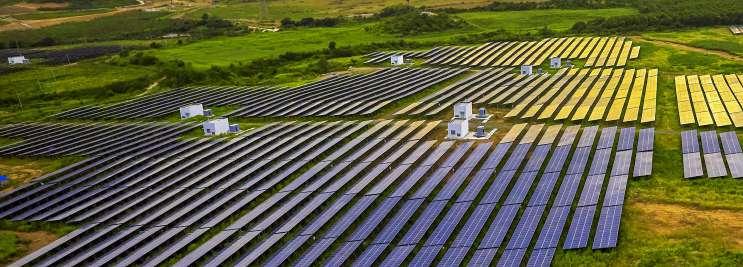
GRI Content Index GRI 102 GENERAL DISCLOSURES 2016 GRI Standard and/ or GRI Disclosure Number Disclosure Title Page Reference / Location (or direct response in case of omission) UN SDGs UNGC Principles REPORTING PRACTICE 102-53 Contact point for questions regarding the report 59 102-54 Claims of reporting in accordance with the GRI Standards 59 102-55 GRI content index 59 102-56 External assurance 59 ECONOMIC ECONOMIC PERFORMANCE GRI 103 Management Approach 2016 103-1 Explanation of the material topic and its bounderies 70 103-2 The management approach and its components 70 103-3 Evaluation of the management approach 70 GRI 201: ECONOMIC PERFORMANCE 2016 201-1 Direct economic value generated and distributed 72, 73, 74,75 2,5,7,8,9 1,2,3,4,5,6,7,8,9 201-2 Financial implications and other risks and opportunities due to climate change 75 13 7,8,9 201-3 Defined benefit plan obligations and other retirement plans 76 201-4 Financial assistance received from government We did not receive any financial assistance from government MARKET PRESENCE GRI 103 Management Approach 2016 103-1 Explanation of the material topic and its bounderies 70 103-2 The management approach and its components 70 103-3 Evaluation of the management approach 70 GRI 202: MARKET PRESENCE 2016 202-1 Ratios of standard entry level wage by gender compared to local minimum wage 76 1,8 1,2,3,4,5,6 202-2 Proportion of senior management hired from the local community 76, 77 8 1,2,3,4,5,6 INDIRECT ECONOMIC IMPACTS GRI 103 Management Approach 2016 103-1 Explanation of the material topic and its bounderies 70 103-2 The management approach and its components 70 103-3 Evaluation of the management approach 70 GRI 203: INDIRECT ECONOMIC IMPACTS 2016 203-1 Infrastructure investments and services supported 77, 78 2,5,7,8,9 1,2,3,4,5,6,7,8,9 203-2 Significant indirect economic impacts 78 1,2,3,8,10,17 1,2,3,4,5,6,7,8,9,10 GPIC Sustainability Report 20202021 200
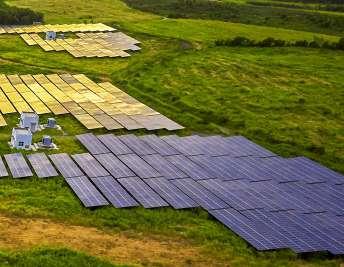
ECONOMIC PROCUREMENT PRACTICES GRI 103 Management Approach 2016 103-1 Explanation of the material topic and its bounderies 70 103-2 The management approach and its components 70 103-3 Evaluation of the management approach 70 GRI 204: PROCUREMENT PRACTICES 2016 204-1 Proportion of spending on local suppliers 78 12 7,8,9 ANTI-CORRUPTION GRI 103 Management Approach 2016 103-1 Explanation of the material topic and its bounderies 142, 143, 144 103-2 The management approach and its components 142, 143, 144 103-3 Evaluation of the management approach 142, 143, 144 GRI 205: ANTI-CORRUPTION 2016 205-1 Operations assessed for risks related to corruption 144 16 1,2,3,4,5,6,10 205-2 Communication and training about anticorruption policies and procedures 144 16 1,2,3,4,5,6,10 205-3 Confirmed incidents of corruption and actions taken 144 16 1,2,3,4,5,6,10 ANTI-COMPETITIVE BEHAVIOUR GRI 103 Management Approach 2016 103-1 Explanation of the material topic and its bounderies 142, 143, 144 103-2 The management approach and its components 142, 143, 144 103-3 Evaluation of the management approach 142, 143, 144 GRI 206: ANTI-COMPETITIVE BEHAVIOR 2016 206-1 Legal actions for anti-competitive behavior, antitrust, and monopoly practices There were no cases of anti-competitive behavior, hence no actions 16 1,2,3,4,5,6,10 ENVIRONMENTAL MATERIALS GRI 103 Management Approach 2016 103-1 Explanation of the material topic and its bounderies 94, 95, 96, 98 103-2 The management approach and its components 94, 95, 96, 98 103-3 Evaluation of the management approach 94, 95, 96, 98 GRI 301: MATERIALS 2016 301-1 Materials used by weight or volume 98, 99 8,12 1,2,3,4,5,6,7,8,9 301-2 Recycled input materials used 99 8,12 1,2,3,4,5,6,7,8,9 301-3 Reclaimed products and their packaging materials We do not use reclaimed products 8,12 1,2,3,4,5,6,7,8,9 GPIC Sustainability Report 20202021 201

ENVIRONMENTAL ENERGY GRI 103 Management Approach 2016 103-1 Explanation of the material topic and its bounderies 94, 95, 96, 99 103-2 The management approach and its components 94, 95, 96, 99 103-3 Evaluation of the management approach 94, 95, 96, 99 GRI 302: ENERGY 2016 302-1 Energy consumption within the organisation 100 7,8,12,13 1,2,3,4,5,6,7,8,9 302-2 Energy consumption outside of the organisation 100 7,8,12,13 1,2,3,4,5,6,7,8,9 302-3 Energy intensity 101 7,8,12,13 1,2,3,4,5,6,7,8,9 302-4 Reduction of energy consumption 101, 102 7,8,12,13 1,2,3,4,5,6,7,8,9 302-5 Reductions in energy requirements of products and services 102 7,8,12,13 1,2,3,4,5,6,7,8,9 GRI 303: WATER AND EFFLUENTS 2018 GRI 103 Management Approach 2016 Disclosure 303-1 Interactions with water as a shared resource 94,95,96,102,108 Disclosure 303-2 Management of water discharge-related impacts 94,95,96,102,108 GRI 303 :WATER AND EFFLUENTS 2018 303-3 Water Withdrawl 103 6 1,2,7,8,9 303-4 Water discharge 108 303-5 Water consumption 103 6,8,12 1,2,3,4,5,6,7,8,9 EMISSIONS GRI 103 Management Approach 2016 103-1 Explanation of the material topic and its bounderies 94, 95, 96, 104 103-2 The management approach and its components 94, 95, 96, 104 103-3 Evaluation of the management approach 94, 95, 96, 104 GRI 305: EMISSIONS 2016 305-1 Direct (Scope 1) GHG emissions 104 3,12,13,14,15 1,2,3,4,5,6,7,8,9,10 305-2 Energy indirect (Scope 2) GHG emissions 105 3,12,13,14,15 1,2,3,4,5,6,7,8,9,10 305-3 Other indirect (Scope 3) GHG emissions 105 3,12,13,14,15 1,2,3,4,5,6,7,8,9,10 305-4 GHG emissions intensity 105 13,14,15 7,8,9 305-5 Reduction of GHG emissions 105 13,14,15 7,8,9 305-6 Emissions of ozone-depleting substances (ODS) 106 3,12,13 1,2,3,4,5,6,7,8,9,10 305-7 Nitrogen oxides (NOX), sulfur oxides (SOX), and other significant air emissions 106 3,12,13,14,15 1,2,3,4,5,6,7,8,9,10
GPIC Sustainability Report 20202021 202
GRI Content Index

ENVIRONMENTAL GRI 306: WASTE 2020 GRI 103 Management Approach 2016 Management Approach disclosures Disclosure 306-1 Disclosure 306-2 94, 95, 96, 108, 109 GRI 306: WASTE 2020 306-3 Waste generated 110 6 1,2,7,8,9 306-4 Waste diverted from disposal 110 306-5 Waste directed from disposal 110 6,8,12 1,2,3,4,5,6,7,8,9 ENVIRONMENTAL COMPLIANCE GRI 103 Management Approach 2016 103-1 Explanation of the material topic and its bounderies 94, 95, 96, 112 103-2 The management approach and its components 94, 95, 96, 112 103-3 Evaluation of the management approach 94, 95, 96, 112 GRI 307: ENVIRONMENTAL COMPLIANCE 2016 307-1 Non-compliance with environmental laws and regulations 113 16 1,2,3,4,5,6,10 SUPPLIER ENVIRONMENTAL ASSESSMENT GRI 103 Management Approach 2016 103-1 Explanation of the material topic and its bounderies 94, 95, 96, 113 103-2 The management approach and its components 94, 95, 96, 113 103-3 Evaluation of the management approach 94, 95, 96, 113 GRI 308: SUPPLIER ENVIRONMENTAL ASSESSMENT 2016 308-1 New suppliers that were screened using environmental criteria 113 308-2 Negative environemntal impacts in the supply chain and action taken 113 SOCIAL EMPLOYMENT GRI 103 Management Approach 2016 103-1 Explanation of the material topic and its bounderies 118, 119, 120, 121, 122 103-2 The management approach and its components 118, 119, 120, 121, 122 103-3 Evaluation of the management approach 118, 119, 120, 121, 122 GRI 401: EMPLOYMENT 2016 401-1 New employee hires and employee turnover 126, 127 5,8 1,2,3,4,5,6 401-2 Benefits provided to full-time employees that are not provided to temporary or part-time employees 127 8 1,2,3,4,5,6 401-3 Parental leave 127 5,8 1,2,3,4,5,6 GPIC Sustainability Report 20202021 203
SOCIAL LABOUR / MANAGEMENT RELATIONS GRI 103 Management Approach 2016 103-1 Explanation of the material topic and its bounderies 118, 119, 120, 121, 122 103-2 The management approach and its components 118, 119, 120, 121, 122 103-3 Evaluation of the management approach 118, 119, 120, 121, 122 GRI 402: LABOR / MANAGEMENT RELATIONS 2016 402-1 Minimum notice periods regarding operational changes 127 8 1,2,3,4,5,6 GRI 403 : OCCUPATIONAL HEALTH AND SAFETY 2018 GRI 103 Management Approach 2016 Management Approach disclosures Disclosure 403-1 Disclosure 403-2 Disclosure 403-3 Disclosure 403-4 Disclosure 403-5 Disclosure 403-6 Disclosure 403-7 86 GRI 403 : OCCUPATIONAL HEALTH AND SAFETY 2018 403-8 Workers covered by an occupational health and safety management system 128 6 1,2,7,8,9 403-9 Work related injuries 128 403-10 Work related ill health 129 6,8,12 1,2,3,4,5,6,7,8,9 TRAINING AND EDUCATION GRI 103 Management Approach 2016 103-1 Explanation of the material topic and its bounderies 118, 119, 120, 121, 122 103-2 The management approach and its components 118, 119, 120, 121, 122 103-3 Evaluation of the management approach 118, 119, 120, 121, 122 GRI 404: TRAINING AND EDUCATION 2016 404-1 Average hours of training per year per employee 130 4,5,8 1,2,3,4,5,6 404-2 Programs for upgrading employee skills and transition assistance programs 131 8 1,2,3,4,5,6 404-3 Percentage of employees receiving regular performance and career development reviews 131 5,8 1,2,3,4,5,6 GRI Content Index GPIC Sustainability Report 20202021 204

SOCIAL DIVERSITY AND EQUAL OPPORTUNITY GRI 103 Management Approach 2016 103-1 Explanation of the material topic and its bounderies 118, 119, 120, 121, 122 103-2 The management approach and its components 118, 119, 120, 121, 122 103-3 Evaluation of the management approach 118, 119, 120, 121, 122 GRI 405: DIVERSITY AND EQUAL OPPORTUNITY 2016 405-1 Diversity of governance bodies and employees 132, 133 5,8 1,2,3,4,5,6 405-2 Ratio of basic salary and remuneration of women to men 133 5,8,10 1,2,3,4,5,6,10 NON-DISCRIMINATION GRI 103 Management Approach 2016 103-1 Explanation of the material topic and its bounderies 134, 135 103-2 The management approach and its components 134, 135 103-3 Evaluation of the management approach 134, 135 GRI 406: NON-DISCRIMINATION 2016 406-1 Incidents of discrimination and corrective actions taken 136 5,8,16 1,2,3,4,5,6,10 FREEDOM OF ASSOCIATION AND COLLECTIVE BARGAINING GRI 103 Management Approach 2016 103-1 Explanation of the material topic and its bounderies 134, 135 103-2 The management approach and its components 134, 135 103-3 Evaluation of the management approach 134, 135 GRI 407: FREEDOM OF ASSOCIATION AND COLLECTIVE BARGAINING 2016 407-1 Operations and suppliers in which the right to freedom of association and collective bargaining may be at risk 130 8 1,2,3,4,5,6 CHILD LABOUR GRI 103 Management Approach 2016 103-1 Explanation of the material topic and its bounderies 128, 129 103-2 The management approach and its components 128, 129 103-3 Evaluation of the management approach 128, 129 GRI 408: CHILD LABOR 2016 408-1 Operations and suppliers at significant risk for incidents of child labor 136 8,16 1,2,3,4,5,6,10 GPIC Sustainability Report 20202021 205
GRI Content Index

SOCIAL FORCED OR COMPULSORY LABOUR GRI 103 Management Approach 2016 103-1 Explanation of the material topic and its bounderies 134, 135 103-2 The management approach and its components 134, 135 103-3 Evaluation of the management approach 134, 135 GRI 409: FORCED OR COMPULSORY LABOR 2016 409-1 Operations and suppliers at significant risk for incidents of forced or compulsory labor 136 8 1,2,3,4,5,6 SECURITY PRACTICES GRI 103 Management Approach 2016 103-1 Explanation of the material topic and its bounderies 134, 135 103-2 The management approach and its components 134, 135 103-3 Evaluation of the management approach 134, 135 GRI 410: SECURITY PRACTICES 2016 410-1 Security personnel trained in human rights policies or procedures 136 16 1,2,3,4,5,6,10 RIGHTS OF INDIGENOUS PEOPLES GRI 103 Management Approach 2016 103-1 Explanation of the material topic and its bounderies 134, 135 103-2 The management approach and its components 134, 135 103-3 Evaluation of the management approach 134, 135 GRI 411: RIGHTS OF INDIGENOUS PEOPLES 2016 411-1 Incidents of violations involving rights of Indigenous peoples There were no incidents of violations involving rights of minorities and indigenous people. 2 1,2,7,8,9 HUMAN RIGHTS ASSESSMENT GRI 103 Management Approach 2016 103-1 Explanation of the material topic and its bounderies 134, 135 103-2 The management approach and its components 134, 135 103-3 Evaluation of the management approach 134, 135 GRI 412: HUMAN RIGHTS ASSESSMENT 2016 412-1 Operations that have been subject to human rights reviews or impact assessments 136 412-2 Employee training on human rights policies or procedures 136 412-3 Significant investment agreements and contracts that include human rights clauses or that underwent human rights screening 136
GPIC Sustainability Report 20202021 206

SOCIAL LOCAL COMMUNITIES GRI 103 Management Approach 2016 103-1 Explanation of the material topic and its bounderies 138, 139 103-2 The management approach and its components 138, 139 103-3 Evaluation of the management approach 138, 139 GRI 413: LOCAL COMMUNITIES 2016 413-1 Operations with local community engagement, impact assessments and development programs 142 413-2 Operations with significant actual and potential negative impacts on local communities 142 1,2 1,2,3,4,5,6,7,8,9 SUPPLIER SOCIAL ASSESSMENT GRI 103 Management Approach 2016 103-1 Explanation of the material topic and its bounderies 133 103-2 The management approach and its components 133 103-3 Evaluation of the management approach 133 GRI 414: SUPPLIER SOCIAL ASSESSMENT 2016 414-1 New suppliers that were screened using social criteria 133 5,8,16 1,2,3,4,5,6,10 414-2 Negative social impacts in the supply chain and actions taken 133 5,8,16 1,2,3,4,5,6,10 PUBLIC POLICY GRI 103 Management Approach 2016 103-1 Explanation of the material topic and its bounderies 138, 139 103-2 The management approach and its components 138, 139 103-3 Evaluation of the management approach 138, 139 GRI 415: PUBLIC POLICY 2016 415-1 Political contributions We do not make any political contributions 16 1,2,3,4,5,6,10 CUSTOMER HEALTH AND SAFETY GRI 103 Management Approach 2016 103-1 Explanation of the material topic and its bounderies 145, 146 103-2 The management approach and its components 145, 146 103-3 Evaluation of the management approach 145, 146 GRI 416: CUSTOMER HEALTH AND SAFETY 2016 416-1 Assessment of the health and safety impacts of product and service categories 146, 147 416-2 Incidents of non-compliance concerning the health and safety impacts of products and services 148 16 1,2,3,4,5,6,10 GPIC Sustainability Report 20202021 207

SOCIAL MARKETING AND LABELING GRI 103 Management Approach 2016 103-1 Explanation of the material topic and its bounderies 145, 146 103-2 The management approach and its components 145, 146 103-3 Evaluation of the management approach 145, 146 GRI 417: MARKETING AND LABELING 2016 417-1 Requirements for product and service information and labeling 148 12,16 1,2,3,4,5,6 7,8,9,10 417-2 Incidents of non-compliance concerning product and service information and labeling 148 16 1,2,3,4,5,6,10 417-3 Incidents of non-compliance concerning marketing communications 148 CUSTOMER PRIVACY GRI 103 Management Approach 2016 103-1 Explanation of the material topic and its bounderies 145, 146 103-2 The management approach and its components 145, 146 103-3 Evaluation of the management approach 145, 146 GRI 418: CUSTOMER PRIVACY 2016 418-1 Substantiated complaints concerning breaches of customer privacy and losses of customer data 148 16 1,2,3,4,5,6,10 SOCIOECONOMIC COMPLIANCE GRI 103 Management Approach 2016 103-1 Explanation of the material topic and its bounderies 145, 146 103-2 The management approach and its components 145, 146 103-3 Evaluation of the management approach 145, 146 GRI 419: SOCIOECONOMIC COMPLIANCE 2016 419-1 Non-compliance with laws and regulations in the social and economic area 148 16 1,2,3,4,5,6,10
GPIC Sustainability Report 20202021 208
GRI Content Index
The 2030 Agenda
GPIC supports the 2030 Agenda and continues to contribute towards the SDGs during these challenging times knowing that the pandemic presents both an enormous challenge and tremendous opportunities for reaching the 2030 Agenda and the Sustainable Development Goals (SDGs).

GPIC Sustainability Report 20202021 209

Acronyms GPIC Sustainability Report 20202021 210
AFA Arab Fertilizer Association
OHSAS Occupational Health and Safety Assessment Series
API American Petroleum Institute
REACH Registration, Evaluation and Authorisation of Chemicals
CEO Chief Executive Officer
UNEP United Nations Environment Programme
IFA International Fertilizer Association
IPIECA International Petroleum Industry Environmental Conservation association
GPCA Gulf Petrochemicals and Chemicals Association
ISO International Organisation for standardisation
GHG Greenhouse Gas
CSR Corporate Social Responsibility
GJ Gigajoule
GRI Global Reporting Initiative

UNGC United Nations Global Compact
KSA Kingdom of Saudi Arabia
GPIC Gulf Petrochemical Industries Company
PIC Petrochemicals Industries Company
ppm Parts Per Million ppb Parts Per Billion
MT Metric Tonne
NGO Non–Governmental Organization
CDR Carbon dioxide Recovery
CO2 Carbon dioxide
CO2e Carbon dioxide equivalent - measure used to compare the emissions from various types of greenhouse gas (GHG) based on their global warming potential (GWP)
SHE Safety, Health, Environment
NOGA National Oil and Gas Authority
EWA Electricity and Water Authority
SABIC Saudi Basic Industries Corporation
NSC National Safety Council, USA
RoSPA Royal Society for the Prevention of Accidents,UK
PMS Performance Management System
On-stream factor Operating days as percentage of calendar days
Utilization factor Percentage of the design capacity utilized based on operating days
Capacity utilization Percentage of design capacity utilized based on calendar days
ERM Enterprise Risk Management
LTA Lost time accident
BCM Business Continuity Management
FAB Food and Agriculture Business Principles
WEP Women Empowerment Principles
GEO Global Environment Outlook
NIHR National Institute of Human Rights
GPIC Sustainability Report 20202021 211

GPIC Sustainability Report 20202021 212
GPIC SUPPORTS THE SUSTAINABLE DEVELOPMENT GOALS Contact details Your feedback is important to us. You can e-mail the Sustainability Reporting team at gpic@gpic.com or send us feedback on line at www.gpic.com. You can also telephone +973 17 731777 or write to Sustainability Report at: GPIC PO Box 26730 Kingdom of Bahrain. We have used recycled paper for the production of this report Designed and Produced by








 Yasser Abdulrahim Alabbasi GPIC President
Yasser Abdulrahim Alabbasi GPIC President
























































 Yasser Abdulrahim Alabbasi President, GPIC
Yasser Abdulrahim Alabbasi President, GPIC






















 STATEMENT FROM THE CHAIRMAN
STATEMENT FROM THE CHAIRMAN
 DR. AHMED AL SHARYAN CHAIRMAN GPIC
DR. AHMED AL SHARYAN CHAIRMAN GPIC

 SAMIR A. AL-ABDRABBUH MANAGING DIRECTOR GPIC
SAMIR A. AL-ABDRABBUH MANAGING DIRECTOR GPIC

 YASSER ABDULRAHIM ALABBASI PRESIDENT GPIC
YASSER ABDULRAHIM ALABBASI PRESIDENT GPIC






























































































































































































































